Wander-Lush

22 Travel Tips for Albania: Useful Things to Know Before You Go
My top travel tips for Albania to save you money, time and stress. Read this before you go travelling in Albania.
When I embarked on my 6-month overland journey through the Balkan countries, Albania was definitely the country I was most nervous about visiting.
I had read all about the rugged beaches , high mountains and historic towns and castles – so I had no trouble deciding where to go and what to do . But the people, the culture, the food and all the practical details such as transportation, WIFI and accommodation – well, I had absolutely no clue what to expect.
On the ground, I discovered that most negative stereotypes about the country are untrue. In my experience Albania is safe, affordable, friendly, diverse, tolerant and above all else, incredibly beautiful .
At the same time, I learned that Albania does present some particular challenges , even for those well-practiced at travelling in the region.
Without spoiling any of the country’s special secrets or revealing too many of the quirky things about Albania that are fun to figure out as you go, I want to share a couple of things that will make your travel experience smoother and more fulfilling.
Here are 22 practical travel tips for Albania that I think every traveller should know.
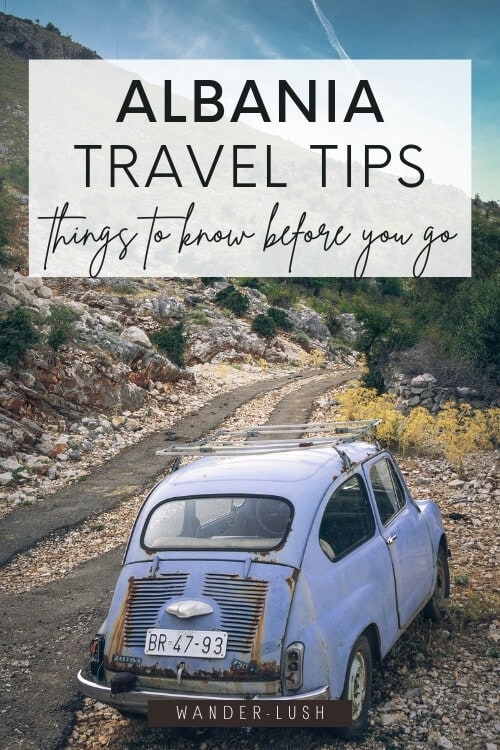
Please note: This post contains affiliate links, meaning I may earn a commission if you make a purchase by clicking a link (at no extra cost to you). Learn more.
What is travelling in Albania really like? 22 useful travel tips for Albania
Albania is quite unlike any of its neighbours.
It’s tempting to think of the Balkans (particularly the western Balkans) as a monolith. But I don’t need to tell you that every country is its own entity. Within this tapestry, Albania is perhaps the most distinct nation in terms of both its culture and history.
An obvious example: The Albanian language, Shqip , is unlike anything else spoken in the region (or anywhere else in the world for that matter). It’s thought to be descended from an extinct Illyrian tongue, but its exact origins are still a mystery to linguists.
After months of being able to follow the rough contours of a shared speech in Croatia, Montenegro and Bosnia and Herzegovina , hearing the curious chatter of Albanian on the streets of Tirana was quite a contrast.
Albania’s cultural and religious traditions are also very distinct. And although you can find local variations of cevapi and burek, the cuisine is totally different too!
With the exception of Kosovo where almost 93% of the population are ethnically Albanian, it’s hard to draw a comparison between Albania and any of its neighbours. In many ways Albania feels more like Georgia – slightly chaotic but imminently beautiful, with the furgon the local equivalent of the marshrutka.
Learn a bit about the history before you go
Of course this runs much deeper than just food and minivans. Albania wasn’t part of Yugoslavia and doesn’t have the same ‘baggage’ as its northern neighbours. That’s not to say the nation wasn’t impacted by the Balkan Wars and genocide – it certainly was – but in a different way. No fighting took place on Albanian soil.
Instead, Albania was subjected to its own private horrors, namely 45 years under an oppressive political regime including 30 years with despotic communist dictator, Enver Hoxha, at the helm. Hoxha’s ideology was so hardline, he viewed Yugoslavia and the USSR as too lax. It’s very difficult for an outsider to try and comprehend how this period of history impacted Albania and its people. But I felt compelled to at least try.
One of the most interesting things I found is that Albanians embrace their whole history – the good and the bad. The communist regime only fell in the 1990s so for the majority of the population, it’s not a distant memory but something that’s still very fresh. But it’s never glossed over. Most people we met were happy to chat politics and share their experiences.
For example: There are 173,000 disused nuclear bunkers sprinkled around Albania, each a monument to Hoxha’s paranoia. Instead of destroying them, people decided to either leave them be or repurpose them as museums or galleries. (Now there’s even a Cold War military base that’s being rebranded as an island destination .) Tirana’s collection of Communist-era statues and busts are displayed in a courtyard behind the National Art Gallery. And Blloku, once an exclusive neighbourhood where the party members lived, has been reclaimed as a vibrant cafe and street art district. Even Hoxha’s old house is still standing.
Some might think of Albania as a dark tourism destination. To me, this is a nation of light and colour. While visitors have an obligation to familiarise themselves with the nation’s recent history, it’s important to do so in a respectful, thoughtful way. The Bunk’Art museums in Tirana are a great place to start and will enrich your experience immensely.
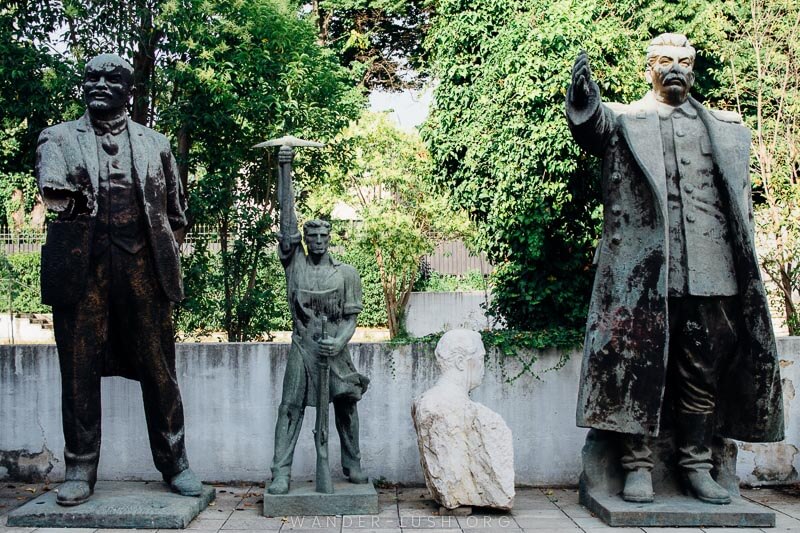
The man atop the horse is General Skanderbeg
On a lighter note, here’s a bit of trivia for you. If Hoxha is Albania’s villain, then the nation’s hero is definitely Gjergj Kastrioti Skënderbeu, AKA General Skanderbeg.
It took me far too long to learn who Skanderbeg is and why he’s so beloved in this part of the world. As I travelled around the Balkans, I kept seeing the same statue of a warrior – including in squares in Skopje and Prishtina – and started referring to him simply as ‘the man atop the horse’. It wasn’t until I got to Albania that I was finally able to put a name to the face.
Skanderbeg was an Albanian military commander who lived during the early 15th century. He’s famous for leading a campaign against the Ottomans which freed Albania and several neighbouring countries from being vassal states. His penultimate battle was launched from the town of Kruja north of Tirana, now the location of Skanderbeg’s castle-museum. It’s a popular day trip and the place to go if you want to learn more about this chapter of history.
The only other person held in similar esteem is Albania’s heroine, Anjezë Gonxhe Bojaxhiu, AKA Mother Teresa. Born to Albanian Kosovar parents in Skopje – then part of the Ottoman Empire and now the capital of North Macedonia – she’s beloved in all three countries (though each claims her as their own!).
Albania is overwhelmingly a safe country for tourists
One of the biggest misconceptions about Albania is that it’s unsafe for tourists. In reality, foreigners are very rarely the target of violent crime, and although pickpocketing and scams do happen, they’re not as widespread as in other countries in Europe.
Generally speaking, Albania is overwhelmingly safe for travellers of all types (including solo females) provided you exercise common sense and caution.
My one negative experience in Albania was being fleeced by a taxi driver in Gjirokaster . It was my mistake for not doing my research – I was unfamiliar with the location and agreed to a price without understanding just how short the distance to my hotel was. To avoid misunderstandings within the cities, it’s best to download a taxi app .
The biggest thing to watch out for in Albania is road safety. (Here we find another similarity to Georgia: The driving style.) More on that later.
As a side note: It’s not advisable to drink the tap water in Tirana or other cities/towns.
Avoid visiting in July or August
The best time to visit Albania in my opinion is any time except summer. I travelled during June. As the month went on and my trip was coming to an end, I found most places were getting a little too warm and dry – and much too crowded – for my liking.
Albania has a Mediterranean climate, thus winters are mild but wet. The best time to visit Albania is shoulder season (late March to early June or September through October) when the weather is pleasant both on the coast and in the mountains.
July and August are hot and busy, especially on the riviera, and should be avoided. That’s unless you plan to stick to the mountains, in which case summer is the best time for trekking.

Consider flying into a neighbouring country
Most people arrive in Albania via the country’s main international airport, Tirana Airport Nënë Tereza. This makes sense if your itinerary starts in the capital or in the northern part of the country.
A second international airport opened in July 2021 in Kukës (KFZ), 150km north-east of Tirana (and just 45-minutes from Prizren in Kosovo ). It’s a suitable starting point for the Albanian Alps, but international arrivals are so far limited to flights from Zurich and Istanbul.
If you’re travelling around the south of Albania, it might be more convenient (and more affordable) to fly into a neighbouring country instead. Corfu International Airport in Greece is a short ferry ride from Saranda, for example, and a logical place to arrive/depart if you’re mainly focusing on the Albanian Riviera.
Also read: My top tips for visiting Montenegro .
Lek is the official currency, but Euros are widely accepted
The official currency in Albania is the lek. Although Albania is not part of the EU, the Euro is widely used as well.
Lek is common currency in convenience shops, at restaurants and among taxi drivers – i.e. for small purchases. You’ll find that most hotels and guesthouses list their prices in Euro, and it usually works out far better to pay for big-ticket items such as hotel bills and rental cars in Euro rather than lek. If you try to pay in lek, you risk losing a big chunk of cash due to the conversion rate.
At the time of writing, 1 Euro is equivalent to 121.5 LEK.
Always have cash on you
Albania is very much a cash society so you need to make sure you have plenty of bills on you at all times. You can get by in Tirana using card only, but outside the capital, cash is still king.
Lek is a closed currency so you’ll have to wait until you arrive in-country to get your hands on some. Remember that lek is only good for small purchases and meals, so only withdraw as much as you need.
ATMs are easy to find in Albania (even in rural areas). Most banks charge a 300-700 lek withdrawal fee, but Credins Bank and Alpha Bank are among those that are fee-free (at the time of writing). Remember to check for any extra charges issued by your home bank.
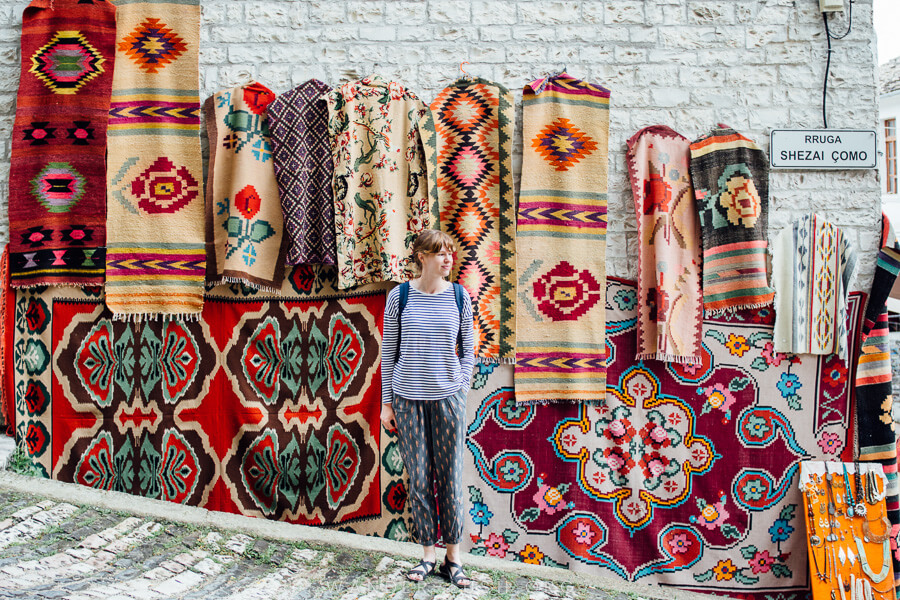
Albania is extremely affordable – even by Balkans standards
Accommodation, restaurants and activities in Albania are all extremely good value for money. We easily got by on 40 USD per person per day – and you could spend a lot less by taking advantage of the hostel scene and sticking to free activities. One of our biggest expenses was museum tickets, something we don’t tend to skimp on.
A generous meal in a restaurant in Albania might cost you 500-1000 lek per person, while cheap snacks such as burek are perfect for breakfast and will only set you back around 100 lek.
Expect to pay 1,600 lek for a local sim card with data, around 200 lek for a cup of coffee, and anywhere from 400-1,000 lek on average for an intercity bus fare.
Buy a sim card when you arrive
Majority of hotels, bars and restaurants in Albania have WIFI, while many beaches and archaeological sites are now serviced by a free public network. Still, if you want unfettered access to the internet for things like booking taxis and navigation, you will need a sim card.
ALBtelecom is the preferred mobile provider in Albania. It’s very easy to buy and register a sim card at one of their shops in Tirana using your passport/ID card. A sim card and internet package (20 GB with 30 days validity) will set you back 1,600 lek.
While coverage in Tirana is good enough to support a burgeoning digital nomad community, reception is still fairly limited in remote areas and non-existent in the mountains.
Don’t put your faith in Google Maps
If you’re getting around Albania with public transport and only using Google Maps for general navigation within the cities, then you have nothing to worry about. But if you’re driving in Albania and using Google Maps to plan your road trip route , you need to watch out for a couple of things.
It seems Google Maps hasn’t quite been able to keep pace with Albania’s rapid infrastructure developments. Missing roads and non-existent turn offs are common encounters, and you’ll find you’re constantly being forced to re-route. Take directions with a grain of salt and always budget extra time to account for detours.
The same goes for finding addresses – street names and house numbers often don’t correspond to what’s on the map. Even major landmarks are sometimes pinned in the wrong spot.

Furgons are your friends
Albania has a limited railway network connecting Tirana with Shkoder in the north, Durres and Vlore on the coast, and Pogradec on Lake Ohrid in the east. Domestic flights are now available from Tirana to Kukës, and flying can certainly save you time getting from the capital to the far-north.
Travelling around the centre and south of Albania, you’ll be relying on road transport. Renting a car is a great option if you’re a confident driver. Otherwise, furgons are your friends.
Furgons are intercity minivans similar to marshrutka vans used throughout the former Soviet countries . They run on a flexible schedule, stop on demand, and are extremely budget-friendly. The downsides: Road safety is not exactly a priority, luggage space (and legroom) is very limited, and you can forget about AC. Furgons depart when full so it’s important to always arrive at the bus station well ahead of schedule.
An upgrade on the furgon is the coach bus. You’ll find large air conditioned coaches running on most popular routes during the warmer months, including between Tirana and Berat , Kruje, Gjirokaster, Korca , Durres, etc.
Gjirafa Travel is a terrific website for checking bus schedules and timetables online in English. Whenever possible, I recommend cross-checking times locally at the station.
Speaking of bus stations – there are multiple bus terminals in Tirana and trying to figure out which one you need can be extremely confusing! Pogradec and Shkoder have their own stations, while other buses depart from the Regional Bus Terminal – North and South Albania.
Take extra care on the roads
Albanians have a reputation for their maniacal driving style and for flouting the rules of the road. Combined with poor road conditions in many parts of the country (although the major highways are in good nick) and the proliferation of old and worn-down cars on the road, it’s a recipe for disaster.
Be careful when crossing the road, especially in the city. Take precautions whenever you travel by road, and only hire a car if you’re very confident. Try to avoid being out on the road after dark, and never get into a car with someone who’s been drinking. I also recommend capping your road journeys to a couple of hours per leg.
Albanian cuisine is a revelation
Albania is not exactly known as a foodie destination , but it should be. Regional cuisine, traditional Albanian dishes and the country’s super-popular farm-to-table fresh food movement all combine to create a fascinating culinary scene.
Albanian food is so diverse, you can find something new to try every day. I was quite satisfied eating only Albanian food for the entire duration of my stay. I found Albanian food fresher and less meat-oriented than in some other countries in the region. Most restaurants have plenty of vegetarian options.
Northern, central and southern Albania all have their separate culinary traditions , and within that towns and villages have their own specialties. Balkan, Italian, Turkish, Greek and even ancient Roman influences can all be identified, while you’ll find many similarities to other Mediterranean cuisines (especially Greek and Italian).
Seafood reigns supreme on the coast, while in the south, food choices reflect the pastoral landscape: Dairy, citrus and olive oil are all prominent. Garlic and onions are ubiquitous.
Some of my favourite Albanian dishes include: Tavë Kosi , a meal of lamb, eggs and yogurt traditional to Elbasan; Gjirokaster qifqi (arancini-like rice balls flavoured with mint and black pepper); ‘Berati schnitzel’ (pork stuffed with hard cheese) and pispili (spinach pie with a cornbread base), both traditional to Berat; and Korca’s famous savory lakror pie.

Watch out for raki
One thing Albania does have in common with its Balkan compatriots is the proclivity for alcohol. Sipping spirits in particular is a huge part of the culture.
The drink of choice in Albania is raki or rakia , a potent clear spirit distilled from grapes. Commercial versions are up to 45% proof, but homemade raki is much, much stronger. If you’re at a small restaurant or guesthouse and a recycled plastic soft drink bottle comes out, brace yourself.
It can be difficult to get out of these drinking sessions. I found it much easier to decline as a woman. Remember you can always step away if you feel uncomfortable. Otherwise, take small sips and make sure there’s always something left in your glass to avoid unwanted top ups!
Raki isn’t all bad. In Northern Albania in particular you’ll find lovely varieties of fruit raki made from cherries.
Every day ends with a xhiro
The xhiro is an Albanian tradition and the perfect way to put a full-stop on your day. Essentially a xhiro is a sunset stroll: It involves heading to the nearest pedestrian street and walking laps.
For locals, it’s a way to catch up with friends and neighbours, learn the latest goss and socialise. Ice cream stalls and popcorn vendors set up to cater to walkers, and sometimes entire streets close to traffic for a couple of hours to accommodate people.
This is the ultimate people-watching activity and a terrific opportunity to mix and mingle. But don’t be surprised if people let their glance linger a little bit too long – staring is not considered impolite in Albania, neither whilst out on a xhiro or in everyday life (at restaurants, at the supermarket – I’ve experienced it all). It can be awkward but try not to take it personally – in most cases, people are just curious.
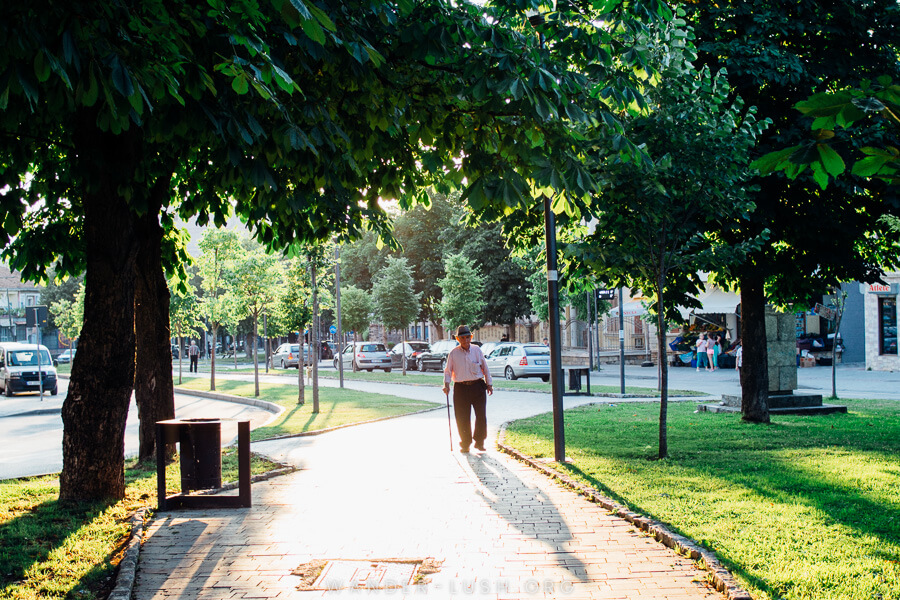
Albanian people are incredibly hospitable
Hospitality is serious business in Albania (yet another point of similarity to Georgia). In Albania, people are bound by Besa , a code of honour that dictates how others – especially strangers – should be treated. According to Besa, if someone approaches you for help, you accommodate them. If someone comes to you hungry, you feed them. This creed has shaped Albania into an immensely tolerant and welcoming nation.
After WWII, Albania was one of the few nations to emerge with a larger Jewish community – the nation protected its own and offered sanctuary to families fleeing from elsewhere in Europe. In the 1990s, Albania sheltered refugees from Kosovo displaced by conflict.
Today that same kind of generosity is extended to tourists. Kanun , the customary law of Albania, says that the master of a house should always have a spare bed ready for unexpected guests. While I wouldn’t recommend showing up on someone’s doorstep unannounced (Albania has Booking.com for a reason!), the takeaway is that Albanians will extend you a helping hand if and when you need it.
English is widely spoken, but not ubiquitous
Albanian is the official language in Albania but many people – especially those born after the fall of communism – speak a second language. As one person described it to me, Albanians are ‘thirsty to know the world’, and learning a foreign language is seen as a pathway to knowledge, experience and more opportunities.
English is the most popular second language and is taught in schools. At last count, around 40% of Albanians speak English. In my experience, anyone working in tourism or hospitality has at least a basic understanding of English. We got by in all the major cities and tourist destinations without any issues.
Albania is one of those countries where the language is so much more than a means of communication, it’s part of the culture and identity and a massive source of national pride. Learning a few words of Albanian will earn you big props.
Here are a few basic words:
- Hello – Përshëndetje (per-shen-det-ye)
- Bye – Mirupafshim (mi-ru-paf-shim)
- Yes – Po (po)
- No – Jo (yo)
- Thanks – Faleminderit (fal-e-min-der-it)
- Cheers – Gëzuar (ge-zu-ar)
There is a strong Italian and Greek influence
Albania is just across the pond from Italy and very close to Greece (especially Corfu). There were Italian colonists in Albania from 1926 onwards, and the country was actually invaded by Italy in 1939. Italy especially has a big influence in Albania – to such an extent that I noticed it right away.
You’ll see Italian cars, Italian coffee culture – and yes, pizza on almost every restaurant menu! Pizza is so popular in Albania, if you ever tire of local fare there’s always a Napoletana to fall back on.
Almost a third of Albanian people speak Italian and a quarter of the population speaks Greek. Many areas are officially bilingual Albanian-Italian, with road signs in both languages. If you know either of these languages, communication will come even easier to you.
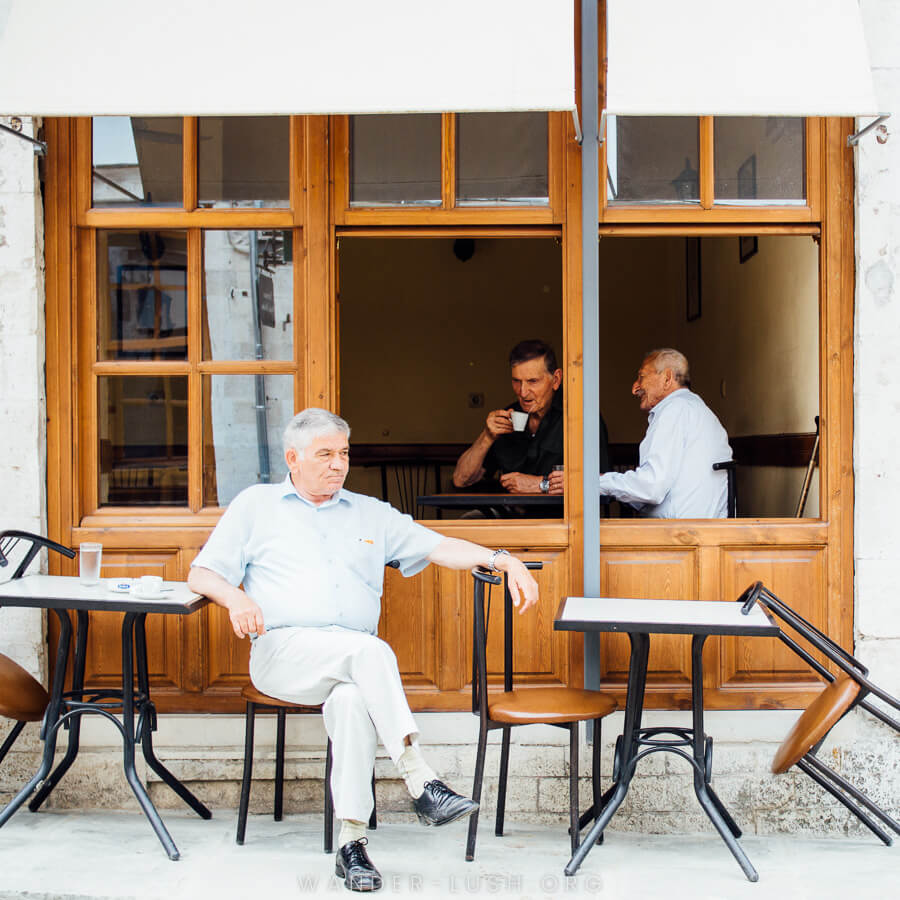
Tirana is one of the coolest cities in Europe – so don’t rush it!
Unlike a few other capital cities in the Balkans that are all cold concrete, Tirana is a warm, green, welcoming city that’s bristling with creative energy. I’ve said before that it’s probably the most liveable capital in the region in my opinion. There’s a park, dining precinct, cool museum or street art district around almost every corner.
One day in Tirana is enough for the must-sees, but I really recommend slowing down and spending a couple of nights here, getting into the rhythm of the city with morning markets and nightly xhiros.
We stayed in Tirana for a full week and still didn’t see everything.
Hiking in Albania is a must
I fell in love with Albania’s cities and towns, but even I agree that the country’s natural beauty is its biggest asset.
Albania has 15 national parks, each offering incredible scenery and hiking opportunities. As I recently discovered, Albania has more than 3,200 species of plants, accounting for a whopping 30% of the flora in Europe. One of the best places to appreciate this ecology is Llogara National Park, known for its wildflowers. Others, notably Butrint National Park, combine surreal landscapes with valuable archaeological sites.
Even if you’re an anti-hiker like me, there is one day trek in Albania you at least have to consider: Valbona to Theth . Walking between two alpine villages across two jaw-dropping national parks in the country’s far north, the trail takes you through the heart of the picturesque Albanian Alps or Accursed Mountains as they’re also known. The hike is tough going in spots, but it’s absolutely the best way to experience this side of Albania.
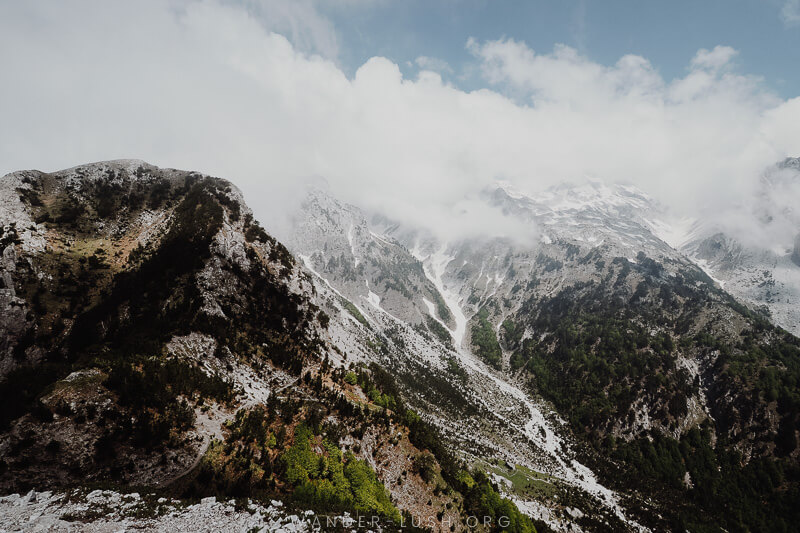
The lakes are just as impressive as the beaches
Albania might be famous for its beautiful beaches, but the unsung heroes of the landscape are the country’s lakes. Komani Lake, Lake Ohrid (shared with North Macedonia) and Skadar Lake in the north (shared with Montenegro ) are all beautiful and worth visiting.
Skadar is the largest lake in the Balkans. Boat trips on the marshy wetlands are popular on the Montenegrin side; on the Albanian side, you can cycle around the periphery from the lakeside city of Shkoder, visiting Rozafa Castle at the same time.
Albania’s share of Ohrid Lake is similarly smaller and with fewer points of interest to the North Macedonian side, yet charming villages such as Lin – a little red-roofed settlement on a natural peninsula – make it worth a visit. Lake Koman is my favourite. The ferry ride through the dramatic river gorge to reach Valbona and the starting point for the aforementioned hike was one of the highlights of my time in Albania.
There are more stunning water features around the country, including cascades and river canyons in the centre (Osumi and Begove near Berat are great), hot springs, and of course the famous Blue Eyes. All offer some much-needed reprieve in the hot summer months.
Have you been to Albania? Are there any extra travel tips for Albania you’d like to add? Leave your best advice in the comments below!
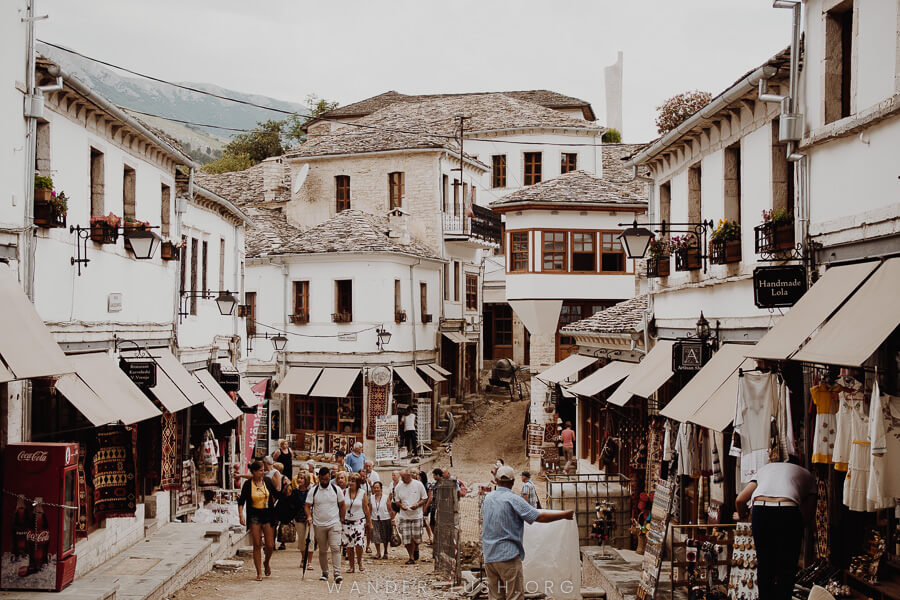
Albania Travel Guide
Discover insider tips, itinerary inspiration, and all the best things to see, do and experience in Albania!
Albania Essentials
My favourite resources and tools for planning a trip to Albania.
Find affordable flights to Albania
Book city tours & day trips
Hire a car in Albania
Get a visa for Albania
Find the perfect accommodation
Order the latest Lonely Planet
More from Albania
- 21 awesome things to do in Albania
- The perfect Albania itinerary
- 22 essential travel tips for Albania
- One day itinerary for Tirana
- Guide to the Valbona Theth hike
- Things to do in Gjirokaster
- Things to do in Berat
- Things to do in Korca
- Best beaches in Albania
- How to visit the Albania Blue Eyes
- 21 best things to do in Albania
- 22 useful travel tips for Albania
- Where to stay in Tirana
Leave a Reply Cancel reply
Your email address will not be published. Required fields are marked *
- Subscribe to future posts

Albania Travel Guide 2024 – Everything You Need to Know
Last Updated on August 7, 2024
This Albania travel guide is updated every month to give you the best and most up-to-date information on travelling Albania .
Not only that but I’m also a full-time resident on the ground and run the leading Albania travel blog so you get everything from a local perspective.
As Albania’s tourism is slowly increasing the demand for information is increasing too. Unfortunately, as tourism is still so new, it can be hard to come across factual and up-to-date information.
For example, bus timetables can change with a click of the fingers, and the only people who would know would be the locals.
Therefore, I have created this full Albania travel guide with all the information you need if you plan to visit Albania for the first time, or the next time!
💾 Albania is full of beautiful surprises.
I have lots of great information for you to use during your travels to Albania so make sure you bookmark this page so you can come back to it again and again.
Here’s your full Albania Travel guide!
Why should you trust my information? I have lived in Albania since 2017, so I have a great knowledge of the dos the don’ts, the best local spots to visit and the ones you should avoid!
Also, I have an extra local insight as my partner is Albanian.
Every month, I try to update this Albania travel guide, sometimes more often as new information comes up or as I explore new places.
If you like this Albania travel guide, then go grab a physical copy of my 170+ page comprehensive downloadable Albania guide here.
Read more: 11 lessons I have learned from living in Albania
Where is Albania?
Great question, and one that I’m often asked when talking to foreigners outside of Albania. Where the heck is Albania?!
Albania lies in South-Eastern Europe. Its neighbours are Greece to the south, Montenegro to the north and Kosovo and Macedonia to the east(ish).
Albania sits on the coast of the Adriatic Sea and is home to some of the best beaches in Europe.
Some of the best beaches are found in the Albanian Riviera which stretches from the city of Vlora (Vlore in Albanian) and the popular tourist city of Saranda (Sarandë in Albanian), where I have lived for 5+ years.

How to get to Albania
Albania can be reached in many ways by air, bus and ferry.
Flying to Albania
There is one international airport which is Tirana International airport, also called the Rinas International Airport or Nënë Tereza.
🧳 MUST-HAVE : Before you head out on your trip, make sure you have travel insurance. My #1 recommendation is SafetyWing ! Me and thousands of other travellers use it to stay safe on the road. Click here to check it out.
There is another currently being built in Vlora but who knows if/when that will be finished. I’ll keep you updated!
Flights in and out of Tirana can be expensive, however, Wizz Air and Ryanair have started a service which means sometimes you can grab budget-friendly flights to and from Tirana throughout the year which is great news for tourism. Check the latest prices and availability of flights to Tirana here.
Overland from Greece
You can easily catch a bus from Athens to Saranda .
It takes about 9 hours and costs around €35. You can also catch a bus from Ioannina which stops at Gjirokastër from there you can catch a bus elsewhere in Albania.
I have caught this bus a dozen times.
If you take snacks and download some entertainment on your phone, it’s not that bad. They do also stop a few times for snacks, lunch and coffee so it really isn’t that bad.
Ferry from Greece
Another incredibly easy way is Corfu! The island of Corfu is only a 25-minute ferry ride from Saranda.
The prices and times will vary depending on the season. You can find them here.
If you do decide to catch the ferry, especially in the summer, make sure you book a few days before because they can get booked fast and you may miss out.
Corfu does direct flights to a bunch of other European countries. If I want to fly to the UK I will fly out of Corfu as EasyJet does cheap and direct flights from there!
This can be a great way to get to Albania with a quick stopover in Corfu.
Usually, you will have to stay in Corfu the night depending on when your flight is but it’s a good excuse to explore the island as it’s very beautiful too. Check the prices and availability of flights to Corfu here.
Read more : How to get from Corfu to Saranda
Overland from Montenegro
If you’re coming from Montenegro there are buses between Kotor and Podgorica to Shkodër and Tirana. If you want to head towards the south, you will have to change buses in Tirana.
Overland from Macedonia
There are 3 buses from Skopje to Tirana (8:10am, 8:45am and 9pm). Please check with your accommodation that these are still the times that the bus leaves as in the Balkans bus timetables frequently change!
Overland from Kosovo
If you are coming from Kosovo there are regular buses from Pristina to Tirana. Then if you want to visit other places around Albania you can go to the regional bus station and catch a 2nd bus to wherever you want to go.
Boat from Italy
You can catch a boat from Durres to Bari and Ancona.
There are several crossings per week but it’s best to contact the ferries themselves as crossings and prices change from month to month.
🎟 Get access to thousands of airport lounges with ONE discounted pass. Grab your Priority pass today .
If you can weirdly transport yourself to Albania using time travel then I don’t have any information for you, but congratulations, that’s an awesome skill to have!

Recent History of Albania
Albania’s history is beyond fascinating compared to some other countries in the world.
From 1941 to 1992 Albania was under the strict communist regime of the leader Enver Hoxha.
Everything was controlled, from food to housing and jobs.
Some compare it to North Korea, but only those who lived through communism will know.
There were labour camps where political prisoners were sent if they said something that the communist leader did not like.
The prisoners built the infrastructure that Albania sees today.
After the collapse of communism, Albania saw itself as a democracy.
Unfortunately, in 1997 the government collapsed after a dodgy pyramid scheme.
Over 2/3rds of the population invested their life savings into this scheme which meant most people lost everything they had worked hard for all those years.
The civil unrest saw a lot of anger and violence from the citizens of Albania, many fled from the country for a better life.
The civil unrest went on for 6 months and when visiting Albania, you will see for yourself that Albania is still recovering.
There is still a lot of corruption within government sectors today. It seems every day there is a new person whose corruption has been exposed.

Ancient history of Albania
Many only discuss communism and the civil war as the history of Albania but the real history dives way older than that.
If you move to Albania, you will find yourself in many conversations with locals about ancient Albania and the Illyrians who many believe are older than the ancient Greeks.
There is so much that hasn’t been uncovered and publicized about Albania’s ancient history.
The ancient site of Apollonia which is in Fier and is a popular site to see if anyone who loves ancient history, is less than 5% excavated.
One of the biggest ancient graves have been found near Korca in 2018 which archaeologists believe are more than 5000 years old!
Butrint National Park is also a great UNESCO site to visit if you want to learn more about the rich history in Southern Albania.
Read more: 5 Best Albania UNESCO Sites to Visit

Language of Albania
Shqip is one of the most fascinating languages I have come across and one of the hardest to learn (in my eyes!). It’s an Indo-European language that relates to no other language in the world, it has its own roots.
The North and South speak different dialects. In the south they speak Tosk, and, in the north, they speak Gheg.
Usually, the two different parts can understand each other a little.
I found myself in a hostel in Kosovo with a girl from the north and a girl from the south and they were speaking English together because they could not speak Albanian together!
The younger generation in Albania mostly knows some English as they are taught in school. The older generation you will find speak none such as the adorable Albanian grandmothers.
You don’t have to worry about the language barrier when you travel to Albania as you can always get past it with some English and sign language.
If you really want to impress the locals when you come to Albania it’s a great idea to learn a few words. Albanian people love it when people try and speak the Albanian language.
It’s always met with a smile and a little giggle.
- Pershentdejte – Hello
- Faleminderit – Thank you
- Gazuar – Cheers or Salut!

Capital of Albania
The capital of Albania is Tirana.
There’s a lot to see and do in Tirana and it’s fast becoming a tourist mecca of trendy cafes and bars and a great place to learn about the recent history of Albania.
I have a full Albania travel guide on the best things to do in Tirana as well as my recommendations on restaurants and hotels below.
The capital city is a great place to base yourself while doing the odd day trip around the local area because there’s SO much to see in this part of the country. Click here to read about the best daytrips from Tirana.
Read more: 19 best things to do in Tirana

When should I visit Albania?
I have a full article on the best times to visit Albania below.
My favourite time is spring because in the south especially, the beach bars start to open, the sun is out and in full swing, and it’s just a little quiet.
Plus if you’re on a budget, then this is a great time before the prices rise in the summer.
Albania has the ol’ Mediterranean climate so during the summer it can get very hot and dry.
Below I go into detail on the pros and cons of travelling at any time of the year.
Read more: The best time to visit Albania
Travel insurance in Albania
If you’re going to travel in Albania, I personally would look into SafetyWing Travel Insurance, you can read more about it here . They have two great plans whether you are on a budget or want a more comprehensive insurance plan.
No matter where in the world you are from, or where you are going, they can hook you up with the best deal!
➡ Get an instant travel insurance quote here

Albania Holidays and celebrations
1st January – New Year’s: As Albanians generally don’t celebrate Christmas like elsewhere in Europe and other parts of the world, they go all out for New Year’s!
They usually gift presents and see the New Year in with their family then go out and party until the sun rises.
Apparently, this tradition came from communism as all religion was outlawed and the only holiday that isn’t religious is New Year’s. So, because of that, Albanians only could celebrate one holiday a year.
👯♀️🌎 Take the stress out of travel completely, meet lifelong friends and join a Contiki Tour (It was one of the BEST things I ever did when I started to travel). Contiki takes care of all the details like transport, accommodation & experiences so all you have to do is show up, have fun and see the world with new friends. Click here to check out their latest deals .
14th March – Dita e Verës (Summer Day): This is one of my favourite days in Albania, as it’s the start of spring, is always a great day!
This is the biggest pagan holiday and an important holiday for Albanians and throughout the Balkans. It celebrates the first day of the Albanian ancient calendar as well as the end of winter and the start of summer and the rejuvenation of nature.
If you want to celebrate this day then head to Elbasan. Here is the centre of celebrations with concerts and festivities for the day. People also make and eat ballakume – a sweet cookie.
You will notice people wearing a 2-string red and white bracelet named ‘verore’ which many start to wear March 1st. After dita e vere is over they then tie the bracelet to a tree for good luck.
28th November – Flag and Independence Day: This is the day that Albania declared its independence from The Ottoman empire. It was proclaimed in Vlore in 1912.
Only 6 days later the first government of Albania was created and led by Ismail Qemali.
A prominent moment was when Ismail waved the first flag of independent Albania from the balcony of the assembly of Vlora. This flag was inspired by Skanderbeg’s (a national hero) flag which had been used 400 years beforehand.
29th November – Liberation Day: The day after Independence Day Albanians also celebrate liberation day.
This day celebrates when the country was liberated from Nazi Germany during World War 2.
25th December – Christmas Day: Albanians don’t celebrate Christmas day like other countries. New Year is more celebrated.
On Christmas day all the shops run as normal and the day continues like any other day. However, New Year’s is a different story.
Read more: Festivals in Albania

Prices in Albania
Albania is an incredibly affordable destination. This is the reason why many choose Albania as their holiday destination.
You can grab a beer for about €1-2 and a meal between €5-10. A hostel bed with breakfast and a beer can cost as low as €10 and a hotel room for around €20-50.
There are many great options for all budgets, whether you’re a backpacker and want to stay in the best hostels , are in the mid-range and want nice hotels that don’t break the bank or prefer a more luxurious holiday within these must-stay luxury Albania hotels .
If you want more of an adventure and plan to hike around the country, here are the top campsites in Albania to stay in!
If you are thinking of a more permanent move then you check out my article where I go through the prices of renting, food and utilities.
It’s also helpful if you are just visiting as it gives you an idea of what you should pay for different things.
Read more : Cost of Living in Albania
Read more: Getting a long-term visa in Albania

Best places to stay in Albania
There are several accommodation options for travellers coming to Albania.
In each of my destination Albania travel guide, I recommend the best places to stay in that city or town.
You can book easily through Booking.
Here are some quick links to destination, hotel and activity guides that will be helpful during your stay in Albania:
Tirana travel guides
- The Most Incredible Hotels in Tirana
- 15 best bars in Tirana to check out
- 16 best restaurants in Tirana
- Top 12 day trips from Tirana to try
Saranda travel guides
- 20 Incredible Hotels in Saranda
- Best things to do in Saranda
- Best restaurants in Saranda
Ksamil travel guides
- 17 best Ksamil beaches to visit
- 10 best hotels in Ksamil
Berat travel guides
- 12 hotels in Berat to stay in
Northern Albania travel guides
- Things to do in Theth, Albania – Home to the famous Albanian Alps
- Kruja Guide
- Cape of Rodon (Durres) Guide
Southern Albania travel guides
- Best things to do in Gjirokaster
- 7 best hotels in Dhermi to stay in
- Qeparo Guide
- Himara Guide
- 13 Amazing Things to do in Korca, Albania
- 8 Things to do in Permet, Albania – Full Travel Guide
- Ali Pasha Castle (Butrint)
- Visiting the Beautiful Blue Eye, Albania (Syri i Kalter)

What it’s like to travel to Albania
Travelling in Albania is something you may have never expected.
Many expect Albania to be dangerous, not friendly and ugly but people are surprised that none of those is true.
Albania is safe for tourists.
The Albanians are some of the friendliest and most welcoming locals in the world. They will treat you like one of their own.
Albania is far from ugly. The pristine beaches, mountains and people confirm that. Albania tourism is thriving!
When you travel to Albania, you shouldn’t plan too far ahead. Everything is flexible, from bus timetables to itineraries.
I would suggest having a rough plan but the option to be a little flexible with it.
Read more: 35 Unique Things to do in Albania

Where to go in Albania
Albania is full of scenic, historic and interesting places to visit.
You can see the article below which goes into detail of the best places to visit including tourist and local spots which most tourists don’t even know about.
- Read more: 24 Incredibly beautiful places to visit in Albania
- Read more: 10 incredible cities to visit in Albania
- Read more: Theth- Valbona hike: Best hike in Albania!
- Read more: 14 most must-visit castles in Albania
- Read more: 5 best hikes in Albania
The best beaches in Albania
My favourite part of Albania are the beaches. It’s what made me fall in love with Albania in the first place.
I have tried and tested just about all the beaches in Albania and all the beaches located within the Albanian Riviera .
Below you can check out the ones I recommend visiting.
Read more: 17 of the most beautiful beaches in Albania

Holiday Itineraries for Albania
Below you can read how to spend 1 week in Albania and how to spend 10 days exploring the country! You can get more holiday itineraries in Albania by purchasing my itinerary pack here.
Read more: How to spend 1 week in Albania
Read more: South Albania Itinerary: 10 Days in the Albanian Riviera!
What to pack for Albania
If you’re stuck on what to pack for your trip to Albania, check out my Albania packing list before you start jetting off on your holiday!
Otherwise read below for my must-have top picks for any holiday.
🧳 Anita’s Packing Must-Haves: Don’t leave home without these must-haves in your suitcase!
1️⃣ Travel sandals: Burkens are my must-have travel sandals that are durable, comfortable and you can wear them with every outfit 🩴 Click here to grab them.
2️⃣ Priority Pass: Get access to hundreds of airport lounges worldwide for the price of ONE discounted pass. 🎟️ *ahem* My favourite part may or may not be the free food and champagne 🤣 Click here to get your pass .
3️⃣ Power bank: I don’t travel anywhere these days without a power bank. This helps me keep my phone charged at all times to keep watching Below Deck whilst travelling ⛵️. Click here for my favourite one .
4️⃣ Sony A7iii : I’ve used this camera since 2019 so nearly every photo you see on this website was taken with the help of this exact camera 📸. It’s truly THE best camera I’ve had. Click here to check it out.
5️⃣ Lifestraw Water Bottle : Skip paying for bottled water and instead get a Lifestraw Bottle that you can refill anytime anywhere! 💦 It transforms dirty water into safe drinking water by removing bacteria and parasites with its filtration system inside the bottle. Plus for every product purchased, a school child receives safe water for a year . Click here to grab yours .
Facts about Albania
There are many interesting things to learn about Albania.
I have included them all in the article below. Click to check them out!
Read more: Facts about Albania
Health and safety in Albania
Is Albania safe? This is such a popular question and one of my most viewed articles on Albania answers just that and goes into detail (read below).
Yes, Albania is a safe country to travel whether you’re a family, couple or a solo traveller (female and male). Petty crime like pickpocketing is non-existent.
You will notice that Albanians have the best hospitality, maybe in the world! Everyone is very helpful and if you’re very stuck in a situation there will most likely always be someone to help you.
If any other Albania travel guide tells you otherwise, they’re wrong!
The only thing you have to watch out for is taxi drivers as most of the time they will try and charge you 2 or 3x the regular price.
Read more: Is Albania safe?
Wi-Fi in Albania and getting a sim card
Believe it or not, I have found Albania to have better Wi-Fi than in New Zealand. It’s fast and reliable.
As I now live in Albania, I have a Wi-Fi router which was free to set up and cost me 2000 lek per month. Most accommodation options and restaurants will have Wi-Fi.
If you would like to get a sim card you can do so at any of the Vodafone shops around. There’s one at the airport if you fly into Tirana.
They will get you set up on a local sim fast and easily.
For under €10 you can get 5MB of data and I have found that you will most likely get another 5MB free!
Can you drink the water in Albania?
I wouldn’t recommend drinking the water in Albania. The water throughout the country has high levels of chloride and heavy metals.
I used to drink the water myself but noticed after a couple of months I started to experience bad stomach pains.
Then, I found that none of the locals drink the water, that’s when you know to not drink it!

Cultural norms in Albania
Staring: In Albania, it’s totally normal and encouraged to stare. You may find at the start it might be a bit uncomfortable, but you will have to get used to it!
I have had old men stop in the middle of the street to just stare at me. Nowadays I just try and laugh and give a good old stare back!
Expressing: Albanians are very expressive. They love to move their hands when they talk.
Albanians are also very loud. Most of the time they are just having a conversation but sound like they are arguing.
The headshake: In some parts of Albania, they will shake their head side to side for a yes and up and down for a no.
They also shake their head side to side when they are listening in a conversation. It can get very confusing, especially if you’re asking a question and the answer is yes but their head is saying something else.
Grunting: Upon my observations, while living in Albania, I have noticed that Albanians grunt a lot.
In fact, I have listened to a whole conversation once with just grunting and noises instead of words. Super interesting.
Communication: If you want to know about how your weight is doing, ask an Albanian. Don’t be offended if Albanians say that you look thin or fat.
Weight is not something that’s a taboo subject to them. I still struggle with this if I’m honest. Although, when I’m having a skinny day, it’s the best confidence boost.
Dress: you’re welcome to wear whatever you like during your time in Albania. The women make a big effort when it comes to dressing up.
They love to wear big high heels and dresses that I would only wear once in my lifetime, to the local club. I always feel underdressed at a club or sometimes even walking down the street.
The older men usually wear suits, yes suits! Just for having a coffee! Pretty impressive huh.
You may notice that most of the older women in Albania are wearing all black. There is a reason for this. This is to pay respects to loved ones that have passed. They usually wear this for as long as 10-20 years after that person has passed away.
Greetings: Albanians will usually greet you with a kiss on each cheek or a handshake.
When older women greet younger women, you will normally get a million kisses, a pinch on the cheek and squeezed until you can’t breathe.
Dating: Some families still arrange marriage but nowadays this not common at all. Sometimes the family will be open to their son/daughter dating a foreigner. I have only heard from one girl I met that it was a problem for her, and she wasn’t accepted into the family.
From personal experience, I have an Albanian boyfriend and his family have welcomed me like I’m their daughter.
However, dating is not really something that Albanians do. But saying that, if you’re looking for an Albanian boyfriend you will easily find one.
If a single man goes out with a single woman, it’s usually considered that they are together.
So, ladies, if you do go to dinner with a man make it clear that you want to get to know each other and going for dinner doesn’t mean you’re boyfriend and girlfriend.
Men generally don’t like women who have dated many other men in that city/town too.
Albanian men will do anything for their girls and can usually be quite possessive. They will get jealous easily if you do have guy friends. Don’t take offence to this though, it just means they care and they will openly tell you that.
Gender roles: Albanian women generally look after the house and the men work for the family.
This is how most families work in Albania but today it’s now common for women to be working too. Gender roles are still very much prominent in Albanian society.
As unemployment in Albania is very high, a lot of men will sit in coffee shops for much of the day.
Albanian flexy time: If someone says to meet at a particular time it usually means at least half an hour after that. It’s considered polite to be late.
Even Dr/dentist appointments are merely suggestions. No wonder nothing gets done in Albania quickly.
Albanians don’t like commitment so arranging things ahead of time probably won’t end well.
Superstitions in Albania
I’m currently constructing an article on Albanian beliefs. In the south, there are many things that Albanians believe in. For example:
- If you have finished a glass of raki and you order another, the waiter will pour the raki into the cup you are already using. They will never give you a new cup. This is because if you change the cup, you can lovers!
- You may notice stuffed toys hanging outside houses/apartments. This is to ward off bad spirits.
Corruption in Albania
I try to be very honest in this Albania travel guide when it comes to corruption. Unfortunately, corruption in Albania is still alive and well.
It’s not something that you really have to think about unless you do something that’s illegal.
Corruption is slowing down though if you compare it to five years ago, or maybe it’s that you just can’t see it as obvious anymore.
Things are slowly changing for the better.

Driving in Albania
If you visit Albania it can be a great idea to hire a car in Albania . That way you will see more of the country and get to stop at all the great hidden spots most tourists would completely miss.
🤫 Insider Tip: The best way to explore Iceland and get off the beaten track is to hire a rental car and explore the area 🚗 Our #1 recommendation is Discover Cars which caters to over 145+ countries around the world. Click here to get an instant quote .
When it comes to driving in Albania, it should come with caution as signs and road laws seem to be merely suggestions for Albanians.
Speeding, weaving in and out of traffic, overtaking on blind corners etc is very common.
When driving in Albania always drive with caution and beware of all sides of the car as people can and will overtake you without your knowledge.
You MUST put your lights on when driving in Albania.
There is a law that states it. Whether the law is followed through, that’s another story. Better to leave them on than not.
Another thing that they are very tough on is always carrying your drivers’ license.
Albanians can be put straight into jail if they don’t have their license on them when an officer asks. This applies to foreigners.
I have had friends who didn’t have their licences on them and it was a horrible experience. There was a lot of shouting, taken ‘hostage’ in a police station and a huge hassle!
So please, always carry your licence.
Read more: How to Hire a Car in Albania

Religion in Albania
Talk to just about any Albanian and they will tell you that religion doesn’t matter. They don’t care what you believe in, it’s your choice.
Albania is a Christian country, then after the Ottoman empire, it became predominately Muslim.
However, during communism, all religion was banned so it became the first atheist country.
Nowadays many online articles say that the Albanian population is predominantly Muslim, which is somewhat untrue.
If you do come across someone who is a Muslim you probably won’t even notice because pork is eaten, alcohol is drunken, and no one follows any sort of rules.
Drone flying in Albania
You can fly your drone everywhere except near Tirana airport of course and military spaces.
As of now, there are no laws on drone flying in Albania.
There was speculation that there was, but my partner has personally checked with officials and you can fly anywhere that’s not airspace.

Transportation
I have a full article on transportation below! The most popular way of getting around is by public transportation which only consists of busses.
You can also hire a car if you feel comfortable enough to drive.
Backpackers quite often hitchhike through the country which is completely safe. Albanians often hitchhike themselves so it’s very common.
Read more: Getting around Albania
Read more: Albania bus timetables

What to eat in Albania
There are many delicious foods you should try during your time in Albania. Albanian cuisine is fresh, healthy and very delicious.
They use a lot of olive oil, white (feta) cheese and eat lots of fruit.
Albania also does great Italian food. Many Albanians moved to Italy after communism and the civil war, and brought back their skills of Italian pizza and pasta.
Greek food is also readily available.
In the south and along the coast of Albania they eat a lot of seafood.
What I love about Albanian food is that everything is fresh and comes from the local garden, so you always feel full and amazing after a meal!
Read more: 39 Delicious Albanian Dishes to Try!

What to drink in Albania
Raki is the national drink. It’s an alcoholic spirit which can be between 20-80% and the dangerous thing is, you never really know how strong it is.
Many families brew their own raki. You will see old men with their glass of raki with their morning coffee. They use it for health and to ‘keep strong’.
They also use raki in hospitals as a serializer for wounds.
If you have a cough or cold, someone will probably recommend that you drink Raki.
Albania also has its own beer. There’s one called Korca and one called Elbar.
There are also some delicious Albanian wine and great wineries to visit in Albania.
There are 3 around the town of Berat. My favourite is Çobo. You can go there for a tasting and for €14 taste 4 wines and a little food platter with olives, cheeses and bread!
Join my travelling Albania Facebook group!
I have created a group on Facebook called ‘Travelling Albania’. It’s a great group where we help each other with any questions you may have about travelling or living in Albania. Make sure you join below!
🌍 Join the Facebook group here
If there’s something else that you didn’t find in this Albania travel guide then let me know in the comments so I can be sure to add it!
I try to create as much new and valuable content for this Albania blog as possible.
Other Albanian articles you will love:
- How to Find an Apartment to Rent in Saranda, Albania
- 17 best Albanian souvenirs to buy
- 9 Reasons Why You Need To Visit Albania
- Backpacking Through the Balkans: From Bosnia to Albania
Love this Albania Travel Guide? Pin it for later!

Other articles you will love!

Mediterranean Diving: 7 of the best places to dive in the Med
Last Updated on July 2, 2021 It can be surprising to think that vibrant coral reefs and marine…

Albania Itinerary: 1 Week in Albania (7 Days)
Last Updated on August 2, 2024 If you decide to come to the beautiful Mediterranean paradise that is Albania,…

UK Youth Mobility Visa For Kiwis moving to the UK
Last Updated on March 2, 2021 I have spent a bit of time gathering up information and everything…

The Most Incredible Hotels in Tirana, Albania
Last Updated on March 25, 2024 If you’re looking for the best places to stay and hotels in Tirana,…

The Most Beautiful Accommodation in Corfu Town, Greece
Corfu is a beautiful island off the east coast of Greece in the dazzling blue waters of the Mediterranean. …

17 Incredible Albania Beaches to Visit in 2024
Last Updated on March 14, 2024 To be completely honest, Albania beaches have some of the most beautiful beaches…
29 Comments
Thank you for all your insight into Albania! You are living the dream! I find myself drawn to this area of the world more and more.
Question: my partner and I will be in Athens in May and would like to travel along the coast north. I appreciated your post about taking the bus to Sarande (and this one about renting a car in the Albania). Have you ever seen/heard of the possibility of renting a car to drive from Athens/Sarande through Montenegro to Croatia? Thanks!
Hi there! Thanks for a great and informative read. I’m also a fellow kiwi and my partner and I are about to cross from Corfu to Albania! I was curious as to where this new market is in Tirana you spoke of? Google maps hasn’t provided me much insight. Your help would be greatly appreciated. Many thanks!
Hey Georgie, the market is called ‘Pazari i Ri’ in Albanian 🙂
I have a question I hope you’ll be able to answer. I’m visiting Albania this August with my boyfriend. We plan on backpacking through the country. I’ve read and heard that Albanian people tend to be quite racist towards black people. My boyfriend is black so this concerns me. Can you tell me more about racism in Albania?
Thanks in advance!
Hey Maxime, Thanks for your comment! I’m glad that you have chosen Albania as your holiday destination. To be completely honest, I have heard both positive and negative stories about racism in Albania. As I don’t have any personal experience myself I don’t think I am equipment to answer that question, but I highly recommend joining my Facebook group ‘travelling Albania’ and asking in the forum as there might be people in there who have had some personal experiences! 🙂
Thanks for your reply! I can’t seem to find your facebook group. Can you maybe post the link? Thank you!
Hey Maxime, you can find it here: https://www.facebook.com/groups/travellingalbania/
Hello! I travel to Albania all the time since I know a lot of Albanian people there. So very very much to explore and I do that both with my Albanian friends and with Swedish tourists who I bring to share it with. I should say that the water is very clean and the best possible to drink, at least in the northern regions like Dibra and Tropoja. You can fill your bottle with cold fresh water directly from the mountains at a lot of places along the road, even around Gjirokastër in the south. Also when you buy coffee you often get a glass of water. Don´t be afraid to drink that! I guess only in the biggest cities you should be better off buying your water, which is very cheap but sadly do contribute to the plastic bottle consumption.
Hey Ingrid, yes you’re right! If you can get water straight from the mountain then it’s amazing! Unfortunately nearly all over Albania, it’s not advised to drink water from the tap. There have been tests done in Tirana and Saranda by people I know and they have come back unsafe to drink. I try to get water from the local spring just of Saranda but unfortunately, I do have to buy most of my water when I can’t get there 🙁 Hopefully, Albania can provide fresh drinking water from the tap for their citizens soon!
In my native town Tepelena, we drink from the tap, is good.
Hi Anita – thanks for the wonderful guide. Regarding driving, is it expected to have an international driving permit, or a regular drivers license (in my case the US) okay?
Trying to avoid a situation like the one you mentioned!
Hey Shawn, yes as you are from the US you will need an international drivers license. You can only use your own license if you are from the EU 🙂
Anita, thank you, thank you, thank you! Your guide is helping me a lot!! The information is very valuable. Next week I’ll be there, yuhu!
Hey!! Major thanks for this guide! You helped me a lot!! Although, I always thought Kukër airport is international too, no?
Yes, there is but as far as I know they do not do commercial international flights. I read somewhere that they might start opening it to some low-cost airlines in autumn 2019
Hello, thank you for this wealth of information! I have been fascinated with Albania for years. However, I need your advice, I am in Croatia now, looking into traveling through Albania. But I am concerned about road conditions, and running buses, especially after the recent earthquake. Would you advise me to try this trip, or avoid it for the time being? Thank you for your time and consideration! Tom
Hello! Thanks for the inspiring stories! I do not find any information about grave and burial culture. In each of the countries I visit, I’m visited a some cemetery. I find it interesting to know about other different traditions. What would you recommend to visit? Best regards!
Hi FAB information thanks for the Blog after reading it really looks and sounds perfect. I have just started my nomad journey this year but stuck in two countries due to awful Covid situation. Albania sounds perfect. Being EU citizen I have read up on the 1 year temporary residence visa which I may apply during my 90 days. Please can you please advise as some requirements are not fully detailed on the government webpage. 1. Do I need my birth certificate? (as this would take me long time to arrange) or only passport? 2. I note I need a medical certificate from Armenian Hospital, I am unable to find the full listed details of the tests. What does the health examination entail please? Is it just general health check or a full health screening blood work (what tests) , X Ray etc. 3. Is it easy to obtain / register for a tax number? 4. Would I need to start a business LLC in country, to provide support in my application? (even though my online work is still fledgling as I live on savings and rental income) 5. How long does the process take, normally I am plan to travel early January Thank you very much jo
I would like to visit Albania for the first time as a digital nomad but I’ve heard that there are frequent power cuts. Is that true?
Your blog is a treasure! Thank you so so much. I’m hoping to travel to Albania at the end of this May. Any recommendations on traveling to Albania during the pandemic? Thank you so much!
Dear Anita, Thanks for all the information about Albania, knowing the conuntry sounds amazing! My wife and I want to spend 3 weeks all around the country in July, focusing on the beaches, but I am afraid about the influx of people and covid precautions on them. As you live there, how full use to be the albanian riviera beaches during July? We would appreciate too your recommendation on “special beach places”.
Thanks in advance, Warm regards!
Read your blog with interest Can you advise some acco near prespa lake Not in Podugorce Or a trip for 3 days from kasmil to Prespa Thank you swarup Kumar
Hi Anita, I just found your blog and am very impressed so far. I find myself with the unexpected opportunity of staying in Finiq near Saranda for a while, and wanted to check in to see whether you have done any posts about crafts and artisans in Saranda and surrounding areas, or at least any coverage of souvenirs unique to the area or wider Albania? My primary interest is in the ethnographic and photographic documentation of traditional skills, so I am researching what potential there may be. Also, can you advise me on the importation and use of drones in Albania, and whether places such as Butrint need permits or advance permission? Thanks!
Your travel guide to Albania looks amazing. My friend and I are thinking of going to Albania, we are both in our 70’s but are fit and like travelling. Can I pick up a hard copy of your guide in UK? I can see Amazon sell it in the US but cannot find it in Britain? Thanks Louise
Wow! What a fantastic resource, thank you! I’m a travel writer in Canada, and we’re heading to Albania in autumn – can’t wait to put your advice into practice.
An absolutely fabulous article. Thanks.
Leave a Reply Cancel reply
Your email address will not be published. Required fields are marked *
Save my name, email, and website in this browser for the next time I comment.
Get a FREE Essential Travel Apps and Websites Checklist!
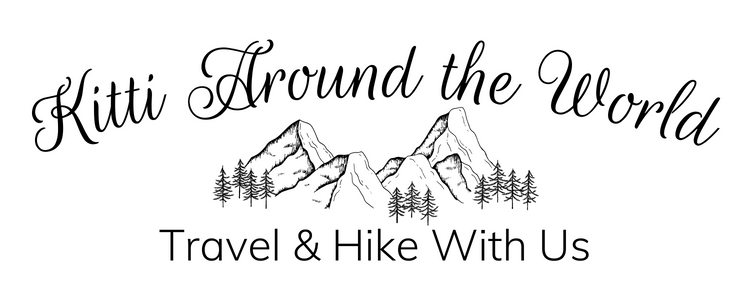
Albania Travel Tips – All You Need to Know Before Your Visit
Are you planning a trip to Albania and would like to learn more about it prior to your trip? If so, then in this Albania travel tips post you’ll find answers to common questions such as safety, cost, what to eat and how to travel across the country with different modes of transportation.
We only spent two weeks in Albania , which definitely doesn’t make us experts on the country. However, as always, we did a ton of research prior to our visit. Therefore, the mixture of our research and personal experience will help us to answer some general questions you’ll probably have before your trip.
Note – It’s important that you do your own research too and check official websites as well as other blog posts. Everyone’s experience in a country will be different, so also bear in mind that this is just what we experienced.
Disclosure: This post may contain affiliate links, which means we may receive a small commission if you click a link and purchase something. Clicking these links won’t cost you anything, but it will help us to keep this site up and running! Learn more about our affiliate policy.
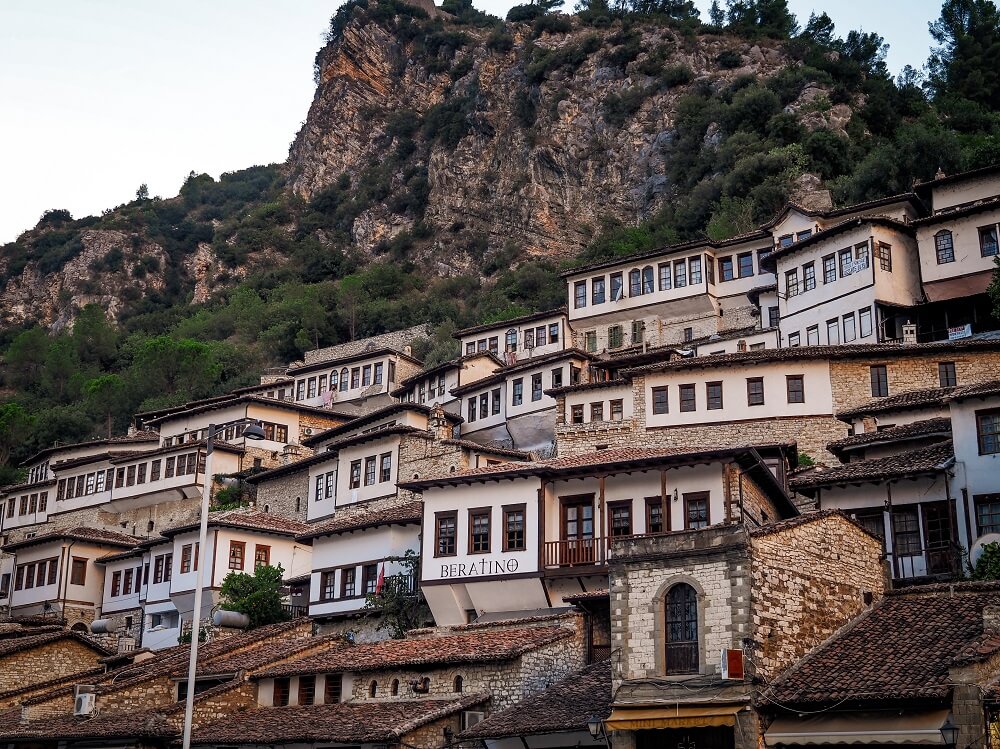
Table of Contents
Introducing Albania
Before jumping into our Albania travel tips let’s get to know the country a bit more. Albania is a fascinating country in the Balkans and you could spend days just learning about its history and culture. Without going into too much detail, we’ve collected some interesting facts and information about the country:
- Albania shares land borders with Greece, Macedonia, Serbia, and Montenegro. Its capital city is Tirana.
- The country was under Ottoman rule, and declared independence in 1912. Later, it was under Italian rule, then communism, Russian, and Chinese rule before they achieved independence in 1991.
- There are more than 750,000 bunkers across Albania. They were built under Enver Hoxha, Albania’s communist dictator, in case of a nuclear invasion. Many of them now operate as museums.
- Under communist rule, religion was banned in Albania which made the country the first atheist one in the world. That has now changed and the country is a self-proclaimed secular state that allows freedom of religion.
- Albania is a member of NATO, but it is not a member of the EU. Although, the Euro is widely accepted as a method of payment.
- Albanians end their day with a xhiro which is essentially a sunset walk after dinner. We loved seeing people out and about chatting with each other.
- Apparently locals will shake their heads when they mean yes, and nod when they mean no. We tried to follow this but got very confused at times.
- Albania is home to Europe’s oldest lake, Ohrid, which has many fossils at the bottom. Their biggest lake is Lake Shkodra, although only about one-third of it is in Albania.
- Most of the country is mountainous terrain, so it’s a paradise for outdoor lovers like us. However, it has just as many stunning beaches along its coastline.
Our Top Travel Resources to Visit Albania
- 🛏️ Find your accommodations with Booking.com
- 🎫 Book an organised tour in Albania with GetYourGuide
- 🚗Hire a car with Discover Cars
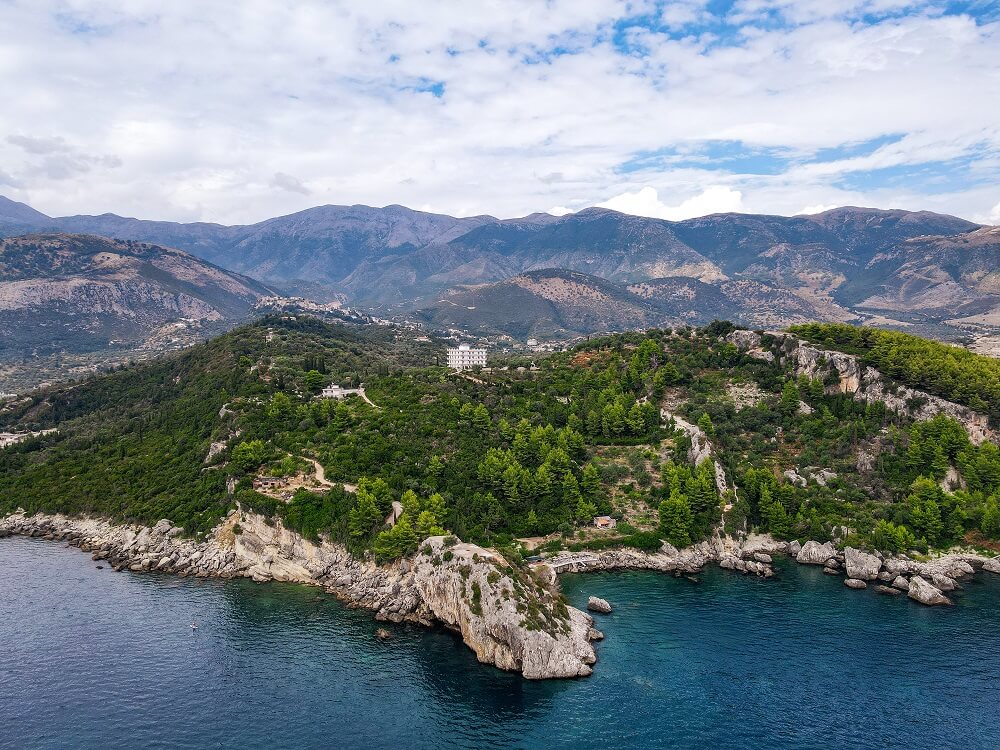
General Albania Travel Tips – Answering Your FAQs
In the first section of this Albania travel tips post, you’ll find answers to a lot of frequently asked questions about the country.
Please note that these answers are based on our own research done before visiting the country and our own experiences after spending two weeks there. Make sure to cross reference with different websites and blog posts!
Before you travel to Albania, make sure to have good travel insurance! Most likely nothing will happen to you, but it’s important to have some just in case.
Q1: Is Albania Safe to Visit?
We found Albania to be a safe country to visit.
According to the UK Foreign Office, public safety is generally good, and there are very few reports of crime aimed at foreigners or tourists. Of course pickpocketing can happen, so just bear that in mind when walking around.
Albania is definitely one of the friendliest countries we’ve visited so far. Everyone we met during our time in the country was welcoming and were willing to help even if we had to use Google Translate to have a conversation. Albanian hospitability just never stopped amazing us and there was even a time when we received free freshly baked cakes at a restaurant.
We travelled by local buses across the country and always felt safe on any kind of public transportation. Drivers and ticket officers were always helpful with directions and timetables. Of course, we still advise being vigilant and keeping your belongings close to you.
For more official safety advice please visit the Government’s website.
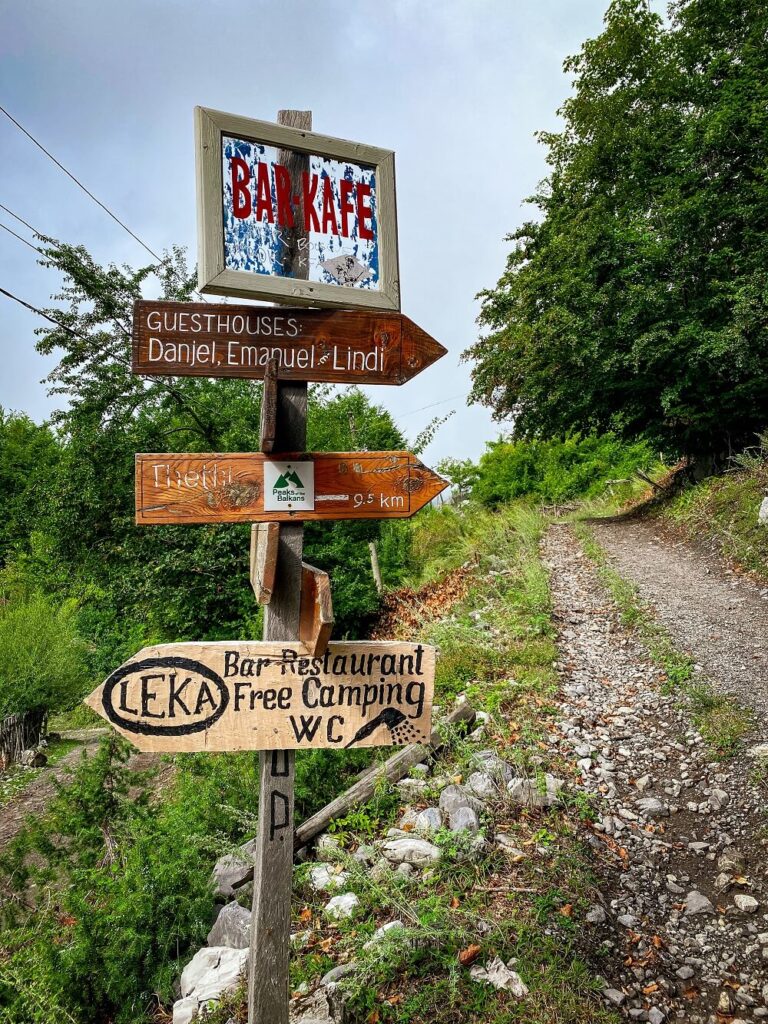
Q2: Can You Get Around Albania Using Only English?
Nowadays, many Albanians learn English as a second language, especially due to the fact that more and more tourists are visiting the country. Most people who work in tourism will have a basic level of English. We still advise you to download Albanian on Google Translate so you can use it offline anywhere in the country.
English, however, isn’t the only language Albanians speak. Quite a large number of the population speak Italian and/or Greek.
The Albanian language, Shqip , is actually quite unique and very different from their neighbouring countries. It is considered an Indo-European language but its exact origins are still a mystery to linguists.
One of our favourite Albania travel tips is to learn and use a few basic phrases when you’re in the country. Saying ‘hi’ or ‘thank you’ in someone’s native language is always appreciated and can go a long way. Here are some basic phrases:
- Hello – Përshëndetje ,
- Thanks – Faleminderit ,
- Bye – Mirupafshim ,
- Yes – Po ,
- No – Jo .
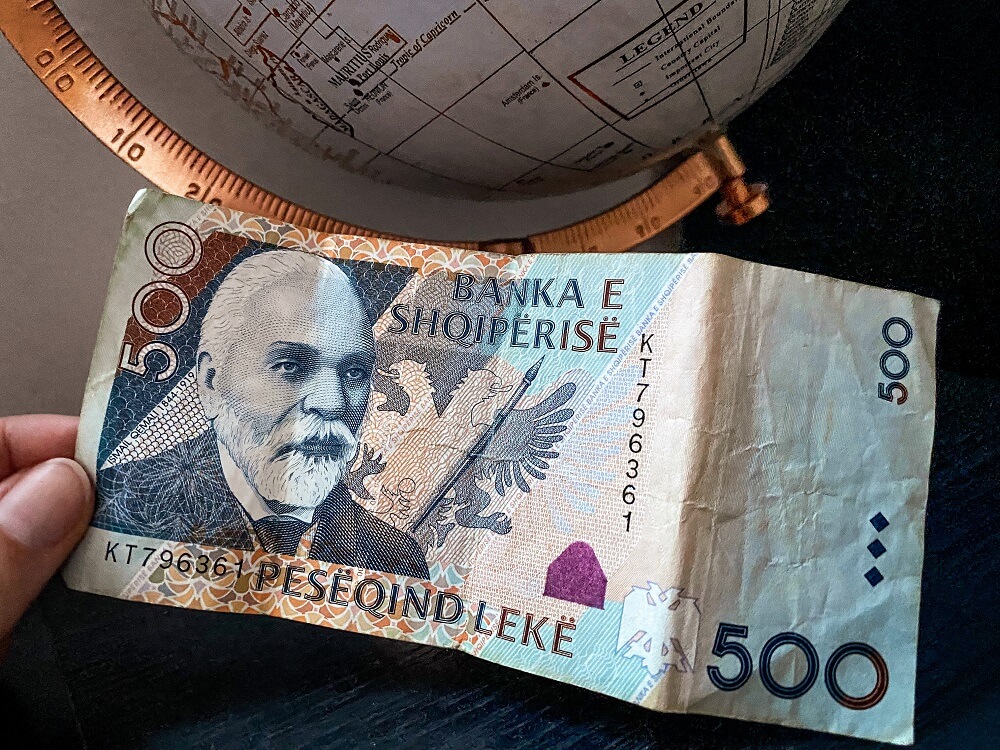
Q3: What Currency Does Albania Use?
Albania’s national currency is the Albanian Lek. This is going to be the main currency you’ll use, although many places now except Euros too despite Albania not being part of the European Union.
Cash or Card? – You can pay by card in many places such as restaurants, cafes and supermarkets whilst in bigger cities or touristy areas. However, smaller businesses, local shops, cafes and some entry fees were required to be paid in cash so be prepared for that. You’ll also need to use cash for toilets, some local buses and taxis.
Note. Albanian Lek is a closed currency, so you won’t be able to exchange any money outside the country. Make sure to spend all your money before leaving to avoid buying loads of chocolate bars and packets of crisps at a random petrol station just before you get to the border. (At least we were sorted for snacks for a few weeks).
Best Travel Card – Whenever we can, we prefer to pay in the local currency and for that we always use our Wise card. With that we can easily withdraw money from the ATM or pay by card at most shops and restaurants. Whilst you can’t set up an Albanian Lek account, you can open a Euro one.
Withdrawing Money – To avoid crazy ATM fees, you can always withdraw money at Posta Shqiptare or Credins Bank. Normally international banks will charge you a huge amount for withdrawals, so try a few different banks to compare the price.
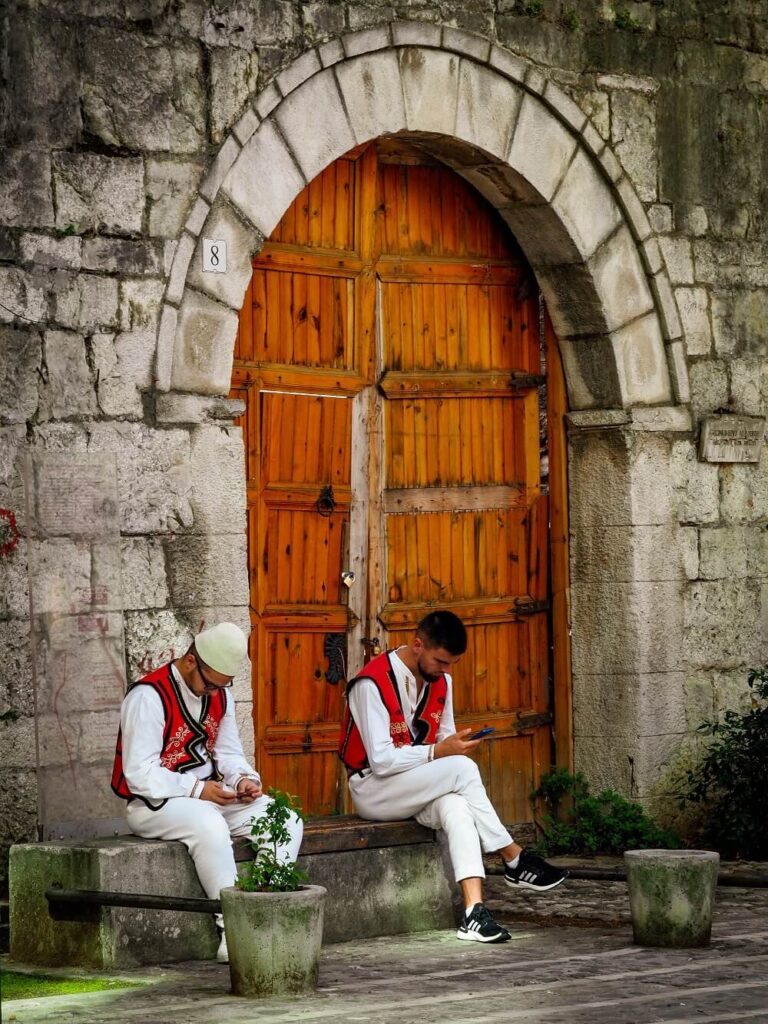
Q4: Do You need an Albanian SIM Card?
It depends. The majority of hotels, bars and restaurants will have WIFI. These days you can even join a free public network on many beaches and at historical sites.
However, we still recommend getting a local SIM card. Having data on the go can come in handy if you’re renting a car and wanting to follow the map or even when you’re using public transport or taxis. You can opt for Vodafone, One Telecommunications Albania or ALBtelecom. We went with Vodafone and they even have a tourist package you can buy.
If you don’t fancy getting a physical SIM card, you can always use Airalo. It is an app that allows you to download a prepaid eSIM to your phone in over 190 countries. You can choose from different packages and data allowances depending on how long you’re staying or how much internet you want to use.
Top Tip – Make sure to have a VPN to avoid hackers accessing your personal data when using public WIFI. We use Surfshark which is the only VPN that offers one account on unlimited devices.
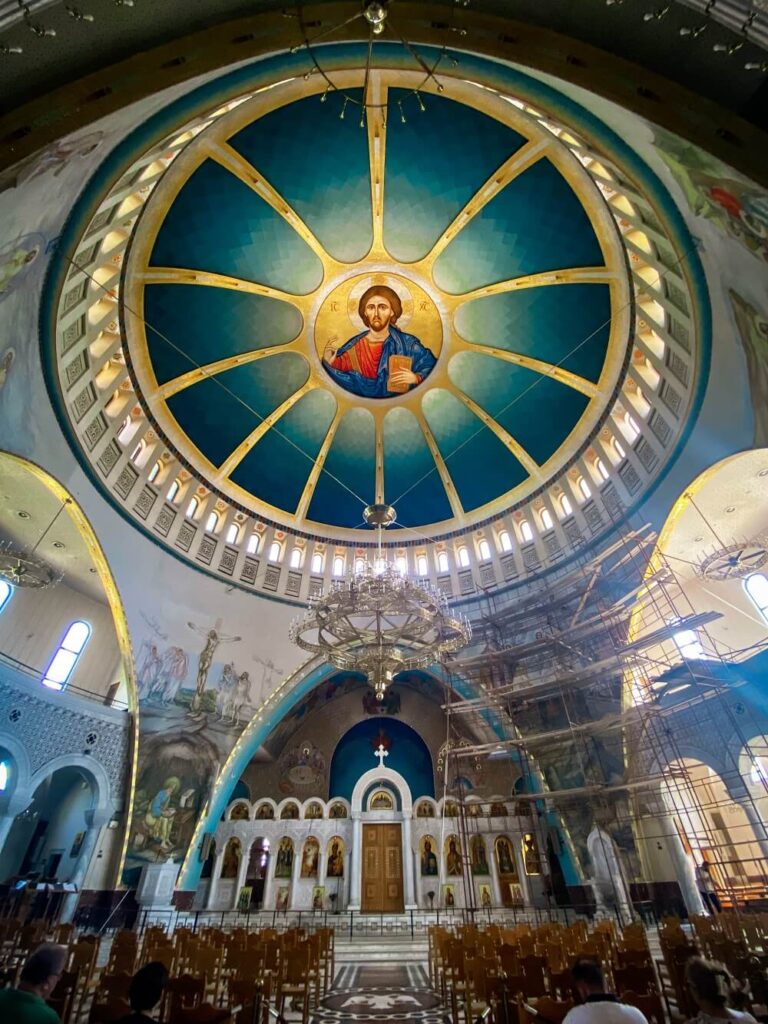
Q5: Appropriate Attire in Albania
Although the majority of Albania’s population is Muslim, you don’t have to cover your head or body parts if you’re a woman. You can basically dress how you would anywhere else in Europe. This includes wearing your usual bikinis and swimsuits on the beach.
Note. There are many beautiful religious sights across the country including churches and mosques. If you’re planning on visiting any of them then make sure to pack some clothes that would cover your shoulders and knees. In addition, if you’re a female wishing to enter a mosque you’ll need to cover your head too, so it’s good to bring a light scarf with you.
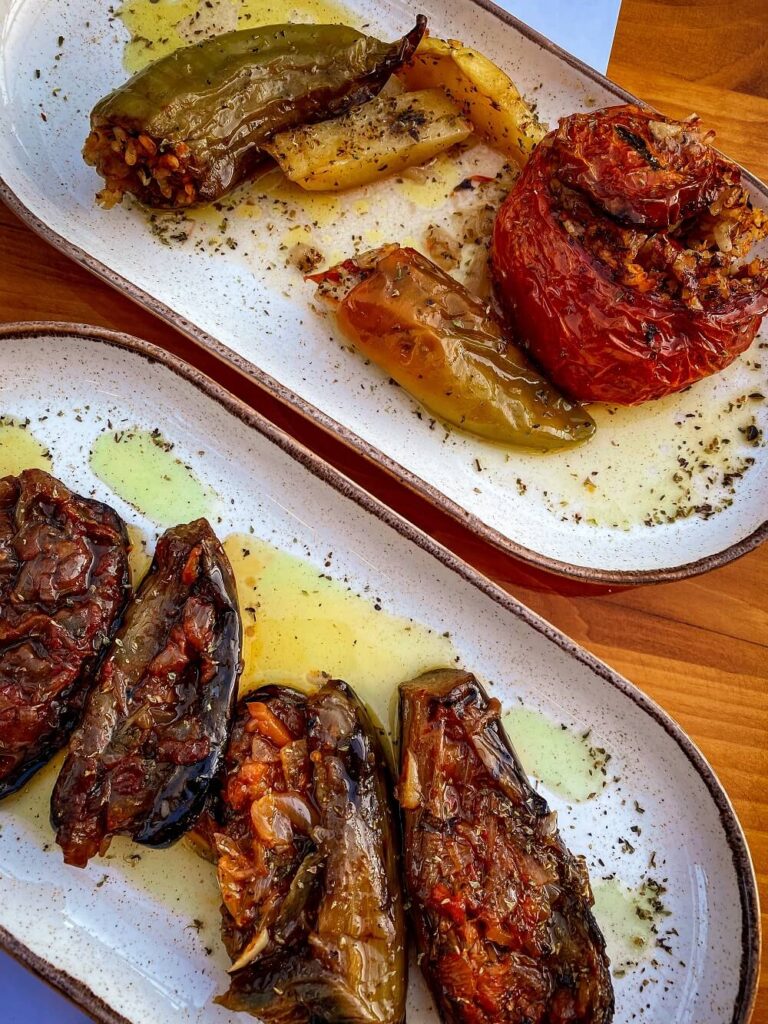
Health Related Albania Travel Tips
What to eat and drink in albania.
Albanian cuisine is absolutely delicious. It is the perfect blend of Mediterranean flavours and is influenced by Greece , Türkiye (Turkey) and Italy, a mix that is hard not to enjoy.
The national dish is Tavë Kosi , which is lamb with rice, topped with an egg and yoghurt sauce. There are so many different dishes to try that listing them all could easily be a separate blog post. You can definitely taste something different every day. Whilst a lot of the dishes are meat based, we found just as many delicious vegetarian options too in most traditional restaurants.
Just like many other countries in the Balkans, Albania’s national drink is Raki. As a Hungarian, Raki to me is very similar to Pálinka, so I definitely enjoyed the drink. However, since this distilled spirit’s alcohol percentage is quite high, make sure to be careful and don’t drink too much.
Top Tip – If you have a sensitive stomach or digestive issues, then bring some of your medication with you. As a rule of thumb, always pick a place that’s filled with locals or, for more touristy places, check their reviews online. Of course, a small amount of Raki can also act like strong medicine. Wink, wink!
Can You Drink Tap Water in Albania
It is not advised to drink tap water in Albania.
Although, if you’re hiking in the Albanian Alps, you can definitely enjoy fresh spring water. We recommend having a water purifier bottle with you. Sometimes, your stomach can react differently to water from a foreign country, so it’s better to be cautious.
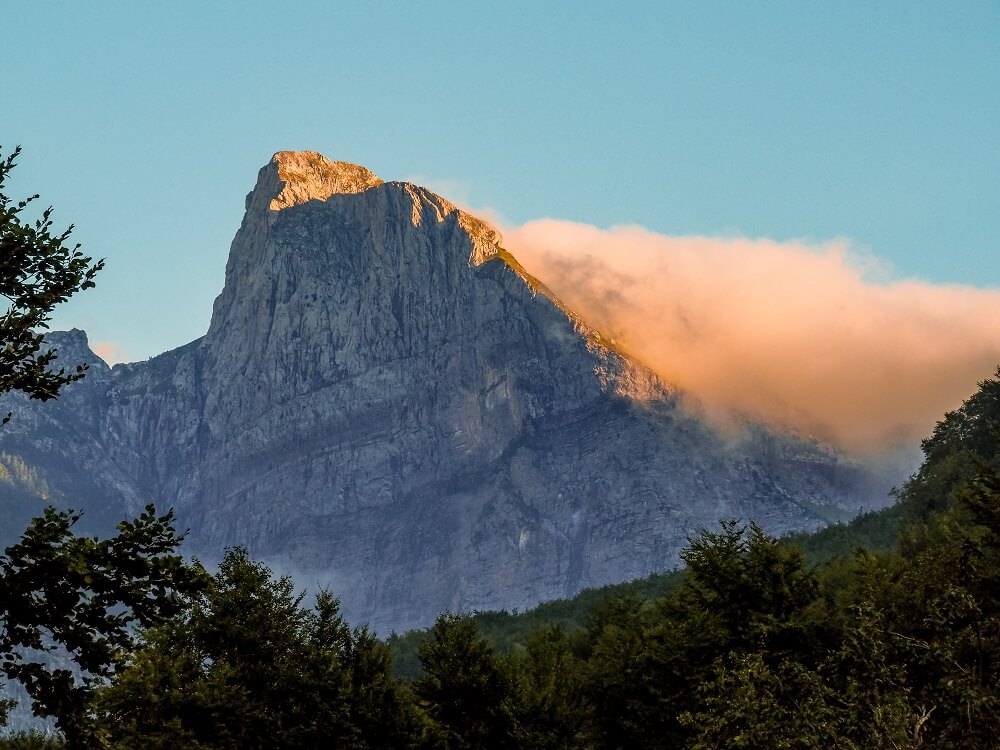
Natural Disasters and Hazards: Albania Travel Tips
Earthquakes: Albania lies in an earthquake zone with the last major earthquake occurring in 2019. You may or may not experience anything during your stay. However, we still recommend reading the US Federal Emergency Management Agency’s advice about what to do before, during and after an earthquake.
Winter weather conditions: During the winter months the mountainous regions in Albania can experience heavy snowfall. This could lead to road closures but also floods when the snow melts. Many of the trails are also closed during this time. If you’re planning on hiking in the country, then we recommend visiting between May/June and September.
Summer weather conditions: The summer months, especially July and August can be pretty hot in Albania. If you’re visiting during that time, make sure to protect your skin with SPF and don’t spend too long in the sun to avoid heat-stroke. Make sure to always drink plenty of water to avoid dehydration.
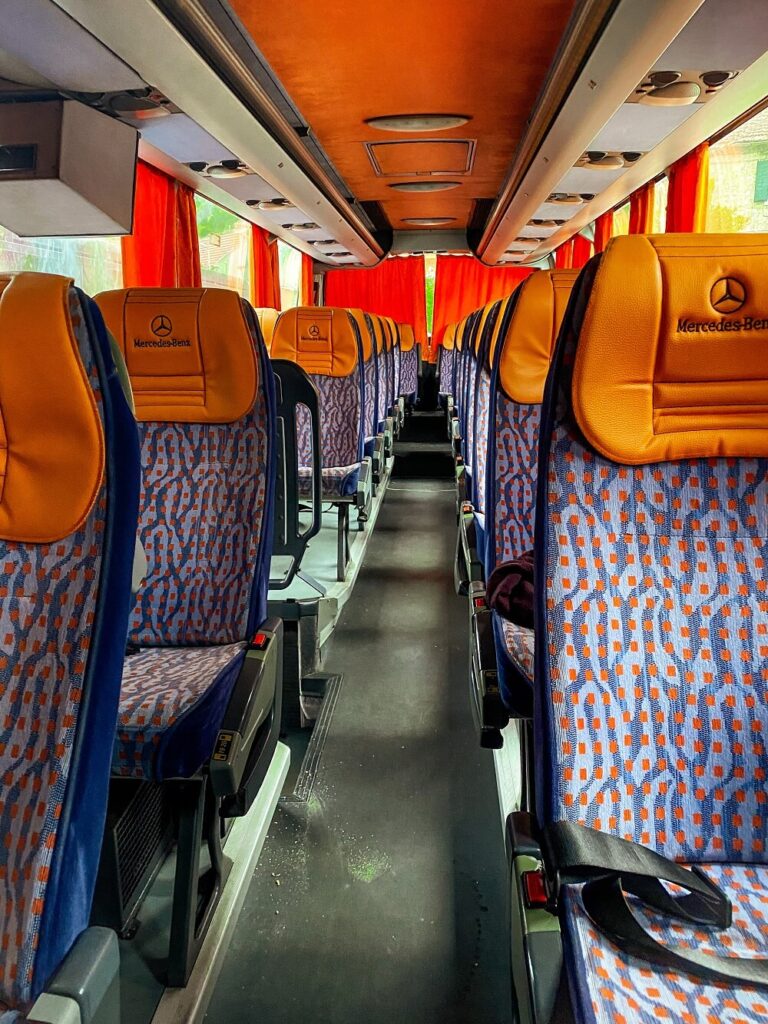
How to Get to Albania
By Plane – Tirana International Airport offers direct flights between many major European cities and a few countries in the Middle East. The airport is the largest and busiest airport in Albania. Once you’ve arrived, you can get to the city centre by a local shuttle bus, taxi or hire car.
If you choose public transport then you can hop onto the Rinas Express shuttle bus at the airport. It runs every hour between 8AM and 11PM and costs around 300 Lek (2.60EUR). The bus will then drop you off in the city centre.
Find Flights to Albania ✈️
By Bus – If for some reason you can’t reach Tirana through a direct flight, or you’re visiting from other European countries, then you can take a bus to Tirana or other cities such as Shkoder and Saranda. There are regular direct Flixbus services from nearby countries such as Croatia (Dubrovnik), Montenegro (Podgorica, Budva, Kotor ) and North Macedonia (Skopje, Ohrid). So, it’s worth checking if you can fly direct to any of these places and then taking the bus to Albania.
If you’re arriving to Tirana, the bus will drop you off at the International Bus Station , where you can take a short taxi ride to the centre or even walk if you’re staying close by.
Click below to find out how to get to certain locations in Albania:
- How to get to Theth
- Getting to Valbona from Shkoder
- How to get to Berat
- How to get to Gjirokaster
- Ways to get to Himare
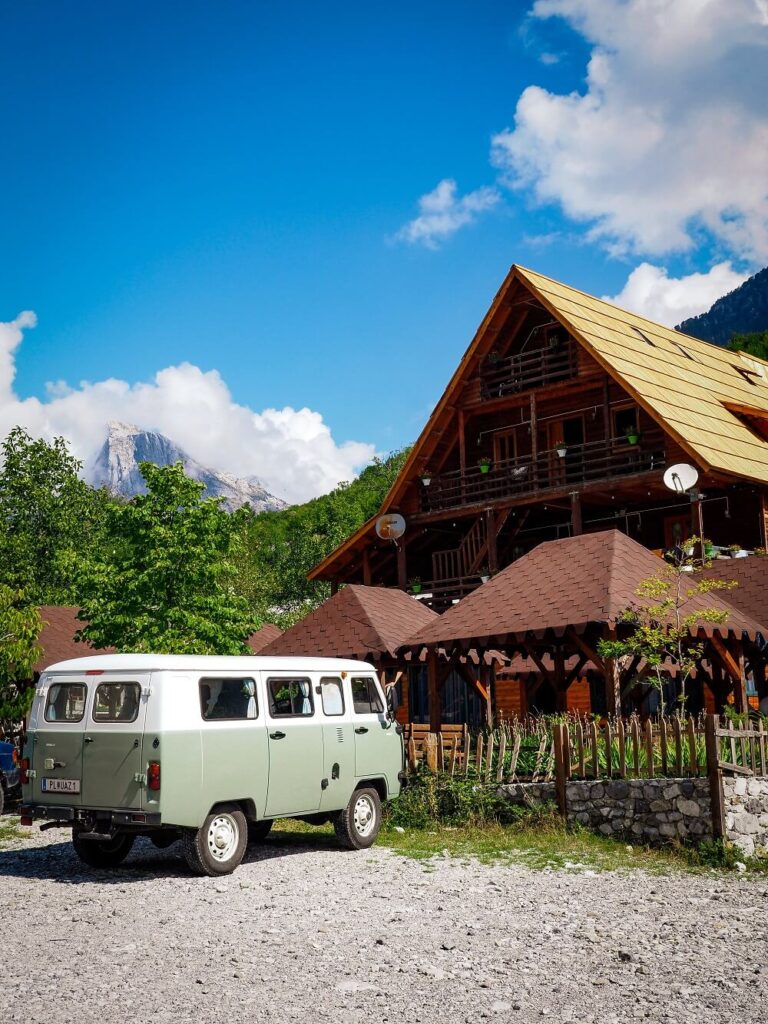
How to Get Around Albania
There are three main ways you can travel around Albania: by private vehicle, by public buses or by joining organised tours.
Private Vehicle
Hire Car . If you want complete freedom exploring Albania then it’s best to hire a car and drive around the country. The roads are in much better condition today than they were a few years ago. Unfortunately, Google Maps isn’t always up-to-date with current infrastructure and can show that some main roads are basically unpaved dirt roads. So, take Google Maps with a pinch of salt when driving around and consider downloading additional apps such as Maps.me and Waze.
Albanians can drive pretty fast and don’t always like to follow the road rules. So make sure that you’re obeying the speed limits and rules. The last thing you want is a speeding ticket on your holiday. Make sure to read more driving related laws and regulations before you hire a car.
Private Taxi . You can also use taxis to get between places, but unless you’re sharing the cost with multiple people, the price can rack up pretty quickly. Note that Uber isn’t available in Albania, but you can download a few taxi apps such as Speed Taxi and Ups Taxi that work in the same way.
Public Transport
You can also travel to most places in Albania by local buses or furgons . Furgons are essentially minibuses and they are privately owned. They run on a more flexible schedule than buses. You’ll likely travel in one to reach places like Gjirokaster , Saranda and Berat.
Your more traditional buses normally travel longer distances and usually depart from the capital Tirana to other larger cities like Shkoder or Saranda.
Buses and furgons are definitely the cheapest option when it comes to getting around the country. The only downside is that you are tied to a timetable or sometimes you have to wait for enough people to fill the bus before you can leave from one place to the next. They can also operate as delivery services so the back can fill up pretty quickly and you might make an unexpected stop here or there. After travelling across Mexico , Central and South America this felt quite normal to us!
The buses and furgons won’t be the most comfortable and they don’t have toilets either. We also noticed that bus stops may not even be sign posted. Generally speaking, major bus terminals sometimes have a few facilities but expect the place to look more like a petrol station or large car park than a fancy bus terminal.
Organised Tours
If you’re only in Albania for a very short time, you can just have a base in the bigger cities such as Tirana or Saranda and plan day trips from there. You definitely won’t have any trouble finding some cool excursions for the duration of your stay.
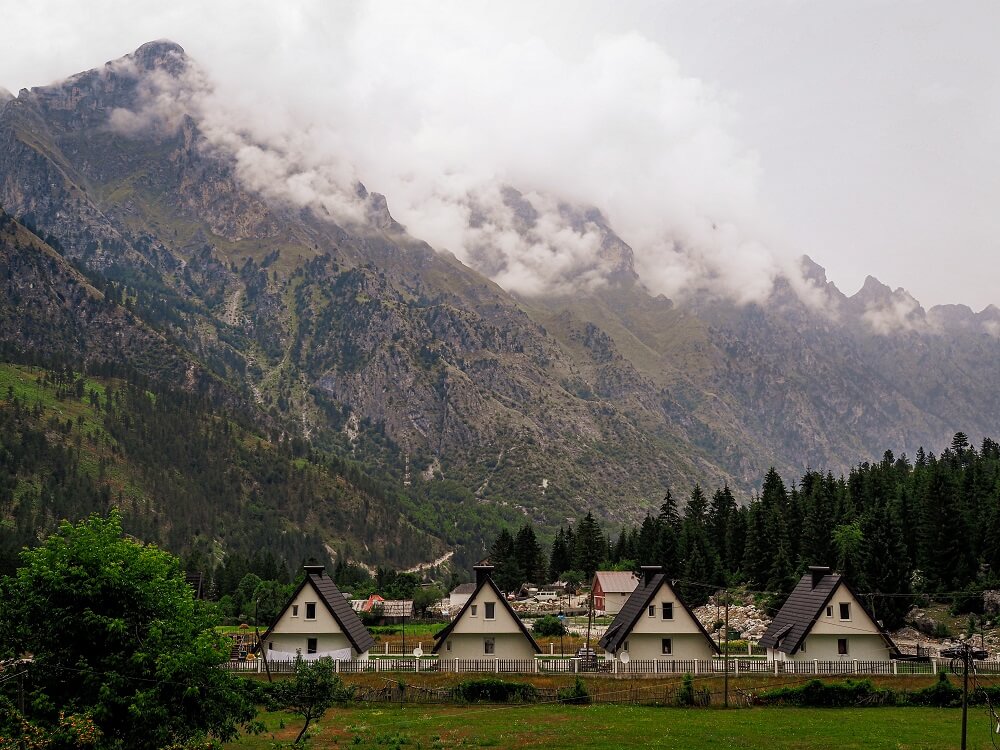
Accommodation in Albania
There is a wide variety of accommodation options you can stay at in Albania, which all depends on your budget and needs.
There is a wide selection of hotels within Tirana as well as other towns and cities across the country. Outside the capital, booking a guesthouse for bed and breakfast is also very common. In addition, there are also resorts available in the more beachy areas. If you’d like to stay in hotels, guesthouses or resorts, you can always check out booking.com.
If you’re a solo traveller, or want to make friends, then definitely check out hostelworld.com for a good selection of hostels. However, if you fancy staying in a more homey place you can always check out Airbnb.
Lastly, if you’re planning a more outdoorsy adventure in Albania, then you can consider camping as well.
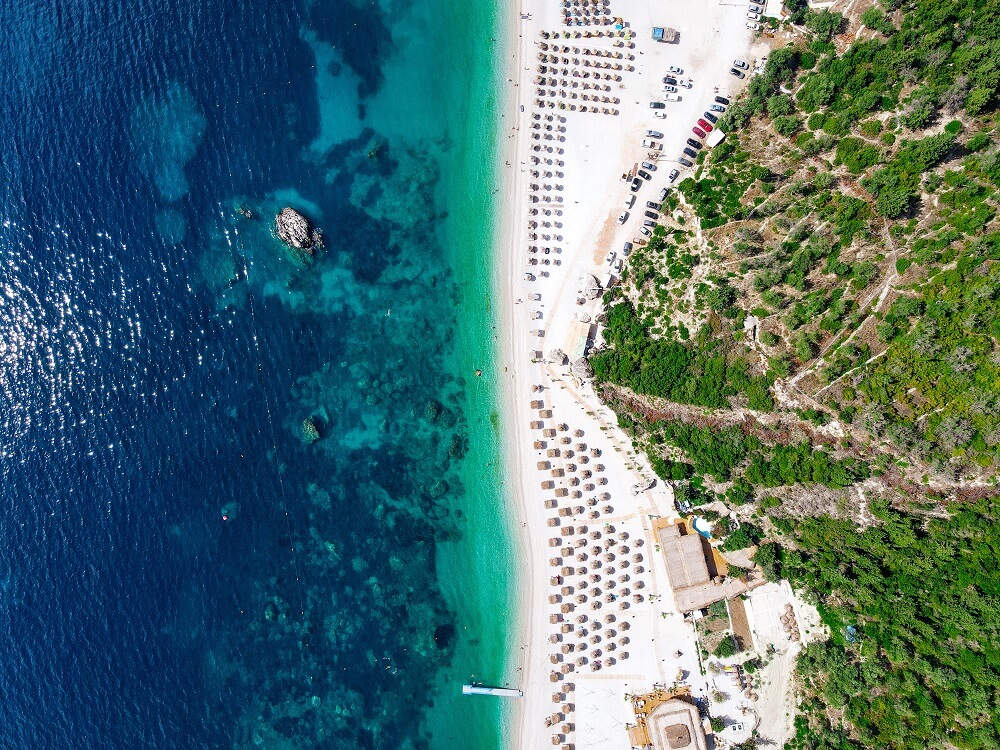
Best Time to Visit Albania
One of our main Albania travel tips is to visit the country outside of the summer months if you can.
Albania has very hot summers which can make wandering around cities and historical sites a bit unbearable. It’s also when most people flock to the beaches so they can get pretty crowded too. Of course, that’s not to say you can’t have a fantastic time during the summer holidays. We visited at the end of August / beginning of September and the weather was just perfect for completing the Valbona Pass hike in northern Albania. However, it was definitely still pretty hot on the beaches.
May, June and September are better months because you won’t be roasting and melting on the city streets and you’ll still have the chance to enjoy the Albanian Alps outside of the winter season.
Whilst you can visit Albania in the winter months too, be prepared for colder temperatures. During this time many of the hiking trails are also closed and of course you might not want to be lying on the beach either. In winter, Albania can be a great cultural and foodie experience in our opinion.
Final Thoughts on Albania Travel Tips
We hope that you found this Albania travel tips post useful because we definitely loved our stay in the country and never had any issues. We could always rely on locals to help us with directions and recommendations. Of course everyone’s experience is different in a country and we only spent two weeks there which isn’t a very long time.
Have you ever been to Albania? If so, how much of the country did you manage to explore? if not, would you travel to Albania in the future? Let me know in the comments below.
Now, let your adventure begin,
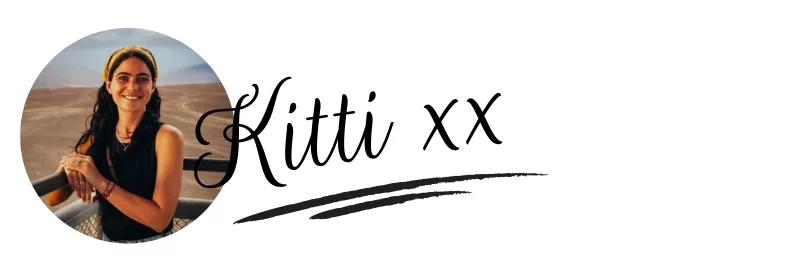
Our Top Travel Resources
Accommodation: For hotels we always use Booking.com and Hostelworld for hostels. We also book longer stays on Airbnb or Vrbo.
Flights: To find the best flight prices we always check Skyscanner , Google Flights or WayAway. Then we also check the airlines’ websites too for comparison.
Car Rentals: We use Discover Cars when we want to rent a car as it compares local, national and international companies.
Activities: If we book organised tours we always check either GetYourGuide or Viator.
Foreign Currency: Whenever we can we prefer to pay in local currency and for that we always use our Wise card. We can easily withdraw money from the ATM or pay by card at most shops and restaurants.
Travel Insurance: We never go anywhere without travel insurance. You never know what will happen on your trip, so good travel insurance like SafetyWing can protect you in case of injury, illness, theft and cancellations.
eSIM and VPN: To get data abroad we use Airalo which is an app that allows you to download a prepaid eSIM to your phone in over 190 countries. Make sure to have a VPN to avoid hackers accessing your personal data when using public WIFI. We use Surfshark which is the only VPN that offers one account on unlimited devices.
Remember…It all starts with a Pin…
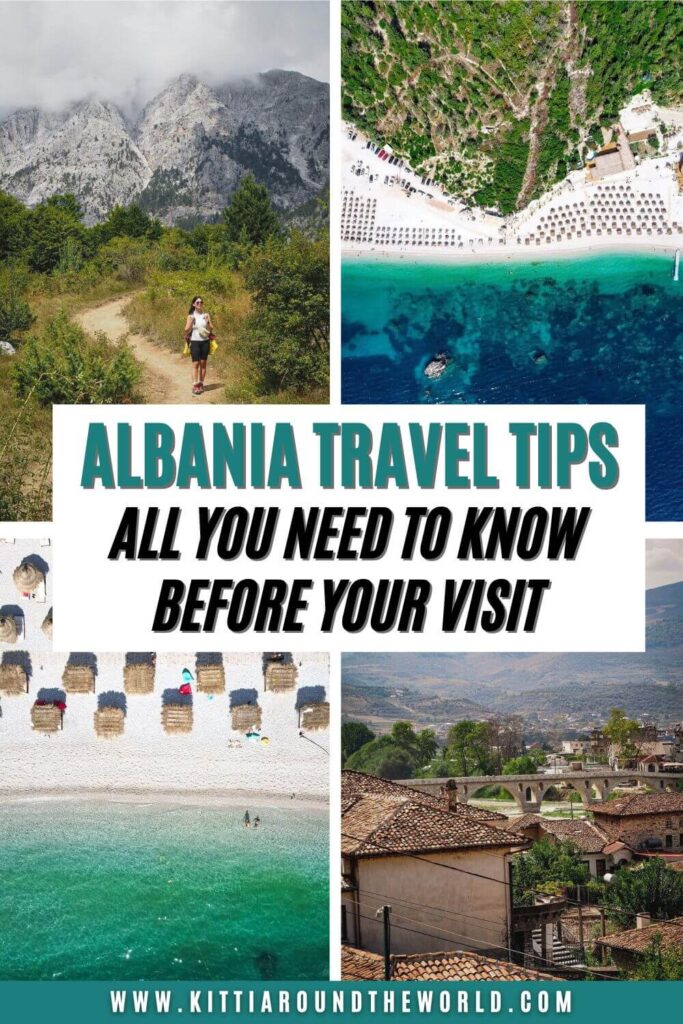
Similar Posts
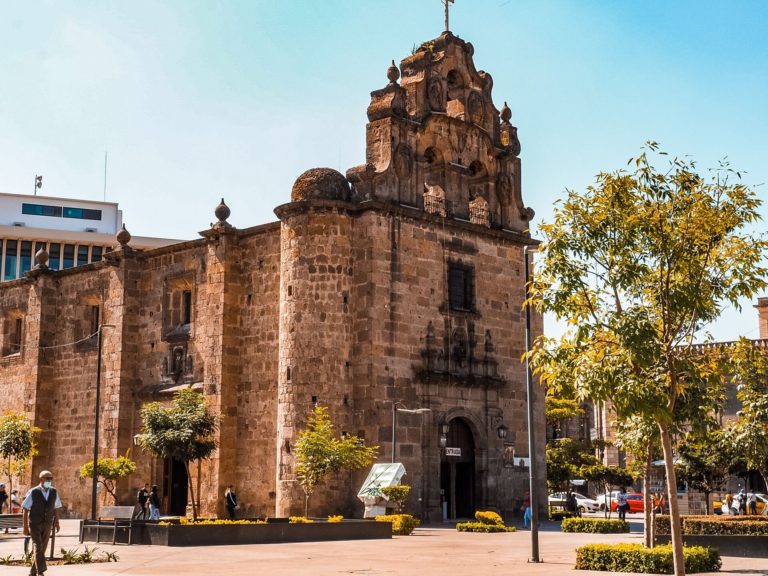
Guadalajara Travel Tips (Jalisco, Mexico) – All You Need to Know Before Your Visit
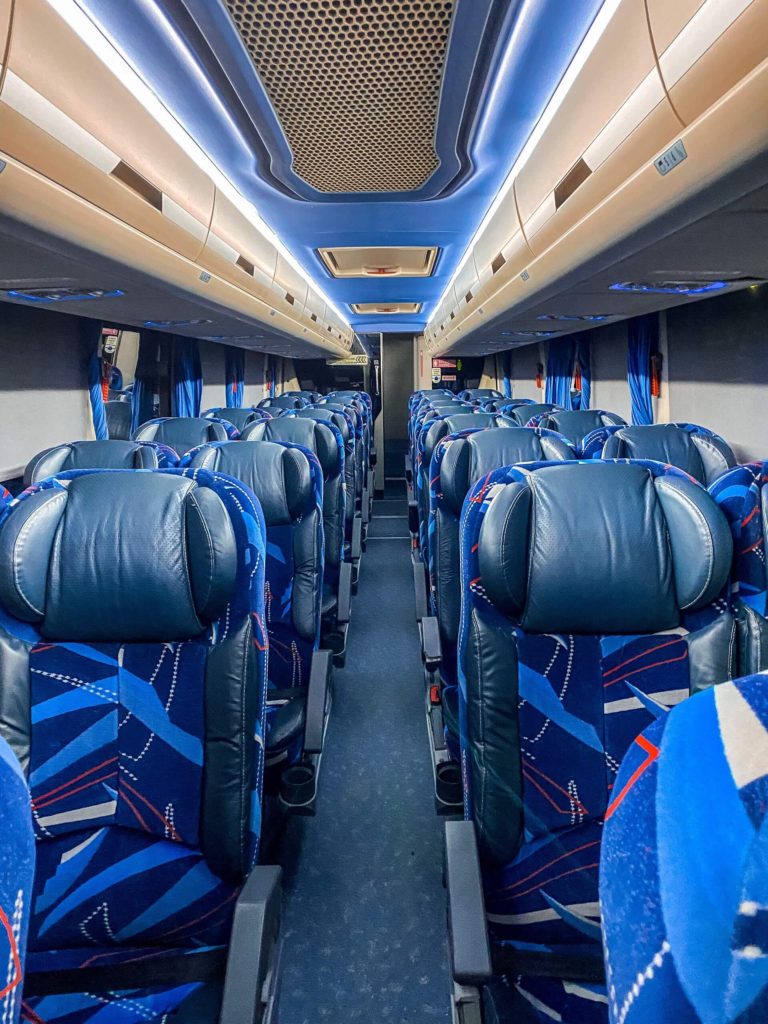
A Complete Guide to Bus Travel Around Mexico
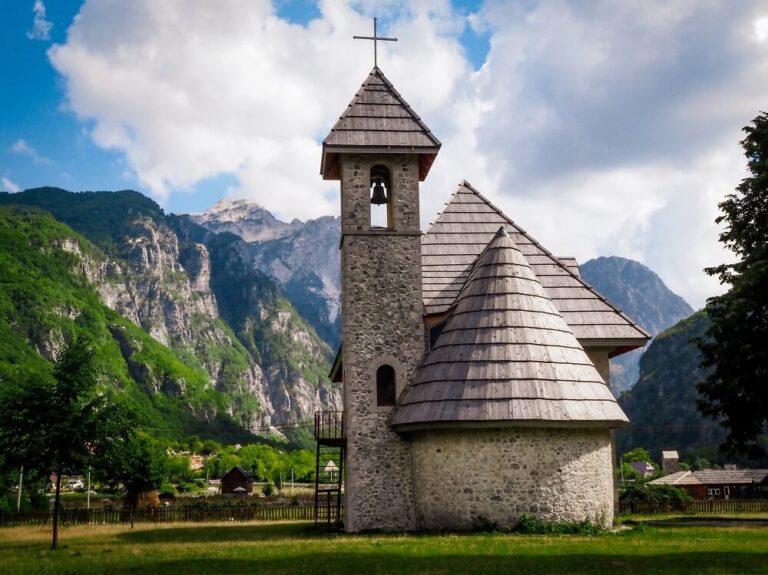
8 Things to Do in Theth, Albania
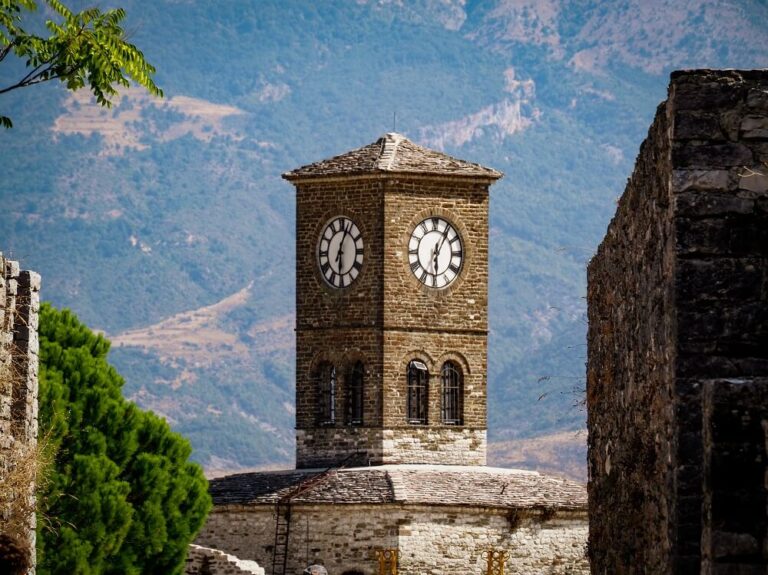
8 Best Things to Do in Gjirokaster, Albania
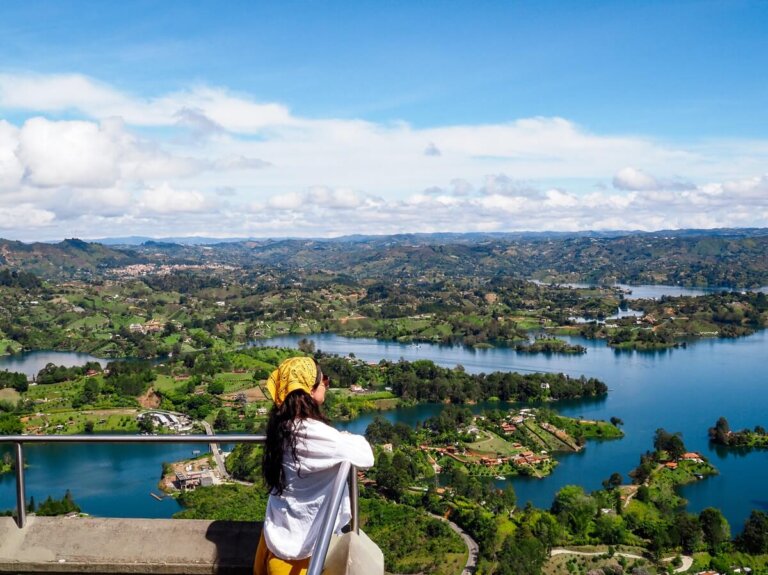
3 Week Colombia Itinerary – How to Plan a Trip to Colombia
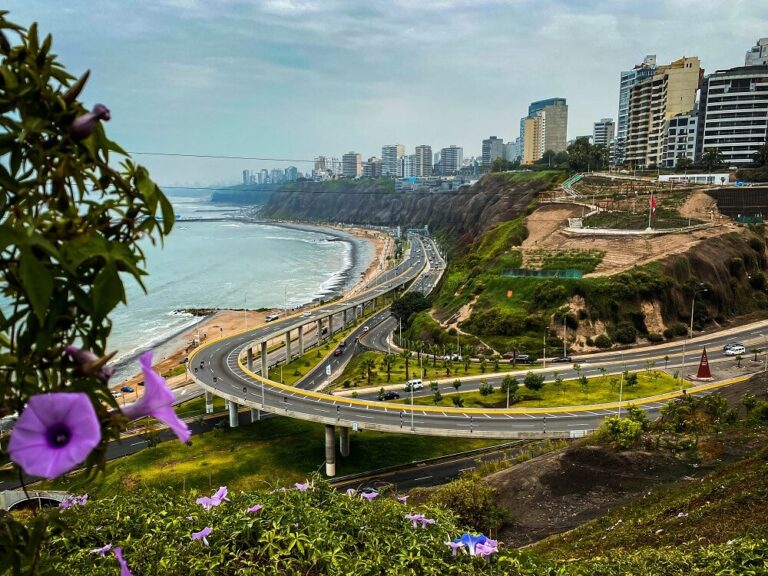
A Guide to Bus Travel Around Peru
Leave a reply cancel reply.
Your email address will not be published. Required fields are marked *
No products in the basket.

A complete guide to travelling in Albania
Updated On 8th March, 2024
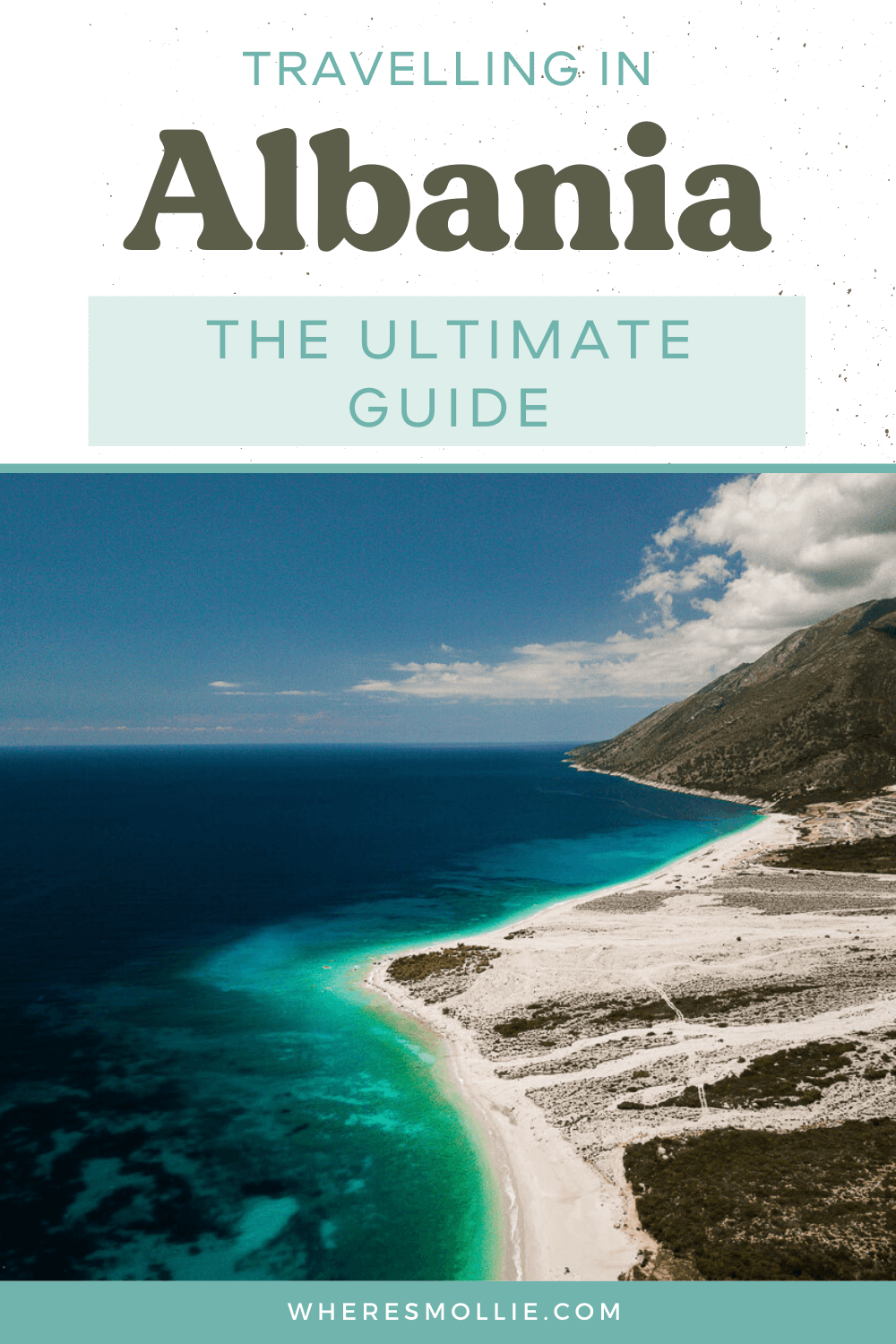
If you’re considering visiting Albania, add it to your Europe bucket list now. I’ve never had a country take me by surprise as much as Albania did. It’s one of Europe’s most hidden gems and if you haven’t been yet, book your tickets now.
My 8-day road trip through the Albanian Riviera was eye-opening, jaw-dropping and memorising. We explored the capital of Tirana before moving towards the coastline and enjoying beach life in Dhërmi , Vlorë , Himarë and Sarandë , some of the Riviera’s main towns. We also happened to be there for Kala Festival , which added an upbeat element to our trip!
But that wasn’t all Albania had to offer. We were able to hike through forests and take in the mountain air in Butrint National Park and Llogara National Park , as well as explore the underrated, barely touched, beautiful little towns and villages of Berat and Gjirokaster. The variety of landscapes and things to do in Albania only makes me want to visit again; I barely scratched the surface.
This travel guide will take you through everything you need to know before visiting Albania, including the best places to visit in Albania, and my top tips for travelling in Albania.
My Albania travel guide: everything you need to know about exploring Europe’s hidden gem
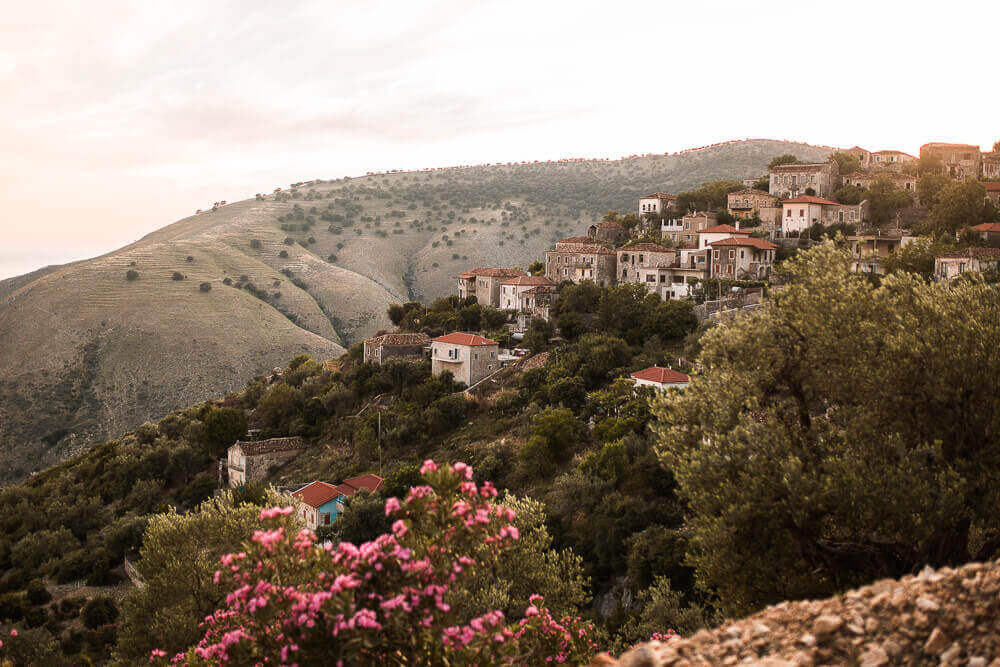
Basic facts about Albania…
- Currency: Albanian Lek
- Language: Albanian
- Capital: Tirana
- Area: 28,748 km2 (11,100 sq mi)
- Population: 2,845,955
- Land borders: Montenegro, Kosovo, North Macedonia and Greece
- Maritime borders: Greece, Montenegro and Italy
- Highest summit: Mount Korab, 2,764m
- Plug sockets: Most commonly, European (type C & F). Occasionally, UK (type G).
- Time zone: CST/CEST (1 hour ahead of the UK)
Visa requirements for Albania…
Citizens of most EU countries can stay in Albania for 90 days in any 6-month period, visa-free. This rule also applies to citizens of the UK, USA, Australia, China, New Zealand, Singapore and more. See a complete list of countries that can travel to Albania visa-free here .
If you need a visa, or aren’t sure if you need a visa, check your local government’s travel advice.
See my 22 top tips for travelling in Europe here.
When’s the best time to visit Albania?
Albania has a Mediterranean climate with four distinct seasons. Hot dry summers, mild but wet winters, and springs and autumns that are warm enough to be comfortable, but not so hot that you’re sweating buckets! Bear in mind, however, that it does vary depending on where you are in the country. The coast tends to have higher summer temperatures and milder winters than the inland, more mountainous areas.
I’d say the best time to visit Albania is in spring (April-June) or autumn (September – November). For me, the balance of warm temperatures (but not too hot) and less chance of rainfall makes for perfect travelling conditions. Having said that though, if you like the heat or don’t mind a bit of rain, Albania is great for year-round travel!
See my hidden gems you must visit when planning European adventure here.
Check out all my top tips for travelling in Albania here .
How do you get to Albania?
Flying to albania:.
Albania’s main airport is Tirana Nënë Tereza International Airport (TIA). Here you can get direct flights from all over Europe, but if you’re travelling from another continent, expect a layover in a major European international airport.
Getting from Tirana airport to the city centre…
From the airport, you have a few options:
- Taxi: The quickest option (20-25 minutes) but the most expensive (2,500 LEK)
- Shuttle bus: LU-NA shpk runs an hourly shuttle bus between 7:00-22:00 and is 300 LEK each way. It take about 30 minutes to get to Tirana city centre and it drops you by the National Museum of Tirana.
Top tip: Check out the flight deals on Skyscanner here.
Here’s how to pack a weekend away in a carry-on suitcase!
Ferries to Albania:
You can get the ferry to Albania from Greece or Italy . Check out ferry routes from Italy here and from Greece here .
Buses to Albania:
You can get the bus to Albania from all over Europe, including but not only Greece , Italy , Germany , Turkey, Kosovo, Bulgaria, North Macedonia and Montenegro. Check bus tickets at the main stations in the country you are travelling from.
Where to stay in Albania…
Honestly, it depends on where you want to spend your time! Expect costs to be higher in the more touristy areas, such as in the capital of Tirana and the Albanian Riviera. Hostels are the cheapest option, with budget hotels and Airbnbs coming in a close second.
Places to stay in Albania that I’ve been to and can recommend include:
- Buff Hostel in Tirana
- Altea beach lodges at Drymades Beach, Dhërmi
- Old Bazaar 1790 in Gjirokastër
- Nefeli Apartments in Sarandë
- Hotel Luxury in Ksamil
- Guesthouse Arben Elenzi in Berat
Wild camping is completely legal in Albania, so great for a budget option! Paid campsites are also very cheap. Check out my camping packing list here.
Check out hostels and hotels in Albania on booking.com here.
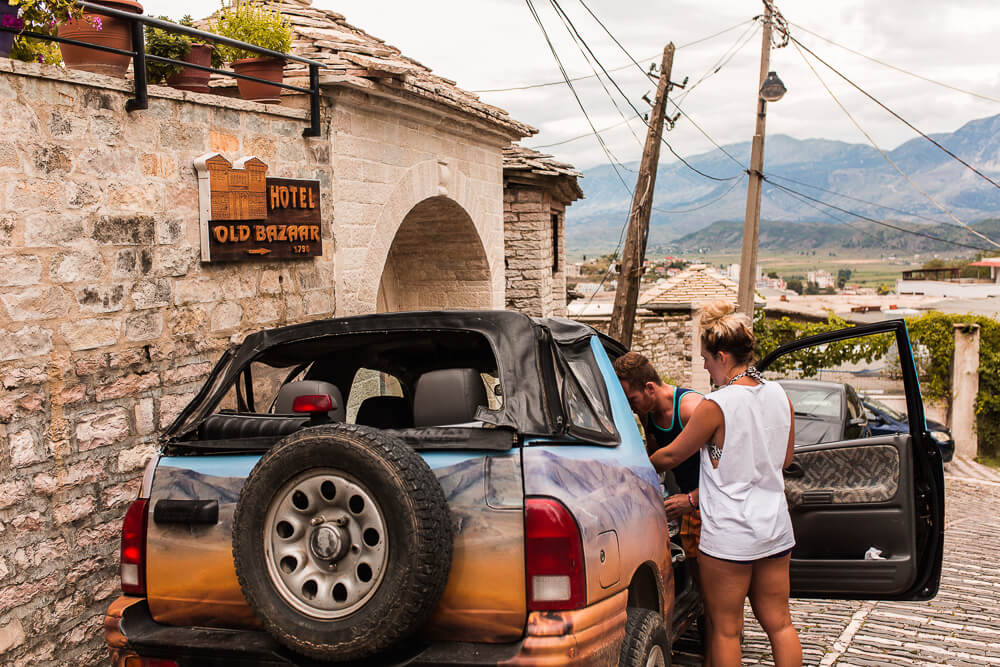
Use this link to get £25 off of your first Airbnb booking.
Transport in Albania…
The rail system isn’t well-developed, so locals and tourists tend to use buses. These are fairly cheap and have connections between most main towns in Albania. Timetables can be flexible though, and if a bus is full it will leave earlier than the timetable suggests, so get to the bus station/stop early to avoid disappointment!
Furgons (minibuses) are also an option, and definitely depart when they are full rather than according to a timetable. They’re a little dearer, but it’s a more comfortable experience and you can ask the driver to drop you off anywhere on the route (not necessarily waiting for a specific stop).
Hitchhiking in Albania is generally safe, although many drivers will expect some money towards the petrol before you get out.
BlaBlaCar is a ride-sharing app where you can connect with drivers who have space(s) in their car for a particular route, and then split the cost of the petrol.
We hired a 4×4 when we travelled Albania, which was an amazing experience and gave us the full flexibility of choosing when and where we wanted to go.
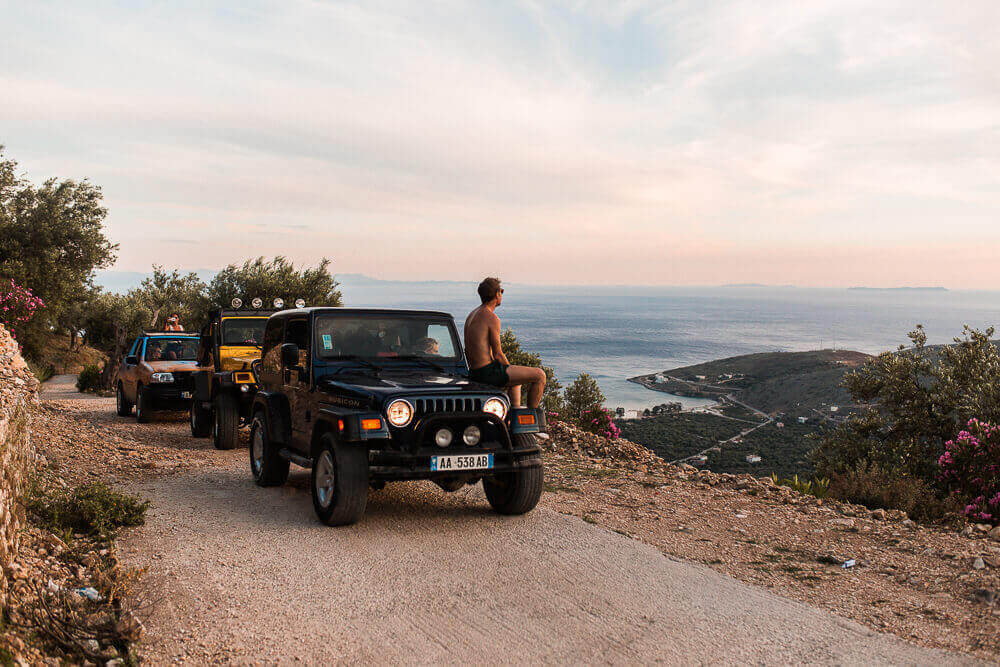
You’ll need an International Driving Permit for driving in Albania – get yours here.
See my bucket list of van life road trips in Europe here.
Safety in Albania…
Albania is a safe country to travel in. Like any country though, you need to be aware of your surroundings. Avoid flaunting any expensive equipment/technology, don’t walk home alone at night, and be cautious when you’re driving/crossing roads.
In terms of health and medical care, main towns have hospitals and doctors that you can access, although you’ll need to pay for these. The best healthcare is in the capital, Tirana. You cannot use an EHIC in Albania. Pharmacies in Albania, barnatore, have lots of medicines should you need anything (although bring your specific prescription meds with you) and private doctors and clinics in Tirana can speak English.
Always carry out travel insurance before you go anywhere! It’ll protect you in case of theft, illness or injury. Check out my travel insurance here.
Avoid drinking the tap water in Albania because it can give you a tummy ache. Take a reusable water bottle and try to fill up from restaurants, cafes, or larger, 5-litre bottles of water to reduce your plastic use. Get more sustainability tips for travelling in Europe in this blog post !
Check out my top tips for staying safe when travelling here.
Here’s my complete guide to travelling solo as a female, including all my safety top tips.
Food in Albania…
Albanian cuisine is fresh and delicious, with Ottoman and Mediterranean influences. There’s everything from fancy restaurants to street food here, so get your taste buds prepped!
Food you should try in Albania:
- Byrek : a savoury pie made with filo pastry, usually filled with spianch, gjize cheese or meat
- Fërgesë verore me speca dhe domate : fried (or oven baked) peppers and tomatoes, sometimes with feta cheese.
- Tavë Kosi : a quiche-like dish made with lamb, eggs and yogurt.
- Speça me gjize : stuffed peppers
- Kaçkavall : a famous Albanian cheese. You can eat it fried, baked or in salads or pies.
- Baklava : nuts, filo pastry and honey syrup.
- Qofte or kernaçka : fried or grilled meatballs
- Trilece : a traditional cake
- Fresh fish and seafood
- Grilled meat and vegatables
- Fresh seasonal fruit
- Local wine or raki (grape brandy)
Note: when I visited Albania, I found it quite difficult to find vegan dishes, so you should research restaurants in the area you’ll be travelling in before you go out to eat.
Top tip: If you can, do a street food/culinary walking tour! Not only will you get to see the city, but you’ll have a happy tummy too!
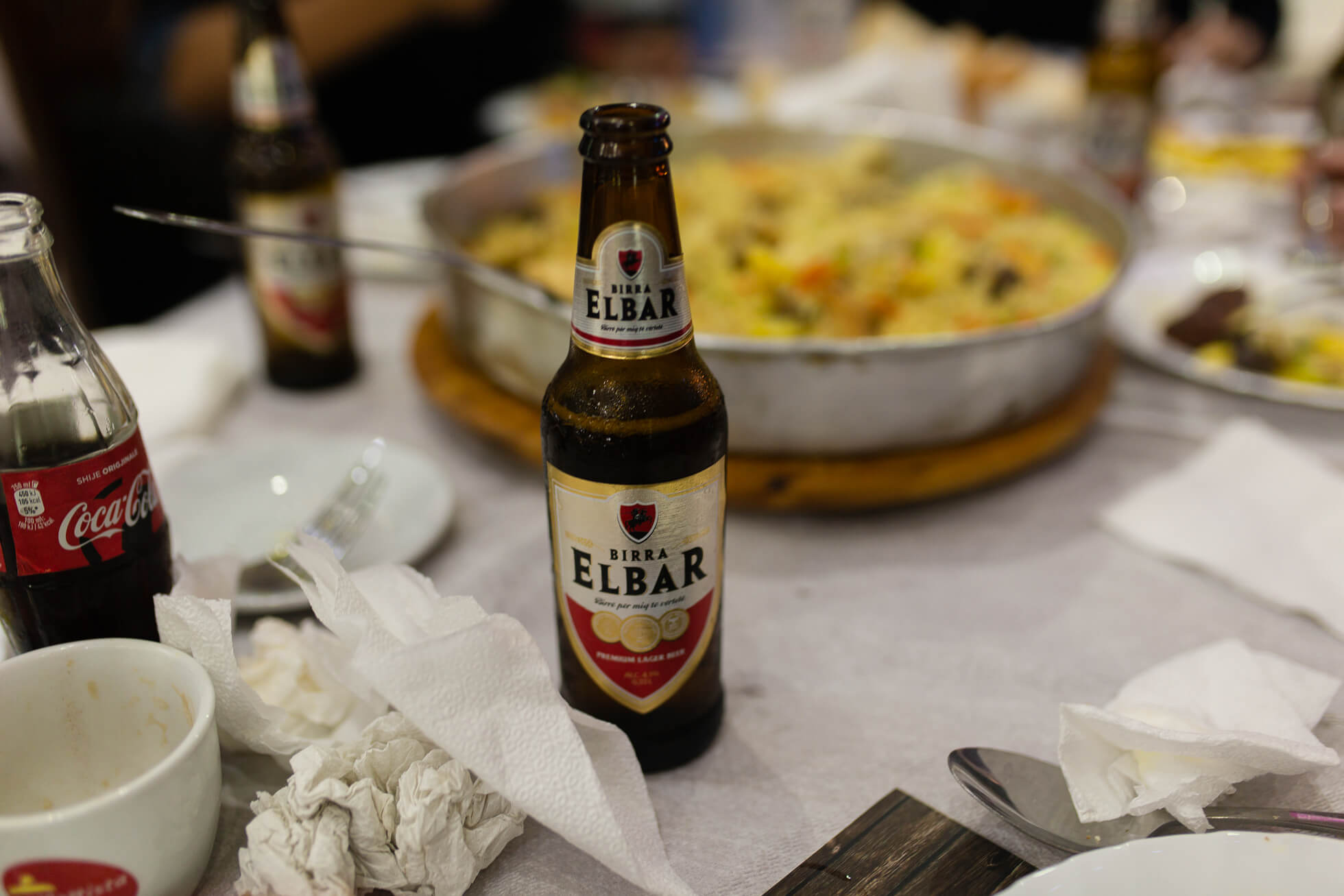
Top tip: Check out money-saving tips on my blog here.
The best places to visit in Albania…
Said to be one of the prettiest towns in Albania, and also known as the ‘Cinque Terre’ of Albania, this UNESCO world heritage site boasts beautiful architecture and an amazing amount of history. You can’t help but marvel at the Byzantine style windows that pop out the hillside in this beautiful little town.
See how I spent my time in Berat here.
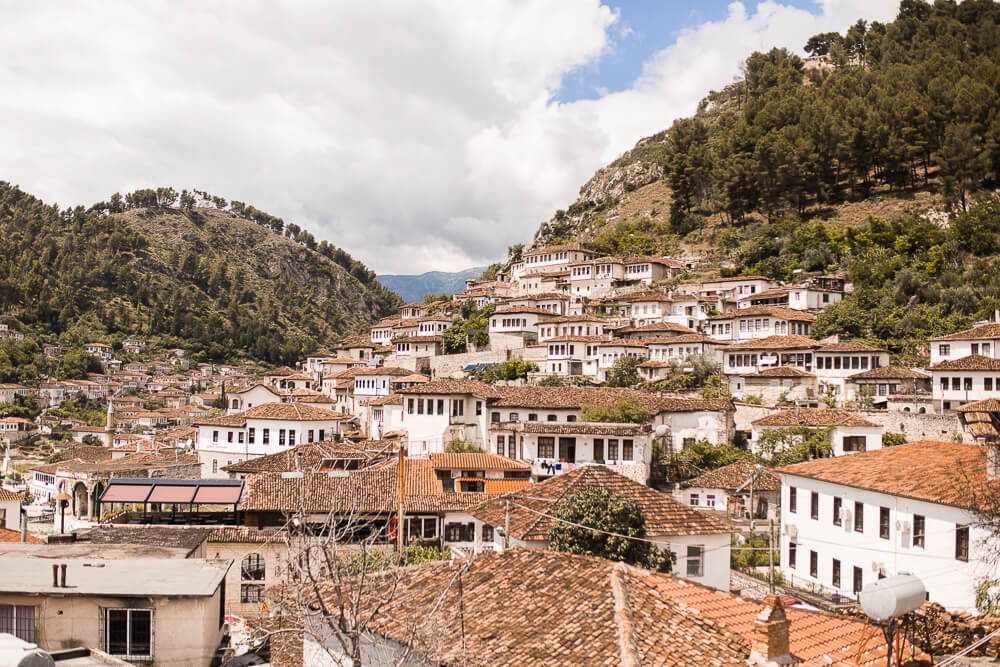
The capital of Albania is likely to be the starting point on your Albanian adventure. With a mix of Ottoman and Italian architecture, it’s hard to believe this city was once full of grey, communist buildings. It’s a chaotic city, but it’s fun, especially at night in the trendy Blloku area. Don’t miss catching the cable car up to Mount Dajti for panoramic views across the city.
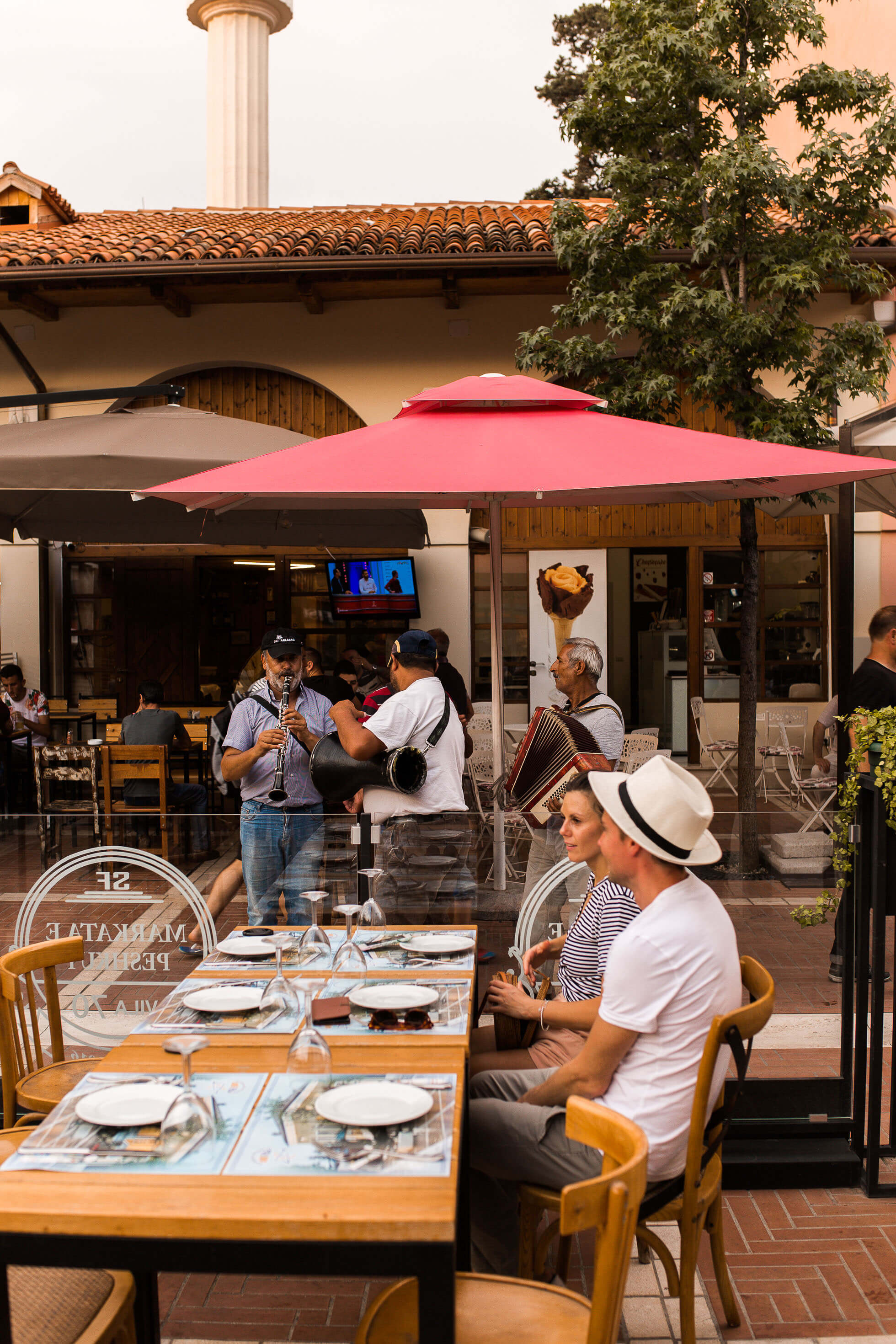
3. Theth National Park & Valbona Valley
This is the place to be for nature and hiking lovers. This village in the Albanian Alps is packed full of charming cottages and hiking trails, ready to take your breath away.
Here’s how to keep fit when you’re travelling!
4. The Albanian Riviera
This is where I spent most of my time in Albania, and honestly, I was completely surprised that I fell in love with it so quickly. The area itself is absolutely stunning and one of Europe’s most hidden gems. This underrated stretch of coastline is home to the towns and villages of:
- Palasë
- Dhërmi. Check out my stay in Dhërmi here .
- Himarë. Check out what I did in Himarë here .
- Lukovë
- Sarandë. Check out my stay in Sarandë here .
- Vlorë. Check out my stay in Vlorë here .
- Ksamil (home to the famous Blue Eye Spring ). Check out my stay in Ksamil here .
- Ksamil Islands
All of these are worth visiting in their own right! If you have the time, hire a car and spend a week or two exploring all the little towns and soaking up the sun.
The portion of the Ionian coastline that is known as the Albanian Riviera, or Bregu, is home to some of Europe’s best beaches and clearest waters. Grab your snorkel, and put these beaches on your bucket list:
- Puerto Palermo. See what I got up to at Puerto Palermo here .
- Drymades. Check out out beach lodges on Drymades beach here .
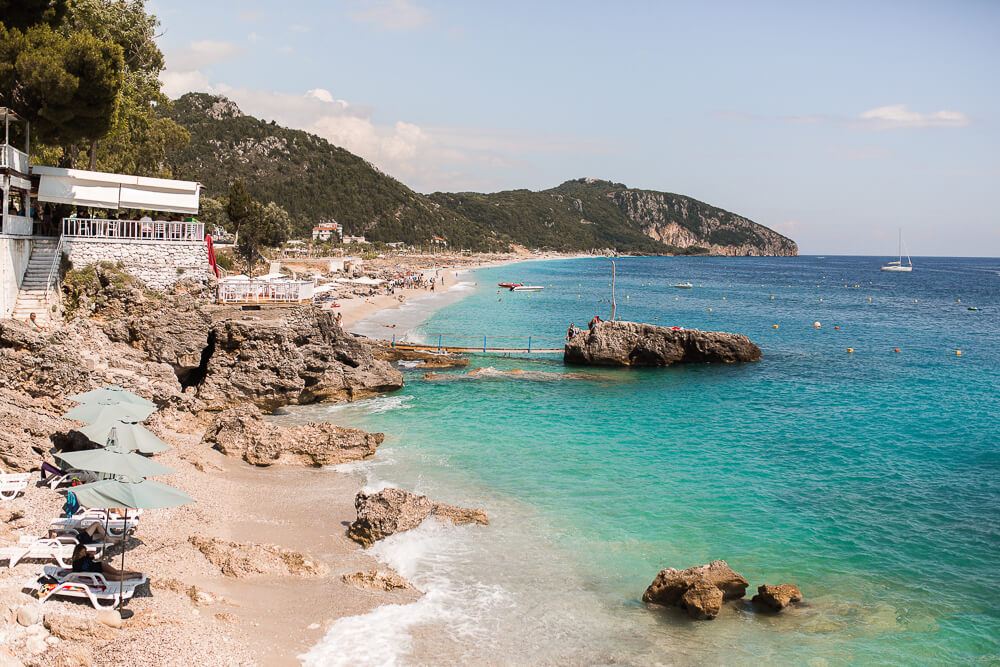
See my 21 cheap places to visit in Europe here
5. Gjirokastër.
I think Gjirokastër is my favourite place in Albania… so far. The mountain views, cobbled alleyways and the beautiful castle give this quaint little town so much character. If this town was anywhere else in the world it would be packed with tourists, but Albania really is a hidden gem and Gjirokastër is unspoilt.
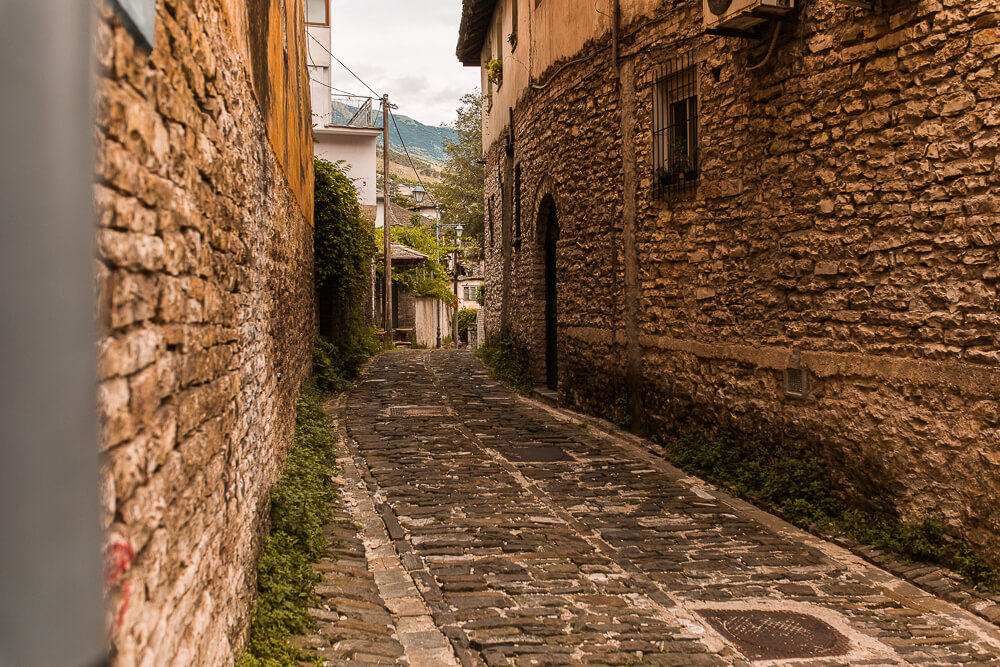
Not far from Lake Skadar on the Albania-Montenegro border, Shkodra is a colourful town well worth exploring. The highlight is definitely Rozafel Castle, but if you prefer being at one with nature, the Buna River runs through the town and the Albanian Alps can be seen from the town centre.
7. Llogara National Park.
Centred on the Ceraunian Mountains along the Albanian Riviera, Llogara National Park is absolutely stunning. From dense forest to steep rock faces, here you can climb, hike, or simply let the wind run through your hair as you enjoy the views from the 4×4.
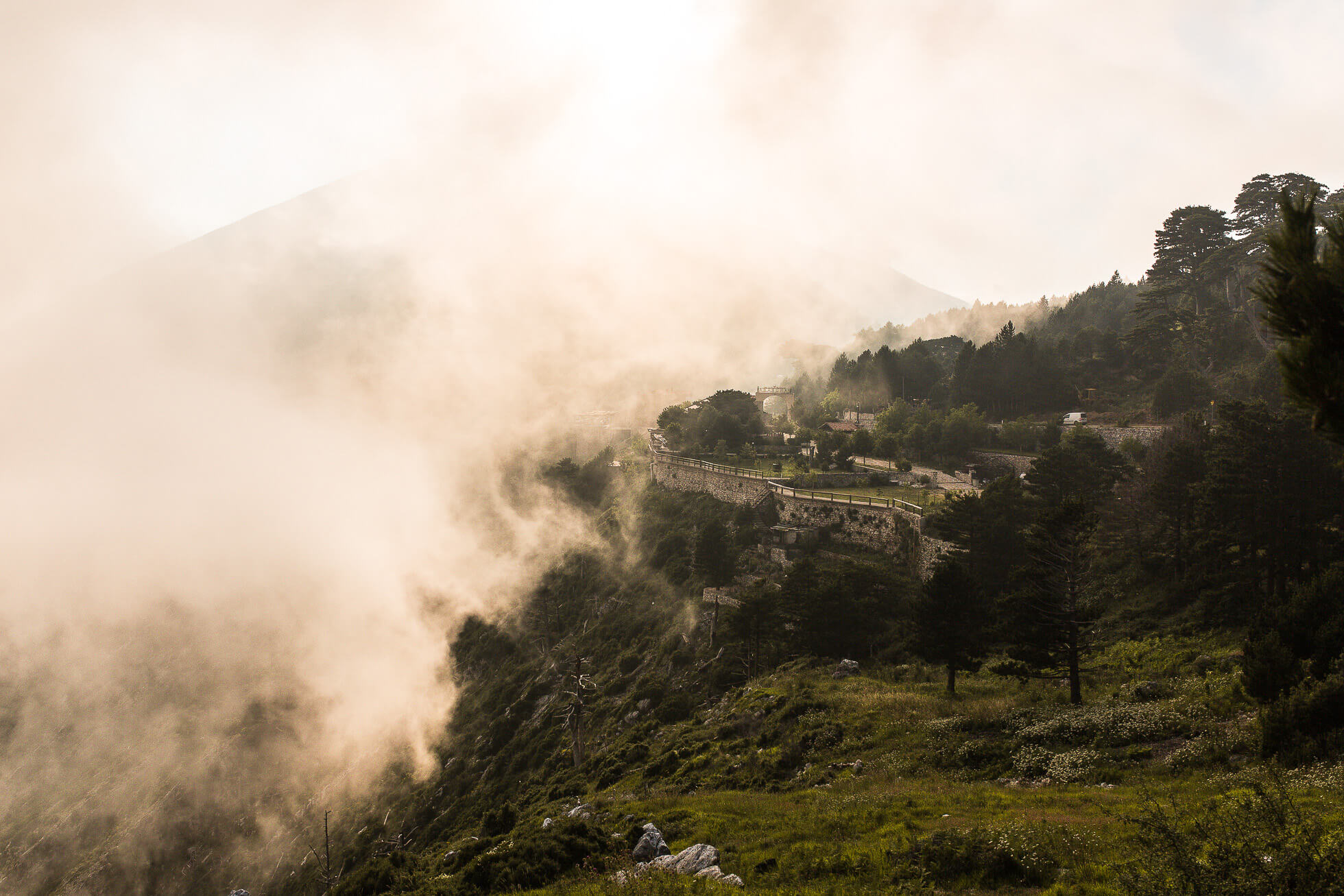
Not far from Tirana (you could easily visit for a day trip), the ‘Adriatic balcony’ is famous for Albania’s national hero, Skanderbeg. Climb up to the castle for fantastic panoramic views across the city!
9. Butrint National Park.
This ancient city and UNESCO World Heritage Site is surprisingly close to the Greek island of Corfu. This peninsula, bordered by Lake Butrint on one side and the Vivari Channel on the other, showcases Albania’s natural beauty and is one of the best places to visit in Albania.Famous for its perfect blend of history and nature, not only is it home to 1,200 species of animals and plants among the wetlands, hills, and islands, but the archaeological site covers over 2,500 years of history; this includes ancient city walls, remnants of a Roman theatre, a Byzantine Basilica and two castles.
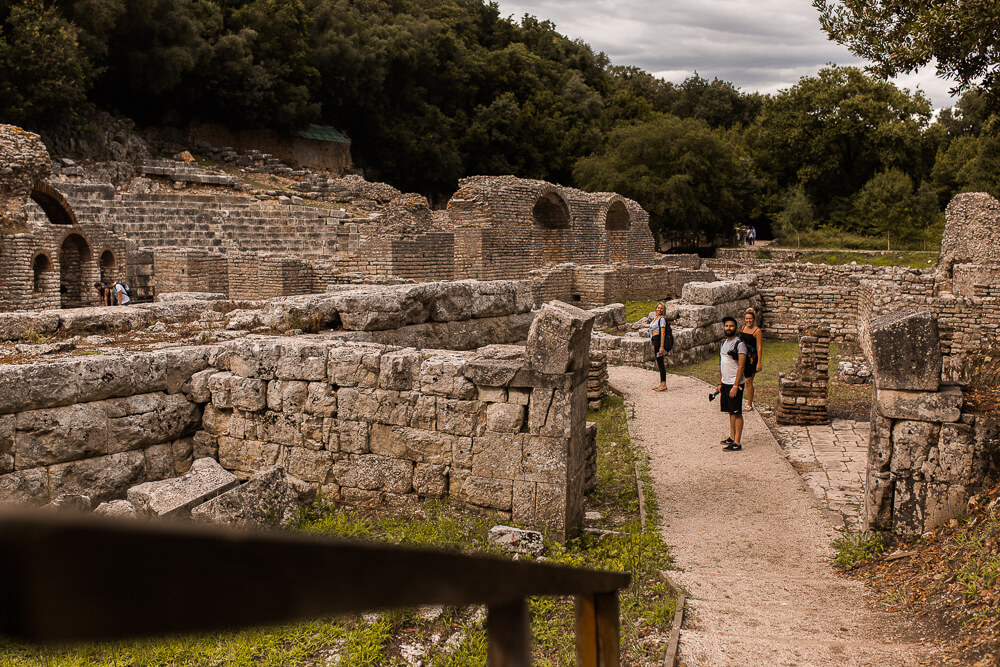
Once the capital of Albania, this town is one of Albania’s best beach towns, and popular with tourists and locals alike. It can get crowded, but the town is full of history, the beach is beautiful, and the restaurants are full of fresh seafood. You can also hike to the ancient amphitheatre.
11. Apollonia
Another day trip from Tirana or Berat, the ruins of the ancient Illyiran city of Apollonia sit on an Albanian hilltop. This town, named after the Greek God Apollo, is less visited by tourists, but popular with locals for afternoon picnics in the olive groves.
See all the best things to do in Albania in this blog post.
Watch my trip to Albania come to life in this travel video…
SEE ALL MY YOUTUBE TRAVEL VIDEOS HERE
EXPLORE ALBANIA ON MY BLOG HERE
Have you been to Albania?
What top tips would you add to this Albania guide? I’d love to know!
Love as always and happy adventuring,
Did you find this post helpful? I’d love you to share it for me.
I can’t do this without you.
Pin and save this blog post for later…
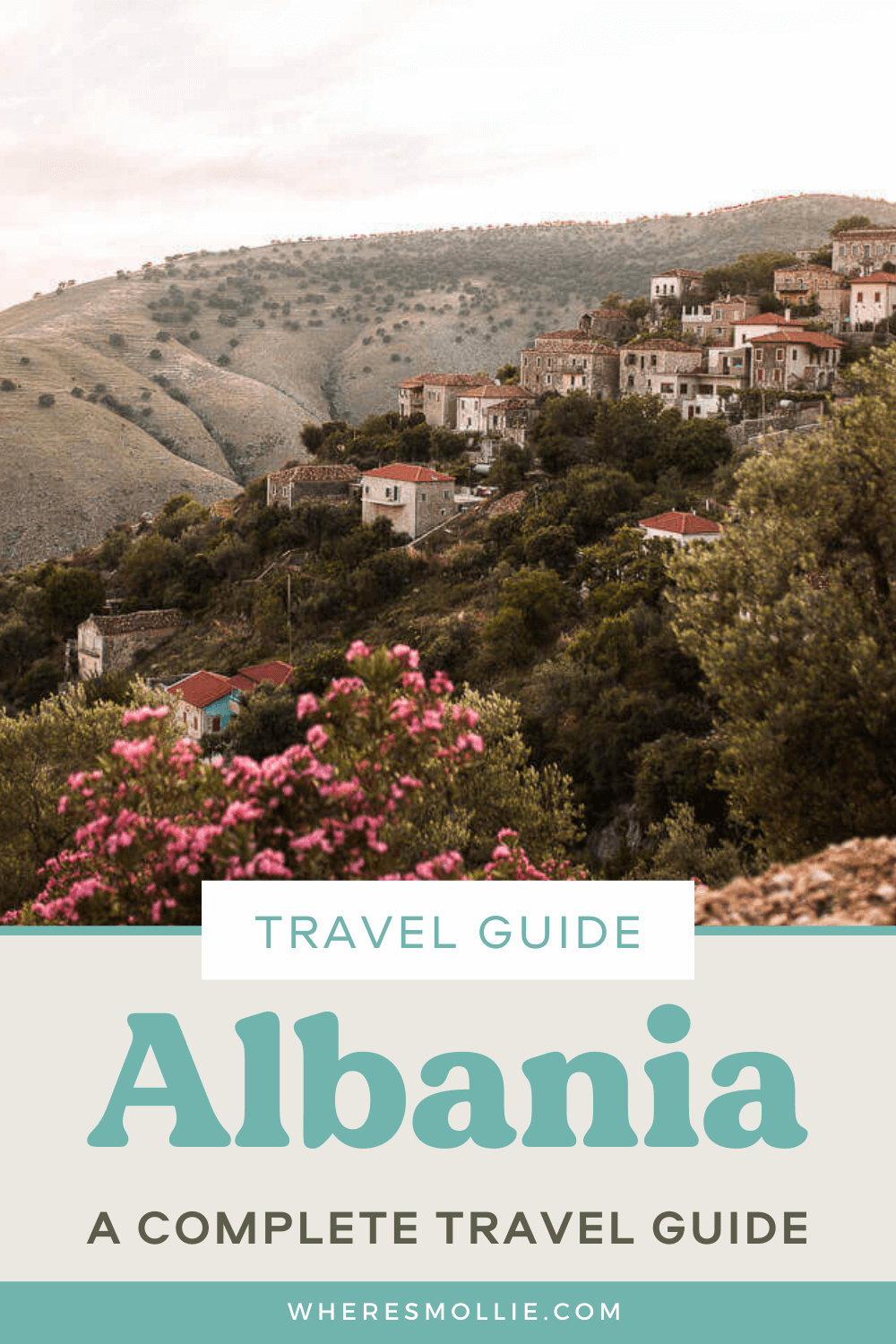
IT’S LOVELY TO MEET YOU
I’M MOLLIE AND I STARTED THIS BLOG BACK IN 2013 WHEN I HEADED OUT ON MY FIRST BACKPACKING ADVENTURE.
I’D LOVE TO SHARE THE JOURNEY WITH YOU, WE’VE GROWN A LOT SINCE THEN!
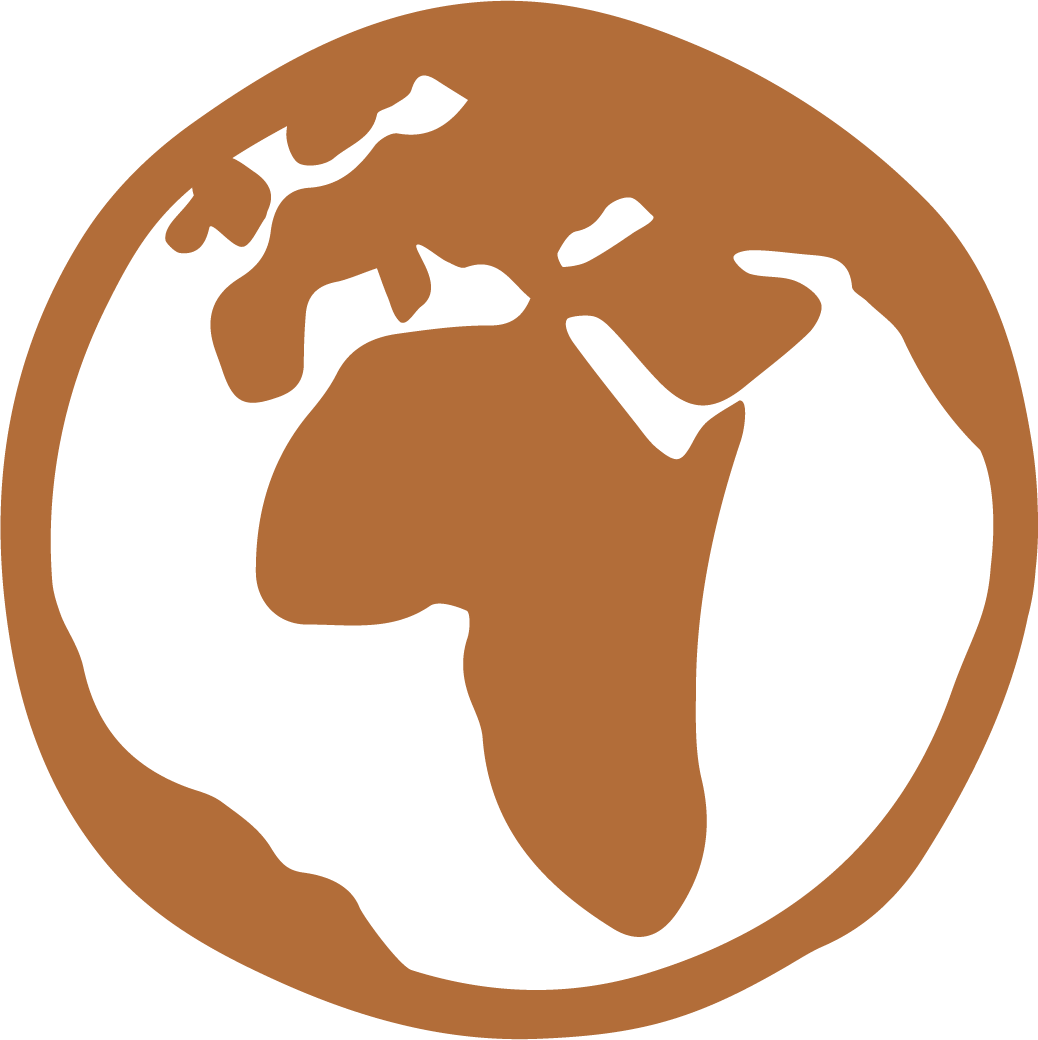
Shop the google map legends
Search by adventure type, active travel, backpacking, budget travel, love and relationships, once in a lifetime, packing tips, solo travel, weekend getaways, where's mollie newsletter, travel shop, search by destination, other posts that you may like....
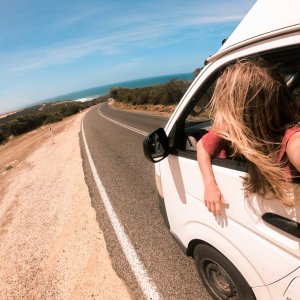
Van life in Europe: A bucket list of road trips to go on
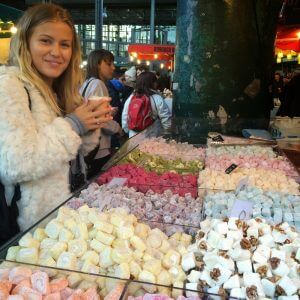
Borough Market + WokIt Noodles – Being a tourist in my own city…
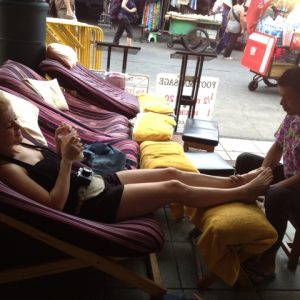
A 3-day itinerary for Marrakech
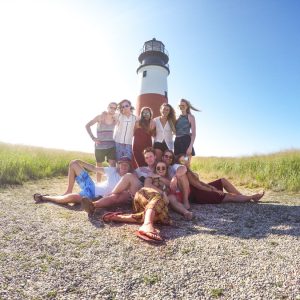
Nantucket Island, Massachusetts {Photo Diary}
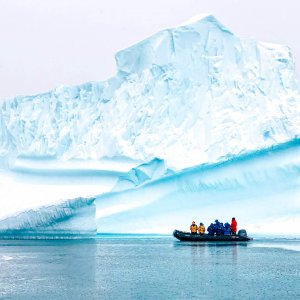
A complete guide to Antarctica
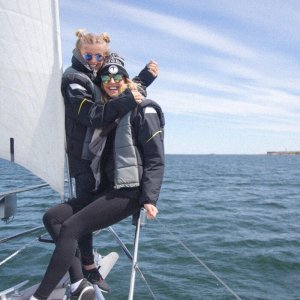
4 days in southern Finland exploring Helsinki, Salo and Hanko
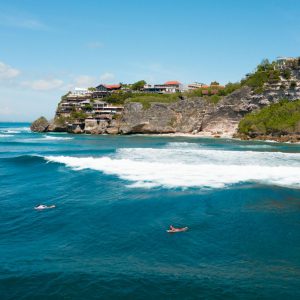
The ultimate guide to exploring Bali, Indonesia
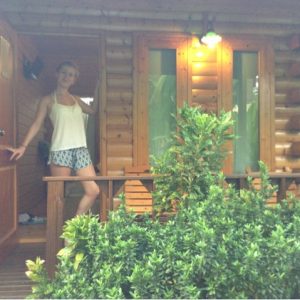
Chiang Mai – Tiger Temple
Security Alert May 17, 2024
Worldwide caution.
- Travel Advisories |
- Contact Us |
- MyTravelGov |
Find U.S. Embassies & Consulates
Travel.state.gov, congressional liaison, special issuance agency, u.s. passports, international travel, intercountry adoption, international parental child abduction, records and authentications, popular links, travel advisories, mytravelgov, stay connected, legal resources, legal information, info for u.s. law enforcement, replace or certify documents.
Before You Go
Learn About Your Destination
While Abroad
Emergencies
Share this page:
Travel Advisory July 26, 2023
Albania - level 2: exercise increased caution.
Reissued with obsolete COVID-19 page links removed.
Exercise increased caution in Albania due to crime .
Country Summary : Law enforcement’s ability to protect and assist travelers is limited in some areas, especially in remote regions. There has been targeted violence associated with illicit drug networks and organized crime countrywide. Travelers should remain aware of their surroundings and the extent of police and emergency services in their area.
Read the country information page for additional information to Albania.
If you decide to travel to Albania:
- Enroll in the Smart Traveler Enrollment Program (STEP) to receive Alerts and make it easier to locate you in an emergency.
- Follow the Department of State on Facebook and Twitter .
- Review the Country Security Report for Albania.
- Visit the CDC page for the latest Travel Health Information related to your travel.
- Prepare a contingency plan for emergency situations. Review the Traveler’s Checklist .
Embassy Messages
View Alerts and Messages Archive
Quick Facts
At least three months from the date of arrival
One page required for entry stamp
Not required for U.S. citizens. If you are a U.S. citizen and intend to stay more than one year in Albania, you will need to apply for a residency permit. residency permit .
A yellow fever vaccination certificate is required for travelers aged 1 year or over arriving from countries with risk of yellow fever transmission. A list of those countries can be found by visiting the World Health Organization (WHO) .
1,000,000 lekë (approximately $9,500 USD, though the rate can fluctuate) or equivalent.
1,000,000 lekë (approximately $9,500 USD , though the rate can fluctuate) or equivalent. For more information you can visit Albanian Customs website .
Embassies and Consulates
U.s. embassy tirana.
Rruga Stavro Vinjau, 14 Tirana, Albania Telephone: +(355) (0) 4-2247-285 Emergency After-Hours Telephone: +(355) (0) 4-2247-285 Fax: +(355) (0) 4-2374-957; +(355) (0) 4-2232-222 Email: [email protected]
Destination Description
Learn about the U.S. relationship to countries around the world.
Entry, Exit and Visa Requirements
There are no COVID-related entry requirements for U.S. citizens.
Visit the Embassy of Albania’s website for the most current visa information.
- Your passport should be valid for at least three months from the date of your arrival.
- You may enter the Republic of Albania as a tourist without a visa.
- U.S. citizens may stay up to one year in Albania without applying for a residency permit. If you wish to stay in Albania longer than one year, you may apply for a residency permit once you enter the country. For more information on residency permits in Albania, please see the Embassy website . Prospective residents or those wishing to remain in Albania for longer than one year or who intend to work or study must apply for a residency permit at the office of the Regional Directorate of Border and Migration Police with jurisdiction over their place of residence.
The U.S. Department of State is unaware of any HIV/AIDS entry restrictions for visitors to or foreign residents of Albania.
Find information on dual nationality , prevention of international child abduction and customs regulations on our websites.
Safety and Security
Terrorism: Some terrorist groups and those inspired by such organizations are intent on attacking U.S. citizens abroad. Terrorists are increasingly using less sophisticated methods of attack – including knives, firearms, and vehicles – to more effectively target crowds. Frequently, their aim is unprotected or vulnerable targets, such as:
- High-profile public events (sporting contests, political rallies, demonstrations, holiday events, celebratory gatherings, etc.)
- Hotels, clubs, and restaurants frequented by tourists
- Places of worship
- Shopping malls and markets
- Public transportation systems (including subways, buses, trains, and scheduled commercial flights)
For more information, see our Terrorism page.
Crime: Credit card fraud is common in Albania, and you should exercise caution by not letting your card out of sight when making a transaction. Visitors need to be very careful when using ATMs. Be alert for strangers looking over your shoulders at the PIN number, and also for any interference with the machine itself that could indicate a camera or card scanner that steals your details when you scan your card.
Carjacking is rare in Albania, but vehicle theft may occur. Make sure your vehicle is locked and keep your possessions well hidden in the trunk.
Recent crime statistics indicate a decrease in numerous violent crime categories to include attempted murder, robberies by force and armed robberies. Street crime is common in urban areas, predominantly at night. The most notable are burglaries, theft, and domestic violence claims.
Attacks using small improvised explosive devices and targeting individuals in contentious disputes have occurred. Remain vigilant when parking in unattended parking areas, avoid parking overnight in non-secure areas, and inspect vehicles for suspicious items. If you find something strange, do not tamper with it and contact the Albanian Police immediately.
Law enforcement’s ability to protect and assist travelers is limited in some areas, especially in remote regions. There has been targeted violence associated with illicit drug networks and organized crime countrywide. Travelers should remain aware of their surroundings and the extent of police and emergency services in their area.
Demonstrations occur frequently. They may take place in response to political or economic issues, on politically significant holidays, and during international events.
- Even demonstrations intended to be peaceful can turn confrontational and possibly become violent.
- Avoid areas around protests and demonstrations.
- Check local media for updates and traffic advisories.
International Financial Scams: See the Department of State and the FBI pages for information.
Victims of Crime: Report crimes to the local police by dialing 112 and contact the U.S. Embassy at +(355) 4 224 7285. Remember that local authorities are responsible for investigating and prosecuting the crime. U.S. citizen victims of sexual assault are encouraged to contact the U.S. Embassy.
See our webpage on help for U.S. victims of crime overseas .
The Embassy may be able to assist crime victims with the following:
- Help you find appropriate medical care
- Assist you in reporting a crime to the police
- Contact relatives or friends with your written consent
- Provide general information regarding the victim’s role during the local investigation and following its conclusion
- Provide a list of local attorneys
- Provide our information on victim’s compensation programs in the U.S .
- Provide an emergency loan for repatriation to the United States and/or limited medical support in cases of destitution
- Replace a stolen or lost passport
Domestic Violence: U.S. citizen victims of domestic violence may contact the Embassy for assistance.
Tourism: The tourism industry is regulated, but rules may be unevenly enforced. Hazardous areas/activities are not always identified with appropriate signage. Professional and certified staff may not be available to support some organized activities. In the event of an injury, access to appropriate medical treatment may be sporadic due to limited hours or physical distances. Outside metropolitan areas, it may take more time to reach first responders or medical professionals who can stabilize a patient and provide life-saving assistance. U.S. citizens are encouraged to purchase medical evacuation insurance. See our webpage for more information on insurance providers for overseas coverage .
Local Laws & Special Circumstances
Criminal Penalties: You are subject to local laws. If you violate local laws, even unknowingly, you may be fined, arrested, imprisoned, or deported.
Furthermore, some laws are also prosecutable in the U.S., regardless of local law. For examples, see our website on crimes against minors abroad and the Department of Justice website.
Arrest Notification: If you are arrested or detained, ask police to notify the U.S. Embassy immediately. See our webpage for further information.
Counterfeit and Pirated Goods: Although counterfeit and pirated goods are prevalent in many countries, they may still be illegal according to local laws. You may have to pay fines or give up such goods if you bring them back to the United States. In Albania, the import and export of goods that infringe on intellectual property rights is prohibited by law . See the U.S. Department of Justice website for more information.
Special Circumstances:
- Albania's customs authorities enforce strict regulations concerning import or export of particular items from Albania, including weapons, endangered wild fauna and flora, and narcotics, among others. Contact the Embassy of Albania in Washington, D.C. in the United States for customs requirements .
- Albanian law allows for dual citizenship. Albanian citizenship may be acquired at birth in certain instances, including if the child has one Albanian citizen parent and other circumstances are met. The Ministry of Internal Affairs, Department of Citizenship, handles citizenship issues. Foreigners can submit the requirements for obtaining citizenship to Albanian embassies abroad or to the regional police in the district they reside in Albania. For full details, please visit the website for the Agency for the Delivery of Integrated Services Albania: https://www.adisa.gov.al/albanian-citizenship/ .
- Albania is a cash economy. Credit card acceptance is limited but ATMs are widely available in cities.
- Sporadic blackouts throughout the country can affect food storage capabilities.
- Tap water is not safe to drink. Air pollution is also a problem throughout Albania, particularly in Tirana.
- Establishing a business in Albania has been made easier through the establishment of the National Business Center, as a single one-stop shop for providing business registration and licensing services. These administrative services are done through simple electronic procedures, in a short time and with symbolic tariffs.
Faith-Based Travelers: See our following webpages for details:
- Faith-Based Travel Information
- International Religious Freedom Report – see country reports
- Human Rights Report – see country reports
- Best Practices for Volunteering Abroad
LGBTI Travelers: There are no legal restrictions on same-sex sexual relations or the organization of LGBTI events in Albania. Albanian law does not permit same-sex marriage and does not legally recognize other countries’ same-sex marriage certificates. The government does not prosecute or discriminate against same-sex relationships. Same-sex married couples cannot apply for family residency permits, but they may register individually. Despite the law and the government’s formal support for LGBTI rights, homophobic attitudes remain.
See our LGBTQI+ Travel Information page and section 6 of our Human Rights report for further details.
Travelers with Disabilities: The law in Albania prohibits discrimination against persons with physical, intellectual, or mental disabilities, and the law is enforced. Social acceptance of persons with disabilities in public is not as prevalent as in the United States. The most common types of accessibility may include accessible facilities in newer buildings. Many public buildings remain inaccessible. Expect accessibility to be limited in public transportation, lodging, communication/information, and general infrastructure. Outside of Tirana, accessibility is limited. Aids, equipment, and devices, and rental, repair, or replacement services, have limited availability. Service providers, such as sign language interpreters or personal assistants, have limited availability. Contact the Albanian Disability Rights Foundation for more information.
Students: See our Students Abroad page and FBI travel tips .
Women Travelers: See our travel tips for Women Travelers .
For emergency services in Albania, dial 112 for an ambulance. Dial 127 or 128 for the Fire Department. Not all operators have English, or may have limited ability in English, but will attempt to connect you with an English-speaking responder when possible.
Ambulance services are not widely available and the training and availability of emergency responders may be below U.S. standards.
We do not pay medical bills. Be aware that U.S. Medicare/Medicaid does not apply overseas. Most hospitals and doctors overseas do not accept U.S. health insurance.
Medical Insurance: Make sure your health insurance plan provides coverage overseas. Most care providers overseas only accept cash payments. Visit the U.S. Centers for Disease Control and Prevention for more information on type of insurance you should consider before you travel overseas.
We strongly recommend you obtain supplemental insurance to cover medical evacuation.
Vaccinations: Be up-to-date on all vaccinations recommended by the U.S. Centers for Disease Control and Prevention for visitors to Albania.
Further health information:
- World Health Organization
- U.S. Centers for Disease Control and Prevention (CDC)
Air Quality : Visit AirNow Department of State for information on air quality at U.S. Embassies and Consulates. Air quality varies throughout Albania. Pollution can be a problem particularly in Tirana, and during certain times of year – such as winter, when wood or coal may be burned for heat.
Health Facilities: The U.S. Embassy maintains information on doctors and hospitals here . We do not endorse or recommend any specific medical provider or clinic.
- Adequate health facilities are available in Tirana and other cities but health care in rural areas may be below U.S. standards.
- Public medical clinics lack many basic resources and supplies.
- Hospitals and doctors often require payment “up front” prior to service or admission. Credit card payment is not always accepted.
- Private hospitals usually require advance payment or proof of adequate insurance before admitting a patient.
- Medical staff may not speak English.
- Generally, public hospitals are minimally staff overnight in non-emergency wards. Consider hiring a private nurse or having family spend the night with the patient, especially a minor child.
- Patients bear all costs for transfer to or between hospitals.
- Psychological and psychiatric services are limited, even in cities, with hospital-based care only available through government institutions.
Pharmaceuticals:
Always carry your prescription medication in original packaging, along with your doctor’s prescription. Albanian law prohibits the import and export of narcotic medications and psychotropic substances. For more information, visit the General Directorate of Customs website .
Exercise caution when purchasing medication overseas In Albania, while many medicines are available without a prescription, certain pharmaceuticals may require a prescription from a physician and are sold only at specialized pharmacies. Some medications may not be available locally. Medication should be purchased in consultation with a medical professional and from reputable establishments recommended by a physician.
U.S. Customs and Border Protection and the Food and Drug Administration are responsible for rules governing the transport of medication back to the United States. Medication purchased abroad must meet their requirements to be legally brought back into the United States. Medication should be for personal use and must be approved for usage in the United States. Please visit the U.S. Customs and Border Protection and the Food and Drug Administration websites for more information.
Assisted Reproductive Technology and Surrogacy : If you are considering traveling to Albania to have a child through use of assisted reproductive technology (ART) or surrogacy, please see our ART and Surrogacy Abroad page .
Water Quality: Tap water is not potable. Bottled water and beverages are safe, although many restaurants and hotels may serve tap water unless bottled water is specifically requested. Be aware that ice for drinks may be made using tap water.
Adventure Travel: Visit the U.S. Centers for Disease Control and Prevention website for more information about Adventure Travel .
Travel and Transportation
Driving conditions in Albanian can differ significantly from those in the United States. Reckless driving is common. Many drivers do not pay attention to traffic regulations, signals, lane markings, pedestrians, or other drivers. The number of fatalities from traffic accidents is high compared to other European countries. Road conditions vary and are especially poor in rural areas in winter months and during inclement weather. Older sections of the roadway system are poorly lit. Minor traffic disputes can quickly escalate, especially as some motorists could be armed.
- All international driving permits (IDP) issued under the 1949 Geneva Convention are accepted. An international driving permit can only be used for one year. If you wish to drive in Albania for more than one year, you must apply for an Albanian license.
- In Albania, driving is on the right-hand side of the road . Everyone in the vehicle must wear a seat belt. Mobile phones can be used while driving, but only with a hands-free set. Third-party insurance is required.
- Be aware emergency response services are inadequate. First responders have limited medical training and equipment. Accident victims are often transported to the nearest hospital in the car of a passerby.
- Do not travel at night. Travel outside of urban areas is particularly dangerous.
- Fuel and repair services are common in populated areas, but there is no formal roadside assistance. Tires and replacement parts may not be available.
Traffic Laws: You may be asked to show your passport in addition to a U.S. or international driver’s license if stopped. Police should provide you with a written ticket citing any fine issued. While procedures may vary by district, you should not generally pay fines directly to police officers; these will be collected at a local police precinct or court.
- If you have an accident, do not move your car, and wait for police to arrive.
- Disregard for traffic laws is widespread.
- You can use a U.S. or international driver’s license while in non-resident status in Albania. U.S. citizens remaining in Albania longer than one year must register and apply for resident status and must also apply for an Albanian driver’s license.
- It is illegal to drive under the influence of alcohol at any detectable level. Albania practices a zero-tolerance policy. The police will seize your driver’s license and vehicle if caught. You may also be fined or receive up to six months in prison.
- It is against the law to use a mobile phone without a hands-free device while driving. You will be fined if caught.
Public Transportation: Public transportation options are limited and not generally recommended for visitors. However, marked taxis are considered safe and recommended for use.
- There are no commercial domestic flights.
- Rail conditions are poor, limited, and service is unreliable.
- Private buses travel between most cities almost exclusively during the day on variable schedules.
- Intra-city transit is an unofficial system of privately-owned vans operating without schedules, set fares, or, occasionally, government permission. Many of these vans do not adhere to accepted safety and maintenance standards or driver training. Consider the condition of the van before traveling in one.
See our Road Safety page for more information.
Aviation Safety Oversight: As there is no direct commercial air service to the United States by carriers registered in Albania, the U.S. Federal Aviation Administration (FAA) has not assessed the government of Albania’s Civil Aviation Authority for compliance with International Civil Aviation Organization (ICAO) aviation safety standards. Further information may be found on the FAA’s safety assessment page .
Maritime Travel: Mariners planning travel to Albania should also check for U.S. maritime advisories and alerts . Information may also be posted to the U.S. Coast Guard homeport website , and the NGA broadcast warnings .
For additional travel information
- Enroll in the Smart Traveler Enrollment Program (STEP) to receive security messages and make it easier to locate you in an emergency.
- Call us in Washington, D.C. at 1-888-407-4747 (toll-free in the United States and Canada) or 1-202-501-4444 (from all other countries) from 8:00 a.m. to 8:00 p.m., Eastern Standard Time, Monday through Friday (except U.S. federal holidays).
- See the State Department’s travel website for the Worldwide Caution and Travel Advisories .
- Follow us on X (formerly known as "Twitter") and Facebook .
- See traveling safely abroad for useful travel tips.
Review information about International Parental Child Abduction in Albania . For additional IPCA-related information, please see the International Child Abduction Prevention and Return Act ( ICAPRA ) report.”
Travel Advisory Levels
Assistance for u.s. citizens, albania map, learn about your destination.
Afghanistan
Antigua and Barbuda
Bonaire, Sint Eustatius, and Saba
Bosnia and Herzegovina
British Virgin Islands
Burkina Faso
Burma (Myanmar)
Cayman Islands
Central African Republic
Cote d Ivoire
Curaçao
Czech Republic
Democratic Republic of the Congo
Dominican Republic
El Salvador
Equatorial Guinea
Eswatini (Swaziland)
Falkland Islands
France (includes Monaco)
French Guiana
French Polynesia
French West Indies
Guadeloupe, Martinique, Saint Martin, and Saint Barthélemy (French West Indies)
Guinea-Bissau
Isle of Man
Israel, The West Bank and Gaza
Liechtenstein
Marshall Islands
Netherlands
New Caledonia
New Zealand
North Korea (Democratic People's Republic of Korea)
Papua New Guinea
Philippines
Republic of North Macedonia
Republic of the Congo
Saint Kitts and Nevis
Saint Lucia
Saint Vincent and the Grenadines
Sao Tome and Principe
Saudi Arabia
Sierra Leone
Sint Maarten
Solomon Islands
South Africa
South Korea
South Sudan
Switzerland
The Bahamas
Timor-Leste
Trinidad and Tobago
Turkmenistan
Turks and Caicos Islands
United Arab Emirates
United Kingdom
Vatican City (Holy See)
External Link
You are about to leave travel.state.gov for an external website that is not maintained by the U.S. Department of State.
Links to external websites are provided as a convenience and should not be construed as an endorsement by the U.S. Department of State of the views or products contained therein. If you wish to remain on travel.state.gov, click the "cancel" message.
You are about to visit:

© Ilir Tsouko/Lonely Planet
Albania's stunning mountain scenery, crumbling castles, boisterous capital and dreamy beaches rival any in the Mediterranean and continue to enchant.
Best Places to Visit
Spending diaries, attractions, must-see attractions.

The Albanian Riviera
Early in the morning, before the tourist crowds arrive and when the rocks are still tinged in the yellow dawn light, you might just imagine that the…

The evocative ruins of the ancient Illyiran city of Apollonia sit on a windswept hilltop some 12km west of the city of Fier. While a large part of the…
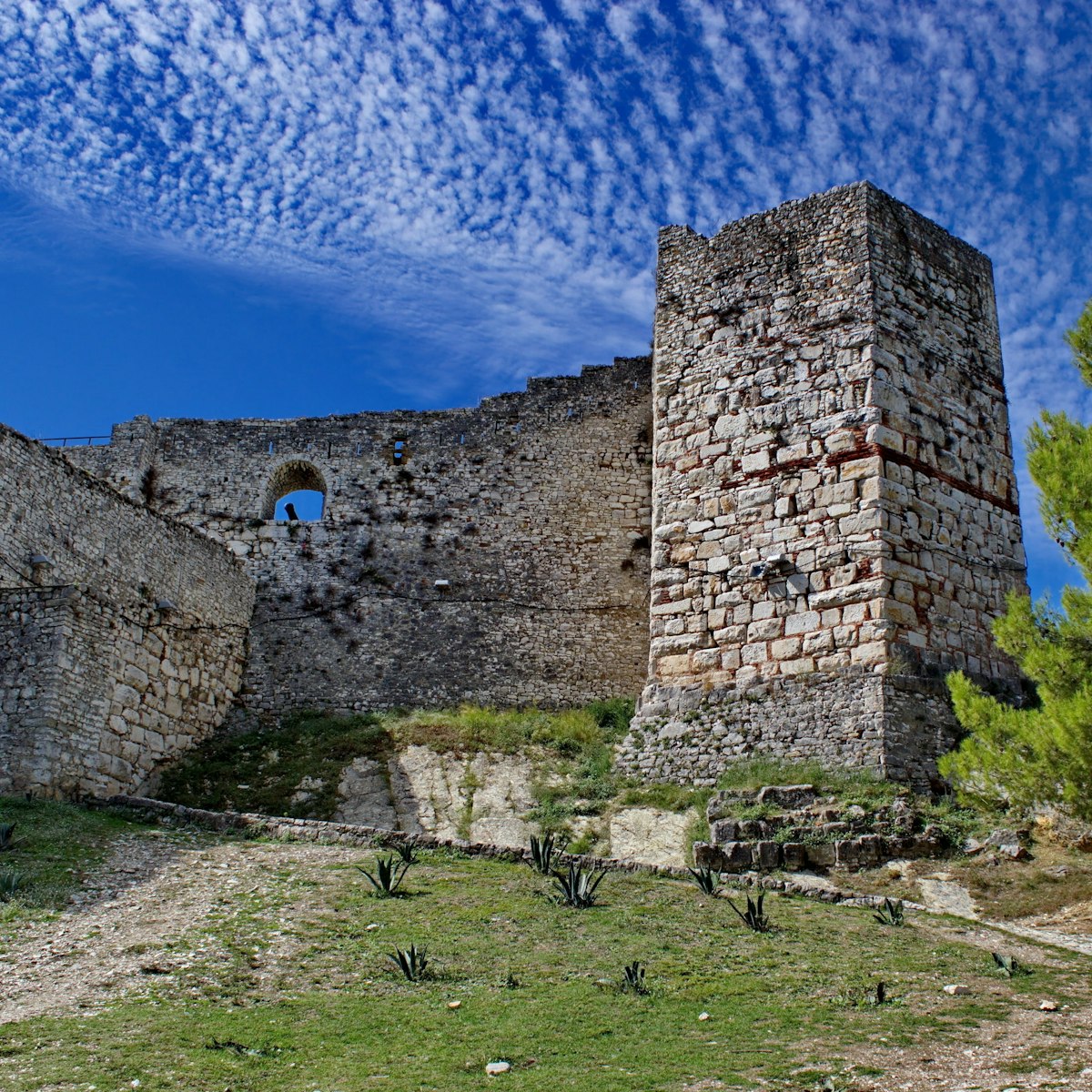
Hidden behind the crumbling walls of the fortress that crowns the hill above Berat is the whitewashed, village-like neighbourhood of Kala; if you walk…
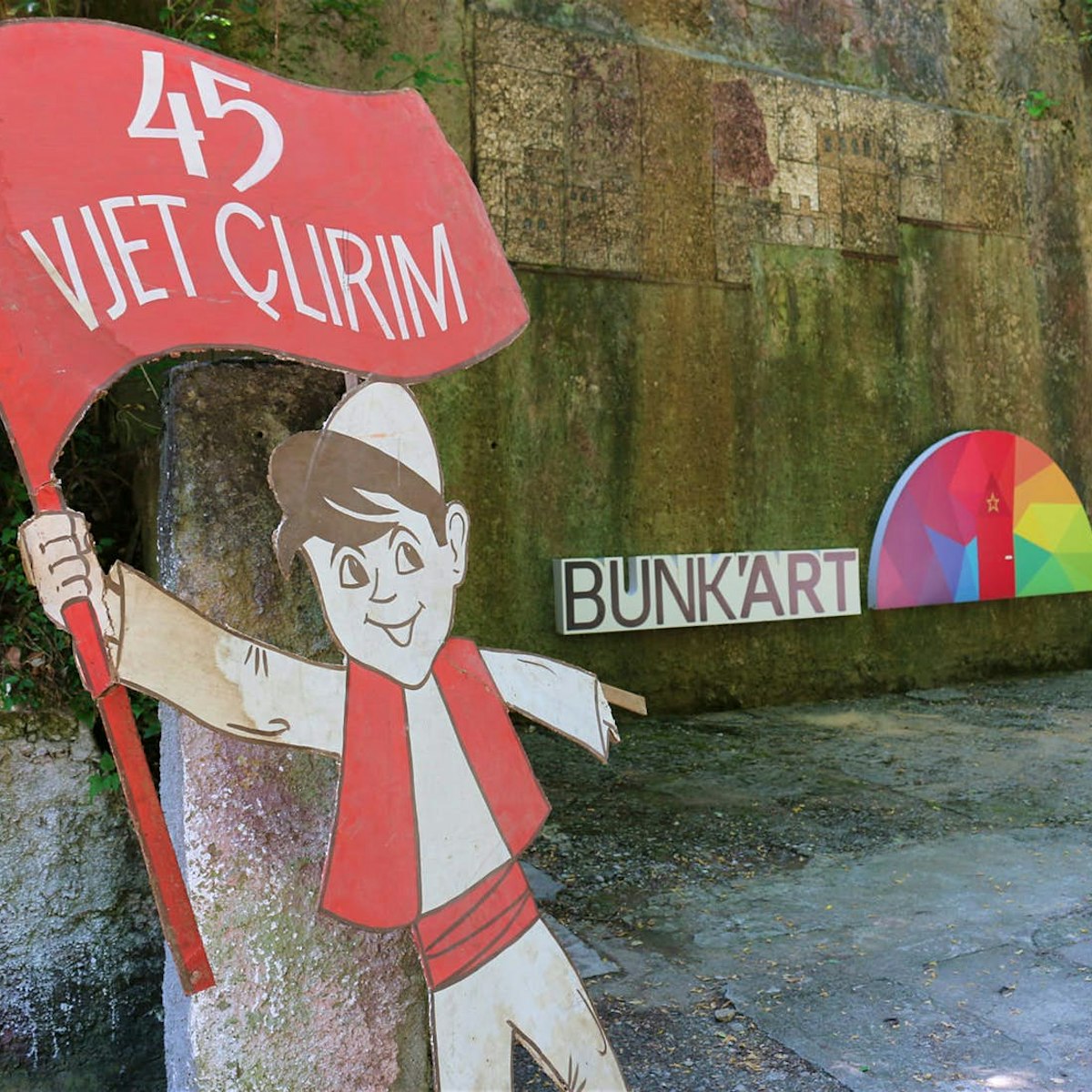
Bunk'Art
This fantastic conversion – from a massive Cold War bunker on the outskirts of Tirana into a history and contemporary art museum – is Albania's most…
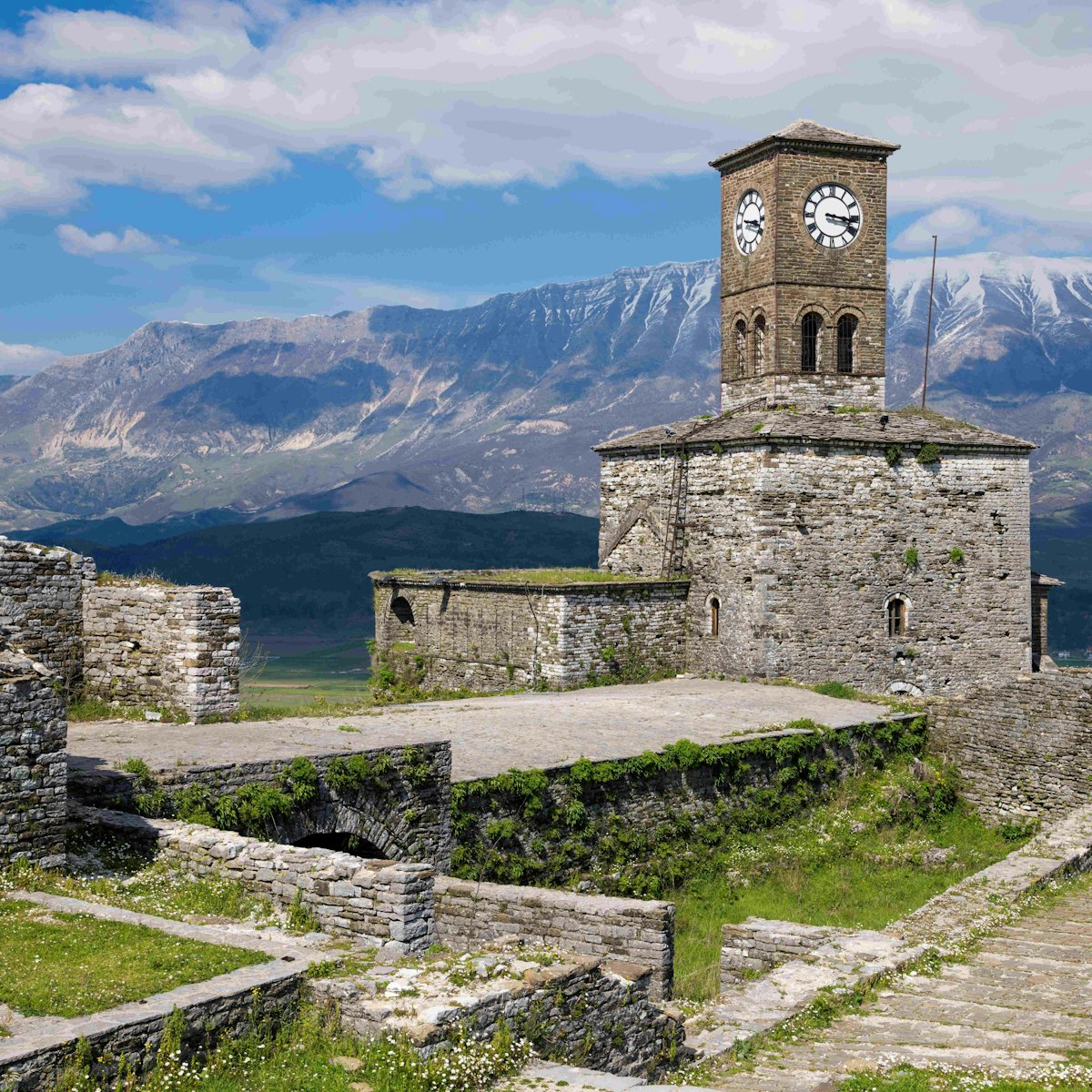
Gjirokastra Castle
Gjirokastra
Gjirokastra's eerie hilltop castle is one of the biggest in the Balkans. There's been a fortress here since the 12th century, although much of what can be…

Onufri Museum
The Onufri Museum is situated in the Kala quarter's biggest church, the Church of the Dormition of St Mary (Kisha Fjetja e Shën Mërisë). The church itself…

Durrës Archaeological Museum
This ultra-modern, well lit and labelled museum just back from the seafront has a breathtaking collection of historical artefacts. Highlights include the…

Gjipe Beach
Between Dhërmi and Vuno is the turn-off for this little-known gem, a gorgeous stretch of isolated white sand and rock backed by big cliffs – and as yet…
Latest stories from Albania
Filter by interest:
- All Interests
- Adventure Travel
- Art & Culture
- Beaches, Coasts & Islands
- Food & Drink

Destination Practicalities
Jun 30, 2024 • 6 min read
Albania's popularity as a tourist destination continues to increase. Here's what every first-time visitor needs to know.

Nov 18, 2023 • 7 min read

Aug 23, 2023 • 7 min read

Apr 6, 2023 • 3 min read

Nov 15, 2022 • 7 min read

Nov 15, 2022 • 2 min read

Feb 1, 2021 • 5 min read

Nov 12, 2020 • 10 min read

Feb 28, 2020 • 11 min read

Jun 24, 2019 • 4 min read
in partnership with getyourguide
Book popular activities in Albania
Albania and beyond.

- Skip to main content
- Skip to "About this site"
Language selection
Search travel.gc.ca.
Help us to improve our website. Take our survey !
COVID-19: travel health notice for all travellers
Albania travel advice
Latest updates: Editorial change
Last updated: August 7, 2024 17:13 ET
On this page
Safety and security, entry and exit requirements, laws and culture, natural disasters and climate, albania - take normal security precautions.
Take normal security precautions in Albania.
Back to top
Petty crime
Crimes of opportunity and petty crime, such as pickpocketing and purse snatching, occur. Thieves could target foreigners, particularly in crowded public areas such as:
- airports and public transportation facilities
- hotel lobbies
- restaurants, patios and outdoor cafés
- tourist sites and attractions
While travelling:
- ensure that your belongings, including your passport and other travel documents, are secure at all times
- don’t keep your passport and other types of ID in the same place and carry a photocopy rather than the original
- avoid showing signs of affluence or wearing expensive jewellery
- avoid carrying large sums of cash or unnecessary valuables
- avoid deserted streets at night
- pay attention to your surroundings, particularly in crowded and tourist areas
- be extra cautious when withdrawing cash from ATMs
Residential break-ins
Residential break-ins occur. Burglars may target rental accommodations or houses and apartments owned by foreigners.
- Choose well-secured accommodation
- Make sure you lock doors and windows at night and when you’re away
Car theft and break-ins occur. Rental and luxury vehicles are a target of choice.
- Familiarize yourself with your route before starting the trip
- Keep your windows and doors locked at all times
- Keep your belongings out of reach
- Use secure parking facilities, especially overnight
- Never leave belongings unattended in a vehicle, even in the trunk
Violent crime
Organized crime-related violence occurs. Criminals may use firearms. In some instances, they have used improvised explosive devices.
While violent incidents don’t typically target foreigners or tourists, there is a risk of being in the wrong place at the wrong time.
Always be vigilant and aware of your surroundings.
Credit card and ATM fraud
Credit card and ATM fraud occurs. When using debit or credit cards:
- pay careful attention when others are handling your cards use ATMs located in public areas or inside a bank or business
- avoid using card readers with an irregular or unusual feature
- cover the keypad with one hand when entering your PIN
- check for any unauthorized transactions on your account statements
Cybercrime also occurs. Perpetrators may compromise public Wi-Fi networks to steal credit card or personal information.
- Avoid using unsecured public Wi-Fi networks
- Avoid making purchases on unencrypted websites
- Use sound judgment when posting information on social media
- Be particularly vigilant when contacting or meeting individuals known over the internet
- Never click a suspicious link in an email or text message asking for your credit card details
Overseas fraud
Spiked food and drinks
Never leave food or drinks unattended or in the care of strangers. Be wary of accepting snacks, beverages, gum or cigarettes from new acquaintances.
There is a threat of terrorism in Europe. Terrorist attacks have occurred in a number of European cities. Terrorist attacks could occur at any time.
Targets could include:
- government buildings, including schools
- places of worship
- airports and other transportation hubs and networks
- public areas such as tourist attractions, restaurants, bars, coffee shops, shopping centres, markets, hotels and other sites frequented by foreigners
Always be aware of your surroundings when in public places. Be particularly vigilant during:
- sporting events
- religious holidays
- public celebrations
- major political events, such as elections
Terrorists may use such occasions to mount attacks.
Landmines and unexploded ordnance
Albania declared its landmine-free status in 2009. However, some areas remain clearly identified as dangerous zones or are surrounded by visible tape, especially along Albania’s northeastern border with Kosovo.
If you plan on visiting or hiking in these areas:
- pay attention to signs indicating the possible presence of landmines
- stay on paved roads
- avoid open fields, road shoulders and unmarked trails
- report anything suspicious to local authorities
Demonstrations
Demonstrations take place from time to time.
Even peaceful demonstrations can turn violent at any time. They can also lead to disruptions to traffic and public transportation.
- Avoid areas where demonstrations and large gatherings are taking place
- Follow the instructions of local authorities
- Monitor local media for information on ongoing demonstrations
Mass gatherings (large-scale events)
Soccer matches and sports events
Sports events sometimes lead to rowdy behaviour and violent incidents.
Be vigilant if you attend soccer matches and sports rallies.
Women’s safety
Women travelling alone in some rural areas may be subject to some forms of harassment and verbal abuse.
If you are a victim of sexual assault:
- seek medical assistance, even if you do not appear to have been physically harmed
- contact the local police immediately and ensure they file a report
- inform consular officials at the nearest Canadian embassy or consulate
Advice for women travellers
Water activities
Coastal waters can be dangerous.
In the fall and winter months, waves can be unpredictable, breaking further than expected and causing strong undertows.
- Be cautious when walking on the shore
- Avoid visiting beaches or coastal areas during periods of severe weather warnings
- Always consider warning flags at beaches
- Don’t dive into unknown water, as hidden rocks or shallow depths can cause serious injury or death
- Follow the advice of local authorities
Recreational boating
If you are planning to go boating:
- know the navigation rules
- follow safe practices for all water activities such as jet-skiing, water-skiing, diving, swimming or fishing
- don’t overload your boat capacity
- carry a VHF marine radio that will generate your position in case of emergency
- be prepared for emergencies
Water safety abroad
Mountain activities
Mountain activities, such as hiking, can be dangerous, especially if unprepared. Trails are not always marked and weather conditions can change rapidly, even in summer.
If you intend to go hiking or climbing:
- never do so alone and do not part with your hiking companions
- consider hiring an experienced guide from a reputable company
- buy travel insurance that includes helicopter rescue and medical evacuation
- ensure that your physical condition is good enough to meet the challenges of your activity
- ensure that you’re properly equipped
- stay informed about weather and other conditions that may pose a hazard
- inform a family member or friend of your itinerary
- obtain detailed information on trekking routes before setting out
- do not venture off marked trails
Power outages
Power outages occur regularly, including in Tirana. They may affect the provision of essential services such as heating and water supply.
- Verify the schedule of power cuts with local authorities
- Make sure your phone is always charged
- Keep supplies of food, water and fuel on hand in case of lengthy disruptions
- Carry a flashlight
Road safety
Road conditions and road safety are poor throughout the country. Major roads are passable, but secondary roads lack maintenance.
Driving conditions may be hazardous during winter, particularly on mountainous roads in northern and southeastern Albania. Heavy rains and landslides can hamper overland travel. Roads, including major routes, may become impassable. Power outages can also affect street lighting and traffic signals. Low-speed farm equipment, horse-drawn carts and wandering livestock are also common hazards.
Drivers are aggressive and can be reckless. They don’t always respect traffic laws.
If you plan on driving in Albania:
- always drive defensively
- be vigilant for pedestrians walking along roadsides, including on major highways
- carefully plan any travel outside the capital
- use a four-wheel-drive vehicle if travelling outside of urban areas
- inspect rental vehicles thoroughly
- ensure the rental company provides assistance in case of mechanical problems
- pre-negotiate fares and schedules
Public transportation
Buses, minibuses and trains operate between most major cities, but are unreliable. Safety standards are generally poor and petty crime is common.
There are ferries connecting Albania with Italy and Greece. Weather conditions and strong winds may lead to cancellations or delays.
- Pay attention to pre-departure notices from your carrier
- Double-check the departure schedule before heading to the port
Official taxis are generally safe.
- Use only officially marked taxis
- Negotiate fares in advance, or insist that the driver use the meter, as you may be overcharged
We do not make assessments on the compliance of foreign domestic airlines with international safety standards.
Information about foreign domestic airlines
Every country or territory decides who can enter or exit through its borders. The Government of Canada cannot intervene on your behalf if you do not meet your destination’s entry or exit requirements.
We have obtained the information on this page from the Albanian authorities. It can, however, change at any time.
Verify this information with the Foreign Representatives in Canada .
Entry requirements vary depending on the type of passport you use for travel.
Before you travel, check with your transportation company about passport requirements. Its rules on passport validity may be more stringent than the country’s entry rules.
Regular Canadian passport
Your passport must be valid for at least 3 months beyond the date you expect to leave from Albania.
Passport for official travel
Different entry rules may apply.
Official travel
Passport with “X” gender identifier
While the Government of Canada issues passports with an “X” gender identifier, it cannot guarantee your entry or transit through other countries. You might face entry restrictions in countries that do not recognize the “X” gender identifier. Before you leave, check with the closest foreign representative for your destination.
Other travel documents
Different entry rules may apply when travelling with a temporary passport or an emergency travel document. Before you leave, check with the closest foreign representative for your destination.
Useful links
- Foreign Representatives in Canada
- Canadian passports
Tourist visa: not required for stays up to 90 days in any 180-day period Business visa: not required for stays up to 90 days in any 180-day period Student visa: not required for stays up to 90 days in any 180-day period
You may apply for certain types of visas through the online visa portal.
- Visa regime for foreign citizens - Ministry for Europe and Foreign Affairs
- E-Visa application system - Albanian Government
- Children and travel
The Albanian government may consider children born to an Albanian parent to be Albanian citizens even if they were born in Canada and have a Canadian passport.
Children under the age of 18 are only allowed to leave Albania with both parents or with the consent of both parents. Upon exiting Albania, the absent parent must provide a statement of parental consent to travel, notarized by Albanian authorities.
If your children will be travelling to Albania alone or with one parent, contact the Embassy of the Republic of Albania in Canada before departure to ensure that they meet entry and exit requirements.
- Travelling with children
- Foreign representatives in Canada
Yellow fever
Learn about potential entry requirements related to yellow fever (vaccines section).
Relevant Travel Health Notices
- Global Measles Notice - 13 March, 2024
- COVID-19 and International Travel - 13 March, 2024
This section contains information on possible health risks and restrictions regularly found or ongoing in the destination. Follow this advice to lower your risk of becoming ill while travelling. Not all risks are listed below.
Consult a health care professional or visit a travel health clinic preferably 6 weeks before you travel to get personalized health advice and recommendations.
Routine vaccines
Be sure that your routine vaccinations , as per your province or territory , are up-to-date before travelling, regardless of your destination.
Some of these vaccinations include measles-mumps-rubella (MMR), diphtheria, tetanus, pertussis, polio, varicella (chickenpox), influenza and others.
Pre-travel vaccines and medications
You may be at risk for preventable diseases while travelling in this destination. Talk to a travel health professional about which medications or vaccines may be right for you, based on your destination and itinerary.
Yellow fever is a disease caused by a flavivirus from the bite of an infected mosquito.
Travellers get vaccinated either because it is required to enter a country or because it is recommended for their protection.
- There is no risk of yellow fever in this country.
Country Entry Requirement*
- Proof of vaccination is required if you are coming from a country where yellow fever occurs.
Recommendation
- Vaccination is not recommended.
- Discuss travel plans, activities, and destinations with a health care professional.
- Contact a designated Yellow Fever Vaccination Centre well in advance of your trip to arrange for vaccination.
About Yellow Fever
Yellow Fever Vaccination Centre
* It is important to note that country entry requirements may not reflect your risk of yellow fever at your destination. It is recommended that you contact the nearest diplomatic or consular office of the destination(s) you will be visiting to verify any additional entry requirements.
There is a risk of hepatitis A in this destination. It is a disease of the liver. People can get hepatitis A if they ingest contaminated food or water, eat foods prepared by an infectious person, or if they have close physical contact (such as oral-anal sex) with an infectious person, although casual contact among people does not spread the virus.
Practise safe food and water precautions and wash your hands often. Vaccination is recommended for all travellers to areas where hepatitis A is present.
Hepatitis B is a risk in every destination. It is a viral liver disease that is easily transmitted from one person to another through exposure to blood and body fluids containing the hepatitis B virus. Travellers who may be exposed to blood or other bodily fluids (e.g., through sexual contact, medical treatment, sharing needles, tattooing, acupuncture or occupational exposure) are at higher risk of getting hepatitis B.
Hepatitis B vaccination is recommended for all travellers. Prevent hepatitis B infection by practicing safe sex, only using new and sterile drug equipment, and only getting tattoos and piercings in settings that follow public health regulations and standards.
Measles is a highly contagious viral disease. It can spread quickly from person to person by direct contact and through droplets in the air.
Anyone who is not protected against measles is at risk of being infected with it when travelling internationally.
Regardless of where you are going, talk to a health care professional before travelling to make sure you are fully protected against measles.
Coronavirus disease (COVID-19) is an infectious viral disease. It can spread from person to person by direct contact and through droplets in the air.
It is recommended that all eligible travellers complete a COVID-19 vaccine series along with any additional recommended doses in Canada before travelling. Evidence shows that vaccines are very effective at preventing severe illness, hospitalization and death from COVID-19. While vaccination provides better protection against serious illness, you may still be at risk of infection from the virus that causes COVID-19. Anyone who has not completed a vaccine series is at increased risk of being infected with the virus that causes COVID-19 and is at greater risk for severe disease when travelling internationally.
Before travelling, verify your destination’s COVID-19 vaccination entry/exit requirements. Regardless of where you are going, talk to a health care professional before travelling to make sure you are adequately protected against COVID-19.
The best way to protect yourself from seasonal influenza (flu) is to get vaccinated every year. Get the flu shot at least 2 weeks before travelling.
The flu occurs worldwide.
- In the Northern Hemisphere, the flu season usually runs from November to April.
- In the Southern Hemisphere, the flu season usually runs between April and October.
- In the tropics, there is flu activity year round.
The flu vaccine available in one hemisphere may only offer partial protection against the flu in the other hemisphere.
The flu virus spreads from person to person when they cough or sneeze or by touching objects and surfaces that have been contaminated with the virus. Clean your hands often and wear a mask if you have a fever or respiratory symptoms.
In this destination, rabies may be present in some wildlife species, including bats. Rabies is a deadly disease that spreads to humans primarily through bites or scratches from an infected animal.
If you are bitten or scratched by an animal while travelling, immediately wash the wound with soap and clean water and see a health care professional.
Before travel, discuss rabies vaccination with a health care professional. It may be recommended for travellers who will be working directly with wildlife.
Safe food and water precautions
Many illnesses can be caused by eating food or drinking beverages contaminated by bacteria, parasites, toxins, or viruses, or by swimming or bathing in contaminated water.
- Learn more about food and water precautions to take to avoid getting sick by visiting our eat and drink safely abroad page. Remember: Boil it, cook it, peel it, or leave it!
- Avoid getting water into your eyes, mouth or nose when swimming or participating in activities in freshwater (streams, canals, lakes), particularly after flooding or heavy rain. Water may look clean but could still be polluted or contaminated.
- Avoid inhaling or swallowing water while bathing, showering, or swimming in pools or hot tubs.
Travellers' diarrhea is the most common illness affecting travellers. It is spread from eating or drinking contaminated food or water.
Risk of developing travellers' diarrhea increases when travelling in regions with poor standards of hygiene and sanitation. Practise safe food and water precautions.
The most important treatment for travellers' diarrhea is rehydration (drinking lots of fluids). Carry oral rehydration salts when travelling.
Insect bite prevention
Many diseases are spread by the bites of infected insects such as mosquitoes, ticks, fleas or flies. When travelling to areas where infected insects may be present:
- Use insect repellent (bug spray) on exposed skin
- Cover up with light-coloured, loose clothes made of tightly woven materials such as nylon or polyester
- Minimize exposure to insects
- Use mosquito netting when sleeping outdoors or in buildings that are not fully enclosed
To learn more about how you can reduce your risk of infection and disease caused by bites, both at home and abroad, visit our insect bite prevention page.
Find out what types of insects are present where you’re travelling, when they’re most active, and the symptoms of the diseases they spread.
Crimean-Congo haemorrhagic fever is a viral disease that can cause fever, pain and bleeding under the skin. In some cases, it can be fatal. It spreads to humans through contact with infected animal blood or tissues, or from the bite of an infected tick. Risk is generally low for most travellers. Celebrations which include the slaughtering of animals and contact with their blood and/ or tissues may increase the risk of exposure to the virus.
Protect yourself from tick bites and wear gloves or other protective clothing if you are in contact with the blood and tissues of animals, particularly livestock. There is no vaccine available for Crimean-Congo haemorrhagic fever.
Animal precautions
Some infections, such as rabies and influenza, can be shared between humans and animals. Certain types of activities may increase your chance of contact with animals, such as travelling in rural or forested areas, camping, hiking, and visiting wet markets (places where live animals are slaughtered and sold) or caves.
Travellers are cautioned to avoid contact with animals, including dogs, livestock (pigs, cows), monkeys, snakes, rodents, birds, and bats, and to avoid eating undercooked wild game.
Closely supervise children, as they are more likely to come in contact with animals.
Person-to-person infections
Stay home if you’re sick and practise proper cough and sneeze etiquette , which includes coughing or sneezing into a tissue or the bend of your arm, not your hand. Reduce your risk of colds, the flu and other illnesses by:
- washing your hands often
- avoiding or limiting the amount of time spent in closed spaces, crowded places, or at large-scale events (concerts, sporting events, rallies)
- avoiding close physical contact with people who may be showing symptoms of illness
Sexually transmitted infections (STIs) , HIV , and mpox are spread through blood and bodily fluids; use condoms, practise safe sex, and limit your number of sexual partners. Check with your local public health authority pre-travel to determine your eligibility for mpox vaccine.
Medical services and facilities
Good health care is limited in availability. Quality of care varies greatly throughout the country.
Access to medical equipment, pharmaceuticals, and specialists is limited. Government hospitals often lack basic drugs and equipment and have poor hygiene standards.
Ambulance services are very limited. In case of illness or injury, you may consider taking a taxi or private vehicle to go to the hospital rather than waiting for an ambulance.
Medical evacuation can be very expensive and you may need it in case of serious illness or injury.
Make sure you get travel insurance that includes coverage for medical evacuation and hospital stays.
Health and safety outside Canada
Keep in Mind...
The decision to travel is the sole responsibility of the traveller. The traveller is also responsible for his or her own personal safety.
Be prepared. Do not expect medical services to be the same as in Canada. Pack a travel health kit , especially if you will be travelling away from major city centres.
You must abide by local laws.
Learn about what you should do and how we can help if you are arrested or detained abroad .
Transfer to a Canadian prison
Canada and Albania are signatories to the Convention on the Transfer of Sentenced Persons. This enables a Canadian imprisoned in Albania to request a transfer to a Canadian prison to complete a sentence. The transfer requires the agreement of both Canadian and Albania authorities.
This process can take a long time, and there is no guarantee that the transfer will be approved by either or both sides.
Penalties for possession, use or trafficking of illegal drugs are severe. Convicted offenders can expect prison sentences and heavy fines.
Drugs, alcohol and travel
Identification
Authorities may request to see your ID at any time. You must also present a passport upon check-in at a hotel or to rent a car.
- Carry valid identification or a photocopy of it at all times
- Keep a photocopy of your passport in case it’s lost or seized
- Keep a digital copy of your ID and travel documents
Photography
Photography of military installations and critical infrastructure is regulated.
Request permission from local authorities before taking photographs of such installations.
Dual citizenship
Dual citizenship is legally recognized in Albania.
If you are a Canadian citizen, but also a citizen of Albania, our ability to offer you consular services may be limited while you're there. You may also be subject to different entry/exit requirements .
Dual citizens
International Child Abduction
The Hague Convention on the Civil Aspects of International Child Abduction is an international treaty. It can help parents with the return of children who have been removed to or retained in certain countries in violation of custody rights. The convention applies between Canada and Albania.
If your child was wrongfully taken to, or is being held in Albania, and if the applicable conditions are met, you may apply for the return of your child to the Albanian court.
If you are in this situation:
- act as quickly as you can
- contact the Central Authority for your province or territory of residence for information on starting an application under The Hague Convention
- consult a lawyer in Canada and in Albania to explore all the legal options for the return of your child
- report the situation to the nearest Canadian government office abroad or to the Vulnerable Children's Consular Unit at Global Affairs Canada by calling the Emergency Watch and Response Centre
If your child was removed from a country other than Canada, consult a lawyer to determine if The Hague Convention applies.
Be aware that Canadian consular officials cannot interfere in private legal matters or in another country's judicial affairs.
- List of Canadian Central Authorities for the Hague Convention
- International Child Abductions: A guide for affected parents
- The Hague Convention – Hague Conference on Private International Law
- Canadian embassies and consulates by destination
- Request emergency assistance
2SLGBTQI+ persons
Albanian law doesn’t criminalize sexual acts or relationships between persons of the same sex.
However, 2SLGBTQI+ persons could be discriminated against based on their sexual orientation, gender identity, gender expression, or sex characteristics.
Travel and your sexual orientation, gender identity, gender expression and sex characteristics
You must carry an international driving permit.
The legal alcohol limit is 0.05 percent.
Police have taken drastic measures to decrease the number of accidents. They strictly enforced:
- laws against drinking and driving
- speed limits
- other traffic laws
Respect the rules of the road to avoid heavy fines and confiscation of your driver’s licence.
If you are involved in a road accident, even a minor one, wait for the police to arrive.
International Driving Permit
The currency of Albania is the lek (ALL).
Credit cards are accepted in major cities. Cash is required for small purchases and for purchases over 1000 lek. Carry cash in rural areas.
You must make a declaration to customs upon entry or exit if you have more than €10,000, or the equivalent in other currencies. The sum includes:
- money orders
- traveller’s cheques
- any other convertible assets
Cash declarations - Customs of Albania
Flooding and landslides
Heavy rains, particularly during winter, can cause flooding and landslides including in Tirana. Roads may become impassable and infrastructure damaged.
- Exercise caution, particularly in areas around major rivers
- Stay informed of the latest regional weather forecasts
- Follow the advice of local authorities, including evacuation orders
Bulletin on natural hazards - Institute of Geosciences (in Albanian)
Earthquakes
Albania is located in an active seismic zone.
Earthquakes occur frequently and may disrupt communications, particularly the mobile telephone network.
Familiarize yourself with earthquake security measures in public and private buildings.
If you’re in or around an affected area:
- monitor local media for the latest developments
- follow the instructions of local authorities
Earthquakes - What to Do?
Forest fires are common during the summer. The air quality in areas near active fires may deteriorate due to heavy smoke.
In case of a significant fire:
- stay away from affected areas, particularly if you suffer from respiratory ailments
- monitor local media for up-to-date information on the situation
- follow the advice of local authorities
Air pollution
Smoke haze and other types of air pollution can be hazardous in Albania. Heavy construction in urban areas may contribute to poor air quality. Air pollution levels can change quickly.
During periods of high pollution:
- limit your outdoor activities, especially if you suffer from respiratory ailments or have pre-existing medical conditions
- monitor local media
Air pollution in Tirana - World Air Quality Index
Local services
In case of emergency, dial 112:
Other emergency services:
- police: 129
- medical assistance: 127
- firefighters: 128
Consular assistance
Albania, Malta, San Marino
For emergency consular assistance, call the embassy of Canada to Italy, in Rome, and follow the instructions. At any time, you may also contact the Emergency Watch and Response Centre in Ottawa.
The decision to travel is your choice and you are responsible for your personal safety abroad. We take the safety and security of Canadians abroad very seriously and provide credible and timely information in our Travel Advice to enable you to make well-informed decisions regarding your travel abroad.
The content on this page is provided for information only. While we make every effort to give you correct information, it is provided on an "as is" basis without warranty of any kind, expressed or implied. The Government of Canada does not assume responsibility and will not be liable for any damages in connection to the information provided.
If you need consular assistance while abroad, we will make every effort to help you. However, there may be constraints that will limit the ability of the Government of Canada to provide services.
Learn more about consular services .
Risk Levels
take normal security precautions.
Take similar precautions to those you would take in Canada.
Exercise a high degree of caution
There are certain safety and security concerns or the situation could change quickly. Be very cautious at all times, monitor local media and follow the instructions of local authorities.
IMPORTANT: The two levels below are official Government of Canada Travel Advisories and are issued when the safety and security of Canadians travelling or living in the country or region may be at risk.
Avoid non-essential travel
Your safety and security could be at risk. You should think about your need to travel to this country, territory or region based on family or business requirements, knowledge of or familiarity with the region, and other factors. If you are already there, think about whether you really need to be there. If you do not need to be there, you should think about leaving.
Avoid all travel
You should not travel to this country, territory or region. Your personal safety and security are at great risk. If you are already there, you should think about leaving if it is safe to do so.


TRAVEL to ALBANIA – Tips and Information Guide [2023]
Here is our complete guide to tell you everything you need to know to travel to Albania!
Whether you’re into epic mountain adventures, relaxing beach vacations or partying it up in a bustling city, Albania has something for you!
Albania is perfect for those who like to spend their time getting lost in the natural treasures of a country.
The beautiful coastline, stunning mountains and the flora are only a few of its wonders that bring tourists here from around the world.
Along with a rich history and culture, it is a great holiday destination for both energetic and chilled out tourists. You can count on spending a perfect beach vacation here, but you can also choose a more active approach.
The urban areas, although rather small, like the capital Tirana, have a unique spirit worth visiting. On the other hand, the Albanian Alps offer great hiking opportunities for mountain-lovers.
While its popularity is continuously growing year after year, it is still considered to be the Balkan’s hidden gem.
Unfortunately this stunning and diverse country is still relatively off the beaten path, thanks to a couple of major tourists hotspots in its vicinity.
Maybe that should inspire you to travel to Albania and try to uncover all it has to offer!
More and more tourists travel to Albania to experience its gritty, vibrant streets or to take a dip in its waters. Not only is Albania surrounded by two seas (the Adriatic and the Ionian), it also has a few wonderful rivers and lakes.
But in our opinion it would be a shame to visit Albania and not explore the Theth National Park, along with its gorgeous natural landmarks.
The food is an experience itself, combining influences that have shaped the history of the Balkan peninsula through the years!
So what are you waiting for? It’s time to delve into our guide to travelling to Albania and get you prepared for your next big adventure!
Albania Travel Guide
For a more detailed display of things you should see and do, make sure you read this Albania Travel Guide !
Along with those suggestions, you will also get all the important information necessary for a pleasant trip.
All you have to do is pack your bags and decide when you’ll take some time for yourself!
General Info
Here’s a list of certain things that you will definitely find useful on your visit.
The general info will come in handy one way or another!
- Currency: Albanian lek
- Capital: Tirana
- Language: Albanian
- Population: 2,876,591
- Area: 28,748 sq. km
- Electricity Voltage: The standard voltage is 220-240V at 50 Hz. If you have 110V appliances, you should use a voltage adaptor whilst in Albania.
- Electricity Sockets: Type C (also works with plug E and F) and type F (also works with plug C and plug E)
How to Get to Albania
There’s a bunch of different ways to travel to Albania, and the method you choose depends on where you are coming from, how long you have, and what your budget is.
When it comes to air travel, Albania has one major airport in Tirana – the Nënë Tereza.
Direct flights to it are available from many European cities, as well as Israel and Turkey. If you’re travelling from another continent, you will need to have a layover in a major city in Europe.
There still aren’t any direct flights available from North America, South America, Africa or Australia. The closest option for those coming from the Americas is flying to London or Frankfurt first.
The majority of the flights come from Italy (from around 15 cities), while German cities are in second place.
The large airlines that fly to Nënë Tereza are British Airways, Lufthansa, Turkish Airlines and Alitalia. If you’re interested in low-cost airlines, Wizzair has flights from Budapest, London and Dortmund.
Another airport, called the Kukës, should start working in 2020, and it should primarily be a low cost airport.
Getting to the Nënë Tereza from town is fairly simple.
You can take the shuttle (Rinas Express) from the centre of Tirana or travel by taxi.
The bus ticket costs around 2€, while the taxi fare is around 18€.
Make sure you look for the ATEx sign on the cars, since they are the only approved taxi company at the airport.
One of the most popular ways of reaching Albania is by ferry.
Most of them depart from Italy and arrive at either Durrës, Vlorë or Sarandë, although some come from Greece too.
Ferries for Durrës leave from Ancona, Bari and Trieste. If you go to Brindisi, you can catch a ferry to Vlorë and Sarandë.
There’s also a connection between Sarandë and Corfu in Greece.
The well-known Italian ferry operators are Adria Ferries, Adriatica di Navigazione, Azzurra Line, Venezia Lines and Ilion Lines.
On the other hand, if you’re planning to travel to Albania from Greece, check out Sarris and Ionian Seaways.
The prices depend on the number of passengers, whether you have a vehicle or not and the time of year.
There are a couple of ways to get to Albania by coach. Even though it’s not the most comfortable way to travel, it’s usually inexpensive and fairly frequent.
You can catch a bus to Albania from Istanbul, Athens, Prishtina, Tetovo, Thessaloniki, Sofia, Larisa, Ohrid and Ulcinj.
The prices go from 10€ to 35€ for a one-way ticket, depending on your starting point.
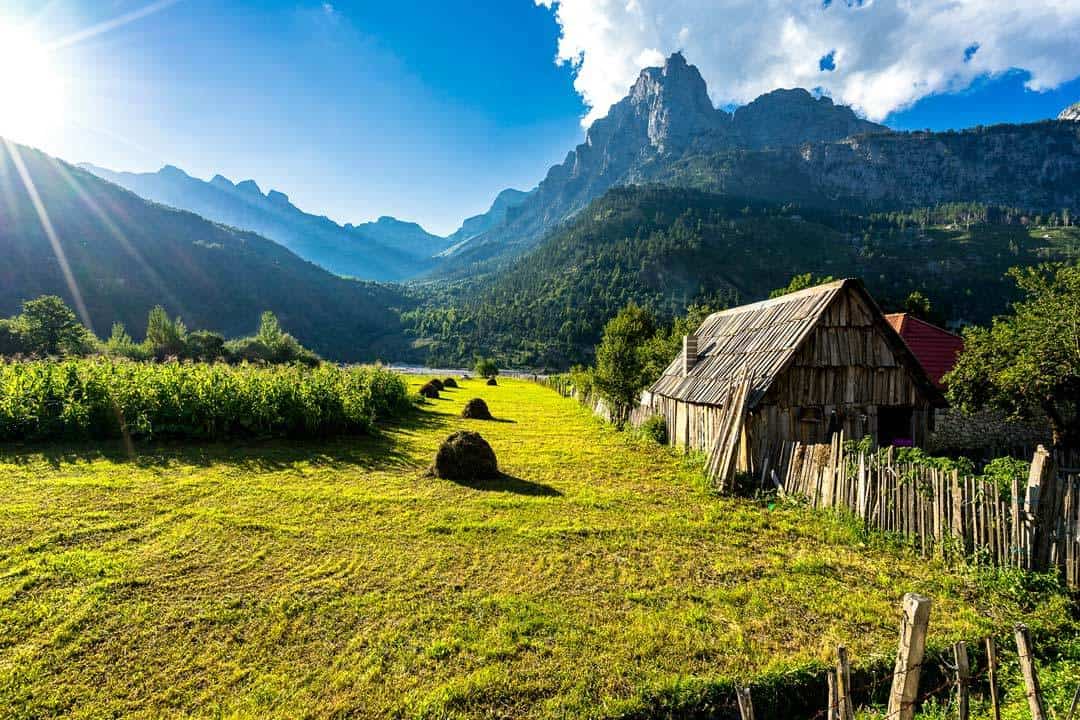
Albania Visa Requirements
All EU citizens, as well as those from the USA, Canada, Australia and UK, can travel to Albania without a visa.
The only condition is that they don’t spend more than 90 days there.
In total, there’s 55 countries whose nationals don’t need a visa for a 90-day stay in Albania. Check if yours is on the list by clicking here .
Those who didn’t find their country on the lists above must be issued with a visa.
They can be issued free of charge or cost up to 55 euros, depending on the country.
5 Interesting Facts About Albania
- The flora of Albania makes 30 percent of the entire European flora.
- The Albanian language is very unique. It is Indo-European, but it forms its own independent branch and it has no relatives!
- Until 1991, there were only around 5000 cars in Albania. The Communist dictator Enver Hoxha banned them and insisted that citizens walk or use some type of public transport.
- The Albanian Vjosa river is considered to be Europe’s very last free-flowing river. Make sure you see its beauty in person.
- Mother Teresa, born Anjezë Gonxhe Bojaxhiu, was Albanian!
Best Time to Travel to Albania
Albania’s climate is divided into 3 zones: the warm coast, the continental interior and the cold mountains on the north. Depending on what you’d like to see and do, you should choose different times of the year for your trip.
However, the best time to visit in general would be late spring and early fall. The temperatures will be pleasant and you’ll be able to enjoy all your activities.
So, anywhere between April and June, and then September and October.
If you’ve chosen Albania as your summer vacation destination and you like the heat, visit in July. That is the peak of the tourist season and the weather is extremely warm.
It is advised that you avoid the period between December and March , since it can get really cold and wet.
But, if you’re a lover of snow and winter sports, use this time to visit some of Albania’s ski destinations!
Another advantage of visiting during the cold months is that you’ll be one of the few tourists in Albania. Basically, it will be like living with the locals.
Albania Travel Itineraries Suggestions
Albania is a country of great variety and vibrancy.
Visiting different parts of it could feel like visiting multiple countries!
Planning your stay can get difficult, but we’ve created a couple of itinerary suggestions, based on different preferences.
Most of them require renting a car, but you could also rely on buses or the kindness of strangers.
Here’s a few ways to spend 10 days in Albania:
1. The Seaside
- Catch a ferry to Vlorë from Italy
- 2 days in Vlorë
- 2 days in Dhërmi
- 2 days in Sarandë
- 3 days in Ksamil
- Go back to Sarande and catch a ferry
2. Culture
- Fly to Tirana
- 3 days in Tirana
- 2 days in Berat
- 2 days in Gjirokastër
- 2 days in Krujë
- Go back to Tirana to fly out
Budget for Travelling in Albania
In general, Albania is inexpensive for Western tourists, especially when compared to some of the nearby countries, Croatia and Italy.
You can find accommodation for a reasonable price and there are great cheap food options. Museum tickets and public transportation fares are very affordable.
Some prices could go up slightly during the summer, especially in seaside towns, since that’s the peak of the season.
However, it’s never too drastic. Of course, it all comes down to your needs and personal spending habits.
There’s always something interesting to try and something to spend money on. But, if you put in a little effort into your planning, you could experience Albania on a budget!
The prices below are per day.
Budget for Backpackers in Albania
Single Traveller: 20€ – 40€
If you’re visiting during the spring or summer, backpacking is a great way to explore Albania. Accommodation in a hostel in Tirana is around 7-15 euros per night.
If you book ahead, you will be able to find the cheaper rooms.
Another suggestion is Booking.com or AirBnB, since you can really get lucky with the prices.
Click here to get $35 off your first stay on AirBnB.
Certain budget hotels can be very affordable, so you can get a room for around 20 euros/night. Ask around and try to find some free tours, since volunteers organise them from time to time.
If you’re trying to save money on food, there are always great on-the-go options for 2-3€ in total. For example, instead of eating in a restaurant, try the delicious, traditional Balkan pastry – burek.
It’s a win-win!
Use public transportation to get around, just like the locals do. The minibuses they often travel by are called furgons.
They don’t have a specific timetable, but they are cheap. Buses are even less expensive, but they’re slightly slower.
Flashpacker
Single Traveller: 50€ – 80€
Having a bigger budget means more comfort and luxuries, such as museums and restaurants.
The entrance to the National Museum in Tirana costs less than 2€, and most museums have the same prices. Make sure you visit as many as you can, for a glimpse into Albania’s history and culture.
You can have a delicious, satisfying meal for 5€ – 10€, as long as you avoid the most expensive places. Having a cup of coffee will never cost you more than 1,5 €.
Therefore, taking a break in a cute cafe can become your daily ritual.
The starting price for taxis is around 2€ – 3€, while every kilometre is approximately 1€.
You can treat yourself to this type of transportation, since it’s probably cheaper than in your home country!
You can find a mid-range hotel room in the very centre of Tirana for an average of 35€ – 45€/night.
The people are incredibly friendly, so you should consider asking a local for some recommendations!
Single Traveller: 90€ and more
Accomodation in Albania’s most luxurious hotels can cost you anywhere from 60€ to 90€ daily. That will allow you to enjoy private spas and transport to and from the airport, to name a few things.
You should consider booking a tour and letting a guide introduce you to everything this country has to offer.
Why travel to Albania if you’re not going to get to know it properly? Tours of the capital will cost you around 20€, while a full-day hiking tour will be close to 80€.
Depending on what you like, you’ll definitely find an option that fits your budget and your interests.
Fine dining won’t be too costly compared to average European prices. You won’t pay more than 40€ for the most expensive meal in a luxurious restaurant!
Consider buying an authentic Albanian souvenir to remind you of your experience.
Traditional Albanian rugs called kilims and the famous Skënderbeu Cognac are a great choice!
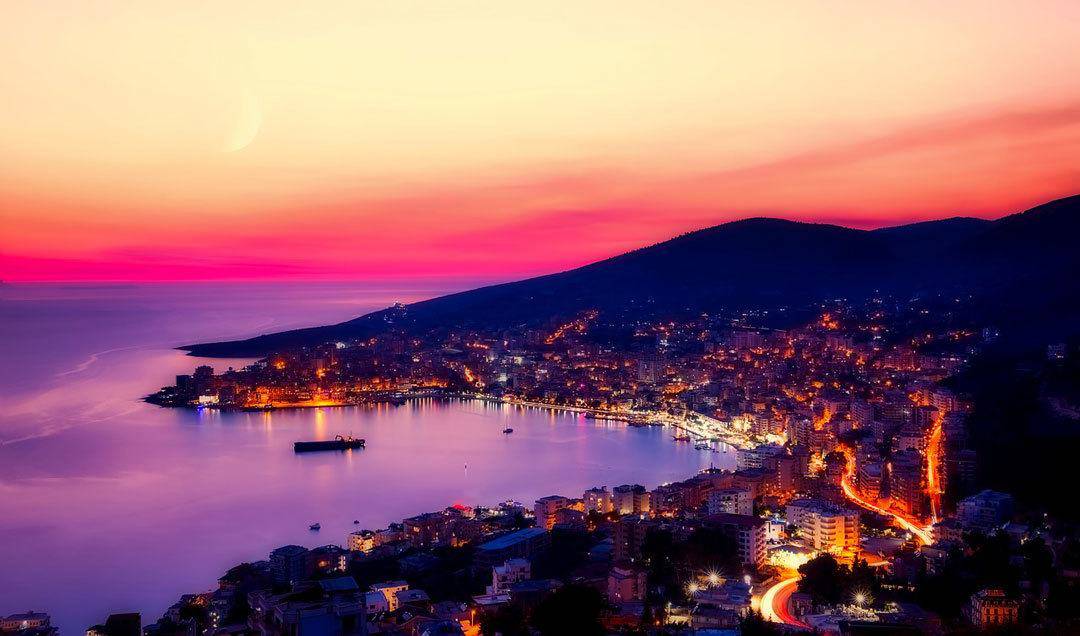
Top 5 Places to Visit in Albania
It’s hard to single out only 5 places, when there’s so much to see and do. But these five spots should be the ones you must not miss!
- The Blue Eye Of Theth : Located in one of Albania’s most beautiful national parks, this might be the most stunning sight in the country. If you’re into hiking, plan your route around this, it will definitely be rewarding!
- Gjirokastër : This lovely place is a UNESCO World Heritage Site. It gives visitors a chance to experience a real Ottoman town, as the architecture and the cobbled streets are well preserved!
- Berat : Berat is yet another UNESCO Site, also known as the “city of a thousand windows”. Visit its castle. churches and mosques to understand the diversity of Albania’s history and culture.
- Tirana : The capital is also the biggest and busiest city. Try to meet some locals and blend in with them so you could feel the real spirit of Tirana. Even though it’s not the most beautiful city you’ll see, you’ll see for yourself why it’s so appealing to tourists!
- The Riviera : You can’t travel to Albania and not spend some time on the seaside. The crystal clear waters of the two seas and the fairly cheap prices guarantee a good vacation. The Albanian riviera is a hidden treasure when it comes to European holiday destinations!
Top 5 Experiences To Have In Albania
- Hiking From Theth To Valbona : Albania’s most popular hike is also one of the most beautiful ones in this part of Europe. As long as you’re prepared for approximately 7 hours of walking, you’ll really enjoy the incredible scenery. Make sure you bring all of the necessary equipment and enough food, so that you can truly be focused on the nature. This isn’t the easiest journey, but it sure is worth the struggle!
- Experience xhiro : Xhiro is an authentic Albanian tradition. Every evening, people go out into the streets, usually the big boulevards, and take a walk. They use this time of day to catch up with their friends or neighbors and hear about each other’s days. Many use xhiro to sell their products, so they bring out whatever it is they’re selling into the streets. Don’t be surprised if you see people having a barbecue party on the sidewalk – it is all possible during xhiro. This Albanian social ritual is something you must be a part of while you’re in the country.
- Take a Tour About Albania’s Communist Past : As you may or may not know, Albania was under a Communist dictator Enver Hoxha until 1991. This era shaped the country into what it is today in many ways. There are still many sites to see all over Albania that are closely linked to that era. For example, entire parts of Tirana were restricted to those who weren’t members of the Communist party. This tour will introduce you to all the interesting facts about Albania’s 20th century history. It is exciting and strange and something you should definitely learn about!
- Osum River Rafting : The breathtaking Osum river canyons are a must-see for every nature enthusiast. Try to visit during the spring, since the water levels will allow you to see all the waterfalls. The adrenaline rush combined with the beautiful scenery will make for an unforgettable experience. There’s also an interesting legend involving the river and the two mountains surrounding it, Tomorr and Shpirag. The story says that two brothers killed each other because of a girl named Osum and that her tears formed the river.
- Visit the bazaars : Authentic Albanian bazaars exist in a few cities and they’re an amazing way to get to know their culture. They are a great place for buying traditional, handmade products, such as kilims and çifteli, an Albanian instrument. The Krujë bazaar is one of the most famous ones, since it has existed for hundreds of years. If you’d like to buy some souvenirs or just feel the bustling spirit, this is the place to be. Supporting small local businesses and craftsmen is something you should do in your country and abroad!
Transport in Albania
Using public transport in Albania can be unreliable, since timetables pretty much don’t exist. However, it is very cheap and fairly fast, so it’s still very popular among tourists and locals.
Most people travel by bus. The fares are very low, so you’ll rarely spend more than a few euros on the ticket.
The tricky part is that the bus leaves the station when it gets full, not according to the timetable. That means that you can’t really predict when it’s going to come.
It’s best to ask a local who uses the bus often to tell you an approximate time of arrival. Also, always get in the bus with the most passengers, since that one will leave first!
People also travel by furgon – a minibus or van of sorts – for a more pleasant trip. The same rule about leaving when full applies here as well.
Be aware that the driver picks up and drops off people along the way. Therefore, you can get off anywhere you want and get on whenever you hail the driver.
This type of transport is very unpopular and rarely used by the locals. The rail system is not developed and the trains are in bad condition, so it’s best to stick to other options.
If you do choose to try it, you’ll be happy to know that the tickets are cheap and the views are beautiful.
The trains operate between a couple of cities and towns, such as Durrës, Shkodër, Vlorë and a few more.
Also, you should know that Albania is not connected to other countries by train.
Even though taxis are the most expensive type of transport in Albania, they’re cheap compared to standard European prices.
The starting price is 250 lek, which is roughly 2-3 €. Every kilometre is an additional euro.
Most taxi drivers speak some English, so communicating won’t be an issue.
To avoid getting scammed, ask a local or the staff in your hotel to find you a taxi.
Accommodation in Albania
Whether you’re a backpacker or someone who needs more comfort, Albania covers it all. From hostels and tiny hotels to the, large world-famous ones, there are options for everyone.
An interesting way to spend your vacation is in an authentic guesthouse. There’s quite a few of them in Albania, but you might have to ask the locals for suggestions.
It’s really fascinating to wake up in a traditional Albanian household and eat freshly prepared meals!
The riviera destinations are growing more and more and, therefore, there’s an abundance of hotels.
However, wherever you go, AirBnB might be a good option, since it’s usually inexpensive.
Food in Albania
If you’ve ever been to the Balkans, you know that the food is incredible in every country.
Since it was influenced by many cultures through the centuries, it is a wonderful mix of flavours, ingredients and textures.
Many Albanian dishes have meat in them, but you can find vegetarian and vegan options.
If you have a sweet tooth, you won’t be unsatisfied. The desserts are usually made with nuts, crunchy dough or fruit.
The Berat region has the biggest fig plantation in Europe and their fig preserves are delicious!
Here’s a few dishes you must try when you travel to Albania:
- Tavë Kosi (baked lamb with rice and yogurt)
- Speca me Glizë (peppers stuffed with rice, veggies and ground meat)
- Fërgesë (creamy vegetable and cheese stew – could also be made with meat)
- Byrek (filo pastry filled with different toppings, such as cheese, spinach, meat and cabbage)
- Trilece (creamy, milky cake)
- Qofte të Fërguara (fried meatballs)
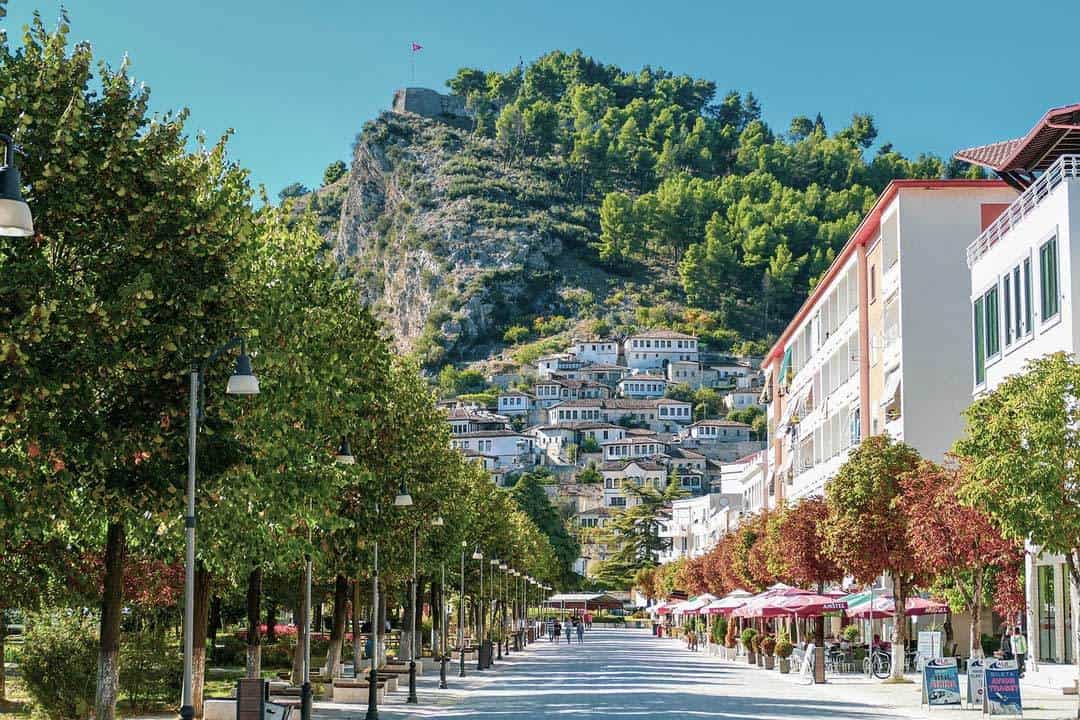
Safety in Albania
In general, Albania is a safe country for all visitors. There hasn’t been many instances of violence against tourists.
It’s even safe for solo women travellers, since the people are friendly and welcoming.
Pickpocketing is very rare and there aren’t any parts of Albania that are more risky than the others.
Of course, it is always advised that you take certain precautions, like keeping your money in a safe place.
One thing you should be careful about is the traffic.
Albanian drivers are notorious for not exactly following the rules and regulations, so be cautious when crossing the streets.
The roads are slowly getting better, but if you’re a driver yourself, you will need some patience.
Packing List For Albania
If you decide to come during the spring and summer, you won’t need a ton of clothes. The weather will be nice and pleasant, ideal for walking around.
But if you’re travelling to Albania during the colder months, please add a winter jacket to this list!
- 3 x t-shirts
- 1 x sweater
- 1 x sunglasses
- 1 x swimsuit
- 1 x flip-flops
- 2 x swimsuit
- 1 x comfy leggings/sweatpants
Miscellaneous Items
- Waterproof case
Medical Care In Albania
Since Albania is a relatively poor country, the state of the healthcare system is pretty much the same.
Tirana is the most developed in that sense and you shouldn’t have a problem finding help there.
You will be able to find a variety of medication in Albanian pharmacies, called barnatore.
However, if you’re on some type of regular prescription medication, make sure you bring it with you, along with a doctor’s letter.
It is recommended that you have travel insurance before you travel to Albania. Sometimes, you will have to pay in advance even if you’re covered.
The private hospitals and clinics in Tirana mostly have English-speaking doctors and nurses, so you’ll be able to explain your symptoms.
You shouldn’t be afraid of any specific diseases in Albania, but make sure you have all your vaccinations.
If you plan on spending time in the nature, pay attention to ticks and wear long sleeves and trousers.
In summary, if you have to seek medical care, try to go to Tirana, since the quality and safety is best there.
Travel Tips For Albania
- Try not to drink tap water. The water in some mountain areas is safe to drink and also very delicious, but make sure you educate yourself properly.
- Remember this: nodding in Albania means no and shaking your head means yes! Either adapt to the locals or stick to communicating with words only.
- Get used to the traffic chaos. Look left and right multiple times before crossing the street, get used to the honking and the speed. Also, public transport is irregular and often too packed with people.
- It is useful to know a few Albanian phrases and the locals will certainly appreciate it. For example, përshëndetje means hello and faleminderit means thank you. If you’d like to ask someone whether they speak English, say Flisni Anglisht?
- If you’re planning on exploring the Albanian mountains, bring some type of insect repellent. Also, cover your skin as much as possible, to avoid unpleasant rashes and insect bites.
- Try some of the Albanian wines! Albania has a very long tradition of wine making, dating back to the ancient Roman era. You can stick to the classics, or try some of the rare or more luxurious wines. For example, the Uka Farm is the only place in the world where you can drink Ceruja wine. If you’d like to switch things up, try the orange wine.
Read Our Albania Posts
The perfect 2 week taiwan itinerary (2024 guide), the best los angeles to grand canyon road trip (2024 guide), 11 best road trips from denver, colorado (2024 guide), the ultimate guide to driving the icefields parkway (2024 guide), 7 awesome day trips from montreal (2024 guide), 17 amazing things to do in jasper, ab (2024 epic guide), brisbane to cairns drive – the perfect road trip itinerary, best antarctica cruise – ultimate guide to who & how [2024], the 16 best road trips from los angeles, california (2024 guide), siyam world review – the best 5-star resort in the maldives, sun siyam iru fushi review – 5-star luxury in the maldives, gopro hero 12 review – is it worth buying in 2024.
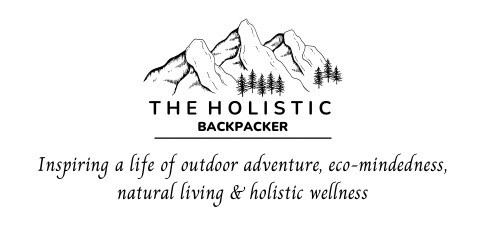
Inspiring a life of outdoor adventure, eco-mindedness, natural living & holistic wellness
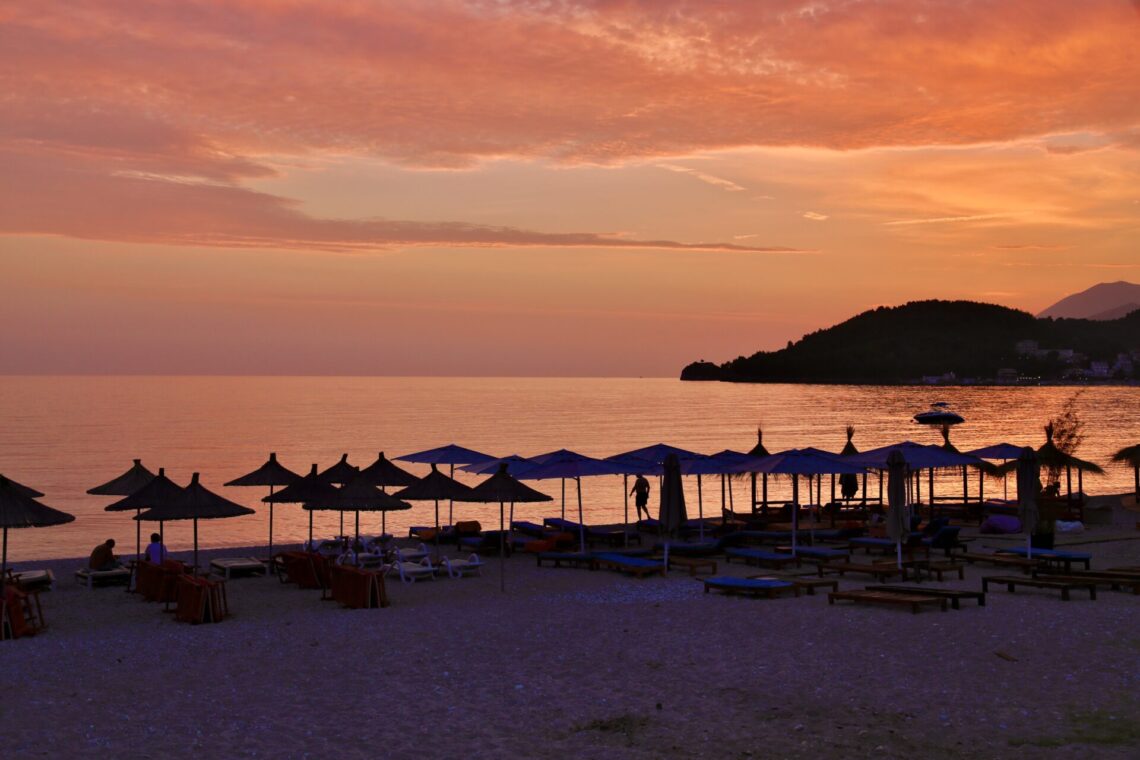
18 Helpful Albania Travel Tips You Should Know BEFORE Visiting
Albania is an unexplored paradise in the Balkans widely known as “the next Greece.” The country is FULL of hidden beaches, bright blue water, mountains, and untapped nature. In this article you’ll find 18 helpful travel tips for Albania I wish I would have known before visiting.
The culture and the way of life in Eastern Europe/the Balkans is much different than in North America or Western Europe. When you’re travelling in Albania you can expect a more laid back, slow lifestyle which is consequently reflected in the infrastructure, public transit, and other aspects of day-to-day life here.
Initially I was quite shocked and nervous about the way Albanians handle things, but once you get used to the culture and accept that things aren’t a “given,” you’ll relax and have a wonderful time exploring Albania. This all sounds weird and maybe even a little confusing, but once you read this article you’ll have a much better understanding of what I mean and know exactly what to expect!
As you read this post, please consider clicking the links throughout . These are affiliate links which means when you book a hotel or purchase a product, I make a small commission at no additional cost to you ( full disclosure ). These commissions fund The Holistic Backpacker and help me write more blog posts.
Thank you for supporting my work!
18 Helpful Travel Tips for Albania:
1. public transportation in albania.
My first Albania travel tip for you HAS to be about public transportation because the public transit in Albania is chaos… Organized chaos.
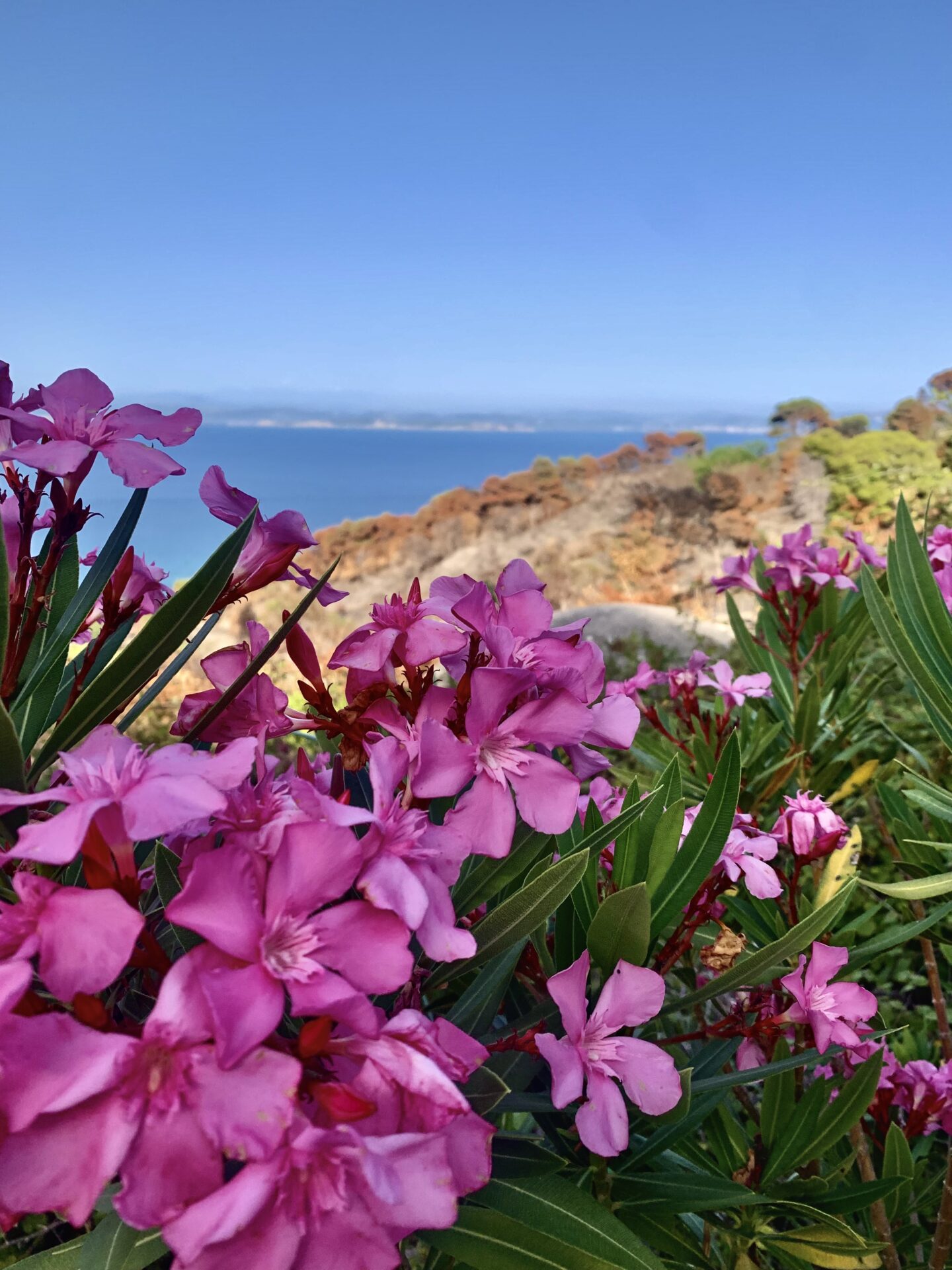
If you’re travelling anywhere in the country you’ll want to utilize the bus. You can forget about getting on a comfy train or taking a plane across the country. And taxis – they’re not crazy expensive, but you’ll save so much $ by walking and taking the bus. The locals use the bus and you should too (trust me).
The driving in Albania is absolutely nuts (more about that next) and it’s literally impossible to find bus routes and schedules without local knowledge. You can’t google how to get from point A to point B via google maps – the bus schedules in Albania aren’t uploaded on the internet – and there will be little to no information listed at actual bus stops about when the bus is coming or where it’s going.
The Albanian public transit sounds scary and daunting, but it’s totally doable – you got this!
Here are Some Helpful Tips for Taking the bus in Albania:
- ASK your hotel, hostel or wherever you’re staying for information about the bus schedules. The employees are super knowledgeable and this will be your best bet at finding accurate information about times and stops.
- If you struggle in the heat, travel via bus early morning or in the evening. The weather in Albania is SCORCHING in the summer and if you’re unlucky , your bus won’t have air conditioning.
- In addition to buses, sometimes you’ll be travelling via furgon (minibus). These buses actually don’t follow a schedule and depart whenever they’re full.
- NEVER rely on the last bus of the day – the public transit in Albania can be a bit dodgy. You don’t want to get stranded!
- There’s always a person on intracity buses who collects money – these people are SO kind and helpful. If you’re not sure where to get off ask and they’ll help you out. Just note that these people typically don’t speak English so it’s best you write down the name of the place you want to stop so they can see where you’re going.
- Be patient. The bus is super unreliable and will almost never be exactly on time (if there even is a “time).
- If you have important flights or travel dates, make sure you travel via bus early or a day in advance. The buses are extremely unreliable.
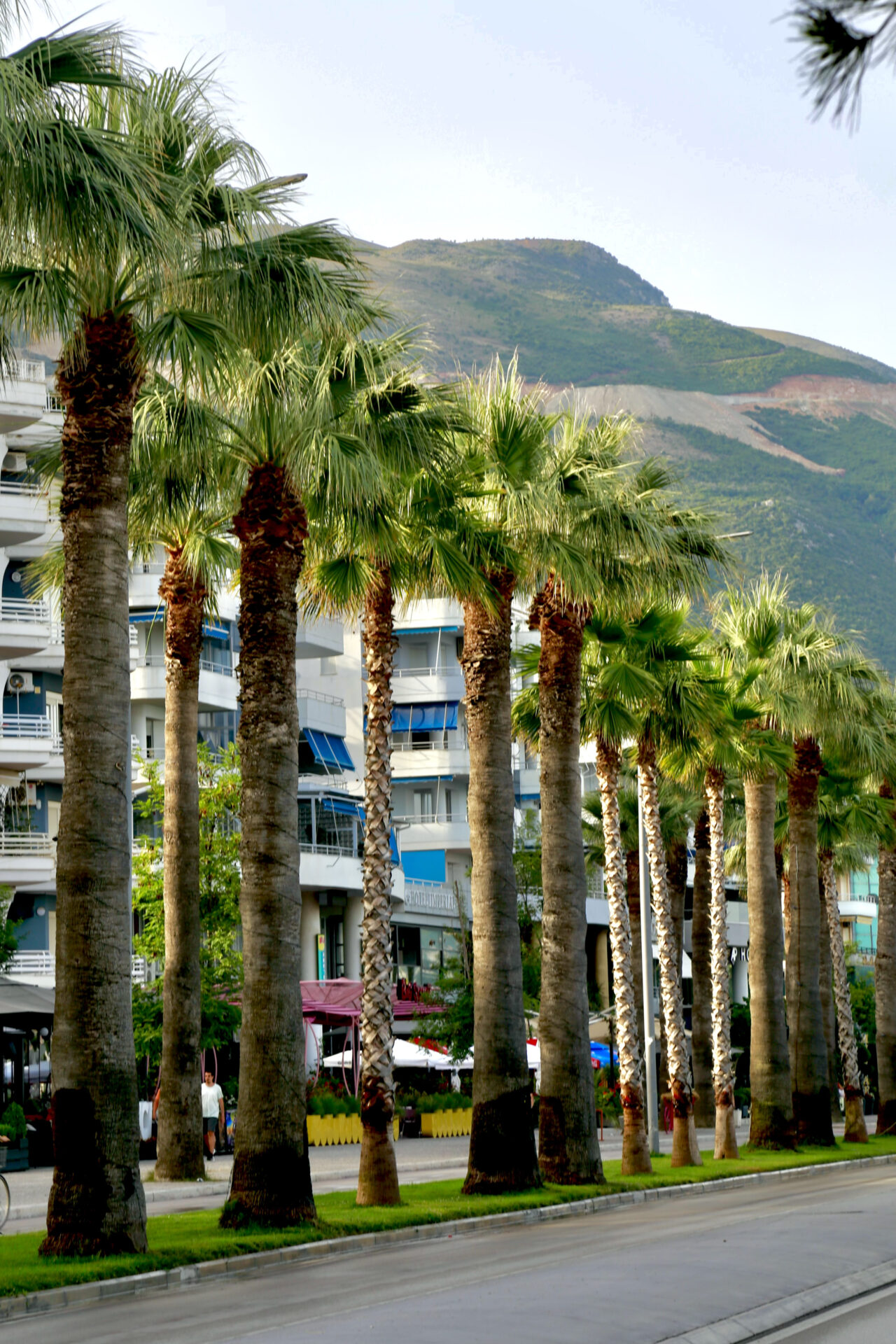
ps. the buses are super cheap in Albania which makes them a very affordable method of transportation! Intracity will cost you around 40 LEK ($0.45 CAD) and intercity it will usually cost around 6-12 euros.
Quick Albania Bus Story
Okay so ironically the DAY I started writing this post I had a horrendous Albania bus experience. I was travelling from Himara to Saranda which is a 1 hour bus ride… Long story short it took me 5 hours!
The bus was supposed to come at 12… never showed.
The bus was supposed to come at 1… never showed.
The bus was supposed to come at 2… never showed.
FINALLY the bus arrived at 2:30 – I spent a total of 2.5 hours in 100 degree heat waiting for this bus!
THEN the bus pulled off the side of the road, unloaded our luggage at a gas station and kicked us off. Yup.
We then had to wait another 20 minutes until a new bus came and when it finally did come it backed up into the gas station so fast it almost hit me!
On the second bus the driver was using his phone, making calls, and was screaming at the person on the other end. He stopped the bus to buy cigarettes and then engaged in what I was 99% sure was a drug deal.
When I finally made it Saranda I had a 1km uphill-ish walk to my hostel carrying my bags in the scorching heat.
I thought I’d arrive around 1 and instead I arrived at 5. And THIS is why you can’t put your faith in a timely Albanian bus schedule.
In summary, my #1 (and arguably most important) Albania travel tip is to use the public bus system, BUT to not necessarily rely on it.
2. Local Currency
Albania’s local currency is the Albanian LEK (aka ALL). The currency is closed which means you can’t exchange it abroad – you’ll have to wait until you arrive in Albania for that.
You can use euros anywhere in Albania, however the exchange rate is terrible and in most places it’s much easier using LEK. I’d recommend withdrawing a small amount of LEK at the airport – just enough to pay your taxi or bus to the center, then finding an ATM in the center.
Albania travel tip #3 – the Credins ATMs don’t have a service charge for withdrawing Albanian LEK!
3. SIM Card
When you arrive in Albania you’ll most likely want to pick up a SIM card. I don’t even want to KNOW how much roaming or international texting/calling would run you here.
You can pick up a SIM card in Albania at the airport or at Vodafone once you arrive in the city centre. In Tirana (where you’ll most likely arrive) there seems to be a Vodafone on every street corner so you won’t have any issues finding one.
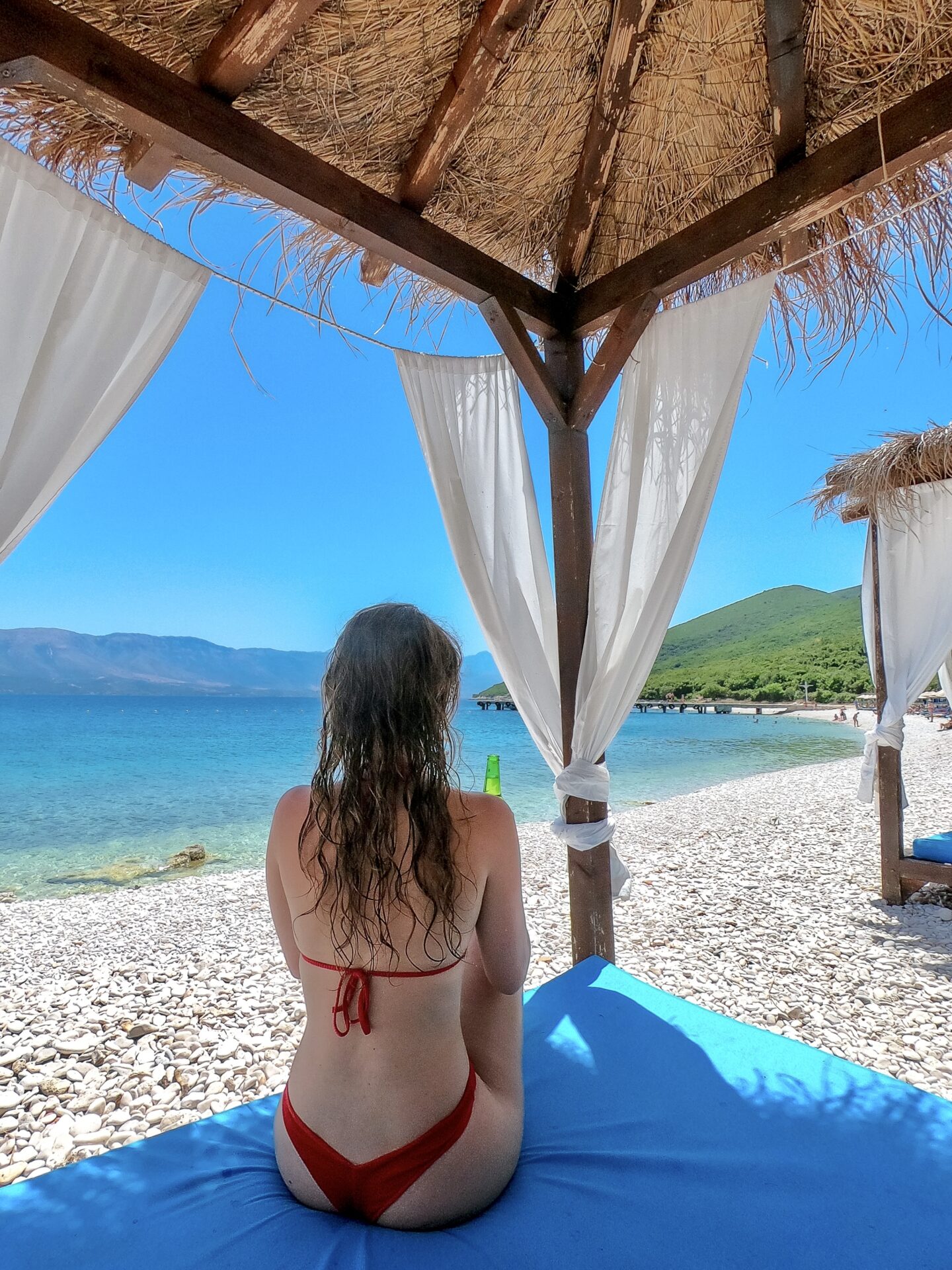
When I purchased my Albanian SIM card at Vodafone I actually got it free with a plan. And by the way, phone plans are cheap here – especially if you buy the monthly ones. You can get a whack load of data for under $20!
Albania travel tip #3 – grab a cheap SIM card, but pay attention to the international minutes and international texts as those are quite limited.
Connect via socials:
Sign up for emails to receive a 25% discount on my travel maps + occasional updates on new hiking guides & travel resources.
4. Safety in Albania
Albania (and a lot of the Balkan countries) have a bad rep for being unsafe, especially for solo female travellers. I’m here to tell you that’s not true!
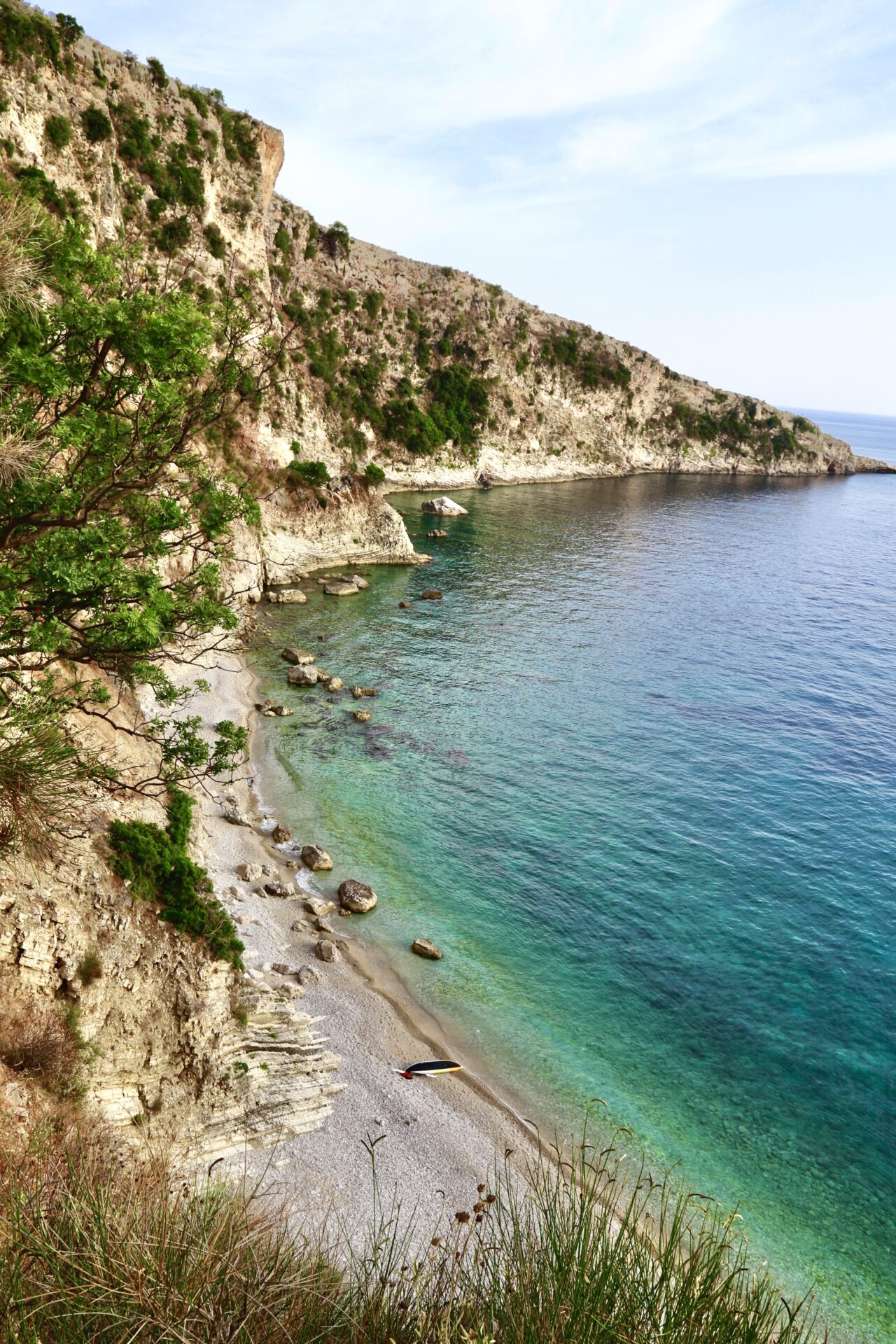
To be honest, a lot of Albania looks sketchy. SO sketchy . When I first arrived I was a bit worried because the streets, buildings, and even natural spots looked dangerous; trash everywhere, stray dogs, run down buildings, etc.
You’ll quickly discover that this is just Albania though! Just because it looks sketchy doesn’t mean it’s sketchy at all. In fact most places are totally safe and the people… The people are so lovely here.
Like anywhere you’ll want to take general safety precautions, but I honestly felt safer walking alone in Albania than I do in many places in Canada and the US. So, Albania travel tip #4 is to take normal safety precautions, but be open minded and don’t stress about everything!
I can’t attest to this because I didn’t personally hitchhike, but apparently it’s so safe here that the hitchhiking culture in Albania is huge! Everyone you talk to – locals and travellers alike – rave about how easy and safe it is to hitchhike in Albania.
5. People and Culture in Albania
Like I previously mentioned, the people in Albania are INCREDIBLE and so social! I’ve never been part of a culture that’s so kind, welcoming, helpful, and generous.
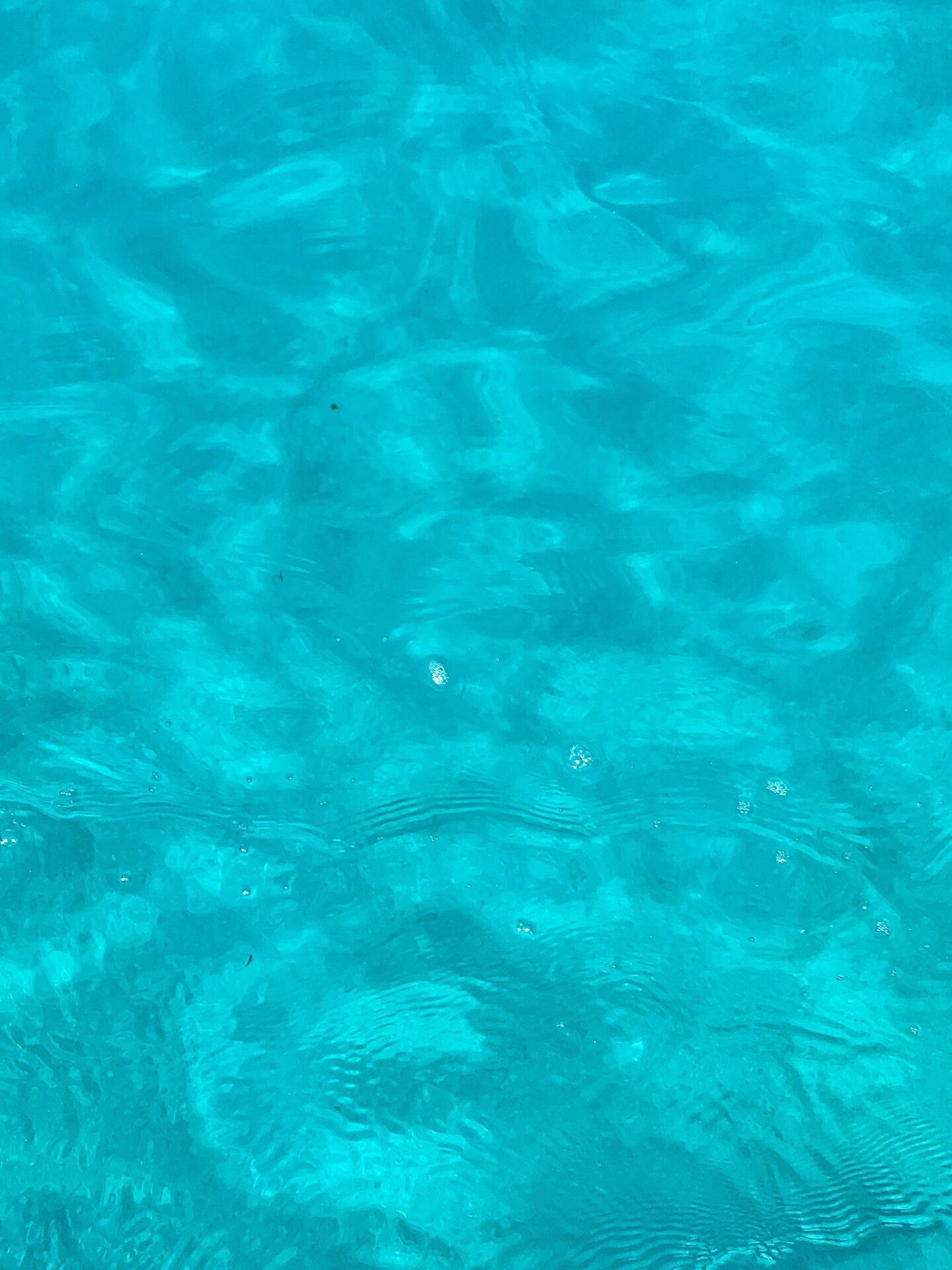
Almost everyone here wants to chat on the street and is willing to lend a helping hand, especially when it comes to public transit. I was struggling to navigate the bus one day. I asked a local man for help and he went so above and beyond. He got me on the right bus, paid my bus fare, brought me to the connecting furgon, carried my bags, AND invited me back to his bar in Tirana for free beers afterwards!
I’ve also noticed that Albanians are so excited to meet North American people. The locals are thrilled to hear I’m from Canada and they’re even excited to meet Americans too (unlike other places in Europe hahaha)! One night my American friend and I were blessed by a non-English speaking Albanian man. And for no particular reason either! He just heard us speaking English and wanted to send us good energy.
So, my 5th Albanian travel tip for you is to get to know the local people (it’s not hard) and don’t be shy about asking for help.
6. “Albania Time”
Remember that whole unreliable bus thing I was just talking about. Okay, well that ties into the whole “Albania time” thing.
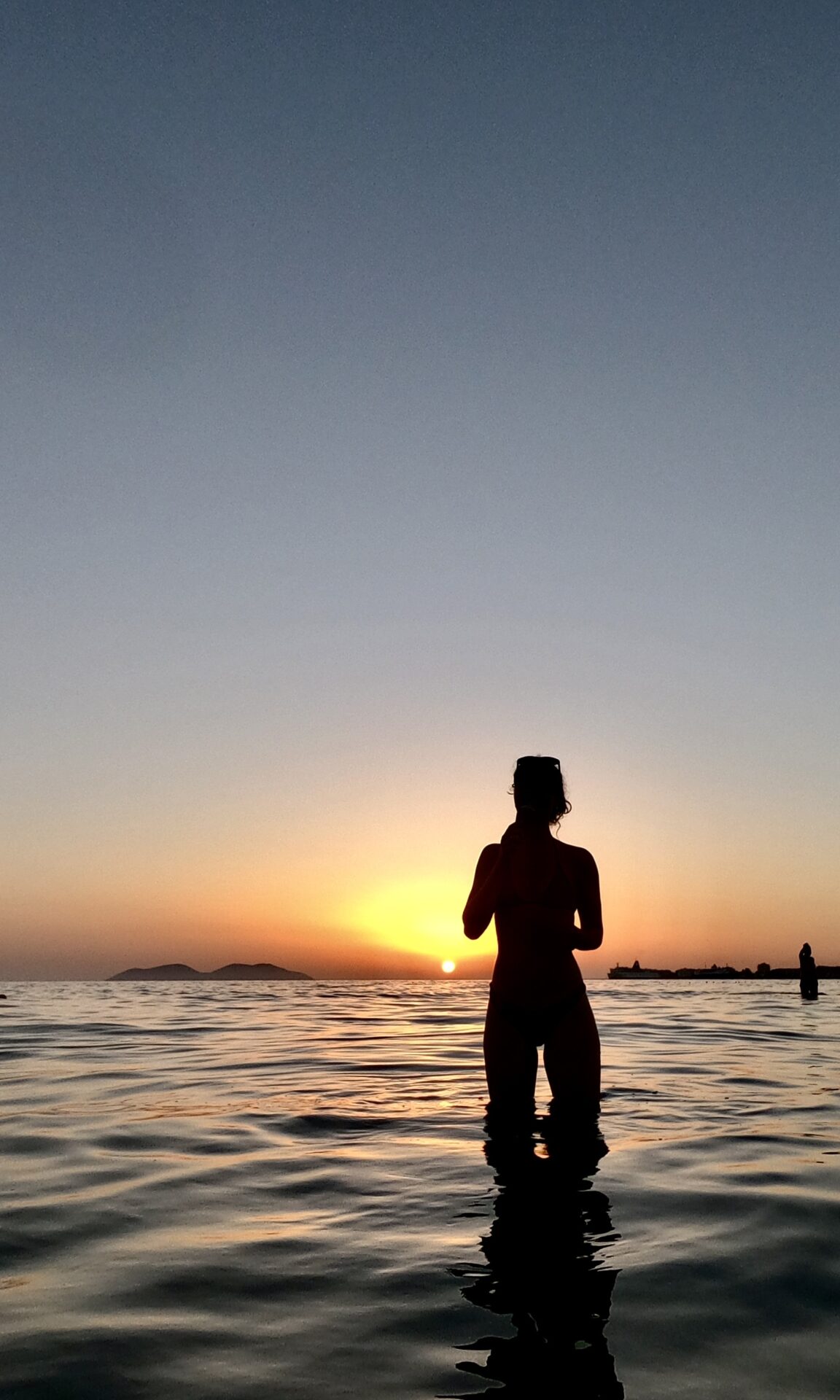
Albanians are so slow moving and chill; that’s the way of life in the Balkans. People don’t rush around here and people certainly don’t walk fast on the street. At first I thought this was just because the culture was so low-key and unbothered, but after spending some time here I’m actually realizing it’s because it’s just too hot to move quickly.
I’m a super fast walker and such a go-go-go person, however in Albania I found myself walking at such a leisurely pace and not following the schedule/itinerary I made for myself. The entire vibe of my trip in Albania was “eh, whatever.” And you’ll find this attitude everywhere .
Albania time also corresponds to tours and other excursion based activities. Your boat tour was supposed depart at 10am? Now it’s 10:45 and you still haven’t left? Albania time .
^side note – at first I found the Albania time thing kinda “sketchy” and had questions like “is this safe?” “am I getting scammed?” floating around in my head. 99/100 times the situation is not sketchy, it’s “just Albania” (as you’ll constantly hear the locals say).
Albania travel tip #6 is expect delays wherever you go and with whatever you do. Learn to roll with it and embrace the whole “chill vibes” thing!
7. Purchasing… Anything
One thing I found to be quite challenging in Albania was the lack of available… Everything.
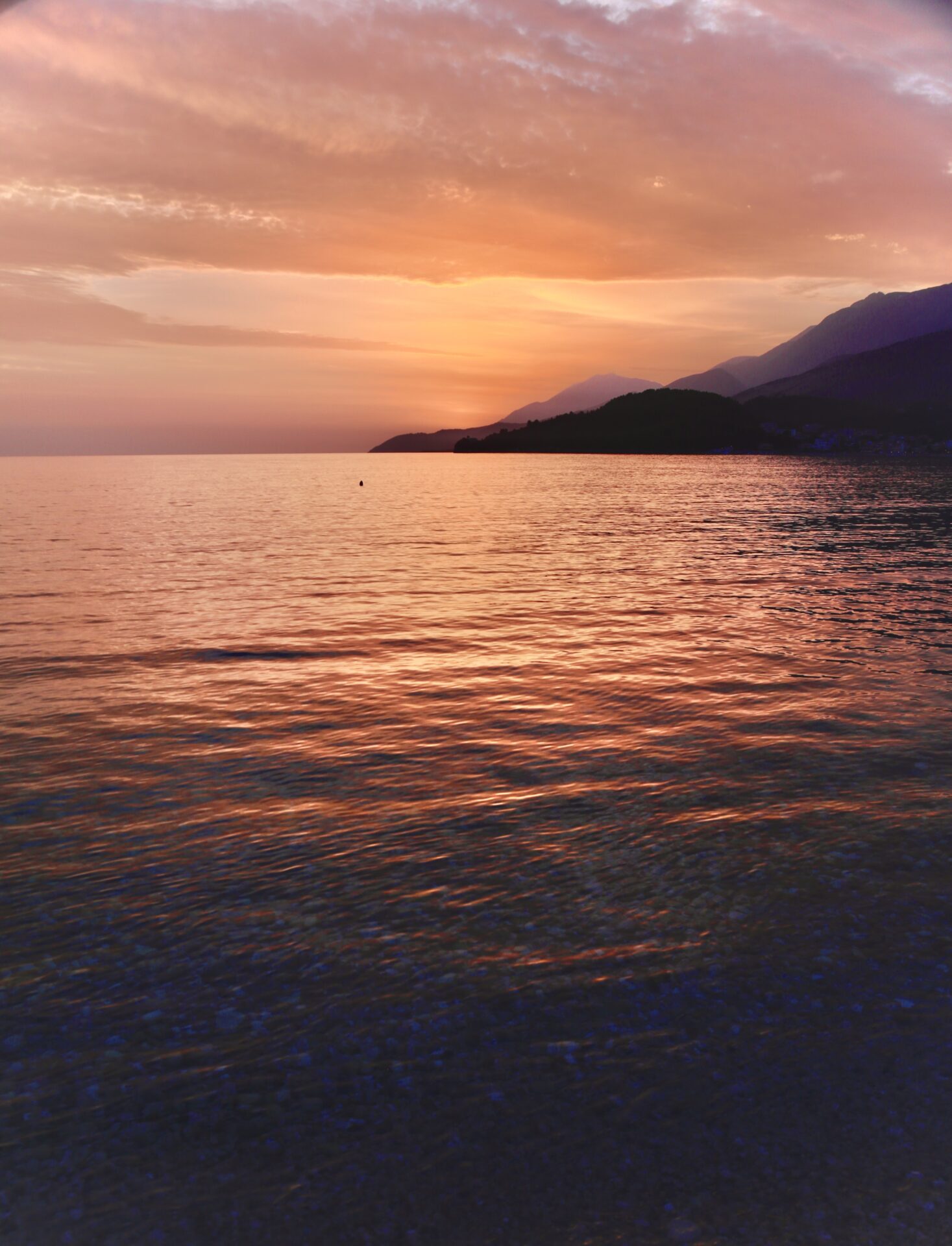
Come prepared with everything you need in Albania. There’s an ongoing joke here that goes something like:
Traveller: “Where can I buy a backpack?”
Albanian: “Bulgaria”
This is a joke, but it’s also not a joke. You can’t buy anything practical in Albania, for instance a backpack. Upon arriving I needed to buy a natural bar of soap, a water filter, a spork, and a bathing suit. I could ONLY get the bathing suit.
So, my 7th (and very important) Albanian travel tip is to bring everything you need to Albania . Don’t just expect to be able to buy things here because you will have to scramble and you will be disappointed.
8. “The Next Greece”
Okay pay close attention to this Albanian travel tip – TRAVEL ALBANIA SOONER THAN LATER!
Albania is quite literally the next Greece and is one of the last unexplored/undiscovered countries in Europe. The country is cheap to travel and it’s not as touristic as other destinations like Italy or France.
Albania is a hidden gem, but this status won’t last forever! Albania is growing in popularity every year and the country can quite literally “only go up from here” in terms of prices, infrastructure, and inflation.
There’s no better time than now, so Albania travel tip #8 is to pack your bags and book that flight to Albania!
9. Local Knowledge
Now I’m gonna add on to the whole “unexplored” and “undiscovered” thing. Since Albania isn’t one of those “top 10 travel destinations” everyone flocks to, you won’t find too many travel bloggers talking about this place. And that means you’ll find limited information about Albania on the web.
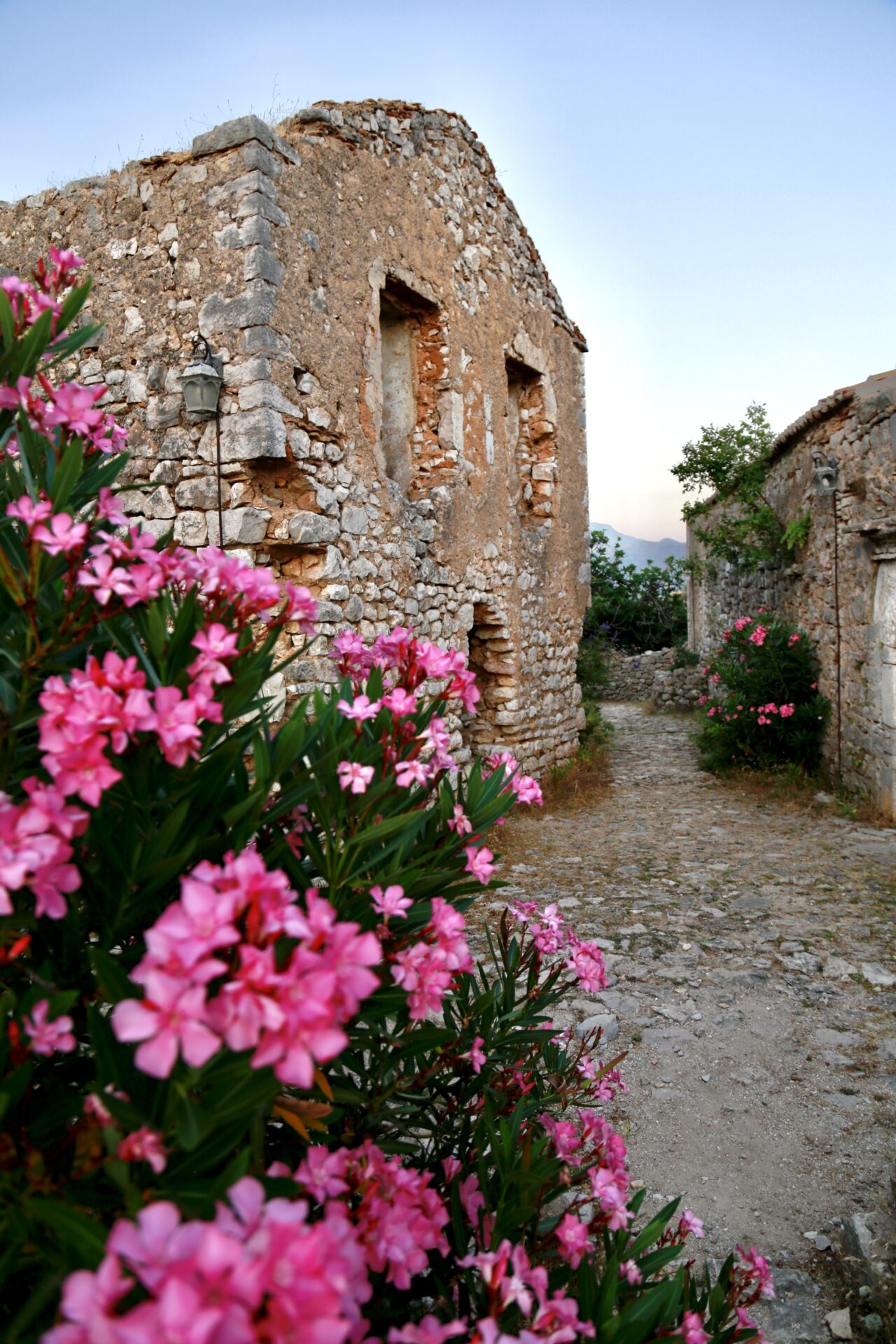
Throughout your google searches you’ll find a few helpful websites or articles, however said websites and articles will only have some information – you’ll still be left with lots of unanswered questions.
So, my next Albania travel tip is to utilize local knowledge.
Ask questions at your hotel or hostel. Talk to Albanian people on the street. Quiz your waiter or waitress. This will be a hard pill to swallow if you’re an independent traveller (like me), however in Albania you NEED to talk to people to get around.
Throughout my time in Albania I found hostel employees to be the most helpful and knowledgeable. In fact, a huge part of Albania’s tourism industry is based on this whole idea of local knowledge. You can’t just “go do stuff” in Albania like you can in other countries. You need their help and they need your business!
10. Culture Shock
I hate to say it because I really do love Albania, but this country isn’t great in a lot of ways. There’s trash everywhere, it’s loud, it’s busy, and the socialization is much different here than in my home country of Canada . I can 100% say that when I first arrived in Albania I experienced HUGE culture shock and had a moment of “oh no, what did I get myself into!?”
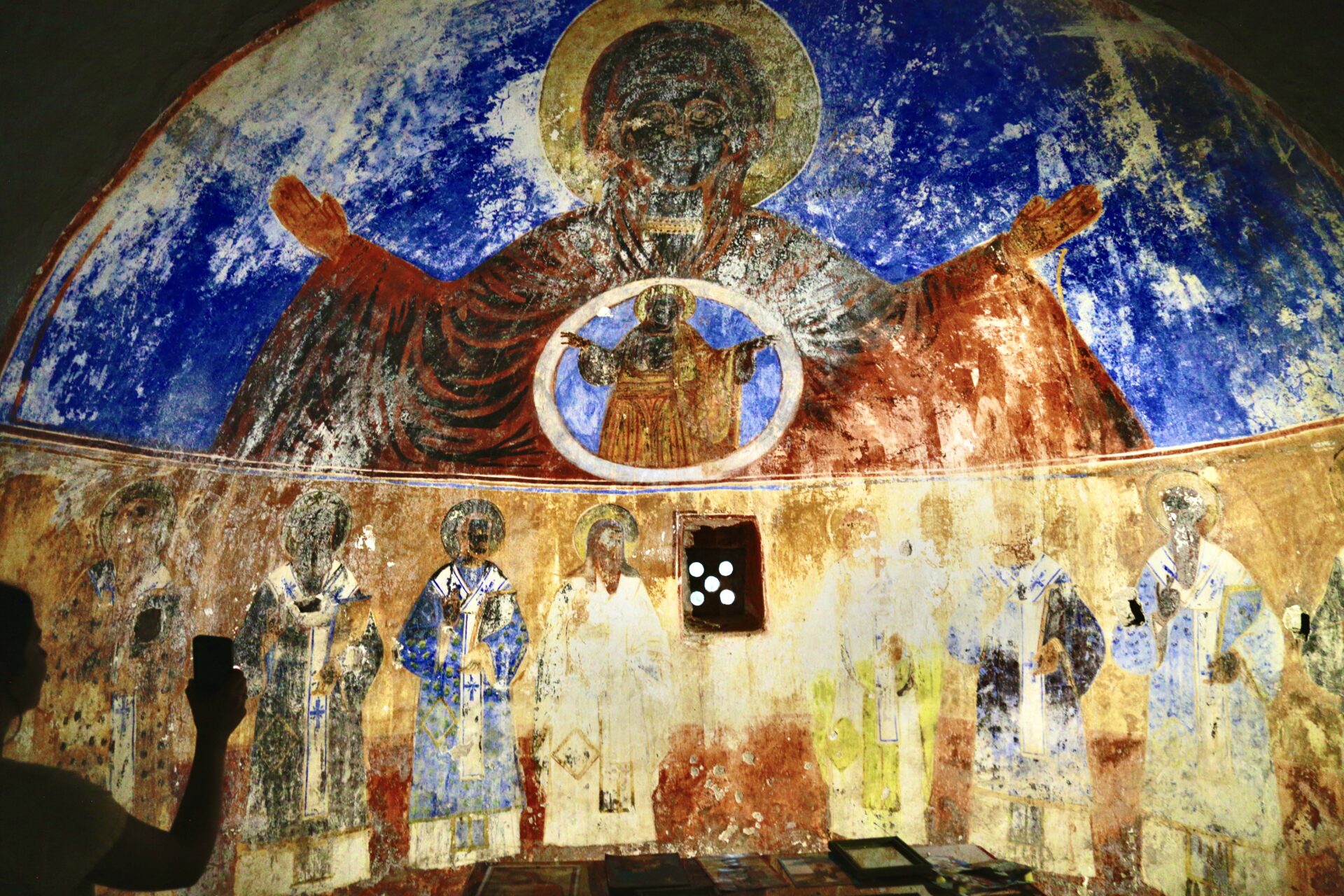
The driving here is absolutely insane (especially in Tirana). To put it into perspective, between the trash, the traffic, and the general “rundown vibe” you’ll feel like you’re in India.
You’ll (hopefully) quickly adjust to the culture though and escape to the more nature-y spots of the country like Himara or the beautiful national park of Theth. In these spots you’ll experience less of what I just talked about and have a more relaxing/less culture shock-y style trip.
At first travelling in Albania can be daunting, so Albania travel tip #10 is to embrace these cultural differences and know ahead of time what you’re getting into.
11. English Speakers
This is something I was not expecting, but the Albanian people actually speak pretty decent English! I’ve had very few instances of (seriously) struggling due to a language barrier.
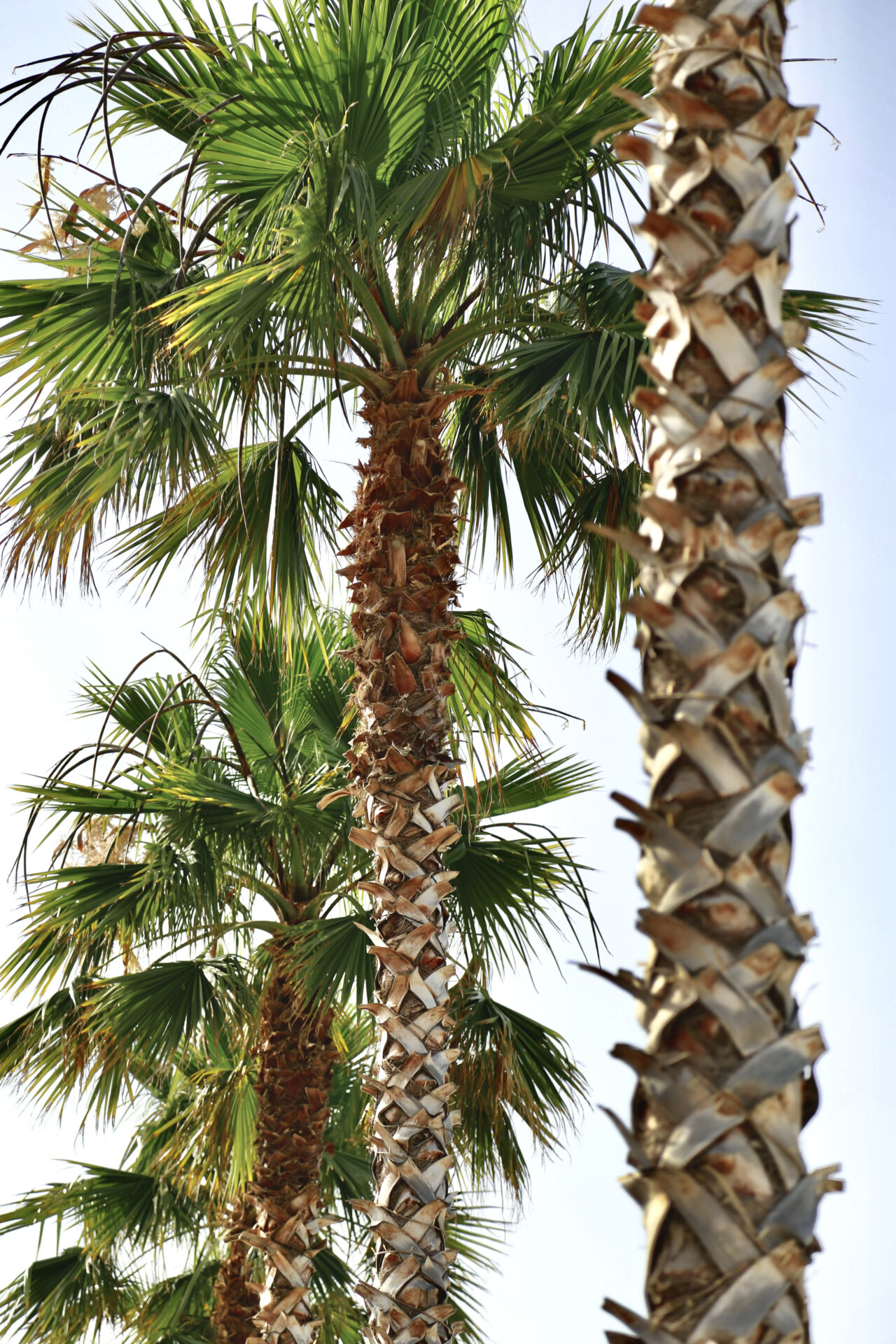
The older generation here speaks very little (if any) English, whereas the children here speak almost flawless English. The 20-something’s are pretty hit or miss with English, but speak enough to at least have an okay conversation.
English is now a school requirement in Albania, so in the coming years you can only expect English to become more and more commonplace.
Albania travel tip #11 – you can get by speaking English, however having the google translate app downloaded to your phone is not a bad idea!
12. Albanian Drivers
I keep touching on the whole crazy driving thing in Albania, but I haven’t explained it fully. So here we go.
I’m all about driving and road tripping. I’ve had car since forever and my greatest adventures have happened via road trip. However my 12th Albania travel tip for you is to NOT rent a car or road trip here – use tours and public transit to get around instead!
Of course having a car is ideal and if you’re more of a nature traveller you’ll be longing for a car. I recommend hiring a car or doing tours instead though. Hiring a car or embarking on tours is relatively cheap in Albania and if you’re brave you can negotiate a price with the driver.
Alternatively you can use websites like Viator – my favourite adventure booking site – to book tours that include your transportation. This way you meet people, there’s no planning involved, you don’t have to drive, AND you’re utilizing that whole local knowledge thing I talked about in Albania travel tip #9.
A few of my favourite tours in Albania are: The Blue Eye , rafting in the Vjosa River , horseback riding/4×4 to Lengarica Canyon & the thermal baths , Osumi Canyon rafting , and the Bovilla Lake Tour (just outside of Tirana).
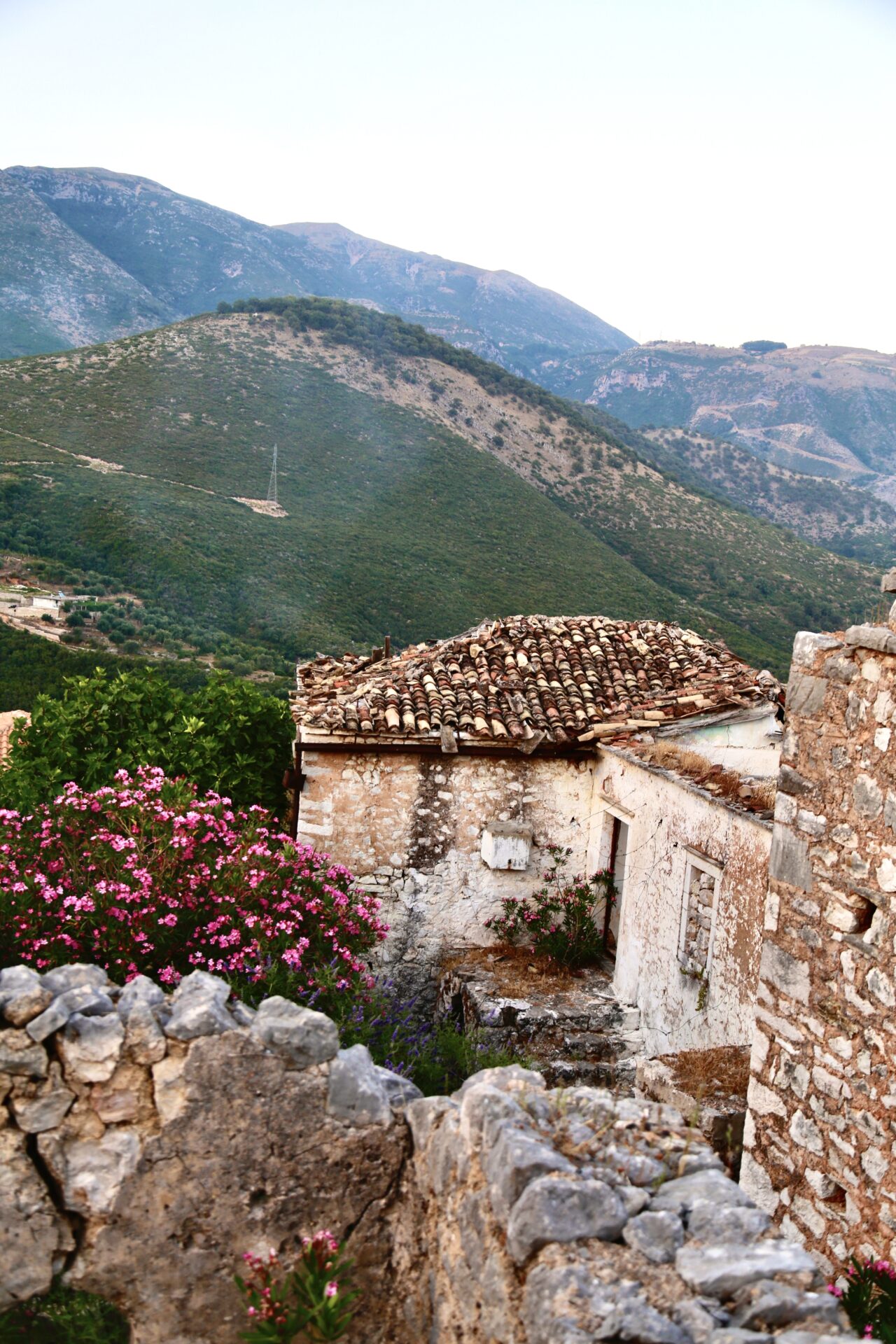
Here’s why I don’t recommend driving in Albania:
- People just walk out into the street whenever they want.
- Cars don’t signal OR LOOK when changing lanes.
- The speeds that people drive here… omg.
- People will just stop their cars and park wherever they want. Middle of the freeway? Sure. Stop and block and entire street? Why not.
- Everyone uses their phones while driving… Even the taxi drivers.
- The accident rate is phenomenally high here.
- Motorbikes cut in and out of traffic like it’s no one’s business. And the drivers don’t even wear helmets!
- The roads are literally terrible. So steep, rocky, and full of potholes.
I’m sure there are driving and road rules in Albania. But I’m also sure no one knows what they are (or at least they don’t care).
13. Weather & When to Visit Albania
The summer is so hot in Albania. Like SO H O T . If you struggle in the heat I’d recommend visiting during the shoulder season because summer is borderline unbearable.
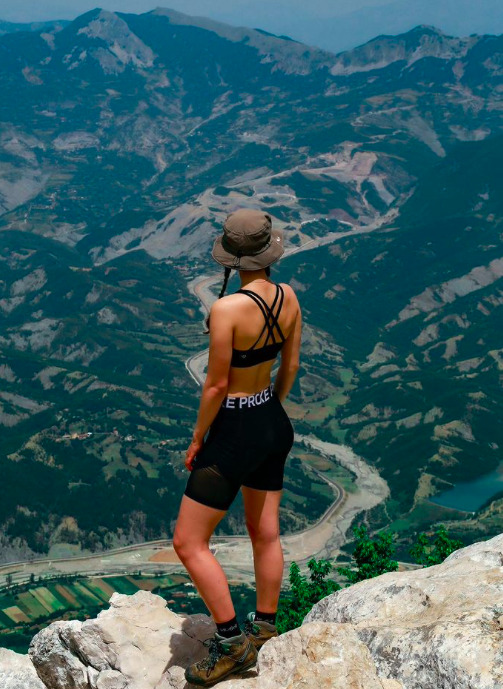
Summer is a great time of year to visit Albania if you’re into water sports or roasting yourself on the beach all day. However if you’re into hiking or outdoor adventure, you’ll quickly discover Albania’s searing summer temps are just too much to bear.
Albania travel tip #13 is to visit during early spring or fall if you’re searching for outdoor adventure or more moderate temperatures.
If you plan to visit Albania in the summer, make sure you are drinking plenty of water and eating lots of fruit to replenish your sugar levels. Like drink what you think is a lot, and then drink more.
14. Eco-Friendly (not)
Albania is the least eco-friendly country I’ve visited. I knew it wouldn’t be great here, but it’s unfortunately even worse than I expected.
My next Albania travel tip goes out to all the eco-conscious and natural-living folk out there. Be prepared, plan ahead, AND bring everything you need to be eco-friendly.
Albania is a beautiful country with so much potential, but it’s quite behind in a lot of ways and conscious living is one of them. Unfortunately plastic is king here, there’s no recycling, you need to buy water in plastic bottles because of heavy metals from the tap, there’s trash on the ground everywhere, and nothing is natural .
We all have our own ways of being eco-friendly, but a few items I’ve found absolutely invaluable in Albania are my shampoo & conditioner bars , Stasher bags (find on Stasher or Amazon ), toothpaste tablets , and coconut oil.
A couple things I wish I would have brought are more homemade sunscreen, a water filter (more on that next), and an extra bar of natural soap because you won’t be able to find the things in Albania.
Remember, planning is key!
15. Spontaneous Planning
Luckily, Albania is a country in which you don’t need to plan in advance. Everything here is accessible, accommodation is cheap, and because it’s less touristy you’ll find availability everywhere – even last minute.
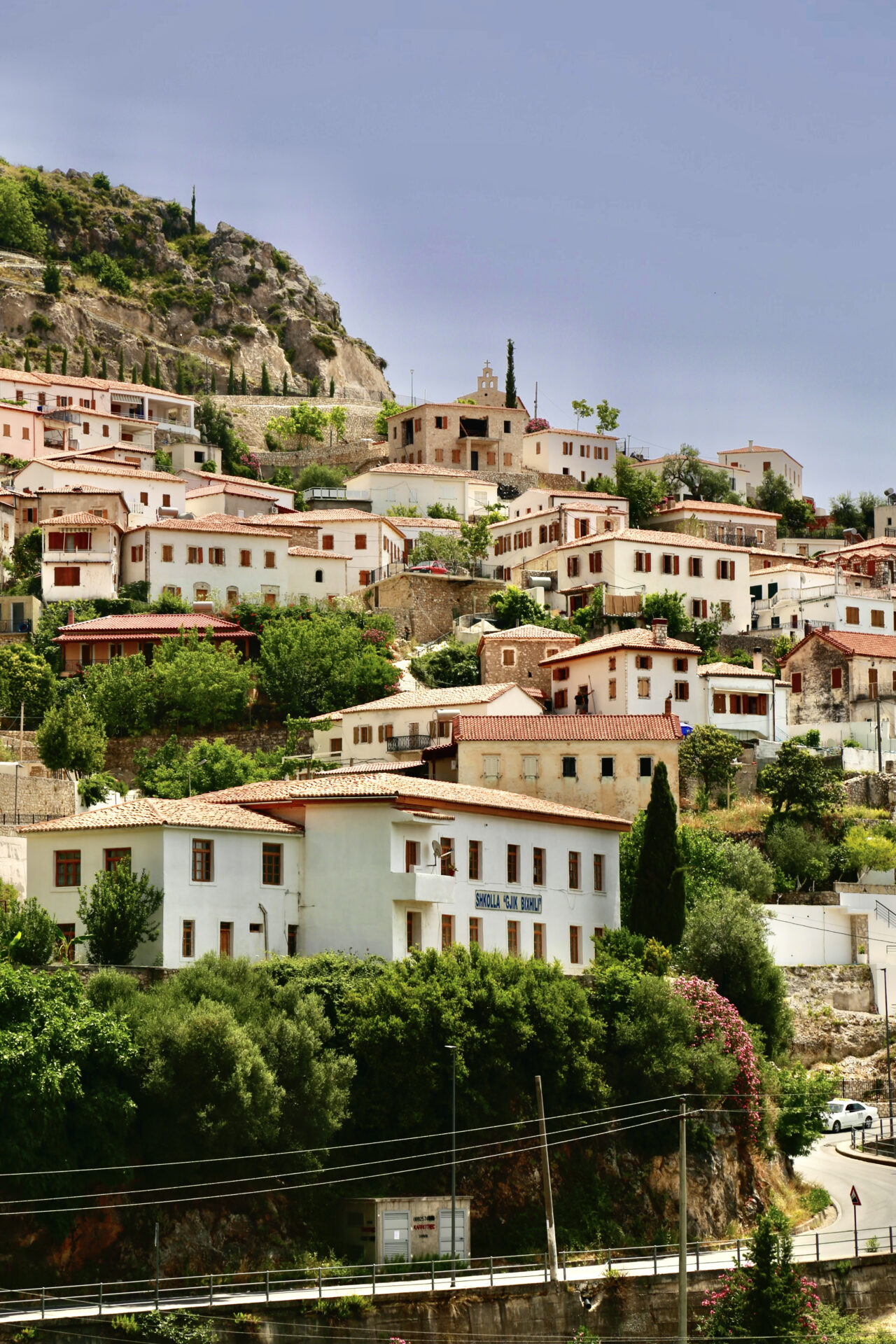
The combination of these things makes Albania the perfect place for spontaneous travel and it’s one of my favourite things about the country. There’s just no stress to it! This was especially nice to experience after travelling in Norway which is a destination where everything needs to be planned in advance.
This whole spontaneous, cheap travel thing won’t last forever though. Remember Albania travel tip #8? Albania is the next Greece and in the coming years it will grow in both popularity and price.
16. Drinking Water in Albania
One of the biggest Albania-based questions people have when visiting is “can I drink the tap water in Albania?” The answer is tricky – yes and no.
In the capital city (Tirana) you can absolutely not drink the tap water. It’s full of heavy metals and it’s super unsafe to drink. Unfortunately you’ll need to buy bottled water. From an environmental standpoint I recommend bringing a reusable water bottle or a 2L Hydrapak and refiling them with the 5L jugs from the store when you’re on-the-go.
Albania travel tip #16 – drink bottled water & do what the locals do (even if it involves plastic) .
Better yet, bring a water filter to Albania that rids heavy metals. Not all water filters are made equally and you therefore can’t use popular brands like Lifestraw in Albania. I’m doing some research on what filters can and can’t be used in Albania and I’ll update this post when I find answers! If you have suggestions though, leave them in the comment section at the end of this post 🙂
The yes part to this question – in Valbona and Theth national park the water is SO clean you can drink it right from the source (although I do always recommend bringing aquatabs ). If you’re lucky you’ll also come across some hostels or accommodations that have a reverse osmosis filter. I stayed at numerous hostels like the Himara Hostel and Hasta la Vista in Saranda which thankfully had them.
17. Dress Code in Albania
This can’t be a complete list of Albania travel tips without touching on what to wear. To break it down, bring only flowy clothes. The heat and the sun and the absurd amount of sweat that will inevitably come out of your body makes wearing tight clothes a nightmare.
Albania travel tip #17 – bring light, flowy clothes, leave the heavy materials & tight stuff at home!
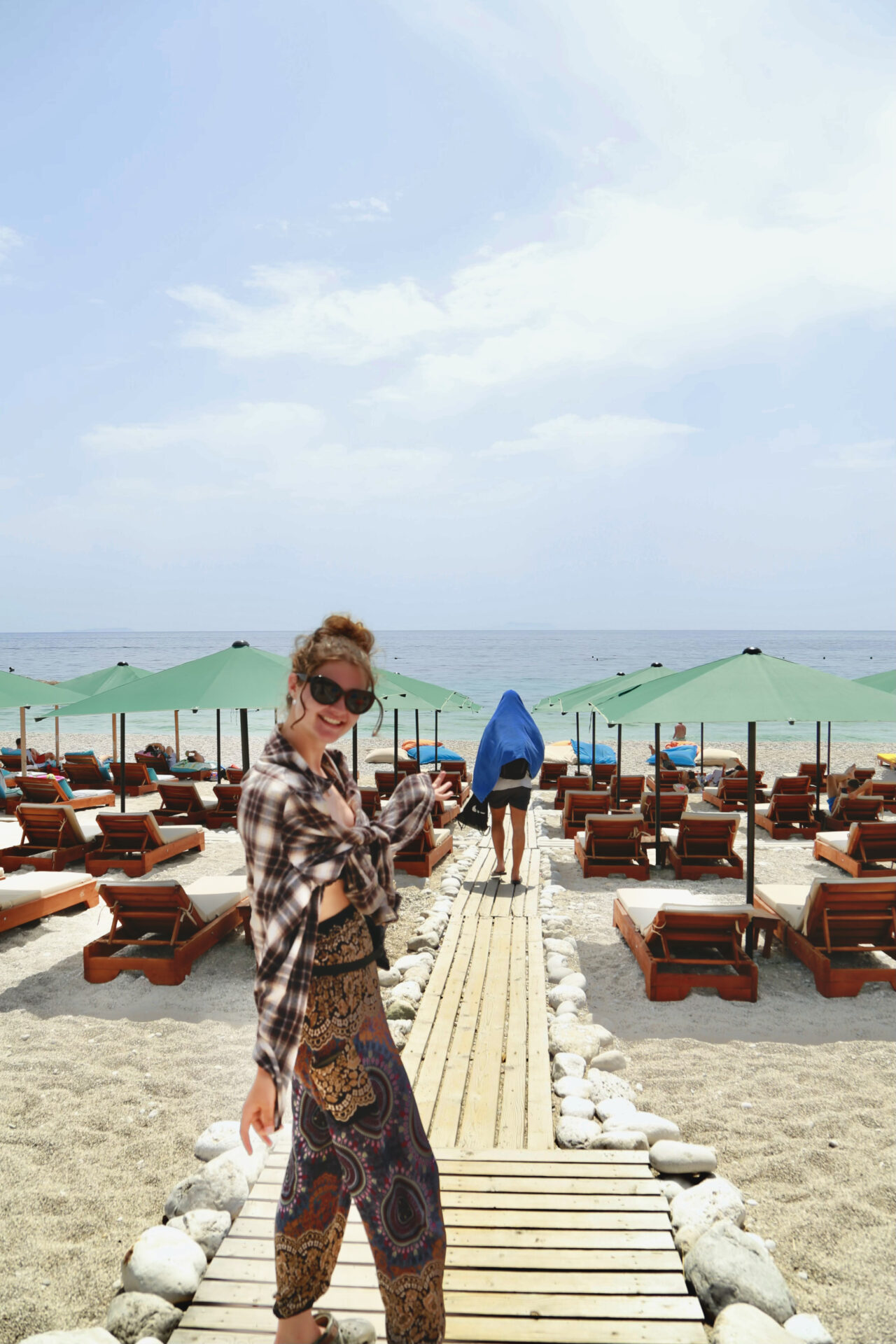
I’d recommend packing the following clothing for Albania:
- One athletic outfit.
- CROCS – the ultimate adventure/beach shoe. Or TEVA’s if you want something a little more dressy.
- A couple pairs of light/flowy pants (sun protection/avoiding the whole thighs sticking to chair thing).
- 1 lightweight long sleeve (also for sun protection – one that can preferably be worn in water).
- A BUNCH of flowy shorts and tank tops.
- A lightweight cardigan/shall for more sun protection.
- A hat that throws a decent amount of shade.
Here’s an extra tip – pack light and leave all the extras at home! You don’t want to carry around heavy bags in the sweltering Albanian heat.
Not necessarily an Albanian travel tip, but something I think is interesting and super cute.
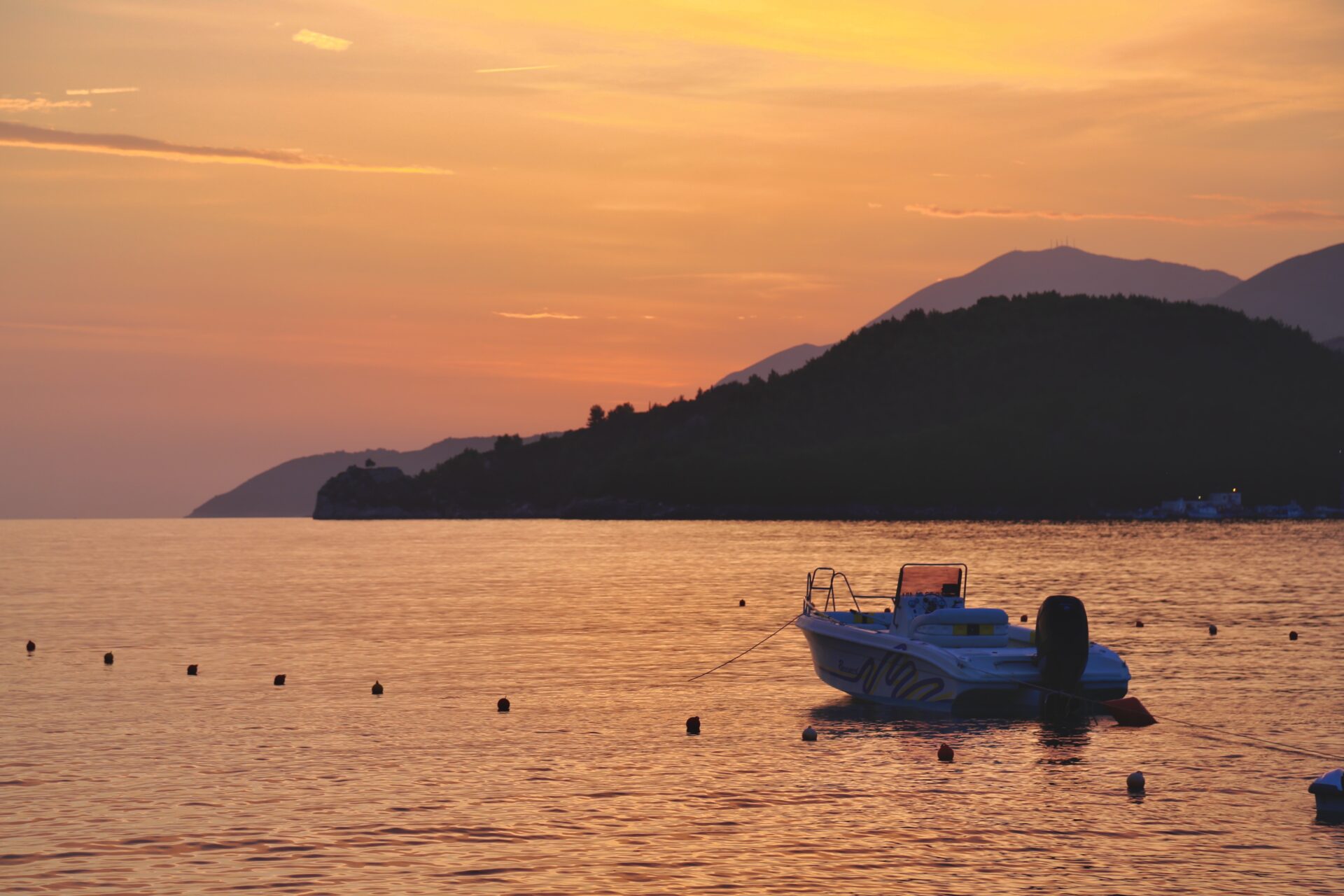
Unless you’re at the beach you won’t find anyone outside during the hot Albanian summer days. Everyone hides inside, blasts the air con, or literally sits in front of a rotating fan until the sun goes down. THEN, sunset xhiro begins.
Xhiro translates to “walk” in English and this walk is a beloved Albanian pastime. In the cooler (and by cooler I still mean 80-90 degrees F) hours of the evening you will suddenly find all of Albania emerging from their homes and strolling around the city/beach.
You’ll have also noticed all the strangely empty patios and outdoor seating areas during the daytime hours – during Xhiro all these locations are PACKED and Albania becomes the most social place I’ve ever seen.
If you want to take part in a true Albanian pastime, set out for a sunset stroll or “xhiro.”
Downloadable Map of Albania

I’ve created a map of Albania equipped with 200+ pinned locations including:
- Hiking trails, national parks, caves, waterfalls & beaches
- Historical, cultural & religious sites
- Lodging options, restaurant recommendations & transit hubs
- Main points of interest, big cities, beach towns and mountain villages
Each pin has photos, a description, direct booking links, and external itineraries (when applicable).
The map is downloadable to Google Maps on your phone and was designed to be a digital tour guide when you’re on-the-go.
This map has all of Albania’s best and will save you loads of pre-travel research time.
Happy adventuring!
Like this post.
Share with friends or save it for later!
- 14 Share on Facebook
- 4 Share on Twitter
- 44 Share on Pinterest
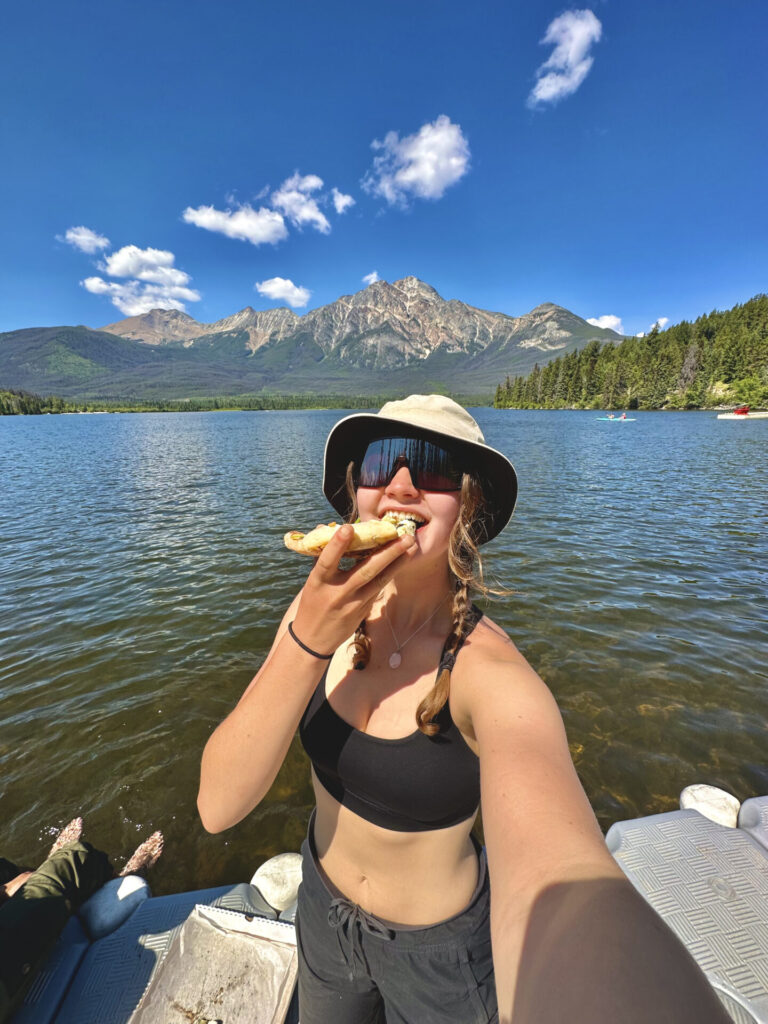
About The Author
HI, I’m Taylor – the voice behind The Holistic Backpacker.
After moving to Banff National Park in 2020 I became an outdoor adventure enthusiast and vowed to never stop exploring.
I now spend my days travelling the world, climbing mountains, and spending nights under the stars in the Canadian Rockies backcountry.
I created The Holistic Backpacker so I could share my adventures and help connect people like you with the same amazing experiences.
GET TO KNOW ME | WORK WITH ME

You May Also Like
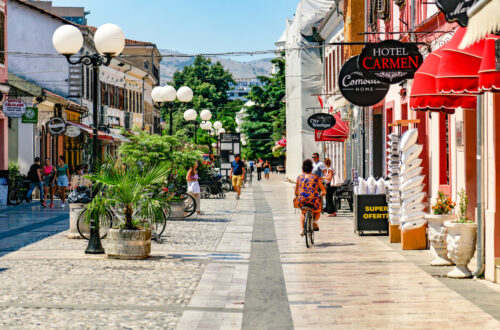
10 Things to do in Shkoder + 6 Day Shkoder/Alps Itinerary
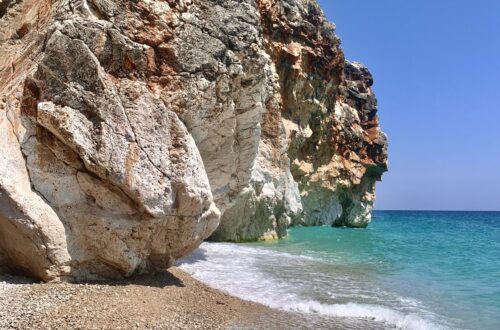
Himara to Gjipe: Kayak the Albanian Riviera
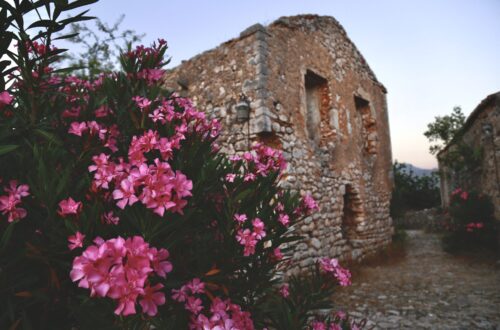
How to Spend 3 Perfect Days in Himara, Albania

- Hiking trails, national parks, beaches, caves, & waterfalls
- Historical, cultural, & religious sites
- Lodging options, restaurant recommendations, & transit hubs
- Main points of interest, big cities, beach towns, & mountain villages
This map acts as a digital tour guide & was designed with the intention of saving you pre-travel research time!

Albania Travel Guide
Last Updated: August 18, 2024
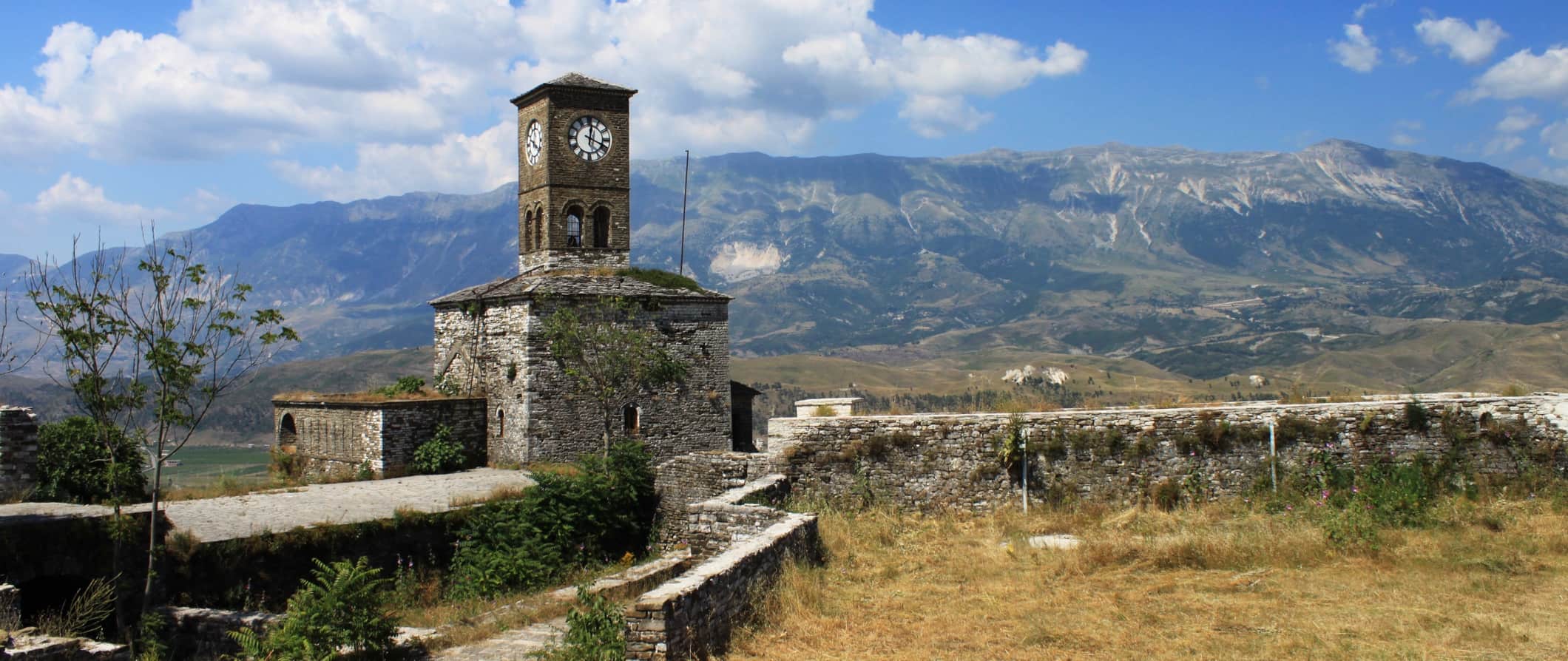
Albania is one of Europe’s best-kept secrets. Though it increases in popularity each year, the country is largely ignored by tourists; many still think of it as a post-communist backwater (as if the world hasn’t changed in the last 30 years).
Yet this is a land of untouched natural beauty, with a rich history dating back to the ancient Illyrians and Greeks. It has become a solid favorite of backpackers looking for an affordable, off-the-beaten-path destination to explore.
I absolutely loved my time visiting Albania. It’s a country full of good food and welcoming people. I enjoyed it so much that I extended my stay.
Hikers and nature lovers can partake of all the hiking and trekking here, beach lovers have the Albanian Riviera along the Ionian coast, and history buffs can marvel at the country’s uncrowded UNESCO sites in Butrint (an ancient Roman city), Berat, and Gjirokastër.
Albania is on the up and up, with more tourists visiting each year. I think it will become as popular (and expensive) as Croatia in the next couple of years, so visit now before the crowds come!
This travel guide to Albania can help you plan your trip, save money, and make the most of your time in this underrated destination!
Table of Contents
- Things to See and Do
- How to Stay Safe
- Where to Stay
- Typical Costs
- Suggested Budget
- Money-Saving Tips
- How to Get Around
- Best Places to Book Your Trip
- Related Blogs on Albania
Click Here for City Guides
Top 5 things to see and do in albania.
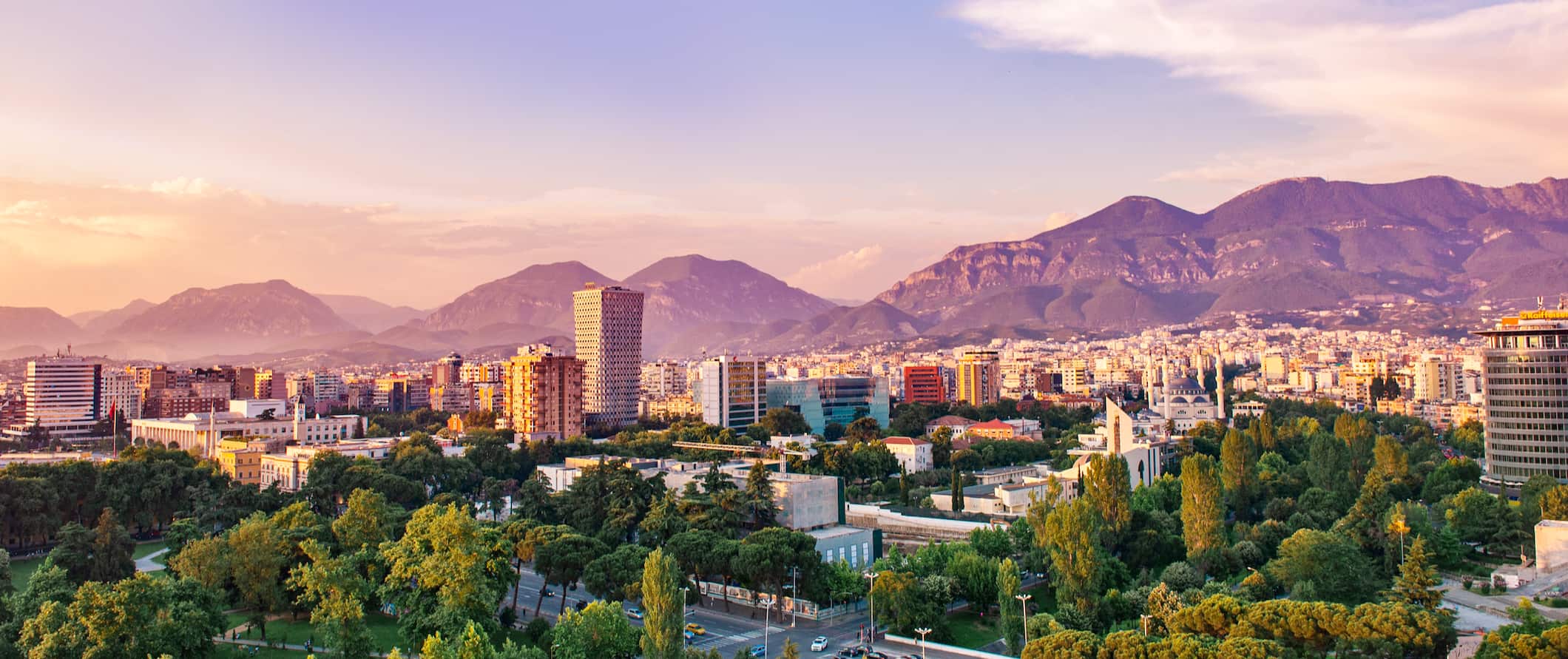
1. Explore Tirana
Albania’s capital is rapidly transforming into a vibrant, cosmopolitan city, with its bustling cafes, eclectic museums, and trendy shops and galleries. Sip coffee at one of many espresso bars, dive into the developing digital nomad scene, soak up history in Skanderbeg Square, and enjoy the city’s booming nightlife. For a hefty dose of local culture, check out Bunk’Art, a former bunker built during the Cold War that’s since been turned into an interactive art space. If you’re in town for more than a couple of days, take the Dajti Ekspres to the top of the nearby mountain, check out the cave of Pellumbas, or go and explore the Roman and Byzantine ruins in nearby Durrës.
2. Visit the historic town of Berat
A city that’s been around for 2,400 years, Berat is a UNESCO World Heritage Site and one of the highlights of visiting Albania . It’s also known as “the City of a Thousand Windows” because of its unique white-walled Ottoman homes, picturesquely stacked atop one another on a crumbling hillside and characterized by their many windows. Visitors should make it a point to wander around Kala, an ancient neighborhood with panoramic views, historic mosques and churches, and a 14th-century castle. There are also a number of noteworthy museums in Berat, including the Ethnographic Museum, which is housed in an ornate 18th-century Ottoman home.
3. Drive the Llogara Pass
The Llogara Pass is a steep (at times the incline is 11%), winding road that rises over a thousand meters (3,500 feet) into the mountains and overlooks the glittering Ionian coast, which has been nicknamed the Albanian Riviera. This road goes from Orikum to Dhërmi, and there are lots of scenic stops along the way. If you need to stretch your legs, the trails at Llogara Pass National Park are a fantastic place to do so. Post-hike, grab lunch at one of the many roadside restaurants in the park. Though it used to be a dangerous and narrow road, the Llogara Pass was repaved in 2009. It’s still a tricky route, but it’s worth it — this is the most scenic drive in the country (and one of the most scenic drives in all of Europe).
4. Hike from Valbona to Theth
T of the most famous day hikes in Albania, this is an old mule trail that leads you across the Accursed Mountains. This section is moderately challenging and takes around eight hours in total. There are fresh water springs along the way, as well as some cafes on the route, but make sure you bring plenty of water just in case. It’s a stunning area with an abundance of flora, fauna, and wildlife to see. In Theth, there are some other hikes as well. Most notably, the Blue Eye of Theth is a shockingly blue pool of water fed by a small waterfall that can be reached in about three hours (one way) from Theth.
5. Wander around Gjirokastër
Also protected by UNESCO, Gjirokastër is famous for its stonework. Wander the cobblestone streets, hike and explore the castle, swim in nearby waterfalls, and visit the best examples of Ottoman-era architecture in the area. There’s a C old W ar museum here that’s housed in an old 800-meter-long (2,624-foot) bunker from the 1970’s. Close to the nearby village of Muzinë is the incredible natural spring called the Blue Eye. Gjirokastër, for me, is one of the best spots in the country.
Other Things to See and Do in Albania
1. relax on the albanian riviera.
Pristine beaches, turquoise water, cheap and delicious seafood — the Albanian coast has all the beauty and wonders of Croatia, without the high prices and crowds (for now). Dhërmi and Ksamil are considered to have the best beaches in the country, with miles of white, sandy beachfront. If you want a busier beach destination, go to Himarë, where the beach has a promenade lined with cafés and bars. For something more off the beaten path, make your way to Gjipe Beach. For a bustling, developed beach town, visit Sarandë, which is packed with hotels, restaurants, and nightlife.
2. Enjoy the view from Rozafa Castle
Situated near Shkodër in northwestern Albania, the 4th-century Rozafa Castle has panoramic views of the area, including the Buna and Drin Rivers. The fortifications here originally date to the 10th century BCE, when the Illyrians lived in the area (the current castle replaced those fortifications). Legend has it that a young woman sacrificed her life to imbue the castle walls with longevity. There isn’t a whole lot to see here, but the ruins are impressive, and it’s a good spot from which to watch the sunset. The Shkodër History Museum provides a great overview of the castle’s past, including the background of the medieval families who lived here. Admission is 150 ALL.
3. Visit the National Museum of History
The National Museum of History in Tirana offers a view of the country’s rich history and is divided into eight sections: antiquity, the Middle Ages, the Renaissance, independence, iconography, the National Liberation Anti-Fascism War, the Communist Terror, and Mother Teresa (who was born in Albania). There’s a remarkable collection of ancient Greek and Roman mosaics, columns, and statues unearthed in Albania as well. The collection is extensive, so give yourself around three hours here. Handily, nearly the entire collection is signed in English. Admission is 500 ALL.
4. Explore the ancient ruins of Butrint
Greeks from nearby Corfu settled Butrint in the 6th century BCE. It quickly became a large trading city that was still prosperous when the Romans took over in 167 BCE. Nowadays, you can wander the pathways between what’s left of the city, including well-preserved arches and colonnades. In 2003, Butrint was awarded UNESCO World Heritage status. It makes for an ideal day trip from Sarandë. I took my time there and spent about three hours exploring the ruins. The entrance fee is 700 ALL and the 45-minute bus ride costs 100 ALL.
5. Admire the art at Bunk’Art
Bunk’Art 1 and 2 are former bunkers that have been turned into museums and galleries underneath Tirana. Built in the 1970s for Albania’s elite, the bunkers’ 100 rooms have now been transformed into a museum and art space. Bunk’Art 1, located on the outskirts of Tirana, focuses on Albania’s communist past and the lives of average people under communism. Bunk’Art 2, the more recent addition, is located right in Tirana; it focuses more on the secret police that were used by the regime to terrorize the population and maintain order. Admission is 500 ALL.
6. See the ancient ruins at Apollonia
Like Butrint, Apollonia was one of the most important cities in the ancient world. The Greeks founded it in 588 BCE, and it fast grew into a city-state with a huge slave trade (just like Butrint). The Romans took over in 229 BCE, when it became a cultural center with an important philosophy school. Even Julius Caesar sent his nephew (Octavius, who became Emperor Augustus) to study there. Today you can visit the ruins (a UNESCO Heritage Site), which include a theater and the restored façade of the administrative center. Admission is 300 ALL.
7. Visit Shkodër
As the largest town in the north (and home to the Rozafa Castle), it plays host to many of the country’s biggest festivals like Carnival, Lake Day, and the Shkodra Jazz Festival. The city’s Old Town is filled with picturesque, pastel-colored homes and buildings. A lot of people breeze through Shkodër on their way to Montenegro from Tirana, but I recommend spending a day or two here. Check out one of the interesting museums here, like the Marubi National Photography Museum and the Site of Witness & Memory Museum. The former is an Albanian photographic museum; the latter commemorates the victims of the communist regime in the city. e to get to Valbonë. If you don’t want to do that, there are day trips available. You can spend a couple of hours on the lake before going up the Shala River, where you can eat lunch, rent a kayak, or chill on the “beach” (the rocky embankment). The mountain water of the Shala is super clear and clean; it looks almost tropical. The restaurants here also rent rooms (or let you camp for free) if you want to stay the night.
9. Go hiking
Albania has lots of incredibly scenic hikes. If you spend most of your time in the south, you’ll get your pick of coastal hikes along the Ionian Sea, including Mount Çika and through the Ceraunian Mountains. In the north, the hike over the Valbona Pass to the village of Theth is popular for a reason; it’s an incredibly beautiful route (and not for the faint of heart). Routes around the country vary in length and difficulty and trekking information isn’t readily available — large parts of these hikes are still undeveloped, so hire a guide if you want to explore. Outdoor Albania has lots of options to help you get started.
10. Take a wine tour
Albania has one of the oldest winemaking traditions in all of Europe. Albanian wine makes use of incredibly rare grapes, and some of the traditional practices date back to the Bronze Age. Many wineries are family-owned and located in breathtaking settings. You can take wine tours from Berat, Lezhë, and Tirana, on which you can sample some of the country’s finest. Expect to pay at least 6,500 ALL for a day trip.
11. Get spooked at Sazan
The “ghost” island of Sazan is a 30-minute boat ride from the southern port town of Vlorë. It served as a Soviet military base and chemical weapons facility for many years before being abandoned. In 2017, the government opened it for tourism, although officially it remains a military base. The rooms in this vast network of nuclear bunkers and tunnels are still stocked with beds and kitchen supplies, and you can still find abandoned gas masks in the valley nearby. Tours don’t run all the time, so you need to ask in the tourist information office in Vlorë. They can book you onto a tour if they are running. Expect to pay 3,500 ALL or more for a day tour to the island.
12. Hike Osumi Canyon
This gorgeous river canyon in southern Albania makes for the perfect day trip from Berat. It is over three million years old, stretches for 40 kilometers (25 miles), and towers 40 meters (131 feet) above the river. The most popular way to see it up close is with a rafting tour. Tours are available February-June and start at 7,000 ALL per person, which includes transportation from Berat, lunch, and 2-4 hours on the water. You can also opt to hike down through the canyon and explore the ancient rock formations and caves via a 12-kilometer trail.
13. Visit the House of Leaves
The Museum of Secret Surveillance, aka the House of Leaves, is an award-winning museum in Tirana located in the old Sigurimi building (the Sigurimi were the secret police). The building was originally used by the Gestapo during the German occupation, continuing as a base of operations for the secret police until 1991. The exhibitions highlight what life was like under German and then communist rule, shedding light on the methods used to spy on, prosecute, and execute enemies of the regime. It’s sobering but incredibly insightful. Anyone even remotely interested in the dark side of Albania’s past will find this museum fascinating. Admission is 700 ALL.
How to Stay Safe in Albania
Albania is generally a safe country to visit. Violent crime is rare but petty crime can be an issue so don’t flaunt your possessions and always make sure your valuables are out of reach while on crowded buses.
Solo female travelers should generally feel safe here, however, the standard precautions apply (never leave your drink unattended at the bar, never walk home alone intoxicated, etc.).
If you’re using public transportation in Tirana, pickpocketing can be a concern, as in most other urban areas around the world. Never set down valuable items; keep them tucked away out of sight.
Locals are really proud of their country, and Albanian culture has a long tradition of guest hospitality. Moreover, Albania is a “nighttime” country (i.e., people stay out late), so there are always eyes and ears out, keeping would-be criminals in check. (Many of the women I met there told me they feel very safe walking around at night for that reason.)
The main danger in Albania is reckless driving. Albania has some of the highest road fatality rates per capita in all of Europe, so be sure to pay extra attention when driving or while walking near busy roads.
Near the border with Kosovo, landmines can still be found. Avoid hiking off the marked trails there, and keep an eye out for signs and warnings.
Scams aren’t super common, but they do occur. You can read about common travel scams to avoid here .
If you experience an emergency, dial 112 for assistance.
The most important piece of advice I can offer is to purchase good travel insurance. This protects you against illness, injury, theft, and cancellations . It’s comprehensive protection in case anything goes wrong. I never go on a trip without it, as I’ve had to use it many times in the past. You can use the widget below to find the policy right for you:
Where to Stay in Albania
You won’t find many hostels outside of the main tourist cities, but private guest houses are pretty cheap in the countryside anyway. Here are some of my favorite places to stay in Albania:
- Saranda Backpackers (Sarandë)
- Trip’n’Hostel (Tirana)
- Friends Hostel (Gjirokastër)
- Himara Relax Hostel (Himarë)
- The Wanderer’s Hostel (Shokder)
Albania Travel Costs
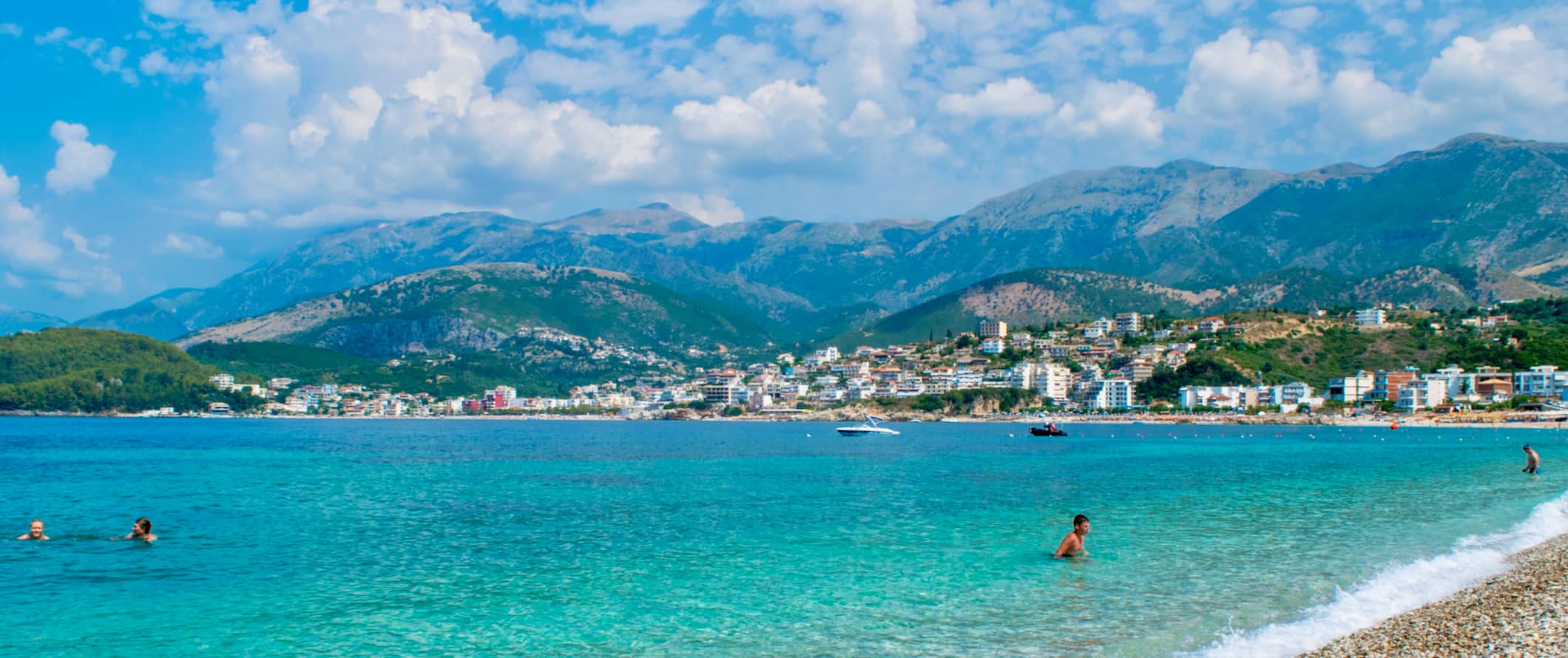
Accommodation
- Hostel Dorms – 950-1,340 ALL per night
- Hostel private rooms – 2,450-5,000 ALL per night
- Budget hotels – 2,500-3,500 ALL per night
- Airbnb private rooms – 1,800-3,600 ALL per night
- Airbnb apartments – 5,800 ALL per night
- Campsite – 1,200 ALL per night
- Sit-down restaurants – 500-2,000 ALL
- Casual take-out places – 550-900 ALL
- Fast food (think McDonald’s) – 600 ALL
- Beer – 150 ALL
- Glass of wine – 150-250 ALL
- Cappuccino/latte- 140 ALL
- Bottled water – 70 ALL
- Groceries for a week – 2,500-3,500 ALL
Albania Suggested Budgets
Backpacker – 4,400 all per day.
A backpacking budget covers a hostel dorm, cooking your meals, limiting your drinking, using public transportation to get around, and sticking to free and cheap activities like hiking and free tours. If you plan on drinking a lot add another 500-1,000 ALL to your daily budget.
Midrange – 9,000 ALL Per Day
On a mid-range budget, you can stay in a private hostel room or private Airbnb. You’ll be able to eat out for most meals, enjoy a few drinks at the bar, see more museums and palaces, do a day trip or two, and take the occasional taxi to get around.
Upscale – 15,000+ ALL Per Day
On a “luxury” budget, you can stay in a hotel, eat out for all your meals, see all the sites you want, do lots of day tours, and take taxis where you want. This is just the ground floor for luxury. The sky’s the limit!
Albania Travel Guide: Money-Saving Tips
Albania is an affordable country to visit. You’ll be hard-pressed to spend a lot of money, even if you’re staying in private rooms or hotels. You really have to go out of your way to spend money here. But, if you are looking to travel cheap, here are some tips on how to save money:
- Bring a water bottle – The tap water here usually isn’t safe to drink, so bring a reusable water bottle to save money and reduce your plastic use. LifeStraw is my go-to brand, as their bottles have built-in filters to ensure that your water is always clean and safe.
- Take a free walking tour – Tirana Free Tour offers a free walking tour that highlights the city and its sites. There are also free walking tours in Berat and Shokdër. Just be sure to tip your guide at the end!
- Cook your own meals – Many hostels here include kitchen facilities, so if you want to save money, cook your own meals. Groceries are cheap here and there are a lot of farmer’s markets around where you can pick up fresh produce.
- Stay with a local – Staying with a local via Couchsurfing is a great way to save money and connect with a knowledgeable local who can share their insider tips and advice.
- Bunk up in a hostel – Hostels in Albania are cheap, especially if you book a shared room.
- Walk everywhere – Most towns and cities in Albania are walkable, so skip the public transportation and taxis to save money.
- Enjoy the outdoors – There are plenty of free hiking trails and outdoor activities around the country that can fill your days.
- Take advantage of wild camping – As it is legal to camp anywhere in Albania, traveling with a tent, or in a camper van, is the perfect way to save money on accommodation.
How to Get Around in Albania
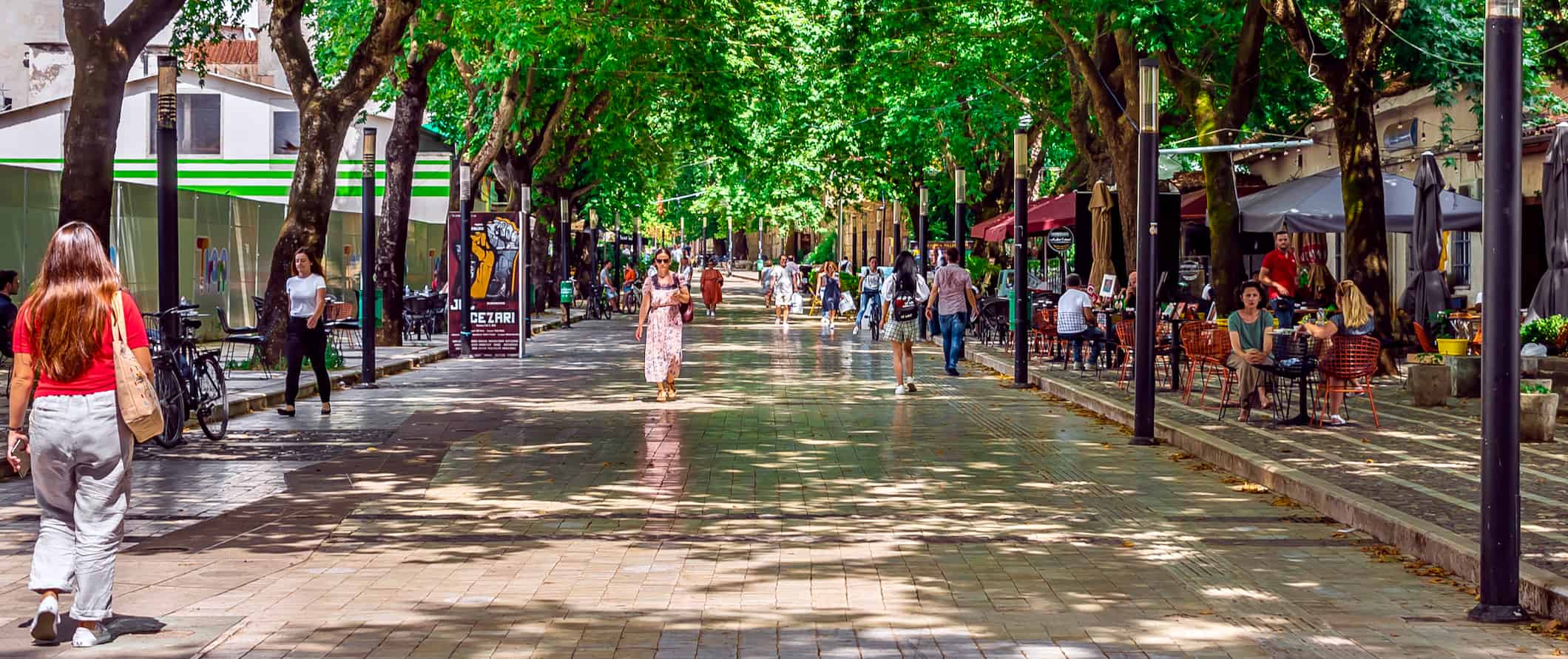
Public transportation – In most towns and cities, almost everywhere is accessible on foot. Otherwise, take the bus. The fares cost around 40 ALL per ride.
To get from the airport to Tirana, the cheapest way is via the airport shuttle. It runs from 6am until 6pm and drops you off near the National Museum of Tirana. It costs 400 ALL (one-way) and takes around 30 minutes. Alternatively, you can take a taxi for around 2,500 ALL.
Taxi – Taxis are readily available in all the major cities. Expect to pay 300 ALL to turn on the meter plus another 300 ALL for every kilometer. A lot of taxis will try to quote you a price instead of using the meter, which is almost always overly inflated. Make sure they put on the meter to avoid getting ripped off.
Train – Albania has a small rail network, but I never saw or heard of anyone taking it. The locals I talked to say it is too unreliable and slow. Buses are much faster, cheaper, and more reliable so use them instead.
Bus – Buses are the main form of inter-transportation in the country. They loosely follow a timetable. From major cities and starting points, they tend to leave on time but after that don’t count on it. But getting to your destination? Add an hour buffer just to be safe. The roads are always jammed and aren’t in great shape, so on-time arrivals are rare.
Buses cost from 300 ALL to over 1,000 ALL depending on how far you go. A bus from Sarandë to Tirana takes about 5 hours and costs about 1,700 ALL, while Berat to Tirana costs about 400 ALL and takes under three hours. The two-hour journey from Vlorë to Berat is around 400 ALL.
Pre-booking is never necessary. Just show up at the bus station and grab your ticket.
To find bus routes and prices, use BusBud .
Car Rental – Car rentals start at 1,500 ALL per day. The roads are in bad shape, so be sure to drive carefully. Drivers need an International Driving Permit (IDP) to rent a car here.For the best car rental prices, use Discover Cars .
Hitchhiking – Hitchhiking is generally safe in Albania. It’s very common, and there are lots of travelers doing it. It’s pretty easy to find a ride here. HitchWiki is the best website for more hitchhiking info.
When to Go to Albania
Albania has a Mediterranean climate, which means super-hot summers (July-August), with a daily temperature averaging over 32°C (90°F), mild winters on the coast, and cold winters in the mountains (November-February).
The best time to visit Albania is during the spring (May-June) or fall (September-October). During this time, the weather is mild, with average daily temperatures around 21°C (70°F), making it perfect for hiking and other outdoor activities.
Of course, if you want to enjoy Albania’s incredible coastline, the best time to come is during the summer. Albania is not yet a huge tourism draw in Europe, so it is rare to find sites and attractions overly crowded, and prices don’t inflate much during peak season. It’s sweltering at that time of year, however, so come prepared for hot weather!
Those who want to get the most bang for their buck should plan to travel during the off season, from November to March. Prices are at their cheapest — though it must be said that the weather can get very cold. If you’re visiting the coastal areas, don’t expect to be able to swim.
Albania Travel Guide: The Best Booking Resources
These are my favorite companies to use when I travel. They consistently have the best deals, offer world-class customer service and great value, and overall, are better than their competitors. They are the companies I use the most and are always the starting point in my search for travel deals.
- Skyscanner – Skyscanner is my favorite flight search engine. They search small websites and budget airlines that larger search sites tend to miss. They are hands down the number one place to start.
- Hostelworld – This is the best hostel accommodation site out there with the largest inventory, best search interface, and widest availability.
- Booking.com – The best all around booking site that constantly provides the cheapest and lowest rates. They have the widest selection of budget accommodation. In all my tests, they’ve always had the cheapest rates out of all the booking websites.
- HostelPass – This new card gives you up to 20% off hostels throughout Europe. It’s a great way to save money. They’re constantly adding new hostels too. I’ve always wanted something like this and glad it finallt exists.
- Get Your Guide – Get Your Guide is a huge online marketplace for tours and excursions. They have tons of tour options available in cities all around the world, including everything from cooking classes, walking tours, street art lessons, and more!
- The Man in Seat 61 – This website is the ultimate guide to train travel anywhere in the world. They have the most comprehensive information on routes, times, prices, and train conditions. If you are planning a long train journey or some epic train trip, consult this site.
- Rome2Rio – This website allows you to see how to get from point A to point B the best and cheapest way possible. It will give you all the bus, train, plane, or boat routes that can get you there as well as how much they cost.
- FlixBus – Flixbus has routes between 20 European countries with prices starting as low 5 EUR! Their buses include WiFi, electrical outlets, a free checked bag.
- SafetyWing – Safety Wing offers convenient and affordable plans tailored to digital nomads and long-term travelers. They have cheap monthly plans, great customer service, and an easy-to-use claims process that makes it perfect for those on the road.
- LifeStraw – My go-to company for reusable water bottles with built-in filters so you can ensure your drinking water is always clean and safe.
- Unbound Merino – They make lightweight, durable, easy-to-clean travel clothing.
- Top Travel Credit Cards – Points are the best way to cut down travel expenses. Here’s my favorite point earning credit cards so you can get free travel!
GO DEEPER: Nomadic Matt’s In-Depth Budget Guide to Europe!
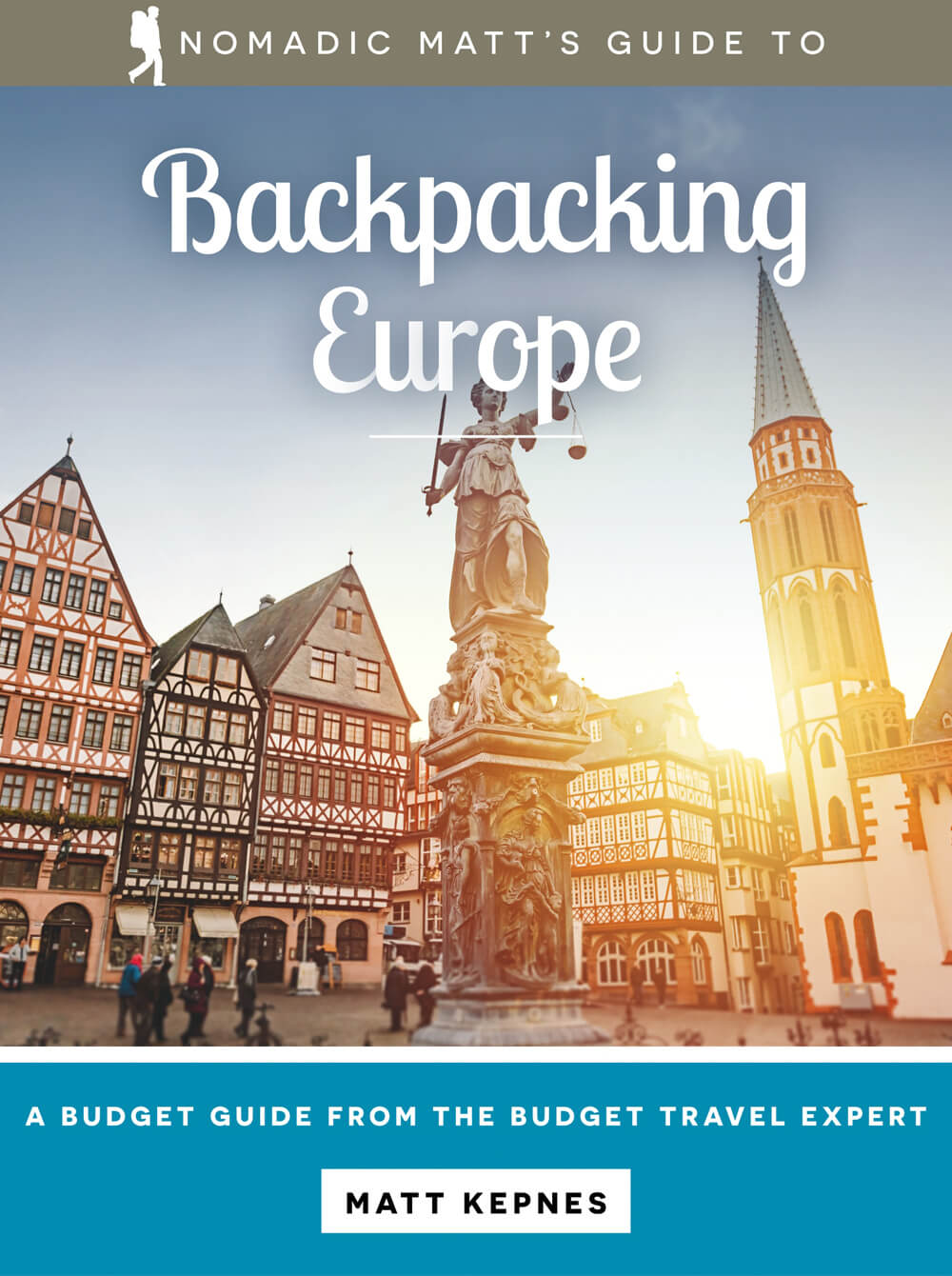
There’s a lot of free information online but do you want to spend days searching for information? Prob not! That’s why guidebooks exist.
While I have a lot of free tips on Europe, I also wrote an entire book that goes into great detail on everything you need to plan a trip here on a budget! You’ll get suggested itineraries, budgets, even more ways to save money, my favorite restaurants, prices, practical information (i.e. phone numbers, websites, prices, safety advice, etc etc), and cultural tips.
I’ll give the insider view of Europe that I got from years of traveling and living here! The downloadable guide can be used on your Kindle, iPad, phone, or computer so you can have it with you when you go. Click here to learn more about my book on Europe!
Albania Travel Guide: Related Articles
Want more tips for your trip? Check out all the articles I’ve written on Albania travel and continue planning your trip:
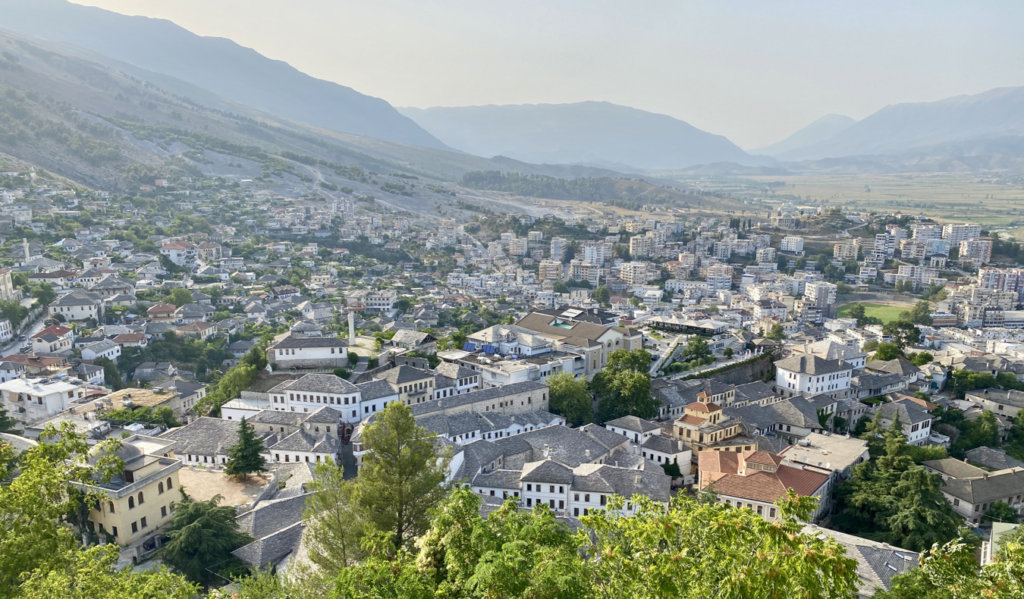
Albania: An Unexpected Journey
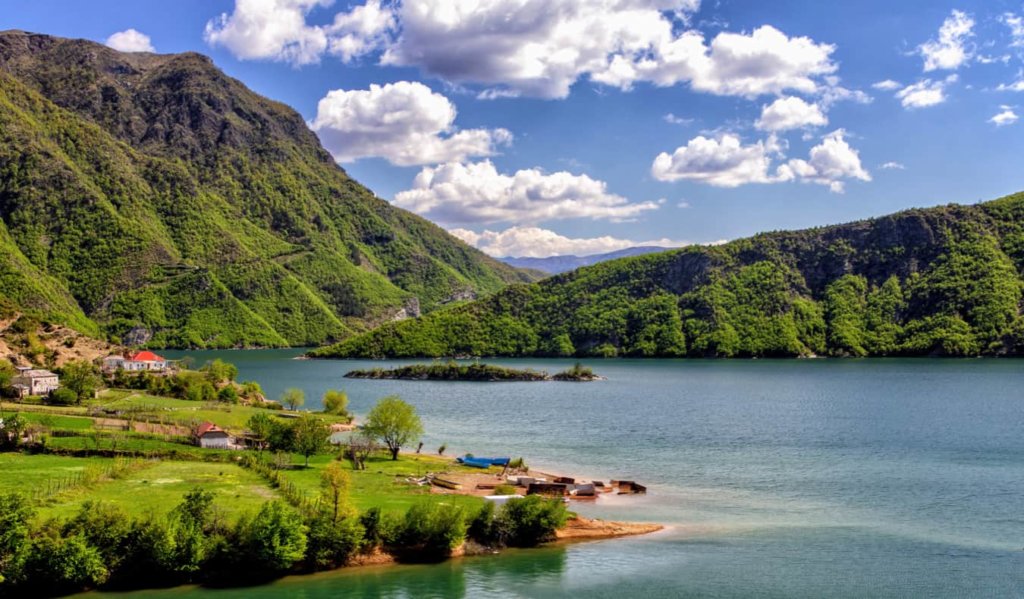
Albania: A Case for Sustainable Tourism
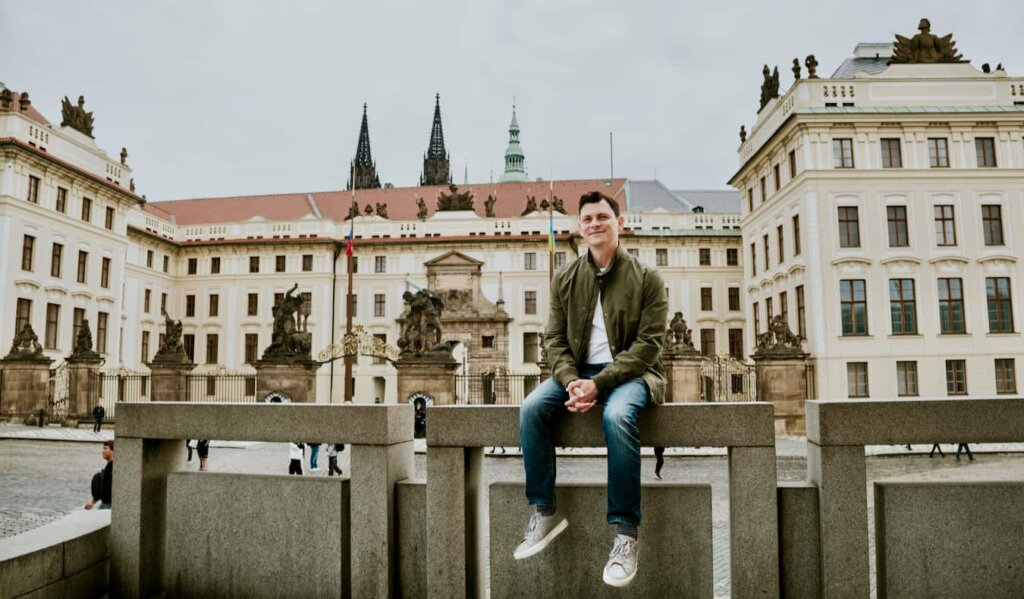
My Step-By-Step Guide to Backpacking Europe
Get your free travel starter kit.
Enter your email and get planning cheatsheets including a step by step checklist, packing list, tips cheat sheet, and more so you can plan like a pro!

- Where To Stay
- Transportation
- Booking Resources
- Related Blogs

Search Smartraveller

Latest update
Exercise a high degree of caution in Albania due to limited healthcare options.
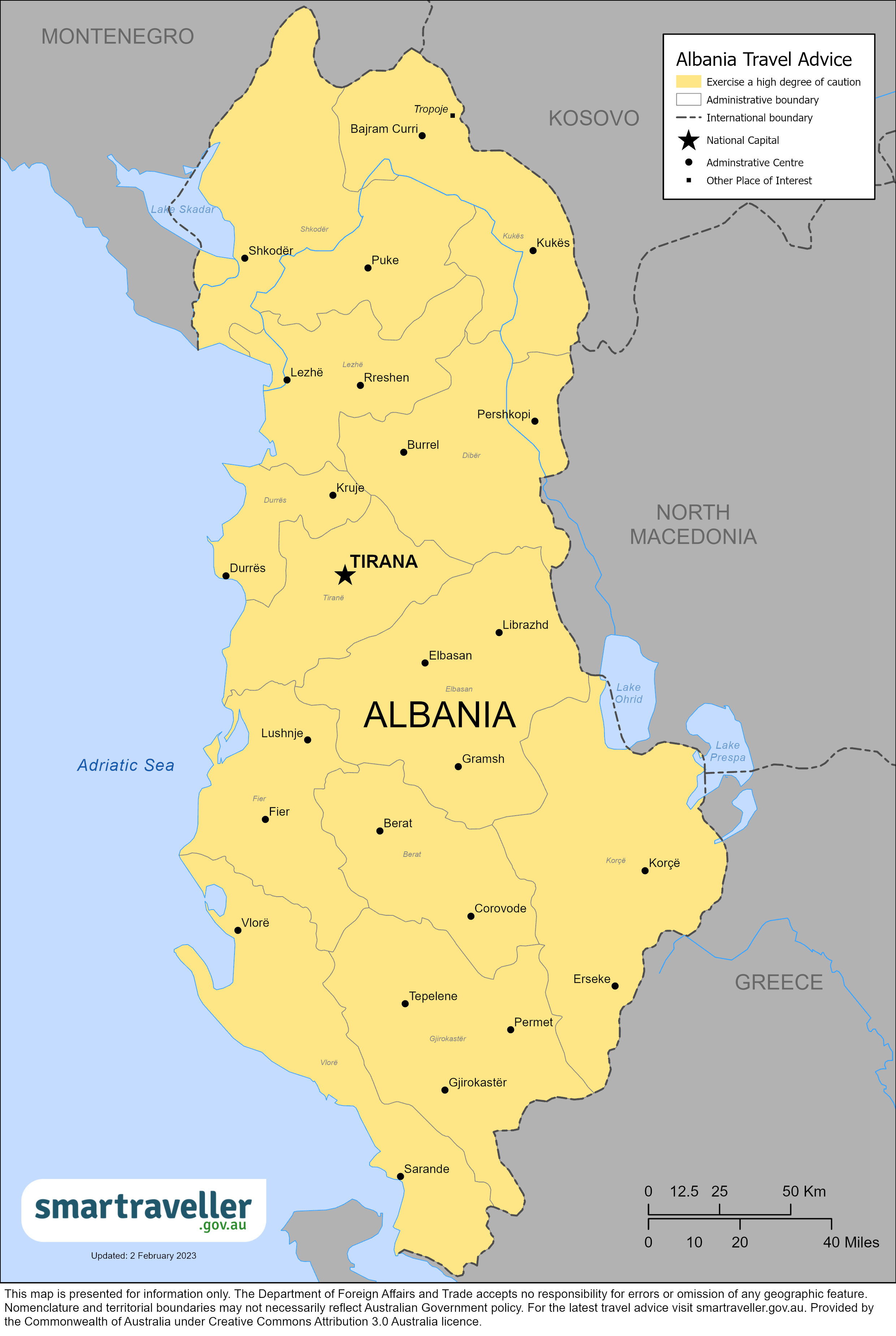
Albania (PDF 212.58 KB)
Europe (PDF 2.62 MB)
Local emergency contacts
Fire and rescue services, medical emergencies.
Call 127 or go to the hospital.
Traffic police
Sea emergencies, advice levels.
Exercise a high degree of caution in Albania.
Exercise a high degree of caution in Albania due to limited healthcare options.
- Terrorism is a threat worldwide. Terrorists have targeted European cities, including transport hubs and tourist locations. Take official warnings seriously.
- Political protests could take place in central Tirana. Most demonstrations are peaceful, but they can turn violent. Monitor local media for the latest updates.
- Theft from vehicles is common. Petty crime occurs. Take care of your belongings on public transport.
- Severe weather occurs from December to February and may cause flooding, particularly in northern Albania. Monitor the local media and stay in touch with friends and family.
Full travel advice: Safety
- Take care in forests and rural areas where ticks carry encephalitis. Ticks are active from spring to autumn. Check your body for ticks and remove them as soon as possible.
- Sandflies are active along the coast. They carry diseases. Use insect repellent and make sure your accommodation is insect-proof.
- Tuberculosis, typhoid, hepatitis, brucellosis and rabies are common. Drink only boiled or bottled water. Avoid raw or undercooked food.
- Medical facilities don't always have access to equipment, medicine and specialist doctors, and ambulances are limited. Organising a medical evacuation can be expensive and difficult. Make sure your travel insurance covers this.
Full travel advice: Health
- Always carry identification. It's the law.
- It's illegal to take photos of military sites and personnel.
- Don't use or carry illegal drugs. Penalties are severe and can include jail sentences and heavy fines.
- The Albanian Government considers you an Albanian citizen if you were born in Albania or have an Albanian parent. If you're a man, you may have to do military service.
- Same-sex relationships are legal in Albania but aren't widely accepted. Avoid public displays of affection.
Full travel advice: Local laws
- You can visit Albania for 90 days without a visa. You'll need a visa for longer stays.
- Entry and exit conditions can change at short notice. Contact the nearest embassy or consulate of Albania for the latest details.
- Watch out for landmines in the north-east border areas, particularly near Kosovo. Look for and obey warning signs.
Full travel advice: Travel
Local contacts
- The Consular Services Charter details what we can and can't do to help you overseas.
- Australia doesn't have an embassy or consulate in Albania. For consular help, contact the Australian Embassy in Rome, Italy.
- The British Embassy in Tirana can provide limited help but can't issue Australian passports.
- To stay up to date with local information, follow the Embassy's social media accounts.
Full travel advice: Local contacts
Full advice
Civil unrest and political tension.
Political protests take place regularly in central Tirana.
Demonstrations can occur with little or no warning.
Most demonstrations are peaceful. However, public protests and events that draw large groups of people can turn violent.
To stay safe during periods of unrest:
- monitor local media and other sources
- avoid areas where these events may happen
- follow the advice of local authorities
More information:
- Demonstrations and civil unrest
While there have been no recent terrorist attacks in Albania, they can still happen.
Terrorist attacks could occur anywhere and at any time. Be alert to possible threats, especially in public places. Terrorists may target tourist areas or other places frequented by foreigners and where large crowds may gather.
Possible targets include:
- places of worship or religious holidays
- hotels, clubs, restaurants and cafes
- markets and shopping malls
- outdoor recreation events, including festivals, concerts, and sporting venues
- public transport, airports and railway hubs
To stay safe:
- report suspicious activities or items to the police
- check the media for new threats
- take official warnings seriously
- follow the instructions of local authorities
If there’s an attack, leave the area as soon as it's safe to do so.
Terrorism is a threat worldwide.
Theft from vehicles is common.
Take care of your belongings on public transport. Petty crime happens.
More information
- theft and robbery
Cyber security
You may be at risk of cyber-based threats during overseas travel to any country. Digital identity theft is a growing concern. Your devices and personal data can be compromised, especially if you’re connecting to Wi-Fi, using or connecting to shared or public computers, or to Bluetooth.
Social media can also be risky in destinations where there are social or political tensions or laws that may seem unreasonable by Australian standards. Travellers have been arrested for things they have said on social media. Don't comment on local or political events on your social media.
Cyber security when travelling overseas
Kidnapping can happen anywhere, anytime, including destinations that are typically at lower risk. The Australian Government's longstanding policy is that it doesn't make payments or concessions to kidnappers.
More information:
- Kidnapping
Climate and natural disasters
Severe weather.
Albania may experience severe weather from December to February.
Severe weather can cause flooding, particularly in northern Albania. It may also disrupt local travel and transport services.
Heavy snowfall in mountain areas can affect travel.
Monitor local media for updates.
Forest fires
Forest fires often occur during dry and hot weather, usually from April to October. Forest fires can be unpredictable and dangerous. Smoke from fires can reduce air quality and can be harmful to your health.
Causing a wildfire or a forest fire is a criminal offence in Albania. Penalties could result from fines to imprisonment.
Earthquakes
Earth tremors are common. Significant earthquakes can also occur.
Significant earthquakes can cause:
- landslides or avalanches
- damage to infrastructure, homes and property
If a natural disaster or severe weather occurs:
- keep your passport in a safe, waterproof location
- stay in contact with friends and family
Register with the Global Disaster Alert and Coordination System to receive alerts on major disasters.
Travel insurance
Get comprehensive travel insurance before you leave.
Your policy needs to cover all overseas medical costs, including medical evacuation. The Australian Government won't pay for these costs.
If you can't afford travel insurance, you can't afford to travel. This applies to everyone, no matter how healthy and fit you are.
If you're not insured, you may have to pay thousands of dollars up-front for medical care.
- what activities and care your policy covers
- that your insurance covers you for the whole time you'll be away
Physical and mental health
Consider your physical and mental health before you travel, especially if you have an existing medical condition.
See your doctor or travel clinic to:
- have a basic health check-up
- ask if your travel plans may affect your health
- plan any vaccinations you need
Do this at least 8 weeks before you leave.
If you have immediate concerns for your welfare or the welfare of another Australian, call the 24-hour Consular Emergency Centre on +61 2 6261 3305 or contact your nearest Australian Embassy, High Commission or Consulate to discuss counselling hotlines and services available in your location.
- General health advice
- Healthy holiday tips (Healthdirect Australia)
Medications
Not all medications available over the counter or by prescription in Australia are available in other countries. Some may even be considered illegal or a controlled substance, even if prescribed by an Australian doctor.
If you plan to bring medication, check if it's legal in Albania. Take enough legal medicine for your trip.
Carry a copy of your prescription or a letter from your doctor stating:
- what the medication is
- your required dosage
- that it's for personal use
- Medication
Health risks
Insect-borne diseases.
Ticks in forests and country areas can carry encephalitis. Ticks are active from spring to autumn.
Diseases spread by sandflies are common in coastal regions. Sandflies can carry:
- sandfly fever
- leishmaniasis (World Health Organisation)
To protect yourself from disease:
- ensure your accommodation is insect-proof
- use insect repellent
- wear long, loose, light-coloured clothing
During and after travelling in forested areas:
- check your body for ticks
- remove ticks from your body as soon as possible
Other health risks
Waterborne, foodborne and other infectious diseases are common, including these listed by the World Health Organization:
- tuberculosis
- brucellosis
Serious outbreaks sometimes occur.
To protect yourself from illness:
- boil drinking water or drink bottled water
- avoid ice cubes
- avoid unpasteurised dairy products
- avoid raw and undercooked food, such as salads
- don't go near dogs and other mammals
If you're bitten or scratched by an animal, seek medical help straight away.
Get medical advice if you have a fever or diarrhoea.
Medical care
Standards of hygiene and medical facilities are lower than in Australia.
There's limited access to medical equipment, medicine and specialist doctors.
Medical facilities outside Tirana are limited.
Medical facilities can rarely handle serious trauma or major medical care cases.
Ambulances are limited. Patients often take taxis or other vehicles to the nearest major hospital.
If you become seriously ill or injured, you may need to be evacuated to a place with better facilities. Medical evacuation can be expensive and hard to organise.
You're subject to all local laws and penalties, including those that may appear harsh by Australian standards. Research local laws before travelling.
If you're arrested or jailed, the Australian Government will do what it can to help you under our Consular Services Charter . But we can't get you out of trouble or out of jail.
Penalties for drug offences are severe. They can include jail sentences and heavy fines.
- Carrying or using drugs
You must always carry identification.
It's illegal to photograph military installations and personnel.
Australian laws
Some Australian criminal laws still apply when you're overseas. If you break these laws, you may face prosecution in Australia.
- Staying within the law
Dual nationality
The Albanian Government considers you to be an Albanian national if:
- you were born in Albania, or
- you have an Albanian parent
You may be subject to compulsory military service if you're a male Australian-Albanian dual national. Contact the embassy or consulate of Albania for details before you leave Australia.
- Dual nationals
Local customs
Same-sex relationships are legal in Albania but aren't widely accepted.
Avoid public displays of affection.
- Advice for LGBTQIA+ travellers
Visas and border measures
Every country or territory decides who can enter or leave through its borders. For specific information about the evidence you'll need to enter a foreign destination, check with the nearest embassy, consulate or immigration department of the destination you're entering.
You can visit Albania for 90 days without a visa. You'll need a visa for longer stays.
Entry and exit conditions can change. Contact the nearest embassy or consulate of Albania for details about visas, currency, customs and quarantine rules.
Some countries won't let you enter unless your passport is valid for 6 months after you plan to leave that country. This can apply for transit or short stopovers.
Some foreign governments and airlines apply the rule inconsistently. Travellers can receive conflicting advice from different sources.
You can end up stranded if your passport is not valid for more than 6 months.
The Australian Government does not set these rules. Check your passport's expiry date before you travel. If you're not sure it'll be valid for long enough, consider getting a new passport .
Lost or stolen passport
Your passport is a valuable document. It's attractive to people who may try to use your identity to commit crimes.
Some people may try to trick you into giving them your passport. Always keep it in a safe place.
If your passport is lost or stolen, tell the Australian Government as soon as possible:
- In Australia, contact the Australian Passport Information Service .
- If you're overseas, contact the nearest Australian embassy or consulate .
Passport with X gender identifier
Although Australian passports comply with international standards for sex and gender, we can’t guarantee that a passport showing 'X' in the sex field will be accepted for entry or transit by another country. Contact the nearest embassy, high commission or consulate of your destination before you arrive at the border to confirm if authorities will accept passports with 'X' gender markers.
- LGBTQIA+ travellers
The local currency is the Albanian Lek (ALL).
You must declare if you're carrying amounts equivalent to $US 20,000 when you arrive or leave. This covers all forms of currency, not only cash.
ATMs and credit card facilities are available in larger cities and in tourist areas.
Many shops and service providers prefer cash.
You can change major currencies at banks and authorised exchange bureaus.
Credit card fraud can happen. Take care not to expose your PIN. Check your bank statements often.
Local travel
Landmines are a hazard in the north-east border areas of Albania.
They are a particular hazard in hill towns along the north-eastern border with Kosovo.
To protect yourself from landmines:
- avoid locations displaying landmine or unexploded weapons warning signs
- seek advice from local authorities
Driving permit
To drive in Albania, you need both:
- an International Driving Permit (IDP)
- a current Australian driver's licence (digital driver’s licences may not be accepted)
Get your IDP before leaving Australia.
- Driving or riding
Road travel
Driving in Albania can be dangerous. Hazards include:
- aggressive driving
- poorly maintained roads
- poorly lit roads
- power outages
- icy and slippery roads
If you plan to drive in Albania:
- check if your travel insurance will cover you
- know the local road rules
- use snow chains in winter
Only use registered taxis and authorised limousines.
Ask your hotel to arrange a taxi for you.
Avoid flagging down taxis in the street.
Sit in the back seat.
Public transport
Bus and rail travel is unreliable.
Safety standards on public transport can be poor.
Before boarding a ferry or boat, check whether appropriate safety equipment is available.
- Going on a cruise
- Travelling by boat
There are no commercial domestic flights within Albania.
DFAT doesn't provide information on the safety of individual commercial airlines or flight paths.
Emergencies
Depending on what you need, you could contact your:
- family and friends
- travel agent
- insurance provider
Always get a police report when you report a crime.
Your insurer should have a 24-hour emergency number.
Consular contacts
Read the Consular Services Charter for what the Australian Government can and can't do to help you overseas.
Australia doesn't have an embassy or consulate in Albania.
If you need consular assistance, contact the Australian Embassy in Rome, Italy.
Australian Embassy, Rome
Via Antonio Bosio 5 00161 Rome, Italy Phone: +39 06 85 2721 Email: [email protected] Website: italy.embassy.gov.au Facebook: Australian Embassy, Italy X: @AusAmbRome
Check the Embassy website for details about opening hours and any temporary closures.
You can get limited consular assistance from the British Embassy in Tirana. However, they can't issue Australian passports.
British Embassy Rruga Skenderbej 12 Tirana, Albania Phone: (+355) 42 34 973
24-hour Consular Emergency Centre
In a consular emergency, if you can't contact an embassy, call the 24-hour Consular Emergency Centre on:
- +61 2 6261 3305 from overseas
- 1300 555 135 in Australia

Travelling to Albania?
Sign up to get the latest travel advice updates..
Be the first to know official government advice when travelling.
Albania Travel Tips: 10 Things To Know Before Travelling To Albania

If you’re thinking of visiting Albania, here are 10 practical Albania travel tips, to prepare you for your trip.
Some of the links in this post are affiliate links. All this means is that if you make a purchase through one of the links I have provided, I will earn a small commission as a result but the cost to you will remain exactly the same.
Even in spite of stating that I hoped to explore more of the Balkans, in my 2019 Travel Plans post that I published at the start of the year, my recent trip to Albania ended up a pretty last minute affair. I’d been so busy planning itineraries for and writing posts about the places I’d visited in the first half of the year that by the time I returned from hiking Mount Toubkal in May, I suddenly realised that my birthday was only a month away.
And, by way of celebrating my birthday every year, I like to hop on a plane and explore somewhere new.
I had a matter of weeks to figure out where I wanted to go, find flights, sort an itinerary and get everything booked. Eek!
I’d previously set up a couple of flight alerts on Skyscanner to Tirana for a couple of dates in June (and I’d done the same for return flights from Skopje (Macedonia) to Paris – because they were £13 and because I’d won an overnight stay at a fancy hotel in Paris at Christmas), but the prices had increased tenfold since then – to Tirana at least. It was then that I remembered a conversation with Laura, my equally travel-obsessed colleague at work, who’d informed me that Albania was only a short ferry ride from Corfu Town. So, I began searching for flights from the UK to Corfu and, just like that, a plan started coming together. Unfortunately I didn’t manage to successfully incorporate that return flight to Paris (we ended up returning from Ohrid to Luton), but I’m hoping my prize doesn’t have an expiry date and that I can fit in an overnight stay in Paris later on in the year!
So, in a nutshell, I booked our flights, accommodation, car hire, ferry and international bus journey just two weeks before we actually flew. And because I’d poured all my time into researching destinations and things to see and do in Albania, I really had no idea what to expect at ground level. I had only a very limited knowledge of the country’s history, knew very little about its culture and people, and was equally clueless about the logistics and practicalities of travelling over there.
Just in case any of you are as disorganised as I am or have the same fly-by-the-seat-of-your-pants attitude (albeit in spite of best laid plans, in my case) to travel, I’ve put together this handy little post of practical Albania travel tips. Here are 10 things to know before travelling to Albania.
Albania Travel Tips
1 | every introduction starts with a glass of raki.
When we arrived at the location of our first overnight stop in Albania – Friends Hostel in Gjirokaster – our host checked us in, helped us to find somewhere to park our car and then invited us to join him out on the terrace to enjoy some wild figs and a complimentary glass of raki.

Gjirokaster
Our trip continued along much the same vein throughout our time in Albania. Raki seems to be drunk much like rum is in Cuba and tea is in England, and although I’m not usually partial to consuming large shots of strong spirits in 30-degree heat in the middle of the day, turning down the invitation felt almost akin to shunning the open-armed welcome that a lot of the Albanian people offered us during our stay.
Restaurant owner Lili in Berat was so grateful to us for offering up our table to some waiting customers as soon as we’d finished eating that he insisted we join him for a complimentary glass of raki at the end of the evening. And because the evening went on longer than he’d planned – due to a steady influx of hungry diners arriving well after the kitchen had officially closed – he plied us with a complimentary carafe of his family’s homemade red wine while we waited.
Even at a rather more upmarket restaurant in Korça, our glass of raki arrived before our starter did 😉

Every introduction in Albania starts with a glass of raki
2 | Not all ‘roads’ are actually roads
My advice, if you’re planning a road trip around Albania , is to upgrade your small hire car to a Land Rover (or similar) if your route takes you anywhere other than along the major highways.
Seeing as though the idea of hiring a car is to give you the freedom and flexibility to get off the beaten path a little, we felt more than a little frustrated to discover that our car could not make it along routes that public buses, in fact, could (due to minibuses having a higher wheelbase than our Citroen C2 did). We missed out on visits to the villages of Benjë (famous for its hot springs) and Voskopojë (famous for its churches with floor to ceiling frescoes) as a result of this.
The problem is that not all main roads (identifiable on Google Maps or as being yellow or on Maps.me as being orange and whose names begin with the initials SH (Super Highway? Hmm, I think not!)) are well surfaced. And even those that start off as tarmac roads can, quite suddenly, turn into rocky dirt tracks that wouldn’t even be classified as roads here in England.

Berat to Përmet | Maps.me vs Google Maps
We found this out the hard way when we were due to travel between Berat and Përmet, on our fifth day in the country. It didn’t help matters that there seemed to be zero correlation between Google Maps (which we could use to plan routes when we were connected to wifi) and Maps.me (which we had to use when we were on the move, because it allowed us to navigate offline AND had a lot more detail).
Google Maps told us to head south along the SH74, a ‘Super Highway’ that turned into the SH75 just beyond Këlcyrë, whereas Maps.me did not have this initial section marked as a major ‘orange’ road and conversely instructed us to head south on the SH72 and then to join the SH74 just south of Komarak – which we duly did. The route was meant to be 91 kilometres and take us two hours and 11 minutes.

Abandoned bunkers, Albania
All was good until just after we’d stopped off to check out some abandoned bunkers close to the village of Ibrollarë. What had been a very smooth (save for a few of the usual Albanian potholes) tarmac surface suddenly became nothing more than dirt and rocks.
We persevered with it for a very long time, assuming (very wrongly!) that our tarmac road would return before too long. This was, after all, the route that our Sat Nav had instructed us to take, and was in fact the only route that Maps.me had found that didn’t involve us returning to Berat and driving the same roads we’d driven to get to Berat the day beforehand (a further two hour 43 minute / 186km journey)
But it got to the point that we’d experienced so many bangs and clunks underneath the car that we were worried we’d:
- damage our hire car beyond repair (we’d taken out the full insurance but we’d still lose the €500 deposit we’d put down), or
- get the car stuck somewhere with no phone signal and no more than three words of the local language between us.
Albania travel tips : Do not tackle Albania’s roads unless you are a competent driver and make sure you take out full insurance.
So, with just 25 kilometres of the journey left to go, we reluctantly turned back.

Stu removing the rocks from one particularly bad part of Albania’s ‘highways’
We got back to Pronovik, where the road forked. The left-hand fork would take us back to Berat, but the right-hand fork was signposted “Çorovoda” – along the SH72 in the direction we wanted to be travelling. The road looked to be in good condition and would take us back on to the SH75 just north of our final destination – Përmet.
BUT whenever I typed “Përmet” into the Maps.me Sat Nav, it kept telling us to go back the way we came – the route we tried but had to abandon – or to return to Berat to make the long 186 kilometre journey via Fier. It simply could not find / did not recognise the route we were contemplating.
Neither of us wanted to return to Berat, but my gut instict was telling me it was the only way. I remember saying to Stu,
“I think there’s something wrong with this route.”
But he seemed so confident, and he is a lot more familiar with driving than I am (i.e he drives every day and I don’t drive at all), so I placed my trust in him and hoped that the Sat Nav was wrong.
Sadly it wasn’t. We were in spitting distance of the Osumi Canyon Bridge , trundling along a road that was going much the same way the first one had when a couple of local guys passed us in a 4 x 4 and then stopped, rolled down their window and asked if we were heading towards Përmet.
“Yes,”
we replied nervously, already knowing what we were about to be told.
“You cannot get through in that car. You need to go back to Berat.”
And so it was that a journey that was supposed to have taken us two hours and 11 minutes actually ended up taking us nine and a half hours! I really wish someone had given me a list of Albania travel tips, warning me of this prior to my visit!
3 | You’ll get some of the best value accommodation here in all of Europe
With the possible exception of Georgia last year, where we scored a couple of rooms for under £15 a night (one of which included breakfast), I can honestly say that we found some of the best value accommodation in all of Europe here in Albania.
Considering that this was a very last minute trip and I only booked the accommodation a couple of weeks before we travelled, our average nightly accommodation cost was £22 / $28 per room. Parking was available free of charge at every single one of these places, 50% included breakfast and the majority came with their own terrace or balcony. And everywhere we stayed – regardless of whether it was a hostel, a room or a whole apartment – far exceeded our expectations in terms of quality and of the welcome and hospitality we received from our hosts.

One of my favourite places we stayed in Albania – the city of Berat
I book pretty much all my accommodation through booking.com . Due to their wide variety of accommodation options, cheap prices and free cancellation options, one of my Albania travel tips is to do the same!
4| The Wi-Fi is universally awful (unless you’re in Tirana)
Our hosts were all very efficient in ensuring that we had the Wi-Fi code soon after we arrived and that we’d successfully connected to the Wi-Fi network, but unfortunately the connection was ridiculously unreliable and also painfully slow everywhere we went.
The connection would continually drop out and the only way we could reconnect was to either switch our phones on and off again or to reset the router. When the Wi-Fi did work, speeds were fast enough for general web browsing and to send and receive emails, but when it came to uploading photographs it was a completely different story.
The only way I can share photographs taken on my DSLR to Instagram when I travel is to firstly upload them to Flickr, and then to save them to my phone from the Flickr app. WiFi speeds made it virtually impossible to upload any more than five or six photos at once and even that took well over half an hour.

Independence Monument, Tirana
If you work online, this is something to bear in mind. We actually met a couple of digital nomads on the bus from Tirana to Ohrid (Macedonia) and they’d not stayed anywhere in Albania outside of Tirana.
I’m sure, over time, the infrastructure will improve and so too will the Wi-Fi, but for now it’s one of the country’s frustrating challenges.
5 | There are cats everywhere
Hardly surprising really considering that Albania borders Greece and Greece is known for its abundance of cats, but when you’re a cat lover this is an exciting reason to visit somewhere. Watching cats, stroking cats, feeding cats and photographing cats always manages to put a smile on my face.

Pretty little tortoiseshell and white cat wandering the grounds of Himara Castle
6 | Take advantage of all the fresh fruit; it’s probably the cheapest you’ll find it outside of Southeast Asia
We’d generally only pay for one sit down meal a day in Albania. Breakfast (if it wasn’t included in our room rate) was generally a grab ‘n’ go kind of deal from the local bakery, and although it was usually enough to keep us going until our evening meal, we did often fancy something to snack on in-between.
And fresh fruit was the perfect solution. It was available everywhere – from little street stalls on the side of the roads to village markets and grocery stores in more built-up township areas – and it was embarrassingly cheap. I picked up around half a kilo of cherries on two separate occasions for around 50 pence, and figs were an absolute bargain too. I guess you’ll get whatever is in season when you visit. We visited in June.

Cherries growing on a tree, Albania
7 | Prepare yourself for the heat in Summer; the temperature doesn’t really drop much at night
After swearing I’d never travel with Ryanair again last February, we reluctantly flew with them to Corfu (in order to transfer to Albania), 17 months later. But this did present us with a problem when it came to packing, because this annoying airline have changed their rules regarding cabin baggage again since last year. You’re now only allowed one small under the seat bag, measuring 40 x 25 x 20 – unless you want to give Ryanair more money (which I don’t).
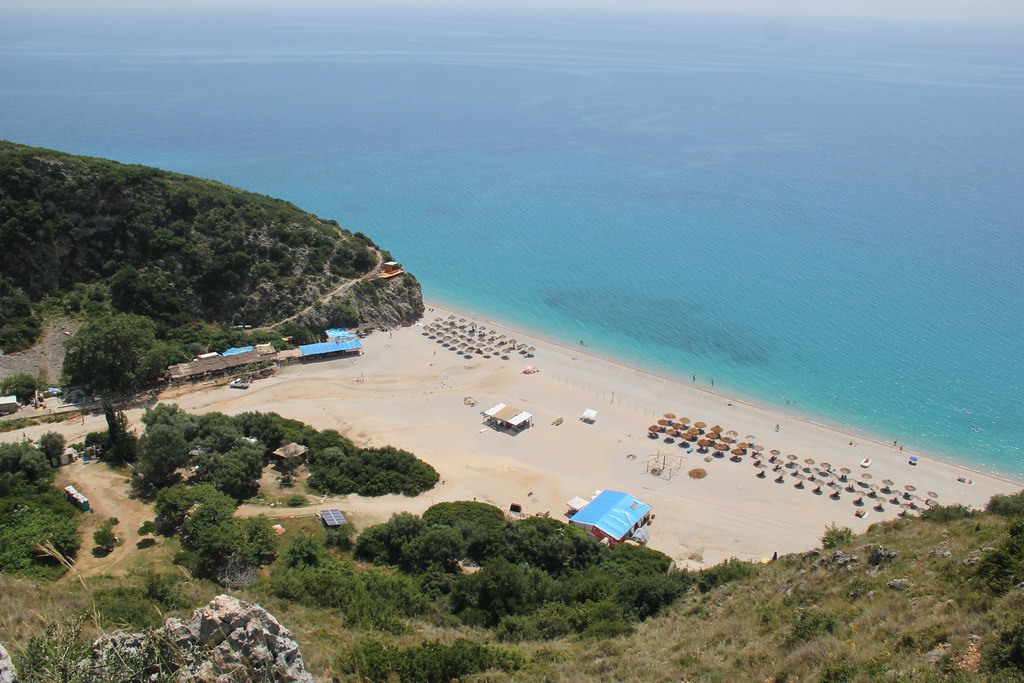
Gjipe Beach, Albania
Knowing that weather can be unreliable and having been caught out in the past for my poor packing choices, I now ensure I pack for all eventualities. I carry my waterproof, a couple of warm layers, some cold/wet weather footwear and a waterproof backpack cover, which doesn’t leave me a lot of room for much else when I’m abiding by Ryanair’s measly cabin bag restrictions.
However, on this trip I didn’t need much else; I could live in shorts and a vest top every day from dawn until way past dusk. The temperature constantly hovered somewhere between the early and mid-thirties and barely dropped at all at night. The only time it got slightly cooler was just after we had a short thunderstorm in Korça, when a thin merino wool jumper was more than enough to keep me warm.
Albania travel tips : Ensure that you make careful packing choices if you’re travelling with hand luggage only . It’s likely you won’t need much in the way of warm layers but thunderstorms are possible.

Just before the storm arrived in Korça
8 | It’s cheaper for you to pay for your accommodation in euros than it is in Albanian Lek
Yes, you’ll need lek for small purchases in shops and to eat out and put fuel in the car, but all the properties we booked to stay at quoted their prices in euros, and if we wanted to pay in lek we lost anywhere between 300-500 lek each time due to the conversion rate the hosts were using.
At 500 lek per night over seven nights, that’s 3500 lek – over £25 / €28! That’ll buy you another night’s accommodation 🙂
Albania travel tips : Make sure you have plenty of euros with you when you enter the country and don’t draw out to much lek, as you’ll only really need it for small purchases.

Admiring the beautiful Albanian landscapes didn’t cost us a single lek!
9 | The Albanian language is HARD!
Two of the first words I always look up in the language of the country I’m travelling to are “hello” and “thank you.” In my experience, just knowing and regularly attempting to use those two expressions will earn you a massive amount of respect from the locals.
However, “përshëndetje” (the “ë” is pronounced “urh”and the “j” like a “y” in “yoghurt”) took a bit of practising, and didn’t ever really roll off the tongue for us; “miremengjes” (“good morning”– pronounced exactly as it’s spelt but without the “g”) worked a lot better.
Thank you – “faleminderit” was also not an easy one to remember, and there doesn’t appear to be a shortened version like we use in the UK. Cheers – “Gëzuar” was a nice simple one, but cannot be interchanged with “thank you,” as we do in the UK; it’s simply to express good wishes. For example, proposing a toast with a drink in hand.

Mosque in Përmet. Did you know that the majority of Albanians (59%) are Muslims?
And that was the sum total of the Albanian vocabulary I managed to learn during my seven days in the country! My advice is to ask a number of different people (hostel owners/Airbnb hosts/serving staff in restaurants) how to pronounce certain words; don’t reply on trying to interpret the voice on Google Translate (unless you want to get some weird looks from locals!)
10 | The cuisine is largely influenced by neighbouring Greece
If you love a fresh Greek salad or are partial to a good home-cooked shrimp saganaki, you’ll be right at home in Albania. Everything seems to come served with olives and feta cheese. There’s also a lot of fish available, due to the country’s extensive coastline.

Omelette served with feta and olives, Korça, Albania
Albania Travel Tips | Practical Info
And, seeing as though this post is full of practical and useful Albania travel tips, here are a few more:
- The official currency is Albania Lek (current conversion (July 2019) is 136 Lek to the British Pound, or 108 Lek to the US Dollar) but euros can often also be used. Albanian Lek can be obtained in the UK but in most cases must be pre-ordered.
- British citizens can enter and remain in Albania for a maximum of 90 days in every six-month period. If you’re not from the UK, you can check the Albania visa requirements here .
- To hire a car in Albania, UK citizens will need a full driving licence, passport and credit card. We used Rentalcars.com to find and book our rental car. The booking process was seamless, as was the return (even though we had to pop into a local garage on route to dropping the car off, in order to fix a part back on to the front, and we’re sure it had a few more scratches on it than it did when we picked it up!). There are generally three places you can collect/drop off your rental car in Albania – Saranda Port, Tirana Airport or Tirana Downtown. It’s important to note that Tirana Downtown can be a much more expensive option than Tirana Airport.
- Albania has one international airport – Tirana. However it’s also worth considering flying into or out of Corfu Town (Greece) or Ohrid (Macedonia), due to their proximity to the country and ease of travel to and from. Obviously, if you do this, you’ll need to check your visa requirements for these countries, too. I always use Skyscanner to research and book my flights.
Albania Travel Tips | Where to Stay in Albania
I can 100% recommend everywhere we stayed in Albania. They are as follows:
- Gjirokaster – Friends Hostel
- Dhermi – Penelope’s Rooms
- Berat – Berat Backpackers Hostel
- Permet – Funky Guest House and Adventures
- Korçë – Old Bazaar Rooms
- Tirana – Central Tirana Apartment
If you enjoyed this article about my best Albania travel tips, why not share it on social media using the share buttons at the top of the post? Alternatively, you can pin it to one of your Pinterest boards, for reference later.

Kiara Gallop
Hi I'm Kiara, the travel blogger and photographer behind Gallop Around The Globe.I can usually be found hiking up mountains, getting lost in the cobblestone streets of my favourite cities, making friends with a furry feline or two, photographing cacti, or grazing on olives and cheese.
You Might Also Like

Things to Do in Faro: The Algarve’s Underrated Capital City

Visiting Kotor: 7 reasons this coastal city in Montenegro totally charmed my socks off

The Republic of Užupis: Vilnius’ Quirky Bohemian Neighbourhood | Gallop Around The Globe
Love hearing about Albania and some of your roadtrip adventures! The picture of Berat is awesome. I need to get to Albania while its still off the main tourist track
Yes, I don’t think it will be long. There’s already a hell of a lot of construction work going on there, particularly on the roads (which do need it!)
Oh man, sorry you got caught out by the roads! Those look insane. The Albanian language is sooo weird. Well, Albania is general is weird to be honest! It’s great that they are so friendly and welcoming though. 🙂 It’ll be interesting to see how Albania’s tourism and infrastructure progresses over the next few years!
I LOVED this article! I spent just under a month in Albania last year so I love reading what others have to say about it! I especially admire how honest you were about road travel in Albania – I’ve seen far too many travel bloggers recommending that everyone just hire a car and travel the country that way with no mention of how bad the roads can be, how the GPS isn’t always great and how normal cars simply can’t cope with the roads. It makes me mad to see that, so I’m super happy that you were so honest about it!
Gutted I didn’t know about paying for accommodation in euros – I paid in LEK everywhere and had no idea that I was probably losing money – a lesson for next time!
Lovely article and a pleasure to read 🙂
Thanks so much for your lovely words Danielle (insert hug emoji). I think it’s so important to be honest because travel blogs (in my opinion) should help other travellers get the most out of their visits, and – like you say – it’s so important to know about the road/maps/GPS situation so that you can plan around it and not waste an entire day driving! (like we did!)
Thanks for the tips, especially the driving tips. It’s amazing how good tips for a roadtrip make such a huge difference.
Albania is indeed a strange but beautiful country. Unfortunately, I did not have much time to fully explore it.
I’m so glad you had a good experience in Albania and are helping to spread the word about this amazing country. In all my travels Albania is firmly in my top three favorite countries. It has everything – beautiful beaches, spectacular mountains, great cities, delicious and cheap food, and such friendly people.
I totally agree on all counts! I’d love to return to explore more of the country 🙂 In fact, there’s the whole half north of Tirana that I never made it to…
Leave a Reply Cancel Reply
Save my name, email, and website in this browser for the next time I comment.
Yes please I'd like your new posts delivered straight to my inbox!
This site uses Akismet to reduce spam. Learn how your comment data is processed .
Mount Toubkal Trek: Your Comprehensive Guide to Climbing North Africa’s Tallest Mountain
Castles, canyons and coastlines: a 7-day albania itinerary by car.
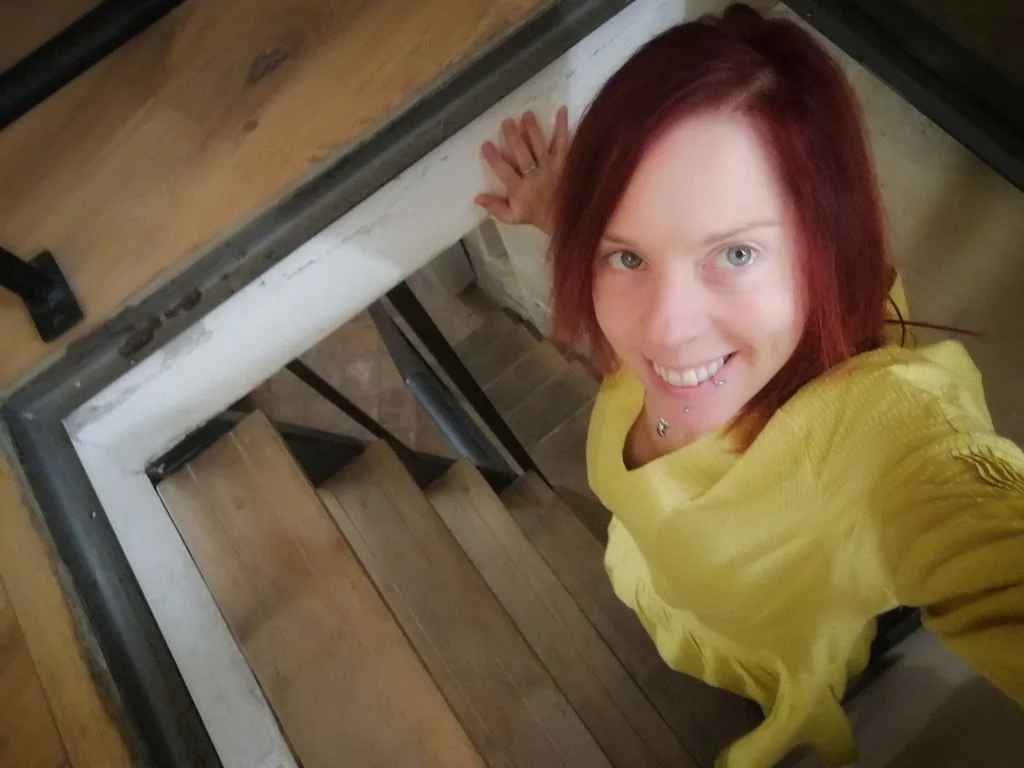
Find me on Facebook
Subscribe to my posts.
Email address:

All rights reserved - Photography cannot be used without my permission

- RECENT BLOG POSTS
- Sustainable travel tips
- Packing light
- Sustainable travel products
- Volunteering
- Why sustainable travel
- El Salvador
Albania | along coastal roads, canyons & clear blue rivers

Imagine cruising along winding serpentines while you gaze at the loud blue sea, the windows down, and the breeze of the Ionian Sea dancing through your hair. A sun-salt smell runs up your nose. As you stretch out your hand you can feel the freedom! Soon, you’re driving next to turquoise rivers and can’t believe your eyes as you see the massive canyon right beside you. You’ll be surprised at what spectacular nature awaits you on your Albania itinerary.
Table of contents

Cities to visit on your Albania itinerary
Todo in tirana:.
- Join a free walking tour – The best way to learn about Albania’s and Tirana’s history and some fun facts
- Visit a bunker museum – Further out of the city there’s BUNK’ART 1, and BUNK’ART 2 right in Tirana’s center. Both are important museums that deliver insight into the dark past of communism and war in Albania (BUNK’ART 1 giving a broad overview of the history, and BUNK’ART 2 displaying a dark human point of view).
- Skanderbeg Square & the old Mosque – A historical place named after the Albanian national hero during Ottoman times. On the square, you can find the beautiful old Et’hem Bej Mosque, one of the few that had survived war times.
- Pazari i Ri – The large bazaar full of groceries in one of the oldest parts of Tirana.
- Tirana Castle – A medieval castle of which only a wall from the Ottoman era remains today, nowadays housing handicraft stores & cafes.
- Hoxha Pyramide – a lost place right in Tirana that used to be the most expensive building in Albania (named after the dictator) that’s currently under construction to become a museum.
Stay in Tirana:
- Hotel/Apartment: Rooftop Tirana – Beautiful, modern apartments in the heart of Tirana with everything you need (especially parking which is important on an Albania itinerary by car).
- Hostel: Tirana Backpacker Hostel – The perfect place to meet fellow travelers with a funky backyard and awesome breakfast.
Hotel recommendation for Tirana: Rooftop Tirana
These small but modern apartments in the heart of Tirana have everything you need (especially with parking, which can be tricky on a road trip in Albania’s capital). From here you can walk everywhere and enjoy the view over the city in the evening. In my opinion, also an unbeatable price! But be sure to contact the host before you arrive, because the apartments are hard to find.

Contrasts in Tirana
ToDo in Berat:
- Castle – Walk up to the castle and enjoy the view
- Stroll through the old town and cross the bridge – for a great view of the old town and its windows
- Join a free walking tour – for great insights into the history and myths of this town
- Head to the beautiful vineyard Alpeta – for a wine tasting and a tour for only 15 Euros
- Osumi Canyon – A perfect day trip into Albania’s most stunning nature
Eat in Berat:
- Temi Albanian Food – Authentic, homemade food in an old alley up the hill with many vegetarian options and unbeatable prices
- Lili Homemade Food – A great place to try traditional food close to Berat’s center
Stay in Berat:
- Alpeta Agroturism – A short drive from Berat you can stay in the vineyard’s lovely rooms in the middle of hills covered with olive trees
- Xho’s Forest – A small B&B with four rooms close to Berat’s historical center with a lush garden where you can have breakfast in the shade of the trees among many cute cats and extremely welcoming owners
- Berat Backpackers Hostel – It was the second hostel in Albania and has a beautiful outdoor area in a traditional building
- Maya Hostel – Another gem with a lovely garden right in the center of Berat
Hotel recommendation for Berat: Alpeta Agroturism
Just a short drive from Berat, you can stay in the beautiful rooms of this winery set amidst hills covered with olive trees. A super beautiful, authentic experience in the middle of the vineyards of Albania. Don’t miss to join a Wine Tasting there in the evening – when the welcoming father joins in, it can quickly turn into a Raki Tasting as well. We had a super nice evening there that felt like a vacation at friends’ homes.

If you’re short on time you can visit Berat on a day trip from Tirana.

Berat & its surrounding vineyards
Gjirokaster
Todo in gjirokaster.
- The castle – for a spectacular view across Gjirokaster
- Old Bazaar – Climb the steep alleys around the old Bazaar and stroll through the carpet and handcraft shops
- Ali Pasha bridge – an abandoned bridge in the countryside just a short hike (around 20 minutes) from town
- Day trip to Lengarica Canyon & Bënjë thermal baths – one of my favorite spots in Albania
Stay in Gjirokaster
- TeArra – A bit up the hill, but led by a loving host Adi who loves to bake treats for her guests and prepares a large breakfast on her beautiful cozy terrace
- Grandpa’s Home – A guesthouse that awaits you with the warmheartedness you’d expect from this name. With a beautiful garden and terrace and view of the castle.
- Stone City Hostel – a lovely hostel in a traditional house right in the center of Gjirokaster with a garden, roof terrace, and great breakfast
Hotel recommendation for Gjirokaster: TeArra
Located a bit further up the hill, this little guesthouse is run by the lovely hostess Adi, who loves to bake goodies for her guests and prepare a great breakfast on her cute, cozy terrace. The view from up here is really great and it’s easy to walk into the center. The picture shows her sweetly furnished terrace.

Gjirokaster & Ali Pasha Bridge
Albanian Riviera
Places to see in the albanian riviera.
- Dhermi old town & the church (Manastiri i Shën Marisë) – with amazing sea view
- Vuno – A cute, small hillside village
- Butrint National Park – Ruins of an ancient city (with an old Roman theatre, old church, gates, a castle, and many more) in the southernmost part of Albania
- Heads-up: In my opinion, avoid Saranda and Ksamil which are the most touristy places in Albania with one hotel bunker next to the other
Hotel recommendation for Dhermi: Roots
What a beautiful hotel in the sweet old town of Dhermi! The location is truly unique. And the rooms are stylish and modern yet authentic with a stunning sea view from their balcony. What else could you ask for? In my eyes, the dream accommodation on the Albanian Riviera!

Dhermi & ruins of Butrint
Beaches in Albania
- Gjipe Beach – Maybe one of the best beaches in Albania, but still kind of hidden gem in Albania (maybe not so hidden, as there are also sunbeds down there) but an extremely beautiful bay that you can reach after around 30 minutes walk from the parking
- Gjiri i Akuariumit – Just a 20-minute walk from Livadi beach (where you can park) you reach this small bay which is a natural paradise
- Borsh Beach – A super long beach (over 7 km!) that will never seem crowded, as there’s enough place to find a private spot for you.
- Grama Bay – Far away from any other beaches, it’s best to take a boat to Grama bay (e.g. from Himare). It’s also a very historic place where sailors used to escape storms and left inscriptions on the walls.

A bay near Ksamil & Borsh Beach
Stay in the Albanian Riviera
- Roots (in Dhermi) – Located in Dhermi’s cute old town, this small hotel offers beautiful rooms with a stunning view from their balconies
- Guesthouses Luiza (in Borsh) – An authentic guesthouse with lemon trees in their garden and walking distance to the beach
Hotel recommendation at the sea in Borsh: Guesthouses Luiza
An authentic, simple guesthouse, where you can relax among lemon trees in the garden, enjoy the sea view from the balcony and even walk to one of the longest beaches in Albania in just a few minutes. Here you don’t need much more to get to know and love a slightly less touristy part of Albania.
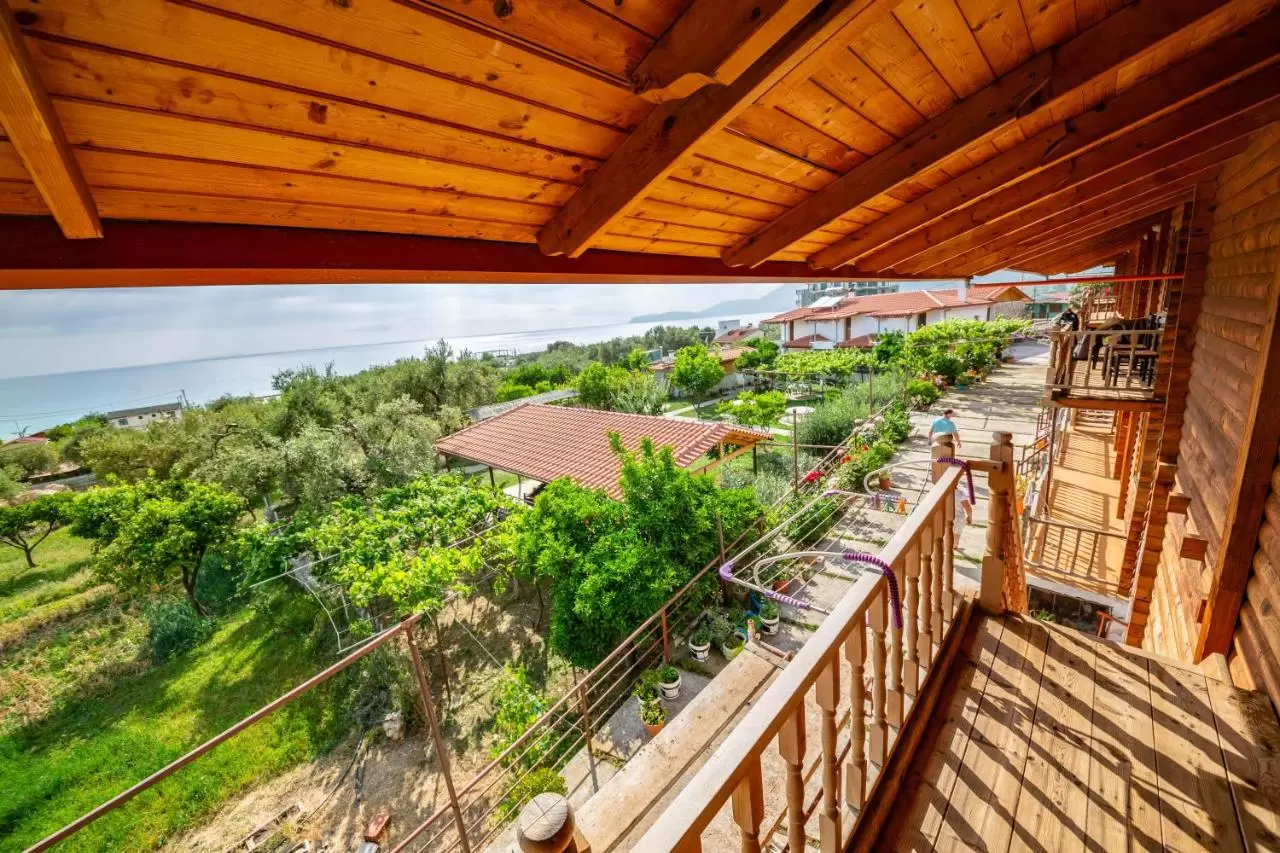
Eat in the Albanian Riviera
- Green Life Market – The first all-vegan restaurant in Albania, run by warm-hearted owners who basically cook in their home. Great atmosphere and even better food that is organic and as local as possible. Highly recommend visiting (probably the only place worth visiting in Saranda)!
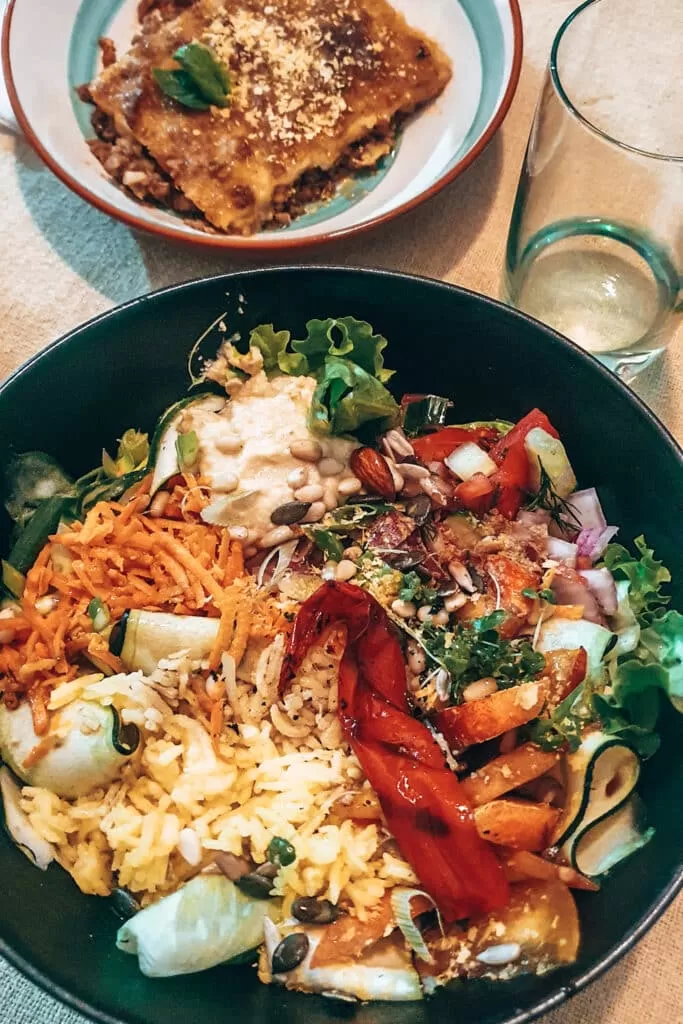
Vegan food at Greenlife Market & Albanian Fruit stalls
Canyons, rivers, and lakes
Osum canyon (kanion osumi), lengarica canyon (kanioni i lengarices).

Lengarica Canyon
Bënjë Thermal Baths

Syri i Kaltër (Blue Eye)

Blue Eye & its clear river
Albanian Alps (Prokletije)
Theth and valbona valley, todo in theth:.
- Calm down – The area around the cute village Theth with its iconic church, free-roaming horses and cows and scenic mountain landscape is truly a place to recharge
- Waterfall hike – You can take a bus that brings you close to the waterfall. Then it’s just a short hike
- Blood Rage Tower – It used to be a safehouse for those who had to hide and can be visited nowadays
- Blue Eye – Yes, there’s also a well with the same name as the spring in southern Albania
- Hike to Valbona or even Montenegro – If you’re a fan of hiking further, there are several routes that cross through Valbona and even Montenegro. But you should be an experienced hiker and willing to walk around 20 km a day for these tours.
Stay in Theth National Park:
You can find many authentic, family-run guesthouses in traditional stone houses in the village Theth. This is also the perfect starting point for many hikes and day trips.
- Guesthouse Gjin Thana – A small, family-run guesthouse with mountain views and a lush garden
- Guesthouse Marashi – Perfectly located right by the river (what a view to wake up in the morning!) and run by warm-hearted hosts
Hotel recommendation in Theth: Guesthouse Marashi
With its unbeatable location directly on the river, you have a stunning view as soon as you wake up in the morning! In addition, you do not have to go far to the waterfall. The beautiful wooden guesthouse is also run by super warm hosts who will make your stay in Theth very special. A place you will always want to come back to!

Theth National Park (pictures by my friend Jule )
Route along the Black Drin
Albania itineraries, how many days do you need for an albania road trip, more on slow travel, how to get to albania.

The ferry from Bari to Durres
How to get around Albania?

Ferry to Durres & driving in Albania
Driving around Albania
Suggested Albania itineraries
2 weeks albania itinerary.
- drive Tirana ⇨ Berat (1.5h / 100km)
- drive Berat ⇨ Gjirokaster (2.5h / 180km)
- drive Gjirokaster ⇨ Blue Eye ⇨ Riviera (1.5 – 2.5h / 90 – 115km)
- drive Riviera ⇨ Kruje ⇨ Koman Lake (5.5h / 320 km), add a night in Kruje if you’d like to avoid the long drive
- Koman Lake & Albanian Alps (3-4 days)
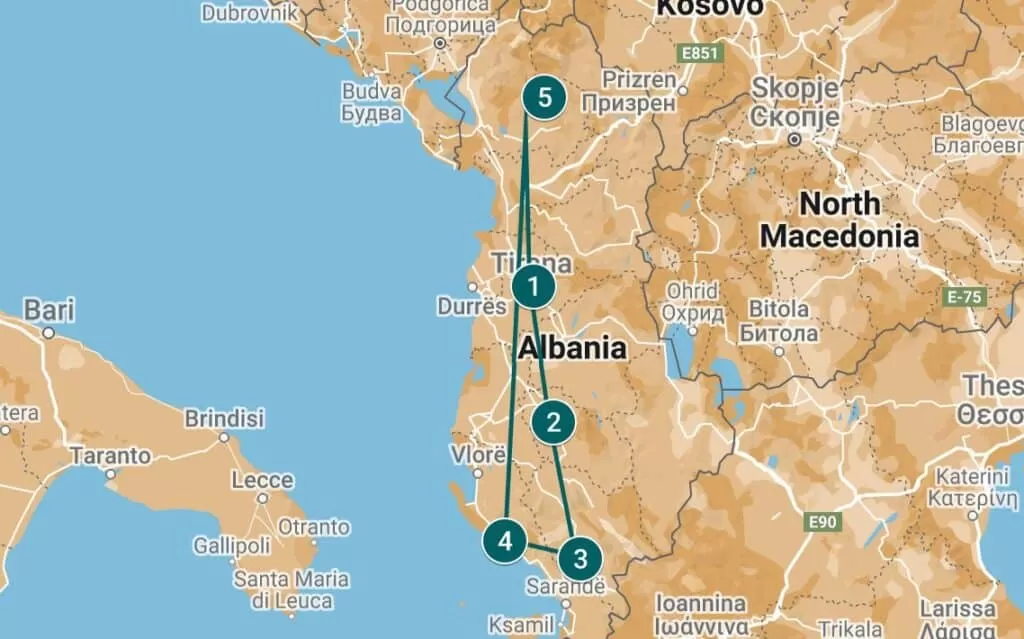
2 weeks Albania itinerary (click for interactive map)
10 days Albania itinerary
3 weeks albania itinerary.

Llogara Pass & Riviera
Llogara Pass
Good to know
When is the best time to visit albania, where to sleep on your albania road trip.

Accommodation in Albania
How expensive is traveling in Albania?
Is traveling in albania safe.
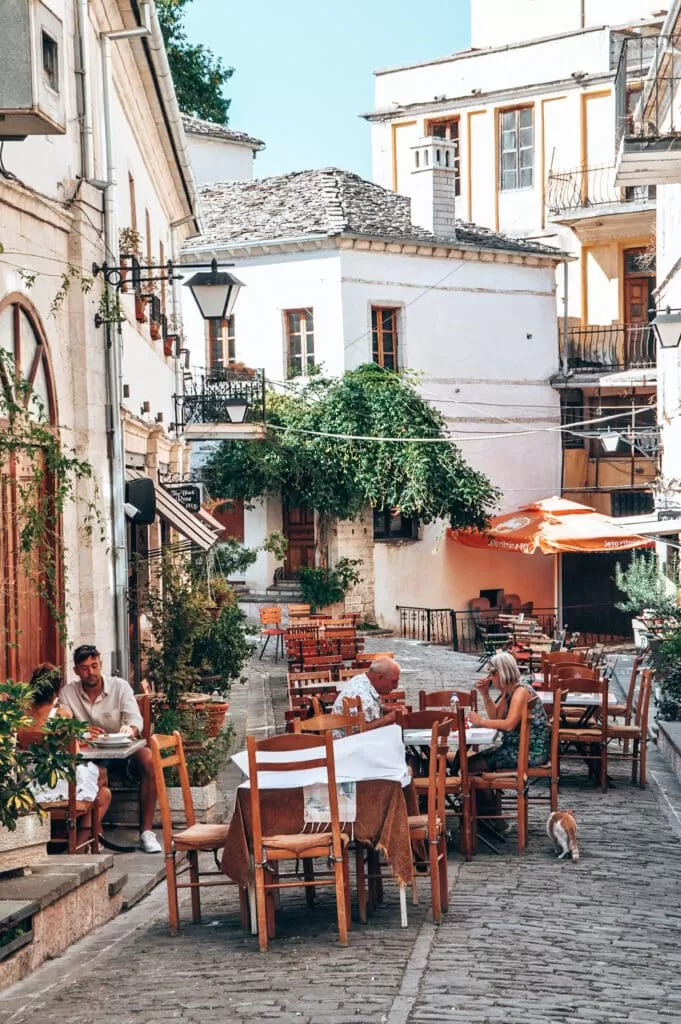
What about Internet? Can you use EU roaming in Albania?
Food in albania.
- Stuffed vegetables (e.g. eggplant, peppers, or pumpkin) – often stuffed with rice, mixed vegetables and sometimes cheese on top
- Ferges – Like a vegetable casserole with cheese
- Pispili – Spinach cake
- Byrek – Like a pie with a soft pastry
- Qifqi – Rice balls (A special from Gjirokaster)
- Sarma – Stuffed wine leaves
- Qofte – Fried vegetable balls
- Petulla – The typical Albanian “pancakes”, but they’re fried, more like donuts
- Raki – There’s no way of leaving Albania without having some Raki (locals often even drink a glass with their coffee in the morning)

Byrek | Stuffed peppers | Albanian “pancakes”
The Albanian language
- Yes – “Po”
- No – “yo”
- Hello – “Pershendetje”
- Thank you – “Faleminderit”
- Good night – “Naten e mire”
- Cheers – “Gezuar”
Sustainable travel in Albania
Why does albania have such a huge trash problem.

Albania’s nature & animals drowning in trash
What can we do as travelers?
- Avoid any plastic packaging (say no to any plastic bags but bring your own tote bag instead)
- Buy fresh fruit or freshly prepared snacks instead of packed snacks like chips or cookies
- Bring your own cosmetics instead of using the shampoo samples in any accommodation
- Say no to plastic straws, plastic cups etc.
- Bring a water filter bottle , so you don’t have to buy any plastic bottles
More about reducing waste during your trip
Lost places & bunkers.

Bunkers & lost places in Albania
Bunkers everywhere in Albania
Albania – a wrap-up
Albania in three words: Byrek | canyons | trash (yes, sadly that’s one of the things that left a mark)
More Mediterranean travel inspiration
Enjoy wine and mediveal villages in tuscany, soak up the spanish sun in menorca, get a free packing list to travel lighter.
Subscribe to get your free packing list for traveling light or carry-on only!
By requesting the packing list and subscribing to the newsletter, you agree to receiving updates via e-mail.
We respect your privacy. Unsubscribe at anytime.

Share with friends!
Related posts.

Andalucia road trip | Tapas, orange trees and marvelous cities

Rome | Hidden gems off the beaten path

Sustainable travel in France
13 comments.
You’re quite right, Albania is definitely a beautiful country worth spending time in and exploring. A road trip sounds ideal. It is a pity about the litter but hopefully that will be addressed soon.
Yeah, in my opinion a roadtrip is the perfect way to explore Albania, and especially to get off the beaten path. However, the country needs to manage their litter problem soon. Otherwise this will result in worse problems. Thanks for sharing your thoughts, Alma!
Hello! Thank you for making such a wonderful travel blog. I really appreciate this on point detailed guide. I wanna share the website https://www.holidayhare.com/country/albania I use to check info about countries, cities, weather, visa req. etc before I travel hope this helps :)
Thanks for your great feedback. I’m happy to hear that you like my content about an Albania road trip!
Hello. Thanks for the post. I want to share a website i came across, for cheaper holiday rentals, directly from local owners: https://www.rentfromlocals.al
thanks for the great article, keep up the good work
Thanks so much for your lovely comment!
Could you recommend any guided tours or travel tips for exploring the canyons and clear blue rivers in Albania?
You can find my tour recommendations within the article ;)
Thank very much for very helpful tips
I’m happy to hear that my tips for Albania were helpful to you.
Great article.
Hi Rezart, thanks! I’m glad you like my tips for a road trip through Albania.
Leave A Comment Cancel reply
Save my name, email, and website in this browser for the next time I comment.

- Kindle Store
- Kindle eBooks
Promotions apply when you purchase
These promotions will be applied to this item:
Some promotions may be combined; others are not eligible to be combined with other offers. For details, please see the Terms & Conditions associated with these promotions.
Buy for others
Buying and sending ebooks to others.
- Select quantity
- Buy and send eBooks
- Recipients can read on any device
These ebooks can only be redeemed by recipients in the US. Redemption links and eBooks cannot be resold.

Download the free Kindle app and start reading Kindle books instantly on your smartphone, tablet, or computer - no Kindle device required .
Read instantly on your browser with Kindle for Web.
Using your mobile phone camera - scan the code below and download the Kindle app.

Image Unavailable

- To view this video download Flash Player
Albania travel guide 2024-2025: Expert tips for a memorable journey Kindle Edition
- Print length 139 pages
- Language English
- Sticky notes On Kindle Scribe
- Publication date August 15, 2024
- File size 511 KB
- Page Flip Enabled
- Word Wise Enabled
- Enhanced typesetting Enabled
- See all details
Product details
- ASIN : B0DDDTC6VK
- Publication date : August 15, 2024
- Language : English
- File size : 511 KB
- Simultaneous device usage : Unlimited
- Text-to-Speech : Enabled
- Screen Reader : Supported
- Enhanced typesetting : Enabled
- X-Ray : Not Enabled
- Word Wise : Enabled
- Sticky notes : On Kindle Scribe
- Print length : 139 pages
Customer reviews
- 5 star 4 star 3 star 2 star 1 star 5 star 0% 0% 0% 0% 0% 0%
- 5 star 4 star 3 star 2 star 1 star 4 star 0% 0% 0% 0% 0% 0%
- 5 star 4 star 3 star 2 star 1 star 3 star 0% 0% 0% 0% 0% 0%
- 5 star 4 star 3 star 2 star 1 star 2 star 0% 0% 0% 0% 0% 0%
- 5 star 4 star 3 star 2 star 1 star 1 star 0% 0% 0% 0% 0% 0%
Customer Reviews, including Product Star Ratings help customers to learn more about the product and decide whether it is the right product for them.
To calculate the overall star rating and percentage breakdown by star, we don’t use a simple average. Instead, our system considers things like how recent a review is and if the reviewer bought the item on Amazon. It also analyzed reviews to verify trustworthiness.
No customer reviews
Report an issue.
- Amazon Newsletter
- About Amazon
- Accessibility
- Sustainability
- Press Center
- Investor Relations
- Amazon Devices
- Amazon Science
- Sell on Amazon
- Sell apps on Amazon
- Supply to Amazon
- Protect & Build Your Brand
- Become an Affiliate
- Become a Delivery Driver
- Start a Package Delivery Business
- Advertise Your Products
- Self-Publish with Us
- Become an Amazon Hub Partner
- › See More Ways to Make Money
- Amazon Visa
- Amazon Store Card
- Amazon Secured Card
- Amazon Business Card
- Shop with Points
- Credit Card Marketplace
- Reload Your Balance
- Amazon Currency Converter
- Your Account
- Your Orders
- Shipping Rates & Policies
- Amazon Prime
- Returns & Replacements
- Manage Your Content and Devices
- Recalls and Product Safety Alerts
- Registry & Gift List
- Conditions of Use
- Privacy Notice
- Consumer Health Data Privacy Disclosure
- Your Ads Privacy Choices
Cookies on GOV.UK
We use some essential cookies to make this website work.
We’d like to set additional cookies to understand how you use GOV.UK, remember your settings and improve government services.
We also use cookies set by other sites to help us deliver content from their services.
You have accepted additional cookies. You can change your cookie settings at any time.
You have rejected additional cookies. You can change your cookie settings at any time.
- Passports, travel and living abroad
- Travel abroad
- Foreign travel advice
Before you travel check that:
- your destination can provide the healthcare you may need
- you have appropriate travel insurance for local treatment or unexpected medical evacuation
This is particularly important if you have a health condition or are pregnant.
Emergency medical number
Call 127 and ask for an ambulance.
Contact your insurance company quickly if you’re referred to a medical facility for treatment.
Vaccine recommendations and health risks
At least 8 weeks before your trip:
- check the latest vaccine recommendations for Albania
- see where to get vaccines and whether you have to pay on the NHS travel vaccinations page
See what health risks you’ll face Albania .
Altitude sickness is a risk in parts of Albania. Read more about altitude sickness on TravelHealthPro .
Air pollution
There can be high levels of air pollution in Albania. You can find further information and advice on air quality on the World Health Organization (WHO) website and check air quality levels on the World Air Quality Index website .
Tap water and milk
Do not drink the tap water in Albania, as it may cause illness. Only drink bottled water. If you drink milk, make sure it is UHT (ultra high temperature) or pasteurised milk.
The legal status and regulation of some medicines prescribed or bought in the UK can be different in other countries.
Read best practice when travelling with medicines on TravelHealthPro .
Healthcare in Albania
Medical and dental facilities, including accident and emergency facilities, are very poor, particularly outside Tirana. Make sure you have adequate travel health insurance and accessible funds to cover the cost of any medical treatment abroad, evacuation by air ambulance and repatriation.
FCDO has a list of list of medical providers in Albania where some staff will speak English.
Travel and mental health
Read FCDO guidance on travel and mental health . There is also mental health guidance on TravelHealthPro .
Related content
Is this page useful.
- Yes this page is useful
- No this page is not useful
Help us improve GOV.UK
Don’t include personal or financial information like your National Insurance number or credit card details.
To help us improve GOV.UK, we’d like to know more about your visit today. Please fill in this survey (opens in a new tab) .

Britons warned of 'highly dangerous and unpredictable' threat in European holiday destination
A lbania is becoming an increasingly popular holiday destination but Britons have been warned that visiting the European country poses a safety risk.
Known for its stunning beaches, architectural beauty, exquisite landscapes, friendly locals and affordability, Albania is also known for its wildfires.
The Foreign, Commonwealth and Development Office (FCDO) shared some essential information regarding these wildfires (uncontrolled fires that burn in wildland vegetation) and how Britons can stay safe.
Holidaymakers were told: "Wildfires are common in Albania from April to October due to the dry and hot weather. Wildfires are highly dangerous and unpredictable.
"You should take care when visiting or driving through the countryside, make sure cigarette ends are properly extinguished, not light fires or barbecues except in designated and marked areas and not leave any rubbish.
"Causing a wildfire or a forest fire is a criminal offence in Albania. Penalties could result from fines to imprisonment.
"Be cautious if you are in or near an area affected by wildfires." There are several measures Britons should take in the event of a wildfire.
In the event of a wildfire:
・call the emergency services on 112
・follow any advice from the local emergency services
・contact your airline or travel operator who can assist you with return travel to the UK
・if you need consular assistance, call +355 4 223 4973/4/5 during working hours or +44 207 008 5000 out of hours
For essential, up-to-date information on extreme weather and natural disasters in Albania, Britons should consult the FCDO.
Earthquakes
The FCDO said: "There is a risk of earthquakes - tremors are common. Serious earthquakes are less frequent but do happen.
"The US Federal Emergency Management Agency website has advice about what to do before, during and after an earthquake."
Flooding and snow
The FCDO said: "From December to February, severe weather may cause flooding, particularly in northern Albania.
"Heavy snowfall in mountainous areas can lead to disruption to transport and services. Monitor local and international media for the latest information."
LATEST DEVELOPMENTS
・ Jet2 launches flights to holidaymakers' 'favourite' hotspots along Turkish Riviera
・ Expat on 'astounding' Paris attraction 'most people don't know is there'
・ Italian town that offers 'high quality of life' ranked 'number one' place to live
Before booking their visit, holidaymakers should see the FCDO for information on warnings and insurance, entry requirements, safety and security, health and getting help.
Britons were recently given an Iceland travel warning that is essential for drivers. The FCDO said: "Driving in Iceland can be very different to the UK."
The FCDO also provided Britons with essential information about the monitoring of volcanic activity in Iceland.

NEWS... BUT NOT AS YOU KNOW IT
I challenged myself to take a £100 holiday – I came back with change

Share this with

‘You will know each other well after this!’
The restaurant host was gesturing to me and the two Italian students sitting opposite me at Oda Garden, a popular traditional restaurant in Albania ’s capital, Tirana.
The place gets booked up well in advance, but we had all managed to squeeze in – provided we didn’t mind sharing our space with strangers.
As soon as I arrived, I realised why it was such a hotspot. Amidst a courtyard crammed with tables, macramé parasols and lights strung up between lemon trees, people were up dancing to a live band pumping out Albanian classics.
It was one of those magical moments where I felt like I’d been dunked, head first, into the culture of a place.
And the best bit? My main meal only cost me £4.10. This was music to my ears given the fact I was halfway through my challenge to do a getaway for just £100 – and that included everything.
https://www.instagram.com/p/C7KtM66oWfR/?hl=en
My name’s Chelsea Dickenson and I’m obsessed with the price of going on holiday .
I know I’m not the only one. I believe that in each and every family or friendship group , there’s a bargain obsessive, promo-code checking, spreadsheet-wielding individual who loves nothing more than saving money on their next trip.
It was this obsession that led me to do a holiday challenge back in 2017 where I took half the amount the average British person spends on holiday a year (which worked out at slightly under £2,000) and tried to do as many holidays as possible for the total and capture it all for my newly created YouTube channel.

How much does the average Brit spend on holiday?
- Research from VoucherCodes.co.uk forecast that Brits would spend £64.20billion on holidays in 2024
- This would mean that each person in the UK would spend £1,140 on average
- In the first half of 2020, Statista data found 26% or holidaymakers between 25-35 would spend between two and four thousand pounds, while 32% would spend between one and two thousand
- The same website found that UK travellers, on average, spent 8.7 nights on vacation in 2022, compared to 10.8 nights in 2021
That year, I ticked off 10 countries, on three continents, and I even flew business class.
The challenge kickstarted what is now my full-time career as a travel expert and content creator, posting advice and travel inspiration across my website, TV, print and radio, and to my 630k followers on social media.
For over a year, I’d had the idea to do a getaway for under £100 where the budget had to cover everything. That included: getting to and from the airport, flights, accommodation, food, drink and the activities.
With rising costs across Europe, it was more difficult than I’d first expected. Long gone are the endless lists of return flights under a tenner, and while Milan had looked like a credible contender, the price of accommodation had tipped things over the budget.

However, after spotting some £20 return flights to Tirana on the Wizz Air website back in April, my bargain-booking senses started to tingle. The £20 included all taxes and booking fees, though the flight out left at 7:45am in the morning and so I knew I was in for an early start.
The next thing I had to check were the transfers to and from the airports as this cost can quite often catch people out. Flying from Luton airport, I knew I could book a cheap National Express bus for just £6 each way and fortunately the airport bus to Tirana city centre came in at just £3.43 each way.
I felt I might be onto a winner.
However, it all depended on whether I could find somewhere nice to stay for the two nights. I knew it would probably have to be a hostel, but the cost of a bed in a shared room has massively increased across Europe in recent years due to the aftermath of the pandemic and an increase in boutique hostels.

Yet, Tirana came through once again with a bed in a well rated, boutique hostel for just £12.67 a night.
My final check was how much my food and drink would cost me. I had a look at the average cost of living on a site called Numbeo and browsed a few restaurant menus online. There were plenty of options where I could score dinner for under £6 and so I was confident the challenge was a-go.
So off I went. An overbooked coach to the airport nearly scuppered me at the first hurdle, but after another arrived 30 minutes later, giving me just enough time to whizz through security, I finally landed in the Albanian capital ready to put my budget to the test.
And what a place to do it!

I was bowled over by how green the city is, and how many food and drink restaurants there were to choose between. The latter is so important to many of us when choosing a destination, with 55% of people citing that the chance to explore local cuisine is a top travel motivator in Klarna’s recent Travel Report.
The good news is that even on a budget, I could still indulge. From 43p for a spinach byrek (a flakey, Albanian pastry) to £4.10 for fërgesë (a traditional dish of cottage cheese and peppers), I found it easy to pin down affordable food.
Culture is a priority to 28% of us as well, according to the Klarna report, and thanks to a free walking tour I found thanks to a simple google, I got to explore the city – leaving a small tip of £1.71 for the guide.
I also spent a wonderful couple of hours navigating the sprawling walkways of the 289 hectare Tirana Park and set up at a trendy cafe, Hana Corner Coffee, to work for a couple of hours – nursing a rather expensive £2.05 coffee! But it was worth it to watch the world go by on their gorgeous outdoor terrace.
Want more travel tips from Chelsea?
Check out some of her bargain booking travel hacks here .

I genuinely think it’s the most underrated city I’ve ever been to.
The total for my two-day trip came in at £99.59, proving that a £100 holiday can be done! And I do think having this firm budget really helps you stop extra costs for spiralling.
I found this on a six-night road trip to notoriously expensive Iceland back in March 2019, where I managed to cover absolutely everything – including the hire car and petrol – for just £600pp.
The biggest cost saver was on food and drink, since even a sandwich could cost over £10. Instead, we shopped exclusively at budget supermarkets and cooked in the kitchens of our cheap guesthouses. It also helped that the main reason many people go to Iceland is the free nature!
https://www.instagram.com/p/C7UN_Y7IYQI/?hl=en
If you’re hoping to book a cheap trip of your own, I have some advice about what to do.
Here are the four things you need to do to book a cheap holiday:
- Firstly, flexibility. This isn’t just about your travel dates but the destination, too: less well-known destinations can often open up more affordable prices.
- Secondly, check all the costs first. Don’t get hung up on the price of flights as they’re just a one-off and you’re actually better paying more for them if your accommodation and daily costs are going to come in cheaper.
- You can also consider using services like Klarna to spread the cost of your trip interest-free, as long as you know you’ll be able to pay it all off in time. It’s available on loads of popular travel sites like Booking.com, Hotels.com, Airbnb and others.
- And finally, set a budget. It’s really easy to get carried away when you’re on holiday so why not make a budget challenge of your own?
Many believe that setting a budget can detract from a holiday, but in the case of Tirana, I found it really forced me to find local experiences off the beaten tourist track that actually enhanced my trip.
That, and the restaurant host was right! My predicament actually encouraged me to meet new people and form friendships with others I would have otherwise never had the chance to meet.
Later on this year, I intend to attempt another budget challenge in Korea. It’s not known to be the cheapest destination, but I can’t wait to discover what I can get for my money.
Your Daily Horoscope

Daily horoscope today: August 21, 2024 astrological predictions for your star sign
It will be hard to beat lunch for 43p, though!
Do you have a story you’d like to share? Get in touch by emailing [email protected] .
Share your views in the comments below.
MORE : This ‘gorgeous’ destination is a perfect Majorca alternative — and pints cost just £2.33
MORE : How to have a holiday romance without getting your heart broken, according to experts
MORE : Bougie camping accessories that will give you the glamping experience (without the yurt price tag)

Get need-to-know travel news, inspiration and advice from Metro every week.
Sign up here....
Privacy Policy

Enter your birthday for your free daily horoscope sent straight to your inbox!
Get us in your feed

COMMENTS
My top travel tips for Albania to save you money, time and stress. Read this before you go travelling in Albania. When I embarked on my 6-month overland journey through the Balkan countries, Albania was definitely the country I was most nervous about visiting. I had read all about the rugged beaches, high mountains and historic towns and castles - so I had no trouble deciding where to go and ...
If you decide to travel to Albania: Enroll in the Smart Traveler Enrollment Program (STEP) to receive Alerts and make it easier to locate you in an emergency. Follow the Department of State on Facebook and Twitter. Review the Country Security Report for Albania. Visit the CDC page for the latest Travel Health Information related to your travel.
FCDO travel advice for Albania. Includes safety and security, insurance, entry requirements and legal differences.
Prices in Albania. Albania is an incredibly affordable destination. This is the reason why many choose Albania as their holiday destination. You can grab a beer for about €1-2 and a meal between €5-10. A hostel bed with breakfast and a beer can cost as low as €10 and a hotel room for around €20-50.
Travel Tips for First-Timers. Albania remains one of the final lesser-known areas of Europe, a mysterious place promising adventure for people wanting to go beyond typical destinations. Here is helpful information for those interested in this Balkan country before your trip.
At the time of writing, €1 equals 100 lekë. Hostel room: 1500 lekë. Basic room for two: 5000 lekë per night. Self-catering apartment (including Airbnb): 5000 lekë per night. Ticket for a bus in Tirana: 40 lekë. Inter-city bus: prices vary. A trip between Saranda and Tirana is 1600 lekë. Coffee: 100 to 200 lekë.
General Albania Travel Tips - Answering Your FAQs. In the first section of this Albania travel tips post, you'll find answers to a lot of frequently asked questions about the country. Please note that these answers are based on our own research done before visiting the country and our own experiences after spending two weeks there. Make ...
See a complete list of countries that can travel to Albania visa-free here. If you need a visa, or aren't sure if you need a visa, check your local government's travel advice. See my 22 top tips for travelling in Europe here. When's the best time to visit Albania? Albania has a Mediterranean climate with four distinct seasons.
An international driving permit can only be used for one year. If you wish to drive in Albania for more than one year, you must apply for an Albanian license. Everyone in the vehicle must wear a seat belt. Mobile phones can be used while driving, but only with a hands-free set. Third-party insurance is required.
Albania's popularity as a tourist destination continues to increase. Here's what every first-time visitor needs to know. Beaches. The 9 best places to visit in Albania. Nov 18, 2023 • 7 min read. Budget Travel. Total Trip: what I spent over a (very) affordable long weekend in Tirana, Albania.
Rental and luxury vehicles are a target of choice. Familiarize yourself with your route before starting the trip. Keep your windows and doors locked at all times. Keep your belongings out of reach. Use secure parking facilities, especially overnight. Never leave belongings unattended in a vehicle, even in the trunk.
Learn everything you need to know to travel to Albania, from visa requirements and currency to transportation and attractions. Discover the natural and cultural wonders of this Balkan gem, whether you prefer beaches, mountains or cities.
Learn why Albania is a fantastic destination for travelers of all kinds, with stunning scenery, friendly people, and affordable prices. Find out how to plan your trip, where to stay, what to do, and what to eat in this comprehensive guide.
So, my 5th Albanian travel tip for you is to get to know the local people (it's not hard) and don't be shy about asking for help. 6. "Albania Time". Remember that whole unreliable bus thing I was just talking about. Okay, well that ties into the whole "Albania time" thing.
contact your airline or travel operator who can assist you with return travel to the UK if you need consular assistance call +355 4 223 4973/4/5 during working hours or +44 207 008 5000 out of hours
Albania Travel Guide. Last Updated: April 29, 2024. Albania is one of Europe's best-kept secrets. Though it increases in popularity each year, the country is largely ignored by tourists; many still think of it as a post-communist backwater (as if the world hasn't changed in the last 30 years). Yet this is a land of untouched natural beauty ...
Miriam Risager is the founder of Adventurous Miriam. She has traveled to 62 countries in the past 18 years and has done most of it solo. She helps over 100,000 people per month plan their travel adventures across the world. Get the must-have tips in my Albania travel guide, including what to see, what to eat and where to stay.
Monitor local media for the latest updates. Theft from vehicles is common. Petty crime occurs. Take care of your belongings on public transport. Severe weather occurs from December to February and may cause flooding, particularly in northern Albania. Monitor the local media and stay in touch with friends and family. Full travel advice: Safety.
Albania Travel Tips | Practical Info. And, seeing as though this post is full of practical and useful Albania travel tips, here are a few more: The official currency is Albania Lek (current conversion (July 2019) is 136 Lek to the British Pound, or 108 Lek to the US Dollar) but euros can often also be used. Albanian Lek can be obtained in the ...
Gjrokaster (2 days), with a day trip to Lengarica Canyon. drive Gjirokaster ⇨ Blue Eye ⇨ Riviera (1.5 - 2.5h / 90 - 115km) Albanian Riviera (3-4 days), with a day trip to Butrint. drive Riviera ⇨ Kruje ⇨ Koman Lake (5.5h / 320 km), add a night in Kruje if you'd like to avoid the long drive.
Albania, a country brimming with breathtaking landscapes, rich history, and vibrant culture, is waiting for you to explore. In this guide, you'll discover the ancient ruins of Butrint, the sun-kissed beaches of the Albanian Riviera, and the enchanting streets of Berat, the City of a Thousand Windows. Dive into the heart of Tirana, the vibrant ...
FCDO travel advice for Albania. Includes safety and security, insurance, entry requirements and legal differences.
・contact your airline or travel operator who can assist you with return travel to the UK ・if you need consular assistance, call +355 4 223 4973/4/5 during working hours or +44 207 008 5000 out ...
Cheap travel expert Chelsea Dickenson set herself her challenge: To go on a mini break to Albania's capital, Tirana, for less than £100.